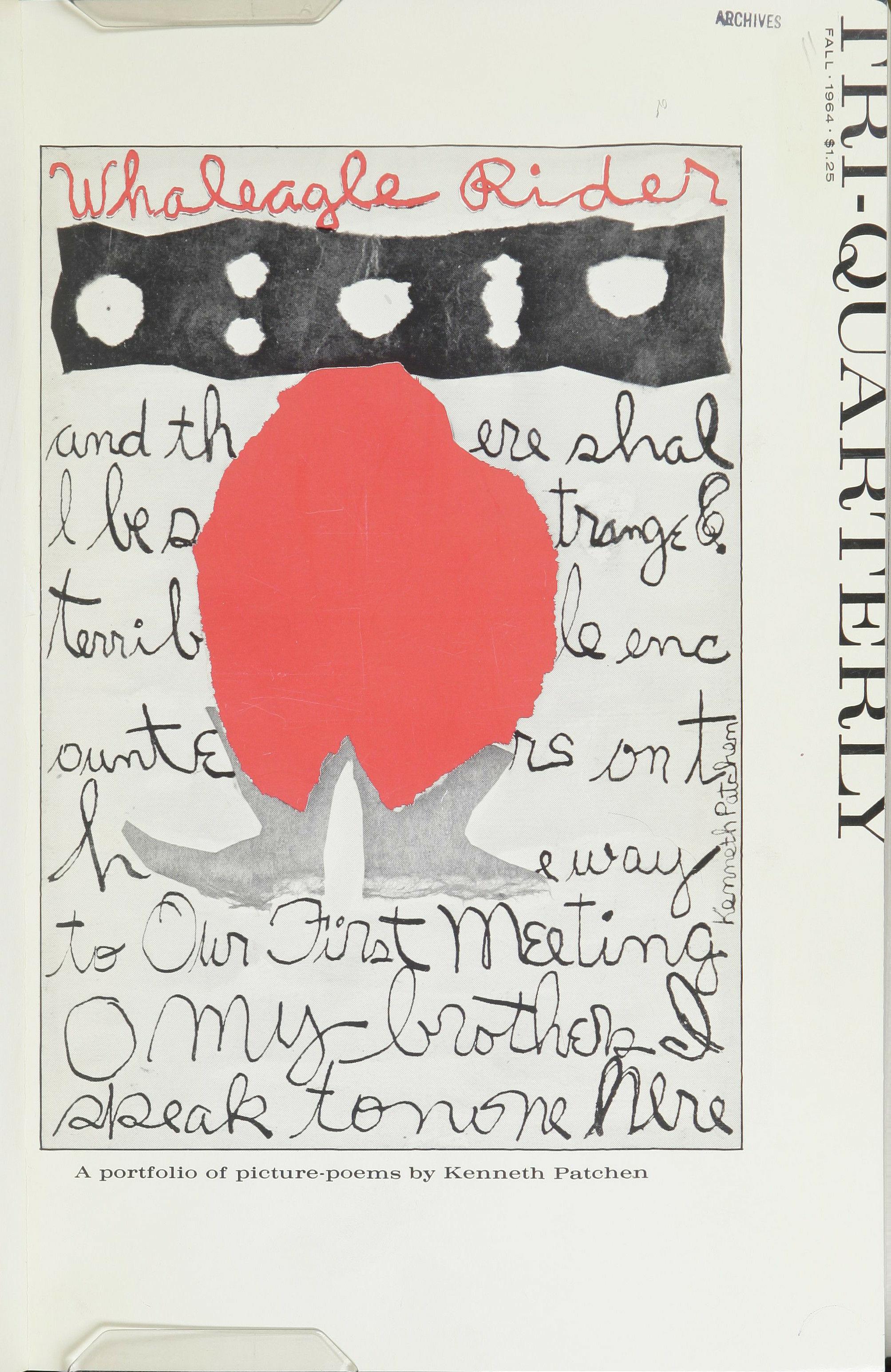
�CHIVES

EDITOR
Charles Newman
ART DIRECTOR
Lawrence Levy
ASSOCIATES
John Almquist
Colton Johnson
PRODUCTION
Lauretta Akkeron
BUSINESS
Stephen Bornemeier
Suzanne Kurman
ASSISTANTS
Arthur F. Gould
Carol Breyer
William A. Henkin Jr.
STAFF
Adele Wolfberg
Richard Thieme
Joel Pondelik
Mark Malkas
Anne Campbell
Dan Conrad

The Tri-Quarterly is a national journal of arts, letters and opinion, published in the fall, winter and spring quarters at Northwestern University, Evanston, Illinois. Subscription rates: $3.00 yearly within the United States; $3.25 Canada and Mexico; $3.75 Foreign. Single copies will be sold for $1.25. Contributions, correspondence and subscriptions should be addressed to Tri-Quarterly University Hall 101, Northwestern University, Evanston, Illinois. Unsolicited manuscripts are welcome, but will not be returned unless accompanied by a self-addressed stamped envelope. The Tri-Quarterly is distributed by the Northwestern University Press. Copyright © 1964 by Northwestern University Press. All rights reserved. The views expressed in the magazine, except for editorials, are to be attributed to the writers, not the editors or sponsors.
LESLIE A. FIEDLER 7 Poetry, science and the end of man
STE PHE N SPENDE R 15

The literary mood of the 1930's
LIONEL TRILLING 26 A valedictory
ERICH HELLER 35 The artist's journey into the interior: the Hegelian prophecy (part one)
FREDERICK S. STIMSON 50 The birds and the bees: modern Spanish-American poetry
J. B. YEATS 70 On James Joyce: a letter
MARK REINSBERG 77 What republicanism was in the coming election
KENNETH PATCHEN A portfolio of picture-poems
Fiction
RICHARD BRAUTIGAN 62 A Confederate general from Big Sur: an excerpt of a novel
Poetry
WILLIAM PILLlN 25 Space music
KOZ'MA PRUTKOV 33 Translated by W. D. Snodgrass and Tanya Tolstoy
WILLIAM STAFFORD 47 From the head archer at Warwick / Chronicler and historian / Isolationists / Extended Haiku / Exorcism
FREDERICK CANDELARIA 61 Firs
DAVID PEARSON ETTER 68 Where I am / On the courthouse steps / Moonflowers / March
WILLIAM A. HENKIN JR. 84 Kafkaball
LUCIEN STRYK 85 Crow / Hearn in Matsue
CONTENTS
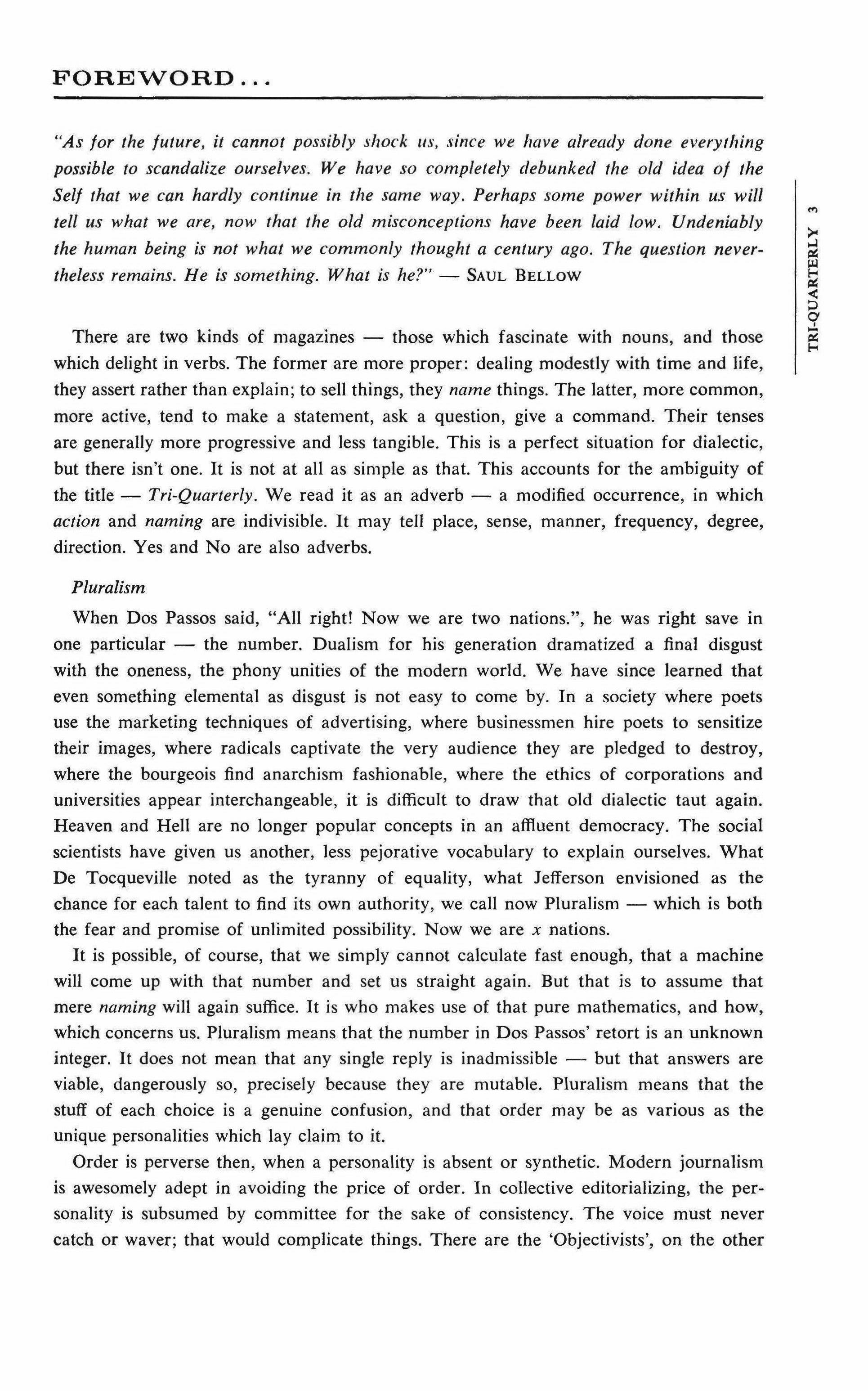
"As for the future, it cannot possibly shock us, since we have already done everything possible to scandalize ourselves. We have so completely debunked the old idea of the Self that we can hardly continue in the same way. Perhaps some power within us will tell us what we are, now that the old misconceptions have been laid low. Undeniably the human being is not what we commonly thought a century ago. The question nevertheless remains. He is something. What is he?" - SAUL BELLOW
There are two kinds of magazines - those which fascinate with nouns, and those which delight in verbs. The former are more proper: dealing modestly with time and life, they assert rather than explain; to sell things, they name things. The latter, more common, more active, tend to make a statement, ask a question, give a command. Their tenses are generally more progressive and less tangible. This is a perfect situation for dialectic, but there isn't one. It is not at all as simple as that. This accounts for the ambiguity of the title - Tri-Quarterly We read it as an adverb - a modified occurrence, in which action and naming are indivisible. It may tell place, sense, manner, frequency, degree, direction. Yes and No are also adverbs.
Pluralism
When Dos Passos said, "All right! Now we are two nations.", he was right save in one particular - the number. Dualism for his generation dramatized a final disgust with the oneness, the phony unities of the modern world. We have since learned that even something elemental as disgust is not easy to come by. In a society where poets use the marketing techniques of advertising, where businessmen hire poets to sensitize their images, where radicals captivate the very audience they are pledged to destroy, where the bourgeois find anarchism fashionable, where the ethics of corporations and universities appear interchangeable, it is difficult to draw that old dialectic taut again. Heaven and Hell are no longer popular concepts in an affluent democracy. The social scientists have given us another, less pejorative vocabulary to explain ourselves. What De Tocqueville noted as the tyranny of equality, what Jefferson envisioned as the chance for each talent to find its own authority, we call now Pluralism - which is both the fear and promise of unlimited possibility. Now we are x nations.
It is possible, of course, that we simply cannot calculate fast enough, that a machine will come up with that number and set us straight again. But that is to assume that mere naming will again suffice. It is who makes use of that pure mathematics, and how, which concerns us. Pluralism means that the number in Dos Passos' retort is an unknown integer. It does not mean that any single reply is inadmissible - but that answers are viable, dangerously so, precisely because they are mutable. Pluralism means that the stuff of each choice is a genuine confusion, and that order may be as various as the unique personalities which lay claim to it.
Order is perverse then, when a personality is absent or synthetic. Modern journalism is awesomely adept in avoiding the price of order. In collective editorializing, the personality is subsumed by committee for the sake of consistency. The voice must never catch or waver; that would complicate things. There are the 'Objectivists', on the other
FOREWORD
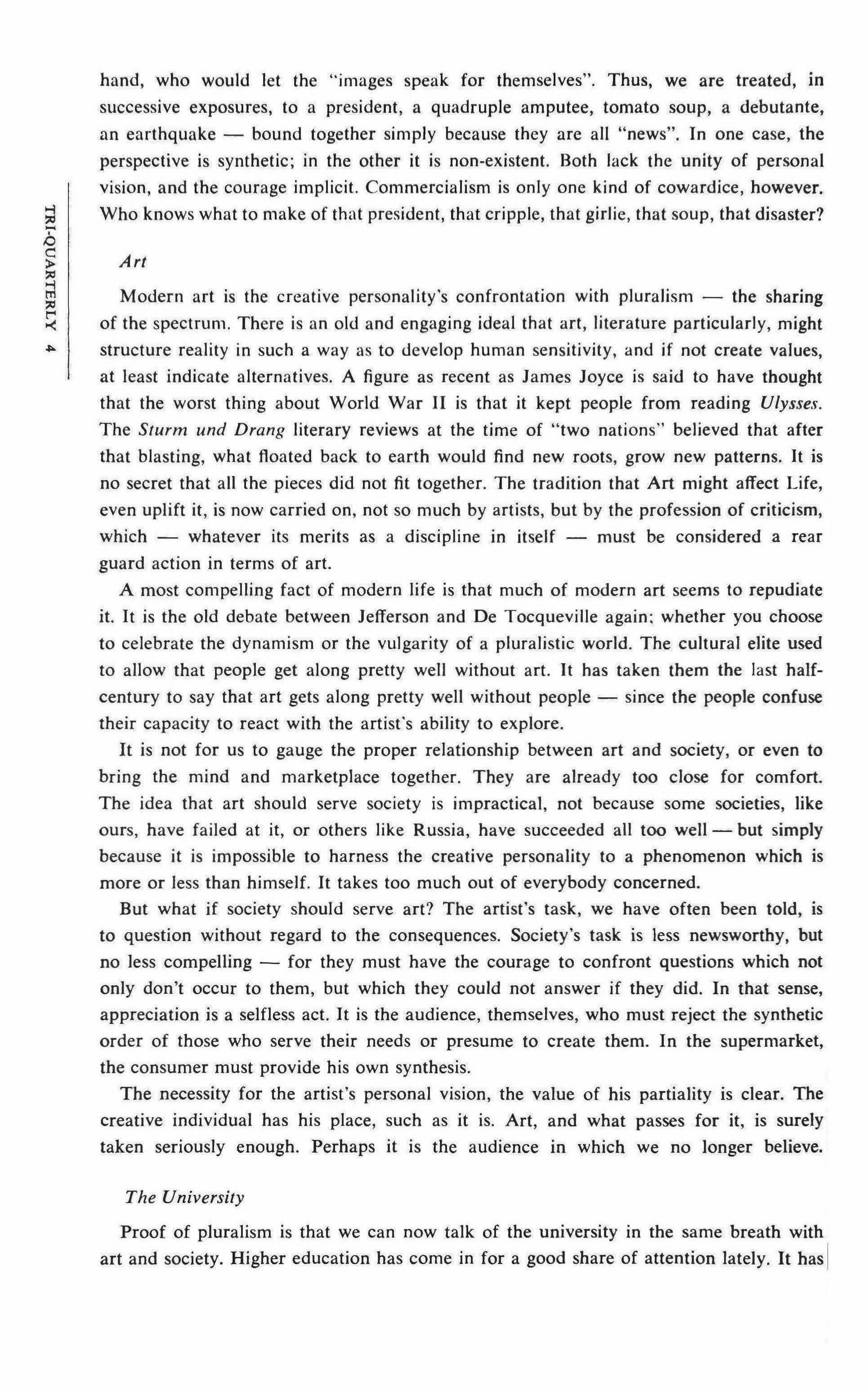
hand, who would let the "images speak for themselves", Thus, we are treated, in successive exposures, to a president, a quadruple amputee, tomato soup, a debutante, an earthquake - bound together simply because they are all "news". In one case, the perspective is synthetic; in the other it is non-existent. Both lack the unity of personal vision, and the courage implicit. Commercialism is only one kind of cowardice, however. Who knows what to make of that president, that cripple, that girlie, that soup, that disaster?
Art
Modern art is the creative personality's confrontation with pluralism - the sharing of the spectrum. There is an old and engaging ideal that art, literature particularly, might structure reality in such a way as to develop human sensitivity, and if not create values, at least indicate alternatives. A figure as recent as James Joyce is said to have thought that the worst thing about World War II is that it kept people from reading Ulysses. The Sturm und Drang literary reviews at the time of "two nations" believed that after that blasting, what floated back to earth would find new roots, grow new patterns. It is no secret that all the pieces did not fit together. The tradition that Art might affect Life, even uplift it, is now carried on, not so much by artists, but by the profession of criticism, which - whatever its merits as a discipline in itself - must be considered a rear guard action in terms of art.
A most compelling fact of modern life is that much of modern art seems to repudiate it. It is the old debate between Jefferson and De Tocqueville again; whether you choose to celebrate the dynamism or the vulgarity of a pluralistic world. The cultural elite used to allow that people get along pretty well without art. It has taken them the last halfcentury to say that art gets along pretty well without people - since the people confuse their capacity to react with the artist's ability to explore.
It is not for us to gauge the proper relationship between art and society, or even to bring the mind and marketplace together, They are already too close for comfort. The idea that art should serve society is impractical, not because some societies, like ours, have failed at it, or others like Russia, have succeeded all too well- but simply because it is impossible to harness the creative personality to a phenomenon which is more or less than himself. It takes too much out of everybody concerned.
But what if society should serve art? The artist's task, we have often been told, is to question without regard to the consequences. Society's task is less newsworthy, but no less compelling - for they must have the courage to confront questions which not only don't occur to them, but which they could not answer if they did. In that sense, appreciation is a selfless act. It is the audience, themselves, who must reject the synthetic order of those who serve their needs or presume to create them. In the supermarket, the consumer must provide his own synthesis.
The necessity for the artist's personal vision, the value of his partiality is clear. The creative individual has his place, such as it is. Art, and what passes for it, is surely taken seriously enough. Perhaps it is the audience in which we no longer believe.
The University
Proof of pluralism is that we can now talk of the university in the same breath with art and society. Higher education has come in for a good share of attention lately. It has
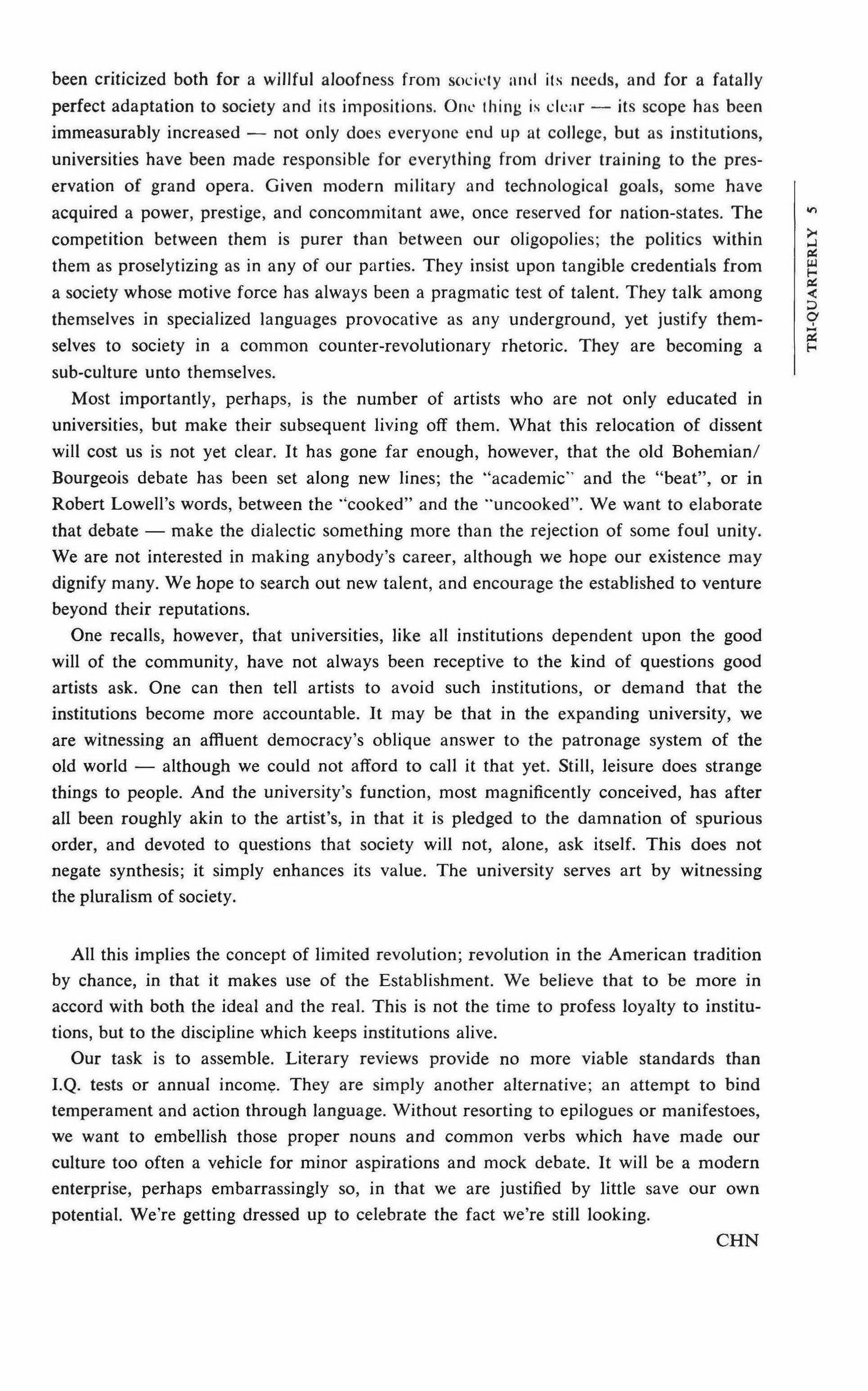
been criticized both for a willful aloofness from society and its needs, and for a fatally perfect adaptation to society and its impositions. One Ihing is clear - its scope has been immeasurably increased - not only does everyone end up at college, but as institutions, universities have been made responsible for everything from driver training to the preservation of grand opera. Given modern military and technological goals, some have acquired a power, prestige, and concomrnitant awe, once reserved for nation-states. The competition between them is purer than between our oligopolies; the politics within them as proselytizing as in any of our parties. They insist upon tangible credentials from a society whose motive force has always been a pragmatic test of talent. They talk among themselves in specialized languages provocative as any underground, yet justify themselves to society in a common counter-revolutionary rhetoric. They are becoming a sub-culture unto themselves.
Most importantly, perhaps, is the number of artists who are not only educated in universities, but make their subsequent living off them. What this relocation of dissent will cost us is not yet clear. It has gone far enough, however, that the old Bohemian/ Bourgeois debate has been set along new lines; the "academic" and the "beat", or in Robert Lowell's words, between the "cooked" and the "uncooked". We want to elaborate that debate - make the dialectic something more than the rejection of some foul unity. We are not interested in making anybody's career, although we hope our existence may dignify many. We hope to search out new talent, and encourage the established to venture beyond their reputations.
One recalls, however, that universities, like all institutions dependent upon the good will of the community, have not always been receptive to the kind of questions good artists ask. One can then tell artists to avoid such institutions, or demand that the institutions become more accountable. It may be that in the expanding university, we are witnessing an affluent democracy's oblique answer to the patronage system of the old world - although we could not afford to call it that yet. Still, leisure does strange things to people. And the university's function, most magnificently conceived, has after all been roughly akin to the artist's, in that it is pledged to the damnation of spurious order, and devoted to questions that society will not, alone, ask itself. This does not negate synthesis; it simply enhances its value. The university serves art by witnessing the pluralism of society.
All this implies the concept of limited revolution; revolution in the American tradition by chance, in that it makes use of the Establishment. We believe that to be more in accord with both the ideal and the real. This is not the time to profess loyalty to institutions, but to the discipline which keeps institutions alive.
Our task is to assemble. Literary reviews provide no more viable standards than I.Q. tests or annual income. They are simply another alternative; an attempt to bind temperament and action through language. Without resorting to epilogues or manifestoes, we want to embellish those proper nouns and common verbs which have made our culture too often a vehicle for minor aspirations and mock debate. It will be a modern enterprise, perhaps embarrassingly so, in that we are justified by little save our own potential. We're getting dressed up to celebrate the fact we're still looking.
CHN
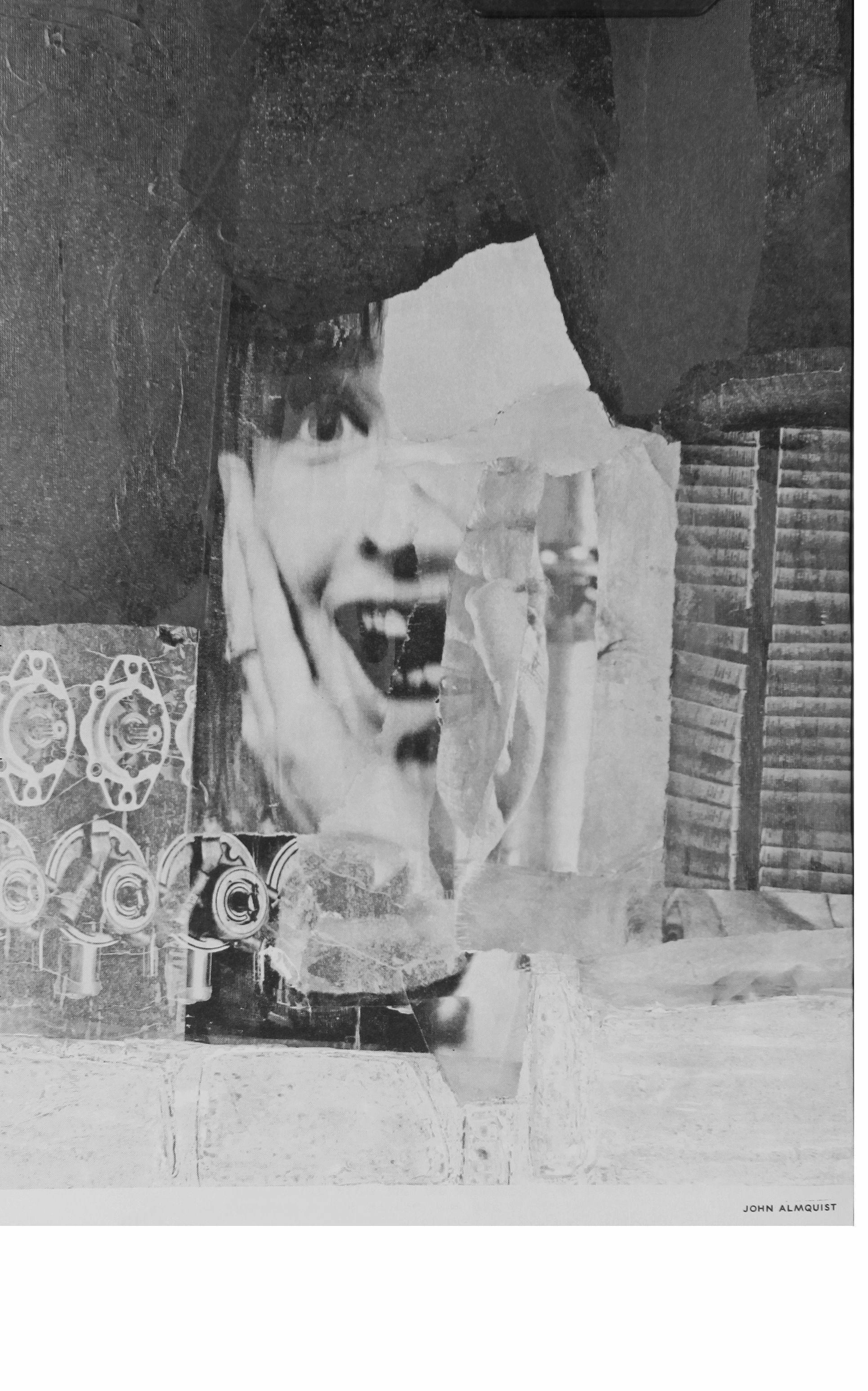
r
.JOHN ALMQUIST
Poetry, science and the end of man
LESLIE A. FIEDLER
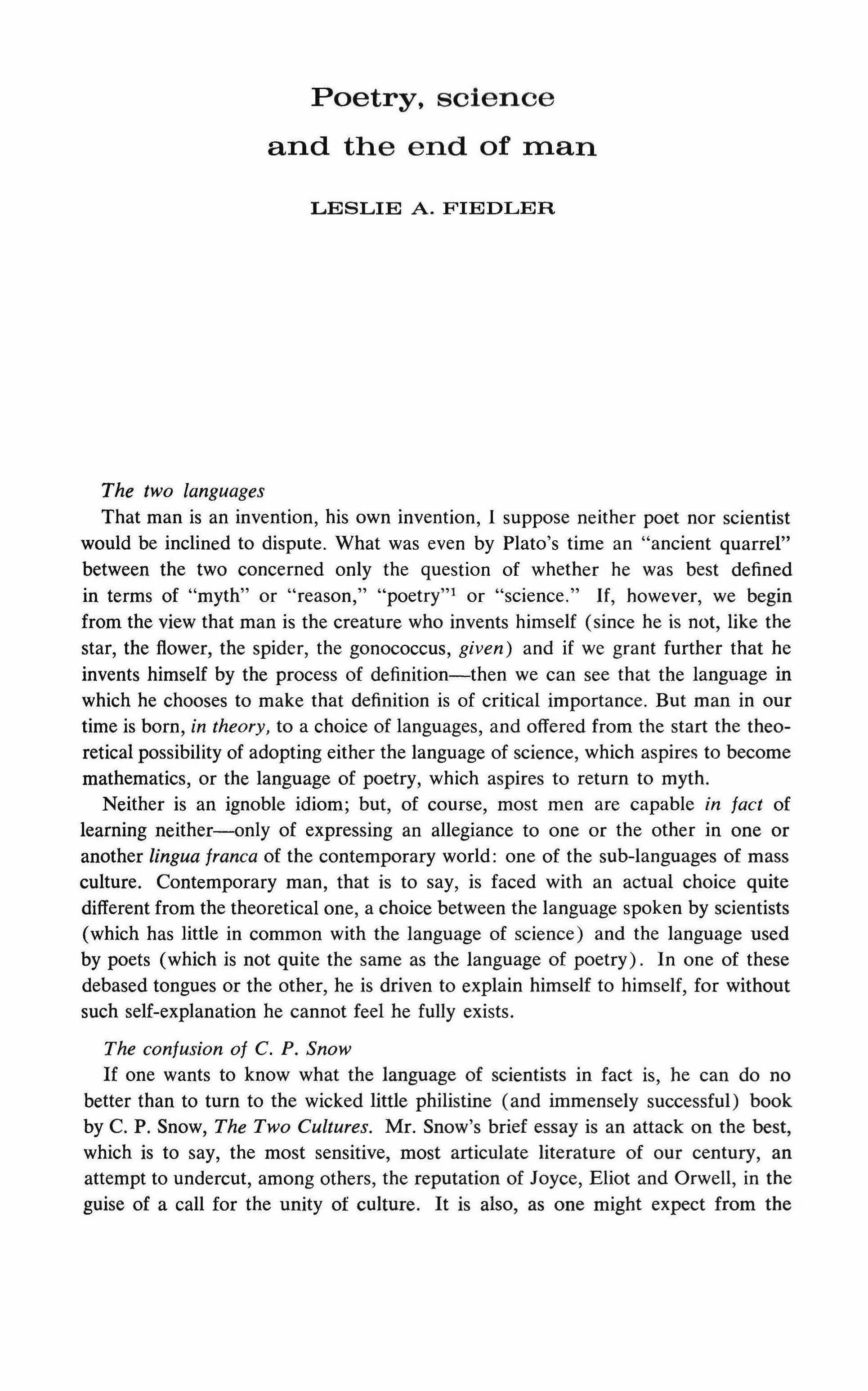
The two languages
That man is an invention, his own invention, I suppose neither poet nor scientist would be inclined to dispute. What was even by Plato's time an "ancient quarrel" between the two concerned only the question of whether he was best defined in terms of "myth" or "reason," "poetry"! or "science." If, however, we begin from the view that man is the creature who invents himself (since he is not, like the star, the flower, the spider, the gonococcus, given) and if we grant further that he invents himself by the process of definition-then we can see that the language in which he chooses to make that definition is of critical importance. But man in our time is born, in theory, to a choice of languages, and offered from the start the theoretical possibility of adopting either the language of science, which aspires to become mathematics, or the language of poetry, which aspires to return to myth. Neither is an ignoble idiom; but, of course, most men are capable in fact of learning neither-only of expressing an allegiance to one or the other in one or another lingua franca of the contemporary world: one of the sub-languages of mass culture. Contemporary man, that is to say, is faced with an actual choice quite different from the theoretical one, a choice between the language spoken by scientists (which has little in common with the language of science) and the language used by poets (which is not quite the same as the language of poetry). In one of these debased tongues or the other, he is driven to explain himself to himself, for without such self-explanation he cannot feel he fully exists.
The confusion of C. P. Snow
If one wants to know what the language of scientists in fact is, he can do no better than to turn to the wicked little philistine (and immensely successful) book by C. P. Snow, The Two Cultures. Mr. Snow's brief essay is an attack on the best, which is to say, the most sensitive, most articulate literature of our century, an attempt to undercut, among others, the reputation of Joyce, Eliot and Orwell, in the guise of a call for the unity of culture. It is also, as one might expect from the

quality of its ideas, an example of the vulgarization of language in our time and a sourcebook for those interested in what has become of the English tongue in the closed world of the contemporary scientist. J n an extended note � Mr. Snow tells us, for instance, blandly and with no hint of dismay that:
Subjective, in the contemporary technological jargon, means 'divided according to subjects.' Objective means 'directed towards an object.' Philosophy means 'general intellectual approach or attitude.' (For example, a scientist's philosophy of guided weapons might lead him to propose certain kinds of 'objective research.') A 'progressive' job means one with possibilities of promotion
In light of which, one is scarcely surprised to discover that Mr. Snow, quite like those of his colleagues who do not write novels, is incapable or unwilling to make such elementary and vital semantic distinctions as those which separate, for instance, "education" and "training," or "science" and "technology."
His failure, needless to say, is not merely linguistic but ideological as well; since such confusion of usage arises from a primary confusion of concepts, and breeds eventually even deeper confusions in the realm of ideas. Simply on the basis of a careful reading of The Two Cultures one might have predicted Mr. Snow's appalling comment that Russian education is superior to the English. What he means, of course, is that the Soviet Union has a vaster program of vocational training, particularly in the technological areas; and this John Wain has pointed out, observing that really Russian education can meaningfully be called neither better nor worse than English education, since the former doesn't exist-not certainly in the ordinary understanding of the word "education" as an organized and systematic attempt to free the mind.
Scientists and the cultural lag
If Mr. Snow's case were an eccentric instance, there would be little point in belaboring his slight study; but he does, alas, speak for the community he claims to represent: the well-trained, scarcely educated, linguistically inadequate New Men in science and technology, whose favorite reading matter is Science Fiction (not even Mr. Snow's books!), and whose ideas about society are the product of a serious cultural lag endemic to inhabitants of laboratories and seminars in physics. Mr. Snow and his New Men, outside of their laboratories, manipulate political and sociological counters as unviable in the contemporary world as simple-minded Newtonian physics. They live, that is to say, among the cliches of nineteenth century liberal humanism, tempered with a few hardy platitudes from pre-Bolshevik, preBomb socialism; and they profer these weary ideas with an air of dedication to the Future, the show of committing themselves to the New.
No end to innocence
They are, of course, in the fullest sense of the word provincials, or, as the language of the times would have it, Squares. But they are not merely comical. Indeed, their enthralment with yesterday'S noble if battered platitudes might be regarded with more sympathy than condescension, certainly without indignation, if it had not been
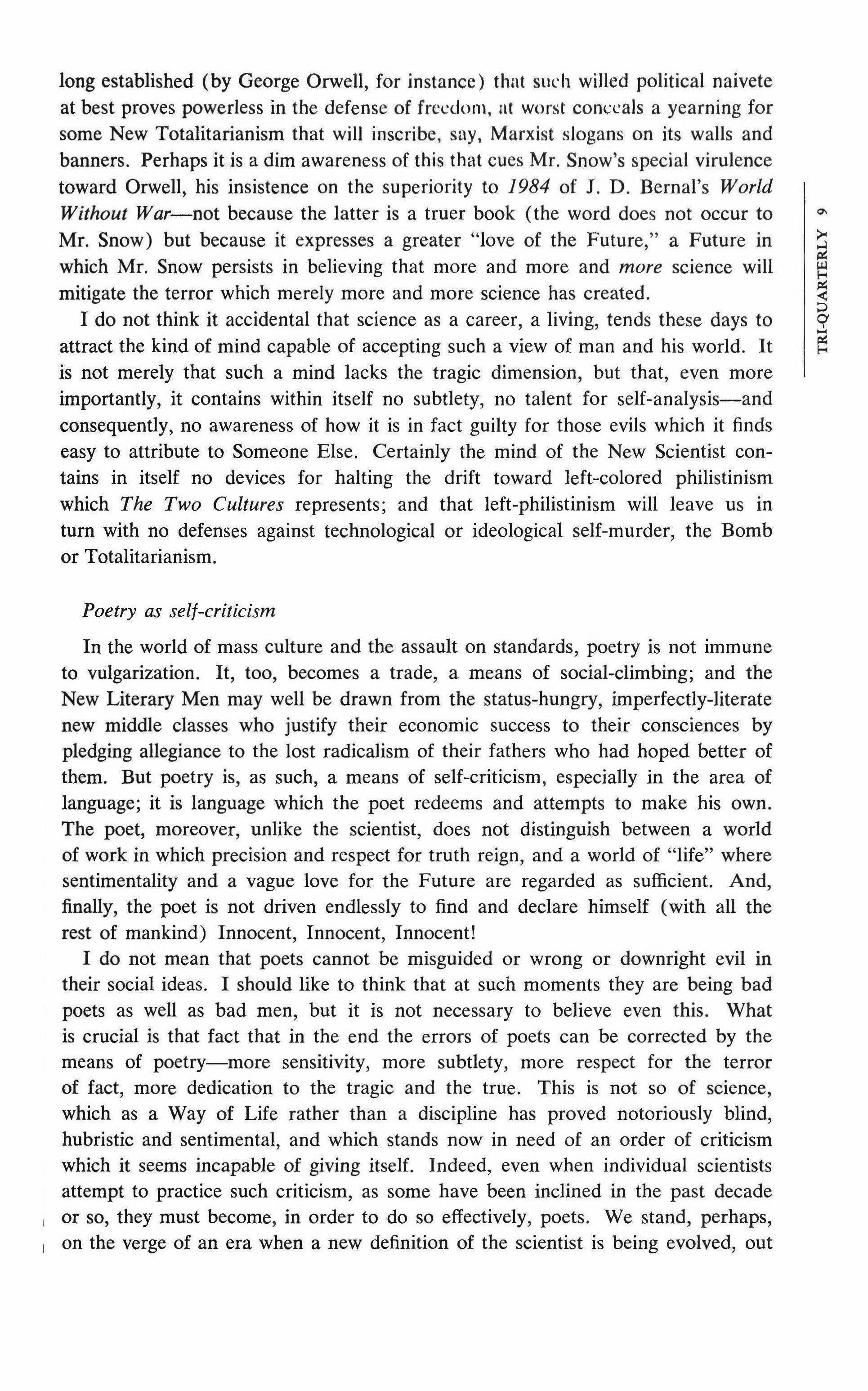
long established (by George Orwell, for instance) that such willed political naivete at best proves powerless in the defense of freedom, lit worst conceals a yearning for some New Totalitarianism that will inscribe, say, Marxist slogans on its walls and banners. Perhaps it is a dim awareness of this that cues Mr. Snow's special virulence toward Orwell, his insistence on the superiority to 1984 of J. D. Bernal's World Without War-not because the latter is a truer book (the word does not occur to Mr. Snow) but because it expresses a greater "love of the Future," a Future in which Mr. Snow persists in believing that more and more and more science will mitigate the terror which merely more and more science has created.
I do not think it accidental that science as a career, a living, tends these days to attract the kind of mind capable of accepting such a view of man and his world. It is not merely that such a mind lacks the tragic dimension, but that, even more importantly, it contains within itself no subtlety, no talent for self-analysis-and consequently, no awareness of how it is in fact guilty for those evils which it finds easy to attribute to Someone Else. Certainly the mind of the New Scientist contains in itself no devices for halting the drift toward left-colored philistinism which The Two Cultures represents; and that left-philistinism will leave us in tum with no defenses against technological or ideological self-murder, the Bomb or Totalitarianism.
Poetry as self-criticism
In the world of mass culture and the assault on standards, poetry is not immune to vulgarization. It, too, becomes a trade, a means of social-climbing; and the New Literary Men may well be drawn from the status-hungry, imperfectly-literate new middle classes who justify their economic success to their consciences by pledging allegiance to the lost radicalism of their fathers who had hoped better of them. But poetry is, as such, a means of self-criticism, especially in the area of language; it is language which the poet redeems and attempts to make his own. The poet, moreover, unlike the scientist, does not distinguish between a world of work in which precision and respect for truth reign, and a world of "life" where sentimentality and a vague love for the Future are regarded as sufficient. And, finally, the poet is not driven endlessly to find and declare himself (with all the rest of mankind) Innocent, Innocent, Innocent!
I do not mean that poets cannot be misguided or wrong or downright evil in their social ideas. I should like to think that at such moments they are being bad poets as well as bad men, but it is not necessary to believe even this. What is crucial is that fact that in the end the errors of poets can be corrected by the means of poetry-more sensitivity, more subtlety, more respect for the terror of fact, more dedication to the tragic and the true. This is not so of science, which as a Way of Life rather than a discipline has proved notoriously blind, hubristic and sentimental, and which stands now in need of an order of criticism which it seems incapable of giving itself. Indeed, even when individual scientists attempt to practice such criticism, as some have been inclined in the past decade or so, they must become, in order to do so effectively, poets. We stand, perhaps, on the verge of an era when a new definition of the scientist is being evolved, out
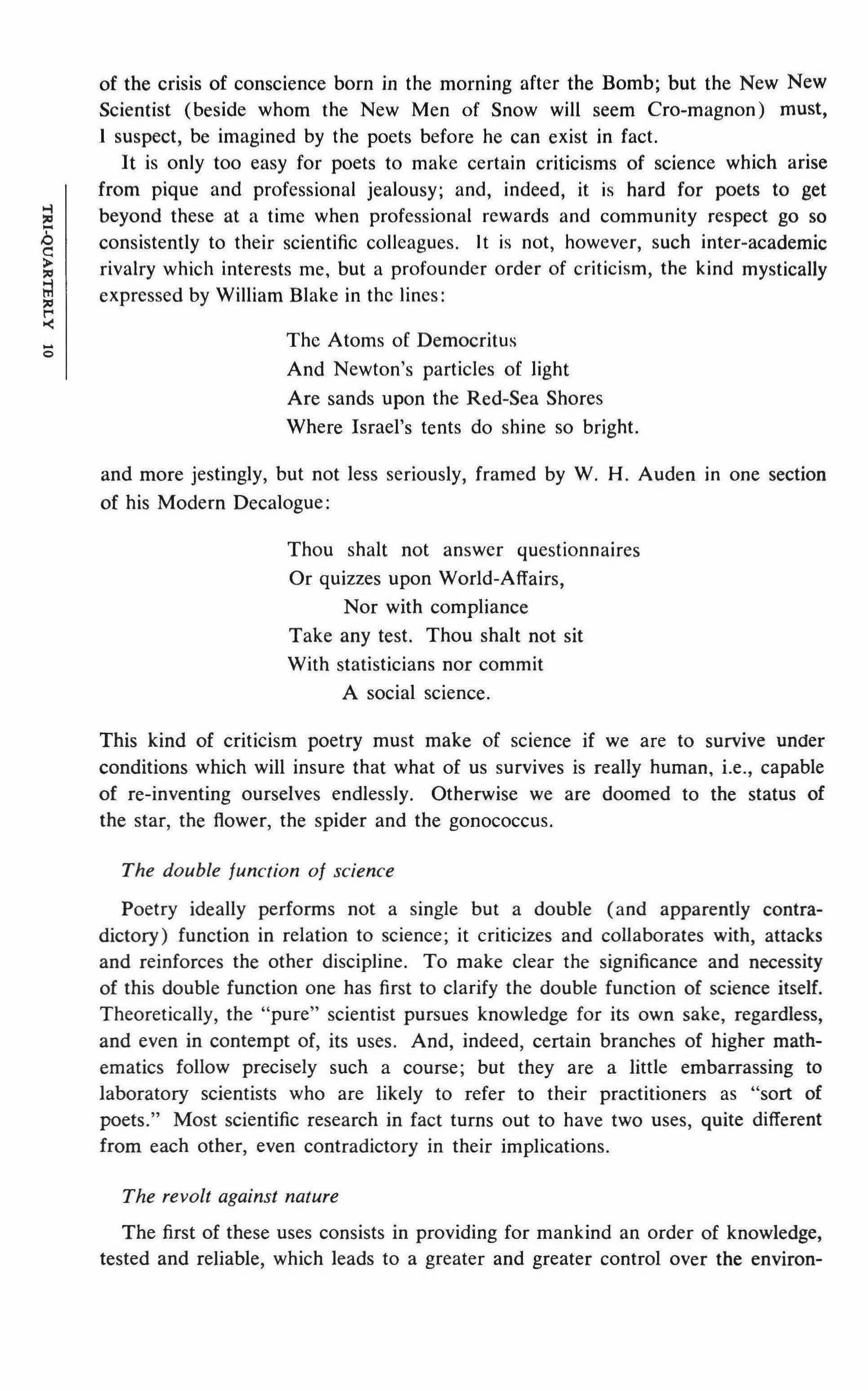
of the crisis of conscience born in the morning after the Bomb; but the New New Scientist (beside whom the New Men of Snow will seem Cro-magnon) must, 1 suspect, be imagined by the poets before he can exist in fact.
It is only too easy for poets to make certain criticisms of science which arise from pique and professional jealousy; and, indeed, it is hard for poets to get beyond these at a time when professional rewards and community respect go so consistently to their scientific colleagues. It is not, however, such inter-academic rivalry which interests me, but a profounder order of criticism, the kind mystically expressed by William Blake in the lines:
The Atoms of Dernocritus
And Newton's particles of light
Are sands upon the Red-Sea Shores Where Israel's tents do shine so bright.
and more jestingly, but not less seriously, framed by W. H. Auden in one section of his Modern Decalogue:
Thou shalt not answer questionnaires Or quizzes upon World-Affairs, Nor with compliance
Take any test. Thou shalt not sit With statisticians nor commit A social science.
This kind of criticism poetry must make of science if we are to survive under conditions which will insure that what of us survives is really human, i.e., capable of re-inventing ourselves endlessly. Otherwise we are doomed to the status of the star, the flower, the spider and the gonococcus.
The double function of science
Poetry ideally performs not a single but a double (and apparently contradictory) function in relation to science; it criticizes and collaborates with, attacks and reinforces the other discipline. To make clear the significance and necessity of this double function one has first to clarify the double function of science itself. Theoretically, the "pure" scientist pursues knowledge for its own sake, regardless, and even in contempt of, its uses. And, indeed, certain branches of higher mathematics follow precisely such a course; but they are a little embarrassing to laboratory scientists who are likely to refer to their practitioners as "sort of poets." Most scientific research in fact turns out to have two uses, quite different from each other, even contradictory in their implications.
The revolt against nature
The first of these uses consists in providing for mankind an order of knowledge, tested and reliable, which leads to a greater and greater control over the environ-
o
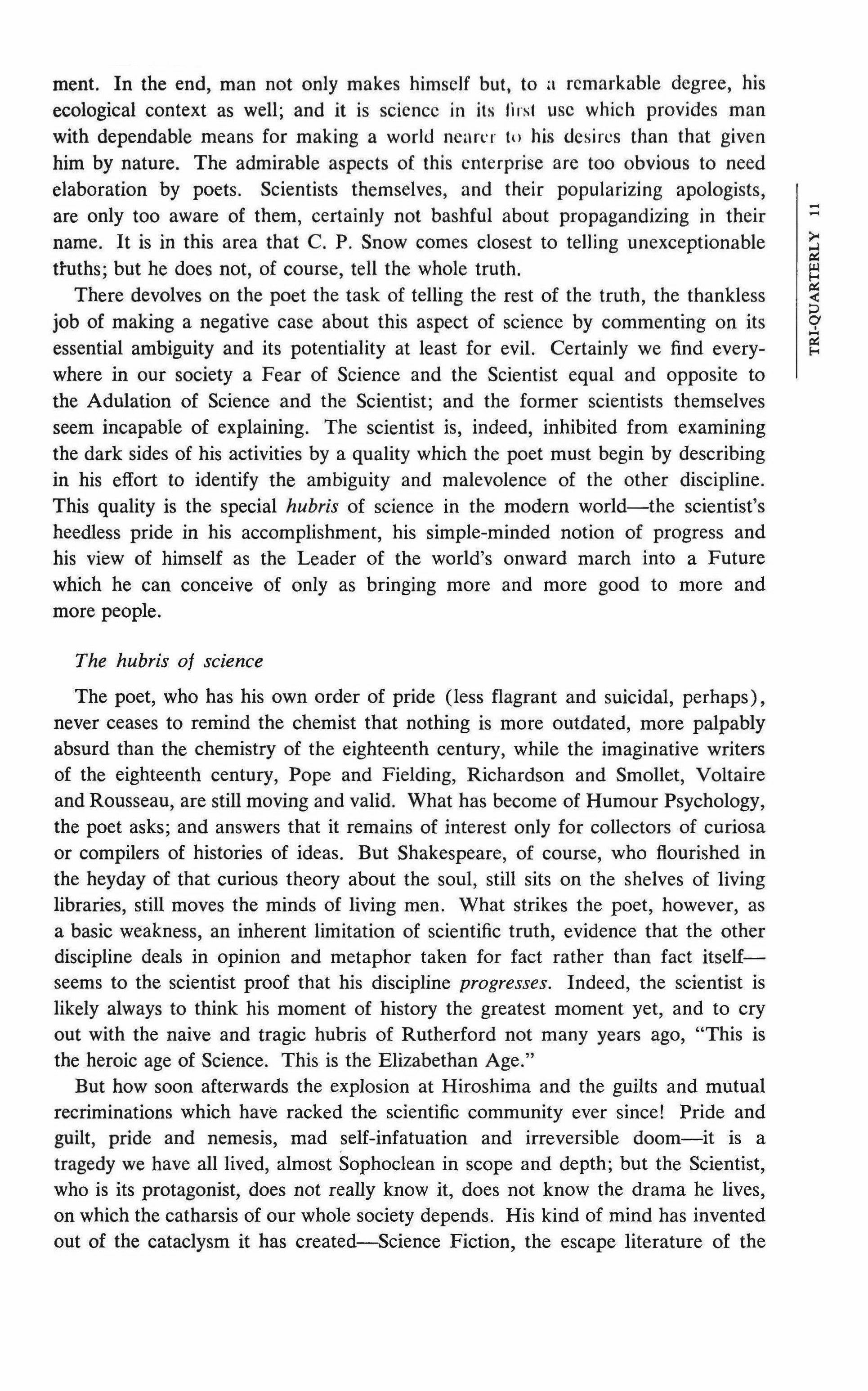
ment. In the end, man not only makes himself but, to a remarkable degree, his ecological context as well; and it is science in its first usc which provides man with dependable means for making a world nearer to his desires than that given him by nature. The admirable aspects of this enterprise are too obvious to need elaboration by poets. Scientists themselves, and their popularizing apologists, are only too aware of them, certainly not bashful about propagandizing in their name. It is in this area that C. P. Snow comes closest to telling unexceptionable truths; but he does not, of course, tell the whole truth.
There devolves on the poet the task of telling the rest of the truth, the thankless job of making a negative case about this aspect of science by commenting on its essential ambiguity and its potentiality at least for evil. Certainly we find everywhere in our society a Fear of Science and the Scientist equal and opposite to the Adulation of Science and the Scientist; and the former scientists themselves seem incapable of explaining. The scientist is, indeed, inhibited from examining the dark sides of his activities by a quality which the poet must begin by describing in his effort to identify the ambiguity and malevolence of the other discipline. This quality is the special hubris of science in the modern world-the scientist's heedless pride in his accomplishment, his simple-minded notion of progress and his view of himself as the Leader of the world's onward march into a Future which he can conceive of only as bringing more and more good to more and more people.
The hubris of science
The poet, who has his own order of pride (less flagrant and suicidal, perhaps), never ceases to remind the chemist that nothing is more outdated, more palpably absurd than the chemistry of the eighteenth century, while the imaginative writers of the eighteenth century, Pope and Fielding, Richardson and Smollet, Voltaire and Rousseau, are still moving and valid. What has become of Humour Psychology, the poet asks; and answers that it remains of interest only for collectors of curiosa or compilers of histories of ideas. But Shakespeare, of course, who flourished in the heyday of that curious theory about the soul, still sits on the shelves of living libraries, still moves the minds of living men. What strikes the poet, however, as a basic weakness, an inherent limitation of scientific truth, evidence that the other discipline deals in opinion and metaphor taken for fact rather than fact itselfseems to the scientist proof that his discipline progresses. Indeed, the scientist is likely always to think his moment of history the greatest moment yet, and to cry out with the naive and tragic hubris of Rutherford not many years ago, "This is the heroic age of Science. This is the Elizabethan Age."
But how soon afterwards the explosion at Hiroshima and the guilts and mutual recriminations which have racked the scientific community ever since! Pride and guilt, pride and nemesis, mad self-infatuation and irreversible doom-it is a tragedy we have all lived, almost Sophoclean in scope and depth; but the Scientist, who is its protagonist, does not really know it, does not know the drama he lives, on which the catharsis of our whole society depends. His kind of mind has invented out of the cataclysm it has created-Science Fiction, the escape literature of the
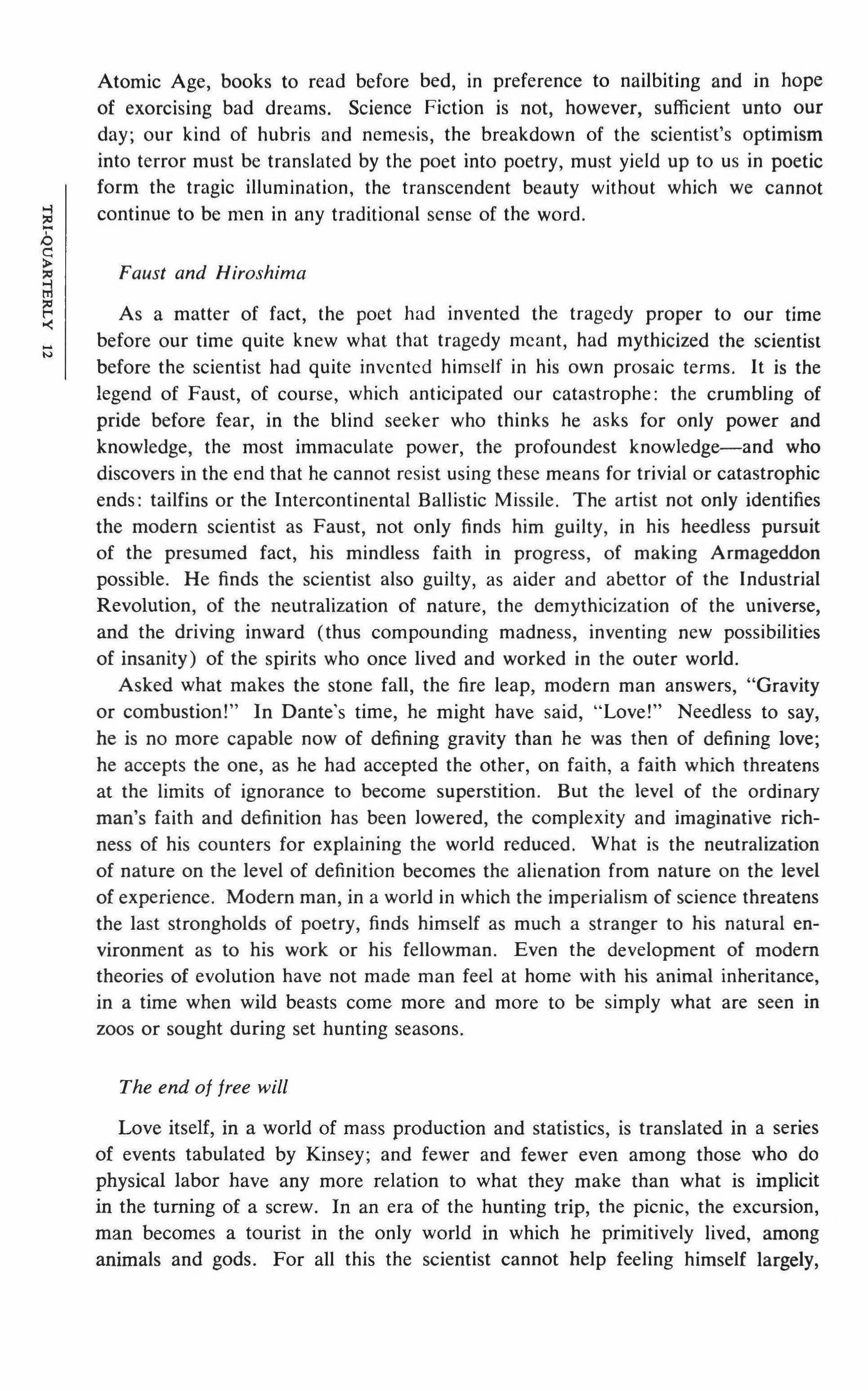
Atomic Age, books to read before bed, in preference to nailbiting and in hope of exorcising bad dreams. Science Fiction is not, however, sufficient unto our day; our kind of hubris and nemesis, the breakdown of the scientist's optimism into terror must be translated by the poet into poetry, must yield up to us in poetic form the tragic illumination, the transcendent beauty without which we cannot continue to be men in any traditional sense of the word.
Faust and Hiroshima
As a matter of fact, the poet had invented the tragedy proper to our time before our time quite knew what that tragedy meant, had mythicized the scientist before the scientist had quite invented himself in his own prosaic terms. It is the legend of Faust, of course, which anticipated our catastrophe: the crumbling of pride before fear, in the blind seeker who thinks he asks for only power and knowledge, the most immaculate power, the profoundest knowledge-and who discovers in the end that he cannot resist using these means for trivial or catastrophic ends: tailfins or the Intercontinental Ballistic Missile. The artist not only identifies the modern scientist as Faust, not only finds him guilty, in his heedless pursuit of the presumed fact, his mindless faith in progress, of making Armageddon possible. He finds the scientist also guilty, as aider and abettor of the Industrial Revolution, of the neutralization of nature, the demythicization of the universe, and the driving inward (thus compounding madness, inventing new possibilities of insanity) of the spirits who once lived and worked in the outer world.
Asked what makes the stone fall, the fire leap, modern man answers, "Gravity or combustion!" In Dante's time, he might have said, "Love!" Needless to say, he is no more capable now of defining gravity than he was then of defining love; he accepts the one, as he had accepted the other, on faith, a faith which threatens at the limits of ignorance to become superstition. But the level of the ordinary man's faith and definition has been lowered, the complexity and imaginative richness of his counters for explaining the world reduced. What is the neutralization of nature on the level of definition becomes the alienation from nature on the level of experience. Modern man, in a world in which the imperialism of science threatens the last strongholds of poetry, finds himself as much a stranger to his natural environment as to his work or his fellowman. Even the development of modem theories of evolution have not made man feel at home with his animal inheritance, in a time when wild beasts come more and more to be simply what are seen in zoos or sought during set hunting seasons.
The end of free will
Love itself, in a world of mass production and statistics, is translated in a series of events tabulated by Kinsey; and fewer and fewer even among those who do physical labor have any more relation to what they make than what is implicit in the turning of a screw. In an era of the hunting trip, the picnic, the excursion, man becomes a tourist in the only world in which he primitively lived, among animals and gods. For all this the scientist cannot help feeling himself largely,
N

though often indirectly, guilty, just as he is guilty for the general impoverishment of culture, the ugliness of cities, the triviality of the mass arts, and the extension of ennui (once an upper class privilege, a sign of distinction) to everyone. Science becomes technology and technology enables man to broadcast, in color, for twenty-four hours a day the sheerest distillation of boredom. And beyond even this, there are the newest sciences, with their corollary technologies of manipulating minds and engineering consent ("brainwashing," we call it when it is practised by our enemies for purposes other than selling goods), the so-called behavioral sciences, which have reached the point of destroying one of the most perilously constructed and dearly held myths by which men live the life of men: free will.
The other function
There is, however, quite another function of science, a function transcending our need to substitute an artificial environment for our natural one, to subdue the nature out of which we have come. This function involves the chastening of human pride, the giving of offense, the creative disturbance of a culture which inevitably tends to harden into rigid forms. And insofar as science is dedicated to an assault on smugness, well-meaning mediocrity, and insipid "peace of mind"-it is related to art rather than technology, finds poetry an ally rather than an unfriendly critic. The great offensive moments of the history of science have been often enough celebrated, but they cannot be too well known. What is important, and less obvious than the mere fact of their existence, is the sense in which they are closely related to what are sometimes treated as unequivocal triumphs of the first function of science. A single event regarded as an occasion for simple minded rejoicing will stir the poet's scorn, but regarded as an occasion for anguish win his sympathy.
Offense as salvation
It is in Physics that the first great offense was given, in the Copernican Revolution which took man from the imagined center of his universe and placed him on a difficult periphery. And in the Newtonian Synthesis a second offense was added, man forced to regard his cosmos as mechanical rather than living, alien rather than familiar. In the nineteenth century, it was the turn of the biological sciences, with the Darwinian version of the theory of Organic Evolution not only taking from man the illusion of a separate creation, but in its sociological extensions, suggesting that the society he continued to inhabit was less different from the jungle than he had been pleased to imagine. But by Psychology, strange offshoot of physiology, another offense was added, both Freudian and Behaviorist theoreticians suggesting that human action was motivated not by reason but by conditioned reflex or repressed and hence rationally uncontrollable urges. Latest and most terrible of the offenses, however, has been proferred once more by the physical sciences, by the fatal mass-energy equation of Einstein, whose technological implications have been developed to the point where, for the first time, the End of Man is imaginable by the dullest technician. Post-Darwinian Biology had suggested that the human being was a transient rather than a final form in a process without end, but it is an even more terrible thought to contemplate the
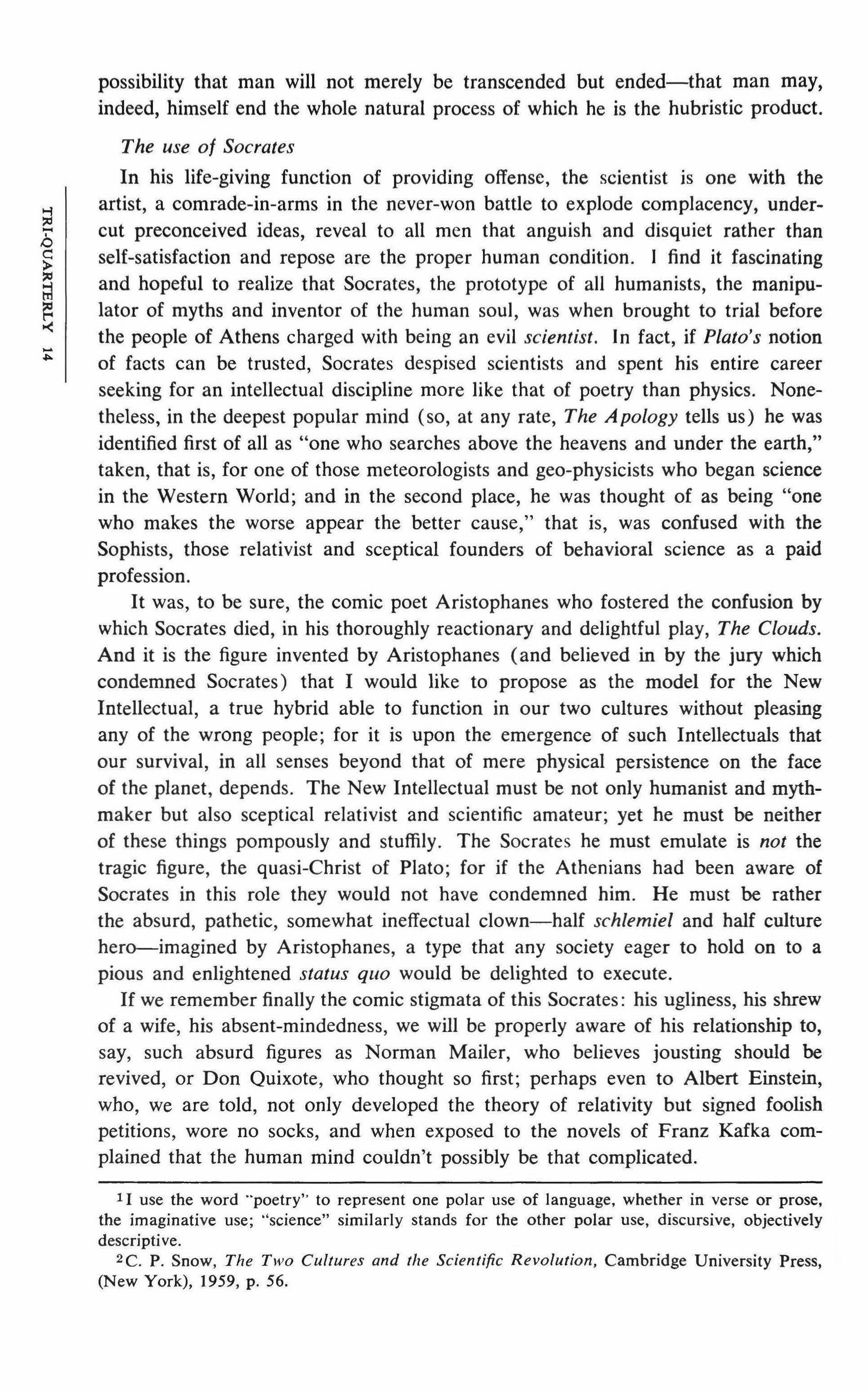
possibility that man will not merely be transcended but ended-that man may, indeed, himself end the whole natural process of which he is the hubristic product.
The use of Socrates
In his life-giving function of providing offense, the scientist is one with the artist, a comrade-in-arms in the never-won battle to explode complacency, undercut preconceived ideas, reveal to all men that anguish and disquiet rather than self-satisfaction and repose are the proper human condition. I find it fascinating and hopeful to realize that Socrates, the prototype of all humanists, the manipulator of myths and inventor of the human soul, was when brought to trial before the people of Athens charged with being an evil scientist. In fact, if Plato's notion of facts can be trusted, Socrates despised scientists and spent his entire career seeking for an intellectual discipline more like that of poetry than physics. Nonetheless, in the deepest popular mind (so, at any rate, The A pology tells us) he was identified first of all as "one who searches above the heavens and under the earth," taken, that is, for one of those meteorologists and geo-physicists who began science in the Western World; and in the second place, he was thought of as being "one who makes the worse appear the better cause," that is, was confused with the Sophists, those relativist and sceptical founders of behavioral science as a paid profession.
It was, to be sure, the comic poet Aristophanes who fostered the confusion by which Socrates died, in his thoroughly reactionary and delightful play, The Clouds. And it is the figure invented by Aristophanes (and believed in by the jury which condemned Socrates) that I would like to propose as the model for the New Intellectual, a true hybrid able to function in our two cultures without pleasing any of the wrong people; for it is upon the emergence of such Intellectuals that our survival, in all senses beyond that of mere physical persistence on the face of the planet, depends. The New Intellectual must be not only humanist and mythmaker but also sceptical relativist and scientific amateur; yet he must be neither of these things pompously and stuffily. The Socrates he must emulate is not the tragic figure, the quasi-Christ of Plato; for if the Athenians had been aware of Socrates in this role they would not have condemned him. He must be rather the absurd, pathetic, somewhat ineffectual clown-half schlemiel and half culture hero-imagined by Aristophanes, a type that any society eager to hold on to a pious and enlightened status quo would be delighted to execute.
If we remember finally the comic stigmata of this Socrates: his ugliness, his shrew of a wife, his absent-mindedness, we will be properly aware of his relationship to, say, such absurd figures as Norman Mailer, who believes jousting should be revived, or Don Quixote, who thought so first; perhaps even to Albert Einstein, who, we are told, not only developed the theory of relativity but signed foolish petitions, wore no socks, and when exposed to the novels of Franz Kafka complained that the human mind couldn't possibly be that complicated.
1 I use the word "poetry" to represent one polar use of language, whether in verse or prose, the imaginative use; "science" similarly stands for the other polar use, discursive, objectively descriptive.
2C. P. Snow, The Two Cultures and the Scientific Revolution, Cambridge University Press, (New York), 1959, p. 56.
The literary mood of the 1930's
STEPHEN SPENDER
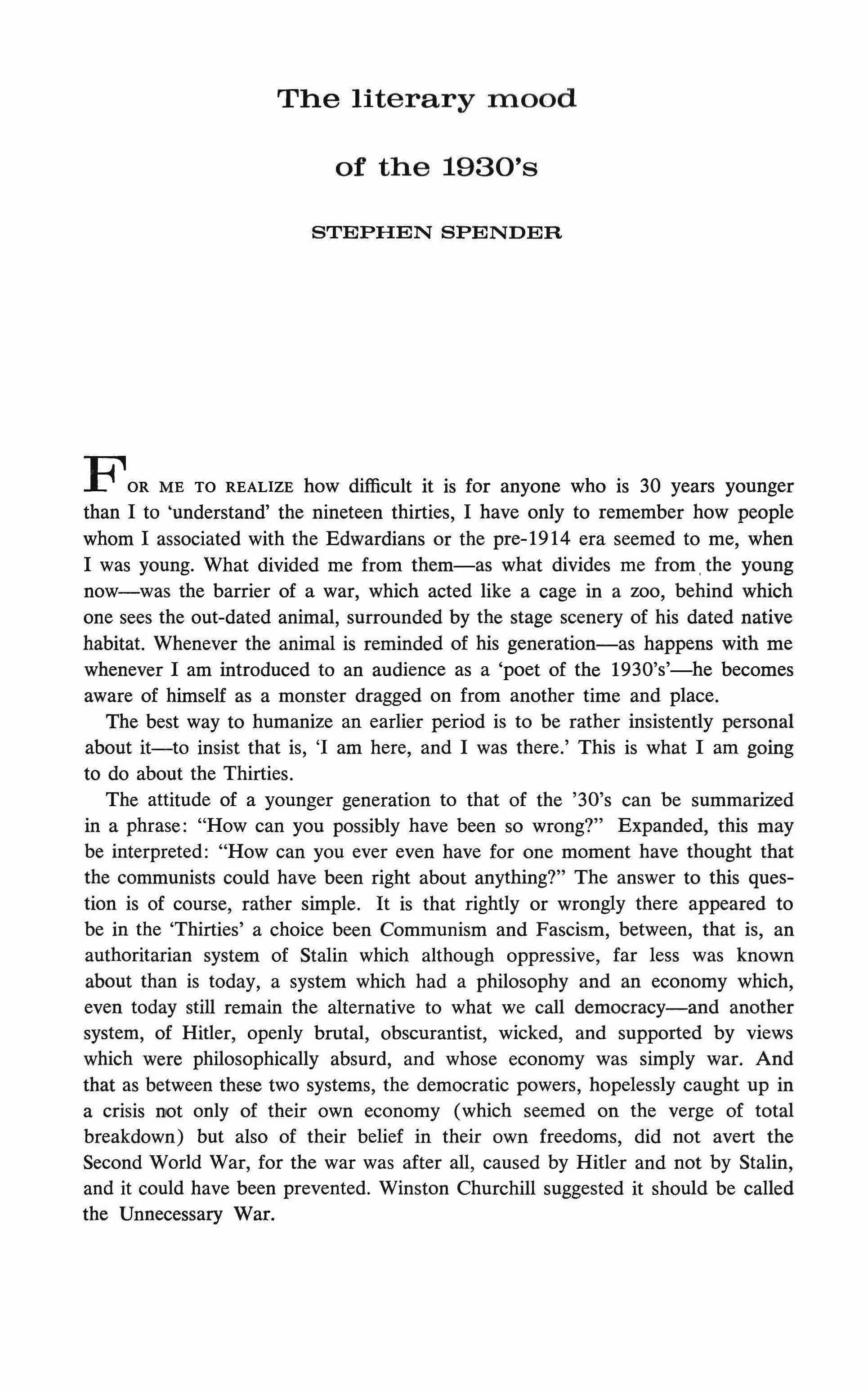
FOR ME TO REALIZE how difficult it is for anyone who is 30 years younger than I to 'understand' the nineteen thirties, I have only to remember how people whom I associated with the Edwardians or the pre-1914 era seemed to me, when I was young. What divided me from them-as what divides me from, the young now-was the barrier of a war, which acted like a cage in a zoo, behind which one sees the out-dated animal, surrounded by the stage scenery of his dated native habitat. Whenever the animal is reminded of his generation-as happens with me whenever I am introduced to an audience as a 'poet of the 1930's'-he becomes aware of himself as a monster dragged on from another time and place.
The best way to humanize an earlier period is to be rather insistently personal about it-to insist that is, 'I am here, and I was there.' This is what I am going to do about the Thirties.
The attitude of a younger generation to that of the '30's can be summarized in a phrase: "How can you possibly have been so wrong?" Expanded, this may be interpreted: "How can you ever even have for one moment have thought that the communists could have been right about anything?" The answer to this question is of course, rather simple. It is that rightly or wrongly there appeared to be in the 'Thirties' a choice been Communism and Fascism, between, that is, an authoritarian system of Stalin which although oppressive, far less was known about than is today, a system which had a philosophy and an economy which, even today still remain the alternative to what we call democracy-and another system, of Hitler, openly brutal, obscurantist, wicked, and supported by views which were philosophically absurd, and whose economy was simply war. And that as between these two systems, the democratic powers, hopelessly caught up in a crisis not only of their own economy (which seemed on the verge of total breakdown) but also of their belief in their own freedoms, did not avert the Second World War, for the war was after all, caused by Hitler and not by Stalin, and it could have been prevented. Winston Churchill suggested it should be called the Unnecessary War.

There was a challenge in the 'Thirties' to save civilization and humanity; and the literary mood of the decade was largely coloured by writers meeting, or refusing to meet this challenge. The so-called politics of the period, in the democratic countries, were essentially the politics of the unpolitical. For the first thing that strikes one about this odd and freakish decade is that the voices most stridently raised-the voices which make us think of the 'Thirties' as the 'Thirties'-were those of amateurs, refugees, exiles. The statesmen who might have opposed Hitler and stopped the war were themselves rendered ineffective. It is a striking thought that during the whole of the period from 1933 to 1940, Churchill was reduced to amateur status-by his own political party. The reason why he was put on ice was precisely that he was anti-Nazi. The period which literary people think of today as the anti-Fascist decade was in fact that in which among the democracies there was no effective anti-Fascist opposition. It was this vacuum of democratic will among the democracies themselves, which caused the anti-Fascist movements.'
My concern here, however, is literature, and not politics, though it is difficult to separate the two. It is difficult to look at much of what was written during the period without being diverted to considering the politics which stimulated the writing.
Taking a bird's eye view of the twenty-years, 1919 to 1939, one could make a generalization about them, which explains a great many things that happened in the arts. Quite simply, there was a vacuum, or a whole number of vacuums. Initially, the between wars vacuum was caused by the failure of the victorious powers to lay the foundations of a better world at the Treaty of Versailles. The, withdrawal of America into isolation, and her rejection of Wilson's Charter of the League of Nations, the imposition of punitive reparations on the one hopeful community which emerged from the war-the Weimar Republic-were followed by the complete breakdown of the economy of central Europe in the 1920's: all these voids at first resulted in a corresponding vacuum in literature. There is, surely, the connection of a chain reaction between the Treaty of Versailles, (resulting in that pathetic parody of a new world, The League of Nations) and Spengler's The Decline of the West, and The Waste Land. The literature of the' 1920's expresses the sense of a vacuum. Many of the masterpieces of the '20's1 have what might be called a negative political aspect. The Waste Land expresses despair about the public world-which simply is, the waste land-the perennial lovers endemic in D.H. Lawrence's novels are occupied in evoking instinctual forces and dark gods, as subconscious forces called in against the collapse of the public consciousness of political society. There are even suggestions in Lawrence from time to time that the inner forces can redeem the outer world of politics, after its total collapse. Though expressed in terms of personal relations, E. M. Forster poses ir A Passage to India (oddly enough perhaps the most politically influential novel of this century) the question whether the British should leave India (the answer being that they should, because as long as they are there, personal relations between Indians and English are impossible.)
The writers of the 1930's were followers of the writers of the 1920's, whom they not only admired but have continued to admire. They inherited from the
1920's the attitudes which were the result of the l'Ikl'ls of the vacuum in the whole public sphere. The writers of the 1930's to begin with were basically nonpolitical, I think that if one looked into the early work of the writers of this decade it would be difficult to find a writer less politically inclined than, say, Auden. This is not only true of the English, like Eliot, Huxley and Waugh, and Americans, like Hemingway, but also of all the French surrealists-who included at that time Louis Aragon, the most influential communist writer, Tristan Tzara, and, apart
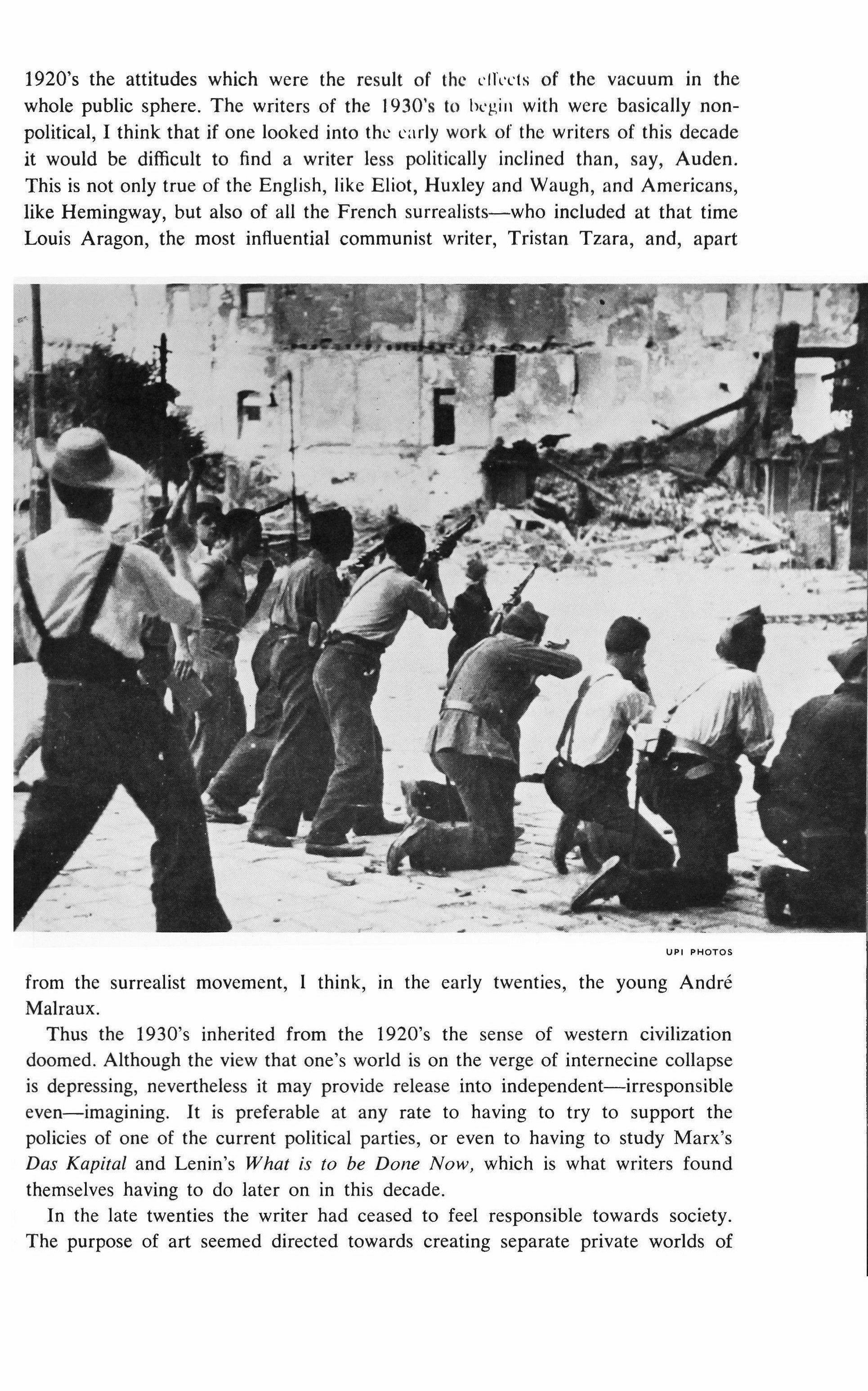
from the surrealist movement, I think, in the early twenties, the young Andre Malraux.
Thus the 1930's inherited from the 1920's the sense of western civilization doomed. Although the view that one's world is on the verge of internecine collapse is depressing, nevertheless it may provide release into independent-irresponsible even-imagining. It is preferable at any rate to having to try to support the policies of one of the current political parties, or even to having to study Marx's Das Kapital and Lenin's What is to be Done Now, which is what writers found themselves having to do later on in this decade.
In the late twenties the writer had ceased to feel responsible towards society. The purpose of art seemed directed towards creating separate private worlds of
UPI PHOTOS
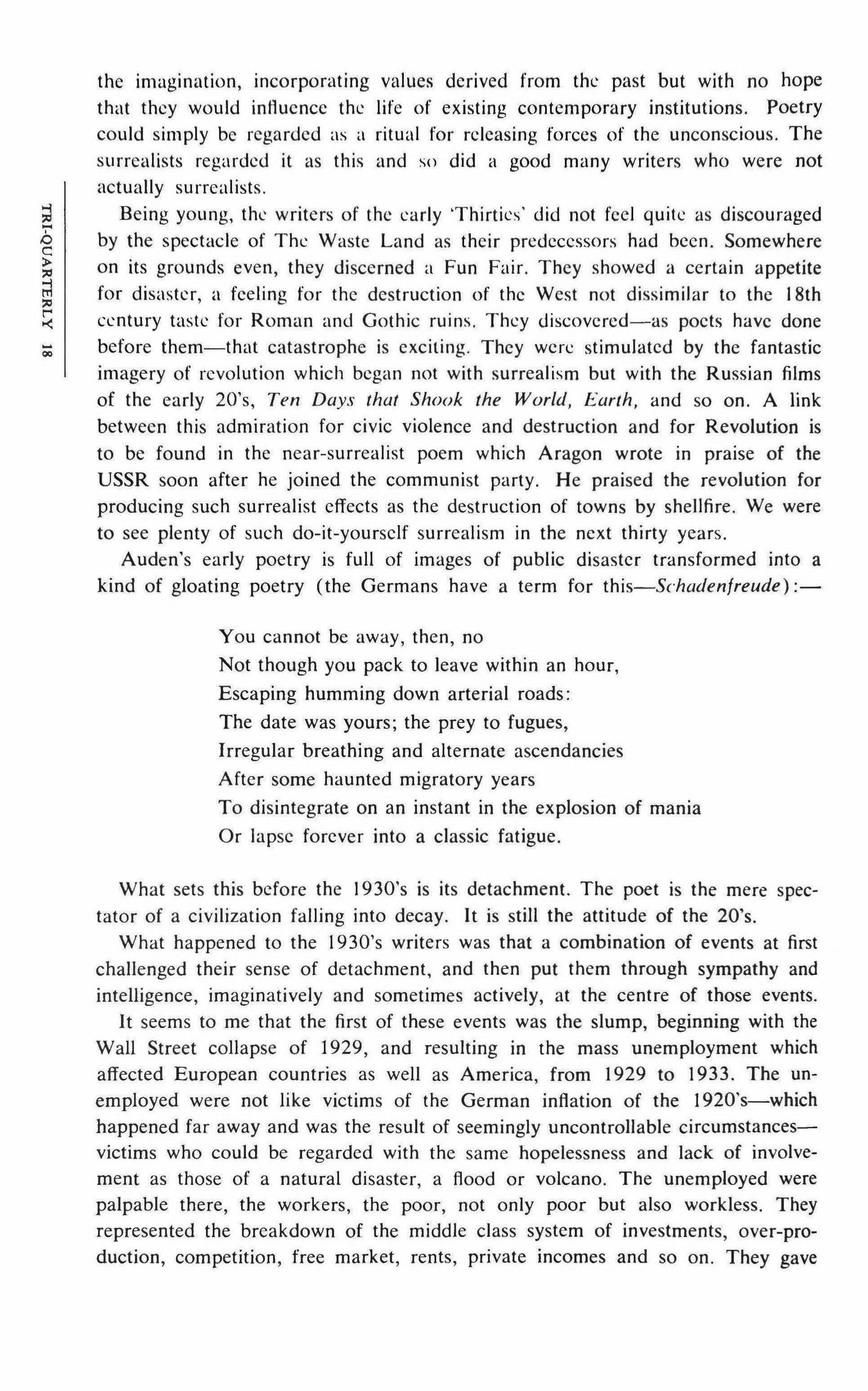
the imagination, incorporating values derived from the past but with no hope that they would influence the life of existing contemporary institutions. Poetry could simply be regarded as a ritual for releasing forces of the unconscious. The surrealists regarded it as this and so did a good many writers who were not actually surrealists.
Being young, the writers of the early 'Thirties' did not feel quite as discouraged by the spectacle of The Waste Land as their predecessors had been. Somewhere on its grounds even, they discerned a Fun Fair. They showed a certain appetite for disaster, a feeling for the destruction of the West not dissimilar to the 18th century taste for Roman and Gothic ruins. They discovered-as poets have done before them-that catastrophe is exciting. They were stimulated by the fantastic imagery of revolution which began not with surrealism but with the Russian films of the early 20's, Ten Days that Shook the World, Earth, and so on. A link between this admiration for civic violence and destruction and for Revolution is to be found in the near-surrealist poem which Aragon wrote in praise of the USSR soon after he joined the communist party. He praised the revolution for producing such surrealist effects as the destruction of towns by sheJlfire. We were to see plenty of such do-it-yourself surrealism in the next thirty years.
Auden's early poetry is full of images of public disaster transformed into a kind of gloating poetry (the Germans have a term for this-Schadenfreude);-
You cannot be away, then, no
Not though you pack to leave within an hour, Escaping humming down arterial roads:
The date was yours; the prey to fugues, Irregular breathing and alternate ascendancies
After some haunted migratory years
To disintegrate on an instant in the explosion of mania Or lapse forever into a classic fatigue.
What sets this before the 1930's is its detachment. The poet is the mere spectator of a civilization falling into decay. It is still the attitude of the 20's.
What happened to the 1930's writers was that a combination of events at first challenged their sense of detachment, and then put them through sympathy and intelligence, imaginatively and sometimes actively, at the centre of those events. It seems to me that the first of these events was the slump, beginning with the Wall Street collapse of 1929, and resulting in the mass unemployment which affected European countries as well as America, from 1929 to 1933. The unemployed were not like victims of the German inflation of the 1920's-which happened far away and was the result of seemingly uncontrollable circumstancesvictims who could be regarded with the same hopelessness and lack of involvement as those of a natural disaster, a flood or volcano. The unemployed were palpable there, the workers, the poor, not only poor but also workless. They represented the breakdown of the middle class system of investments, over-production, competition, free market, rents, private incomes and so on. They gave
00

palpable expression to the bad conscience of money, which though often suppressed does nag at the more sensitive members of all exploiting class. It is of course a historical fact that ever since the mid-nineteenth century the European intelligentsia has been anti-bourgeois. Whenever a situation arises in which antibourgeois feeling assumes political expression, European intellectuals have found themselves-often to their own amazement-supporting the proletariat against the bourgeoisie. Witness Baudelaire's support of the Paris Commune. In the 1930's there was a strong revival of anti-bourgeois feeling.
Unemployment demonstrated that the system which put invested money into the pockets of one class could no longer provide jobs for the working class which it exploited. This meant that middle class intellectuals who were themselves beneficiaries of this middle class system, felt that it was no longer justified. They had an uneasy feeling that they themselves were not justified, unless they could support policies and parties which could remedy the situation.
Remedies for unemployment which today could be accepted as non-partisan, were all regarded in the 1930's-even when they came from a Roosevelt-as socialistic. Hence to be sympathetic towards millions of people who were unemployed and to support the measures which would cure unemployment wasas supporters of the New Deal were later to find-to be a socialist, halfway to being a communist, as it seemed then.
The second event which produced the situation of the 1930's was the victory of the National Socialist party in Germany in February 1933. The third was the outbreak of the Spanish Civil War in the spring of 1936.
The triumph of Hitler had the effect of strengthening the bond between those whom Jules Romains in his novel called "The Men of Good Will"-the nonpolitical intellectuals forced into politics-and the victims. Just when the crisis of unemployment was beginning to be overcome, Hitler produced a new set of victims-his political opponents, liberal, socialist and communist, and independentthinking intellectuals. There was the burning of books, the exiling of writers, the persecution of Jews, a revival of mediaeval horrors in the centre of Europe. Among other things Nazism was a political movement directed against the life of the intellectuals. It converted intellectual activity into a political interest, a kind of "lobby" of the intellectuals. Nor was this just a domestic German affair. By a series of political coups, Hitler having removed all the German grievances arising from the Treaty of Versailles, went on to occupy Austria, to threaten freedom in other countries, and to make massive preparations for war. The master race had ambitions not only to control Germany but Europe and ultimately the whole world.
I have suggested that essentially the attitudes of the 1930's are to be seen as the result of the existence of moral and political vacuums, which became filled by the intellectuals in the absence of statesmen who were prepared to state and defend freedom. Confronted by Hitler and Mussolini, the governments of England offered nothing but that absence of moral response which really characterized European politics of the democracies ever since 1918. No protests were made against acts in Europe which victimized innocent individuals and outraged traditions of freedom of expression which had been won as the result of centuries of
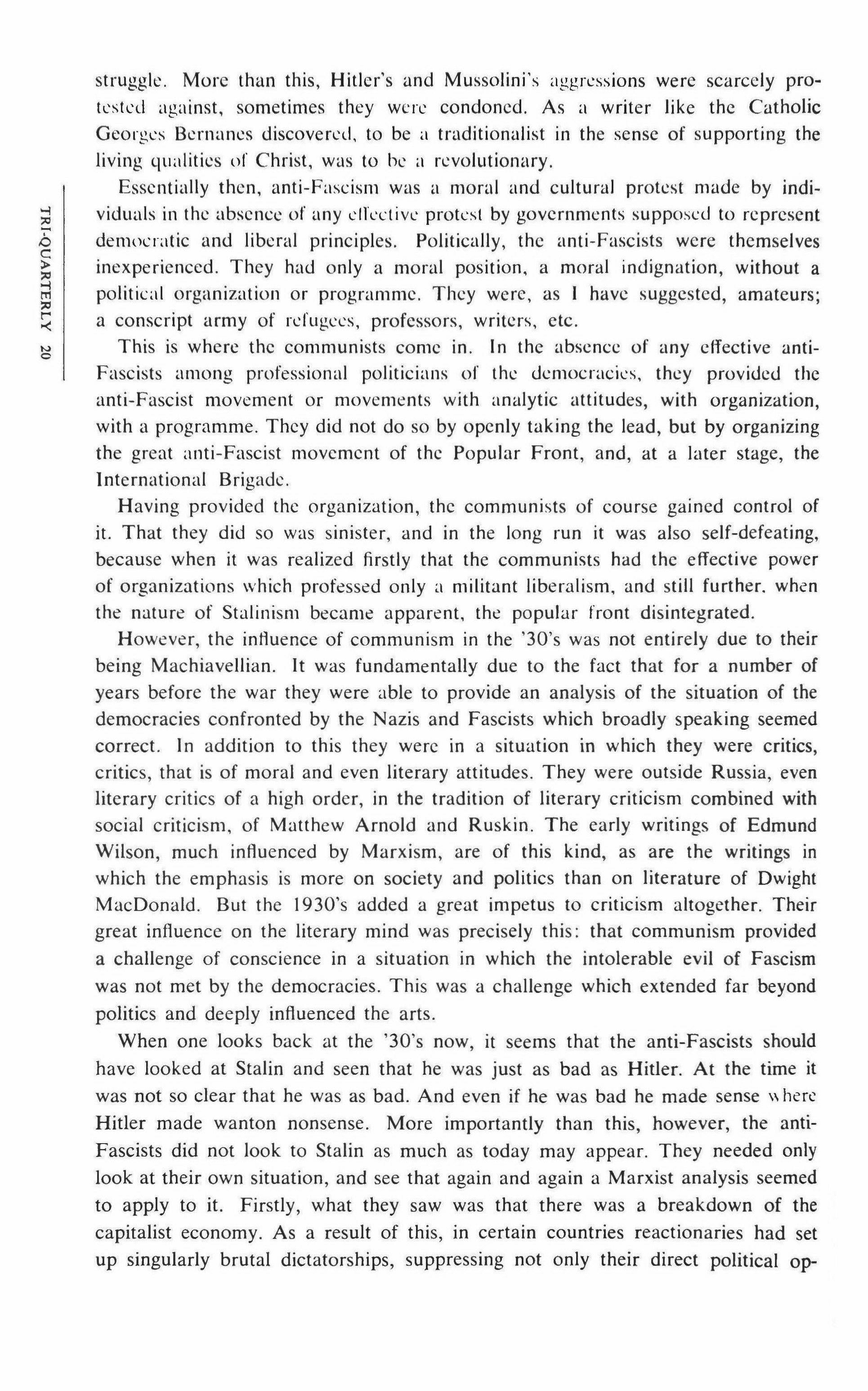
struggle. More than this, Hitler's and Mussolini's aggressions were scarcely protested against, sometimes they wen: condoned. As a writer like the Catholic Georges Bcrnuncs discovered, to be a traditionalist in the sense of supporting the living qualities of Christ, was to be a revolutionary.
Essentially then, anti-Fascism was a moral and cultural protest made by individuals in the absence of any cll'cctivc protest by governments supposed to represent democratic and liberal principles. Politically, the anti-Fascists were themselves inexperienced. They had only a moral position, a moral indignation, without a political organization or programme. They were, as I have suggested, amateurs; a conscript army of refugees, professors, writers, etc.
This is where the communists come in. I n the absence of any effective antiFascists among professional politicians of the democracies, they provided the anti-Fascist movement or movements with analytic attitudes, with organization, with a programme. They did not do so by openly taking the lead, but by organizing the great anti-Fascist movement of the Popular Front, and, at a later stage, the International Brigade.
Having provided the organization, the communists of course gained control of it. That they did so was sinister, and in the long run it was also self-defeating, because when it was realized firstly that the communists had the effective power of organizations which professed only a militant liberalism, and still further. when the nature of Stalinism became apparent, the popular front disintegrated.
However, the influence of communism in the '30's was not entirely due to their being Machiavellian. It was fundamentally due to the fact that for a number of years before the war they were able to provide an analysis of the situation of the democracies confronted by the Nazis and Fascists which broadly speaking seemed correct. In addition to this they were in a situation in which they were critics, critics, that is of moral and even literary attitudes. They were outside Russia, even literary critics of a high order, in the tradition of literary criticism combined with social criticism, of Matthew Arnold and Ruskin. The early writings of Edmund Wilson, much influenced by Marxism, are of this kind, as are the writings in which the emphasis is more on society and politics than on literature of Dwight MacDonald. But the 1930's added a great impetus to criticism altogether. Their great influence on the literary mind was precisely this: that communism provided a challenge of conscience in a situation in which the intolerable evil of Fascism was not met by the democracies. This was a challenge which extended far beyond politics and deeply influenced the arts.
When one looks back at the '30's now, it seems that the anti-Fascists should have looked at Stalin and seen that he was just as bad as Hitler. At the time it was not so clear that he was as bad. And even if he was bad he made sense \\ here Hitler made wanton nonsense. More importantly than this, however, the antiFascists did not look to Stalin as much as today may appear. They needed only look at their own situation, and see that again and again a Marxist analysis seemed to apply to it. Firstly, what they saw was that there was a breakdown of the capitalist economy. As a result of this, in certain countries reactionaries had set up singularly brutal dictatorships, suppressing not only their direct political op-
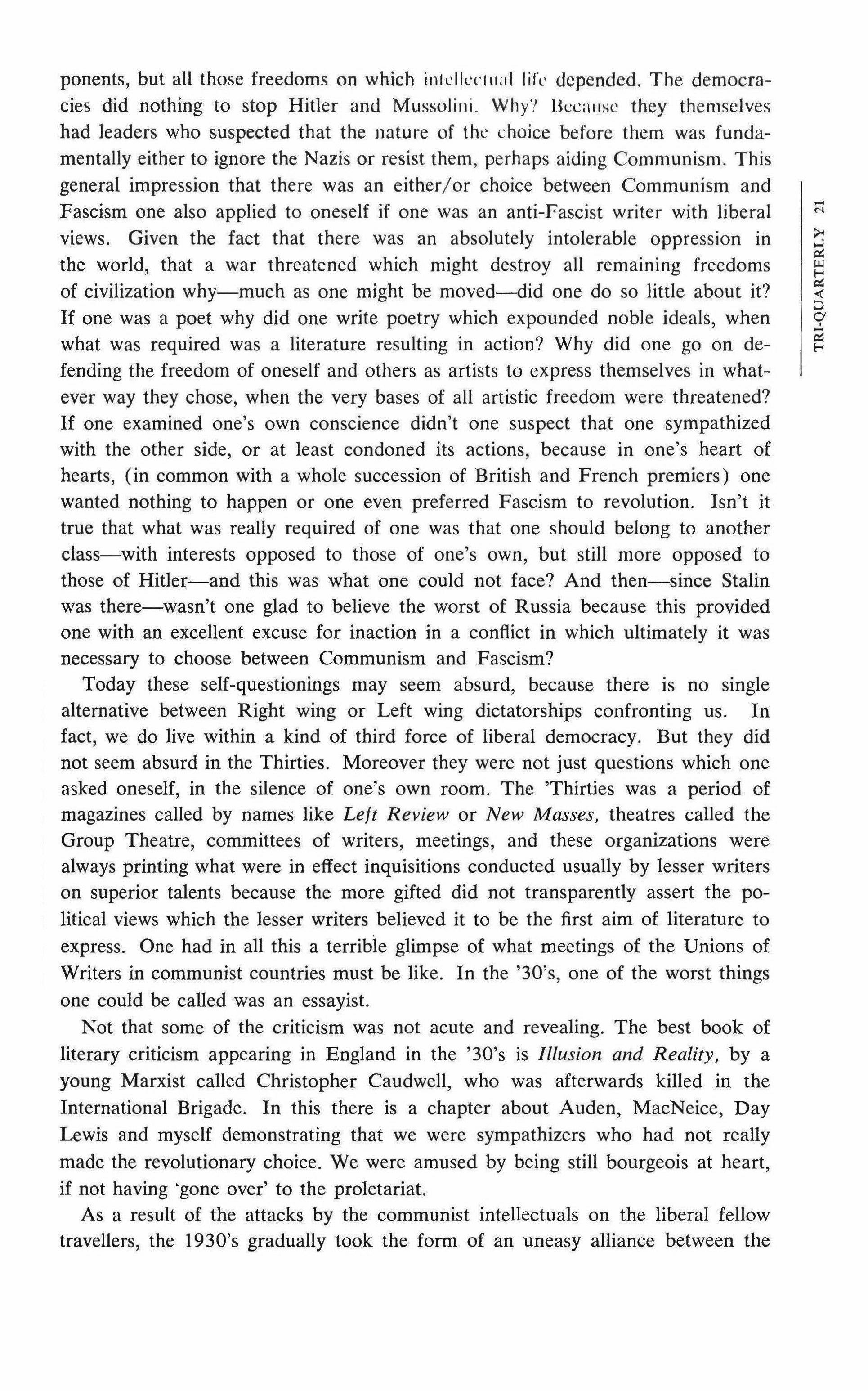
ponents, but all those freedoms on which intellectual life depended. The democracies did nothing to stop Hitler and Mussolini. Why? Because they themselves had leaders who suspected that the nature of the choice before them was fundamentally either to ignore the Nazis or resist them, perhaps aiding Communism. This general impression that there was an either/or choice between Communism and Fascism one also applied to oneself if one was an anti-Fascist writer with liberal views. Given the fact that there was an absolutely intolerable oppression in the world, that a war threatened which might destroy all remaining freedoms of civilization why-much as one might be moved-did one do so little about it? If one was a poet why did one write poetry which expounded noble ideals, when what was required was a literature resulting in action? Why did one go on defending the freedom of oneself and others as artists to express themselves in whatever way they chose, when the very bases of all artistic freedom were threatened? If one examined one's own conscience didn't one suspect that one sympathized with the other side, or at least condoned its actions, because in one's heart of hearts, (in common with a whole succession of British and French premiers) one wanted nothing to happen or one even preferred Fascism to revolution. Isn't it true that what was really required of one was that one should belong to another class-with interests opposed to those of one's own, but still more opposed to those of Hitler-and this was what one could not face? And then-since Stalin was there-wasn't one glad to believe the worst of Russia because this provided one with an excellent excuse for inaction in a conflict in which ultimately it was necessary to choose between Communism and Fascism?
Today these self-questionings may seem absurd, because there is no single alternative between Right wing or Left wing dictatorships confronting us. In fact, we do live within a kind of third force of liberal democracy. But they did not seem absurd in the Thirties. Moreover they were not just questions which one asked oneself, in the silence of one's own room. The 'Thirties was a period of magazines called by names like Left Review or New Masses, theatres called the Group Theatre, committees of writers, meetings, and these organizations were always printing what were in effect inquisitions conducted usually by lesser writers on superior talents because the more gifted did not transparently assert the political views which the lesser writers believed it to be the first aim of literature to express. One had in all this a terrible glimpse of what meetings of the Unions of Writers in communist countries must be like. In the '30's, one of the worst things one could be called was an essayist.
Not that some of the criticism was not acute and revealing. The best book of literary criticism appearing in England in the '30's is Illusion and Reality, by a young Marxist called Christopher Caudwell, who was afterwards killed in the International Brigade. In this there is a chapter about Auden, MacNeice, Day Lewis and myself demonstrating that we were sympathizers who had not really made the revolutionary choice. We were amused by being still bourgeois at heart, if not having 'gone over' to the proletariat.
As a result of the attacks by the communist intellectuals on the liberal fellow travellers, the 1930's gradually took the form of an uneasy alliance between the
N
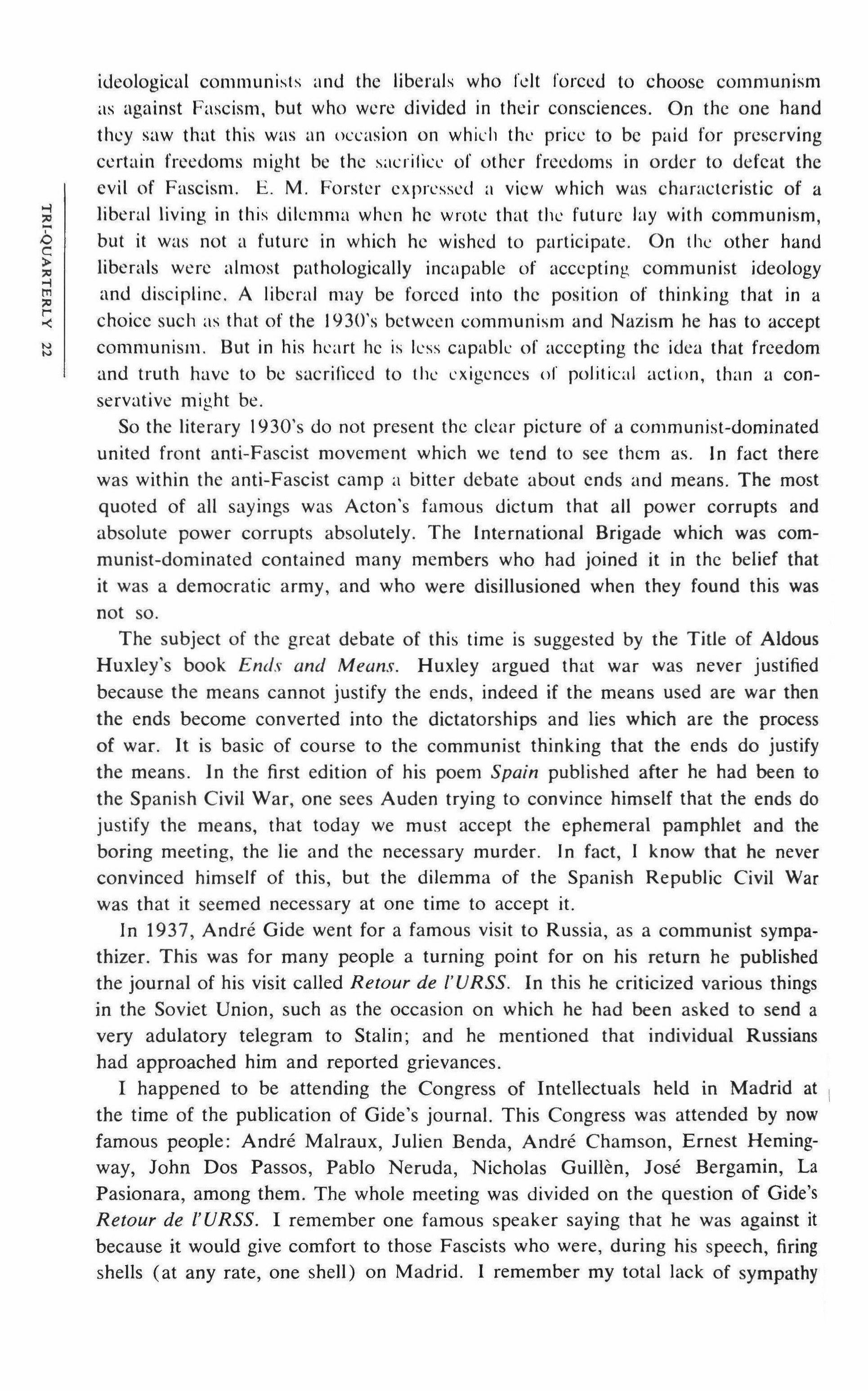
ideological communists and the liberals who kit forced to choose communism as against Fascism, but who were divided in their consciences. On the one hand they saw that this was an occasion on which the price to be paid for preserving certain freedoms might be the sacrifice of other freedoms in order to defeat the evil of Fascism. E. M. Forster expressed a view which was characteristic of a ;l liberal living in this dilemma when he wrote that the future lay with communism,
but it was not a future in which he wished to participate. On the other hand
liberals were almost pathologically incapable of accepting communist ideology
and discipline. A liberal may be forced into the position of thinking that in a
choice such as that of the 1930's between communism and Nazism he has to accept
communism. But in his heart he is less capable of accepting the idea that freedom and truth have to be sacrificed to the cxigcnccs of political action, than a conservative might be.
So the literary 1930's do not present the clear picture of a communist-dominated united front anti-Fascist movement which we tend to see them as. In fact there was within the anti-Fascist camp a bitter debate about ends and means. The most quoted of all sayings was Acton's famous dictum that all power corrupts and absolute power corrupts absolutely. The International Brigade which was communist-dominated contained many members who had joined it in the belief that it was a democratic army, and who were disillusioned when they found this was not so.
The subject of the great debate of this time is suggested by the Title of Aldous Huxley's book Ends and Means. Huxley argued that war was never justified because the means cannot justify the ends, indeed if the means used are war then the ends become converted into the dictatorships and lies which are the process of war. It is basic of course to the communist thinking that the ends do justify the means. In the first edition of his poem Spain published after he had been to the Spanish Civil War, one sees Auden trying to convince himself that the ends do justify the means, that today we must accept the ephemeral pamphlet and the boring meeting, the lie and the necessary murder. In fact, I know that he never convinced himself of this, but the dilemma of the Spanish Republic Civil War was that it seemed necessary at one time to accept it.
In 1937, Andre Gide went for a famous visit to Russia, as a communist sympathizer. This was for many people a turning point for on his return he published the journal of his visit called Retour de l' URSS. In this he criticized various things in the Soviet Union, such as the occasion on which he had been asked to send a very adulatory telegram to Stalin; and he mentioned that individual Russians had approached him and reported grievances.
I happened to be attending the Congress of Intellectuals held in Madrid at the time of the publication of Gide's journal. This Congress was attended by now famous peo.ple: Andre Malraux, Julien Benda, Andre Chamson, Ernest Hemingway, John Dos Passos, Pablo Neruda, Nicholas Guillen, Jose Bergamin, La Pasionara, among them. The whole meeting was divided on the question of Gide's Retour de I'URSS. I remember one famous speaker saying that he was against it because it would give comfort to those Fascists who were, during his speech, firing shells (at any rate, one shell) on Madrid. I remember my total lack of sympathy
�
--i �
�
�
�
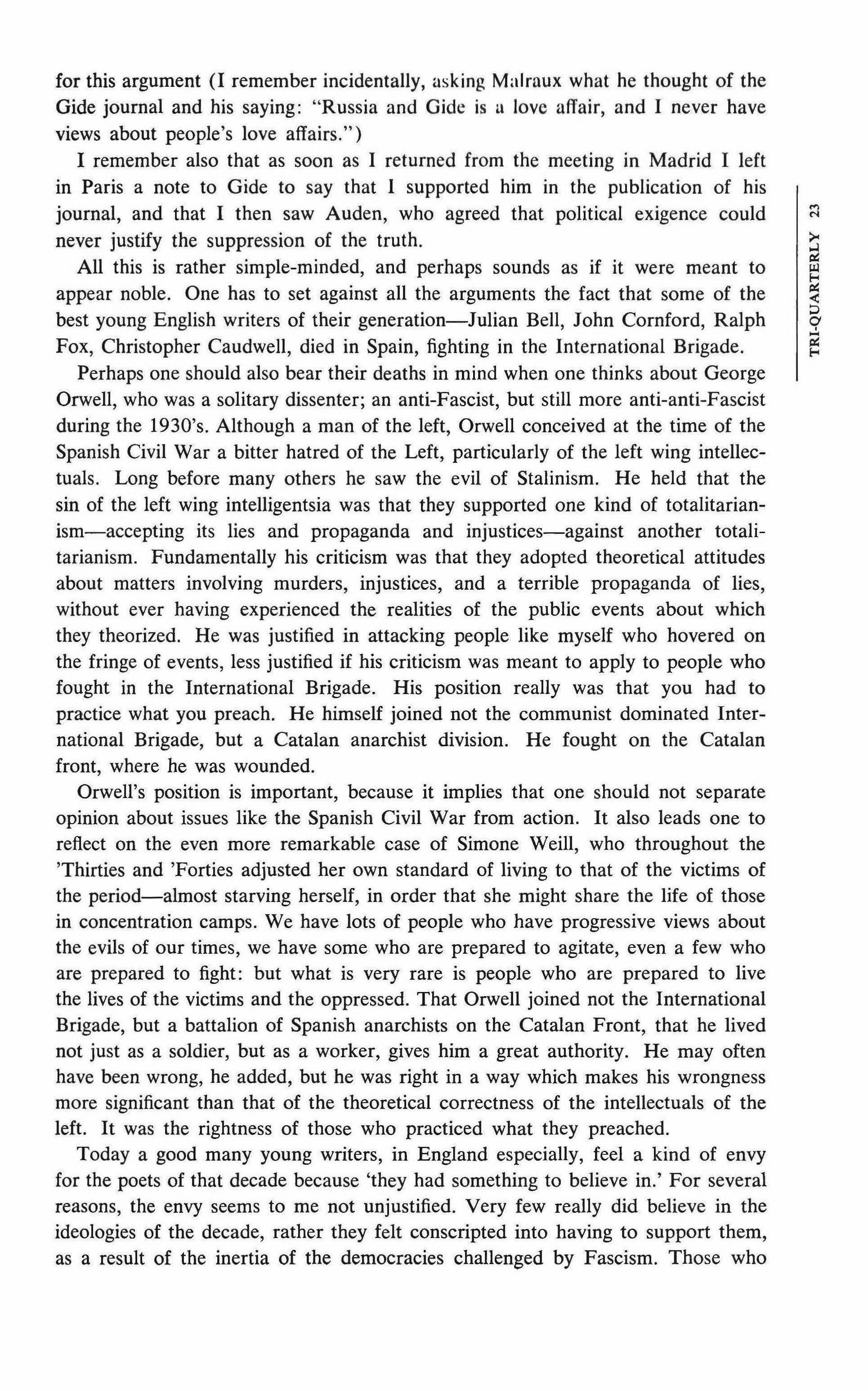
for this argument (I remember incidentally, asking Malraux what he thought of the Gide journal and his saying: "Russia and Gide is u love affair, and I never have views about people's love affairs.")
I remember also that as soon as I returned from the meeting in Madrid I left in Paris a note to Gide to say that I supported him in the publication of his journal, and that I then saw Auden, who agreed that political exigence could never justify the suppression of the truth.
All this is rather simple-minded, and perhaps sounds as if it were meant to appear noble. One has to set against all the arguments the fact that some of the best young English writers of their generation-Julian Bell, John Cornford, Ralph Fox, Christopher Caudwell, died in Spain, fighting in the International Brigade.
Perhaps one should also bear their deaths in mind when one thinks about George Orwell, who was a solitary dissenter; an anti-Fascist, but still more anti-anti-Fascist during the 1930's. Although a man of the left, Orwell conceived at the time of the Spanish Civil War a bitter hatred of the Left, particularly of the left wing intellectuals. Long before many others he saw the evil of Stalinism. He held that the sin of the left wing intelligentsia was that they supported one kind of totalitarianism-accepting its lies and propaganda and injustices-against another totalitarianism. Fundamentally his criticism was that they adopted theoretical attitudes about matters involving murders, injustices, and a terrible propaganda of lies, without ever having experienced the realities of the public events about which they theorized. He was justified in attacking people like myself who hovered on the fringe of events, less justified if his criticism was meant to apply to people who fought in the International Brigade. His position really was that you had to practice what you preach. He himself joined not the communist dominated International Brigade, but a Catalan anarchist division. He fought on the Catalan front, where he was wounded.
Orwell's position is important, because it implies that one should not separate opinion about issues like the Spanish Civil War from action. It also leads one to reflect on the even more remarkable case of Simone Weill, who throughout the 'Thirties and 'Forties adjusted her own standard of living to that of the victims of the period-almost starving herself, in order that she might share the life of those in concentration camps. We have lots of people who have progressive views about the evils of our times, we have some who are prepared to agitate, even a few who are prepared to fight: but what is very rare is people who are prepared to live the lives of the victims and the oppressed. That Orwell joined not the International Brigade, but a battalion of Spanish anarchists on the Catalan Front, that he lived not just as a soldier, but as a worker, gives him a great authority. He may often have been wrong, he added, but he was right in a way which makes his wrongness more significant than that of the theoretical correctness of the intellectuals of the left. It was the rightness of those who practiced what they preached.
Today a good many young writers, in England especially, feel a kind of envy for the poets of that decade because 'they had something to believe in.' For several reasons, the envy seems to me not unjustified. Very few really did believe in the ideologies of the decade, rather they felt conscripted into having to support them, as a result of the inertia of the democracies challenged by Fascism. Those who
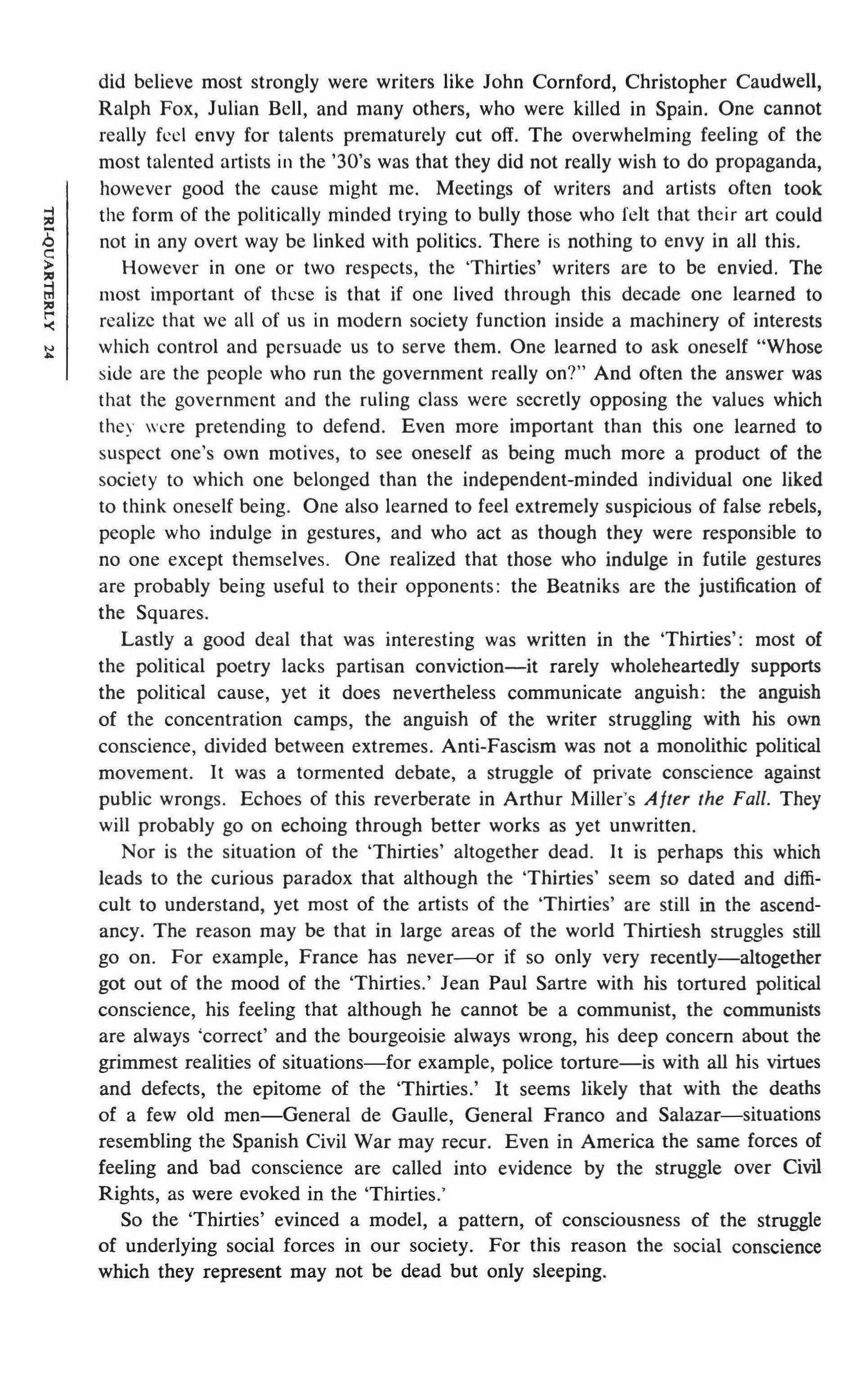
did believe most strongly were writers like John Cornford, Christopher Caudwell, Ralph Fox, Julian Bell, and many others, who were killed in Spain. One cannot really feci envy for talents prematurely cut off. The overwhelming feeling of the most talented artists in the '30's was that they did not really wish to do propaganda, however good the cause might me. Meetings of writers and artists often took the form of the politically minded trying to bully those who felt that their art could not in any overt way be linked with politics. There is nothing to envy in all this.
However in one or two respects, the 'Thirties' writers are to be envied. The most important of these is that if one lived through this decade one learned to realize that we all of us in modern society function inside a machinery of interests which control and persuade us to serve them. One learned to ask oneself "Whose side are the people who run the government really on?" And often the answer was that the government and the ruling class were secretly opposing the values which they were pretending to defend. Even more important than this one learned to suspect one's own motives, to see oneself as being much more a product of the society to which one belonged than the independent-minded individual one liked to think oneself being. One also learned to feel extremely suspicious of false rebels, people who indulge in gestures, and who act as though they were responsible to no one except themselves. One realized that those who indulge in futile gestures are probably being useful to their opponents: the Beatniks are the justification of the Squares.
Lastly a good deal that was interesting was written in the 'Thirties': most of the political poetry lacks partisan conviction-it rarely wholeheartedly supports the political cause, yet it does nevertheless communicate anguish: the anguish of the concentration camps, the anguish of the writer struggling with his own conscience, divided between extremes. Anti-Fascism was not a monolithic political movement. It was a tormented debate, a struggle of private conscience against public wrongs. Echoes of this reverberate in Arthur Miller's After the Fall. They will probably go on echoing through better works as yet unwritten.
Nor is the situation of the 'Thirties' altogether dead. It is perhaps this which leads to the curious paradox that although the 'Thirties' seem so dated and difficult to understand, yet most of the artists of the 'Thirties' are still in the ascendancy. The reason may be that in large areas of the world Thirtiesh struggles still go on. For example, France has never-c-or if so only very recently-altogether got out of the mood of the 'Thirties.' Jean Paul Sartre with his tortured political conscience, his feeling that although he cannot be a communist, the communists are always 'correct' and the bourgeoisie always wrong, his deep concern about the grimmest realities of situations-for example, police torture-is with all his virtues and defects, the epitome of the 'Thirties.' It seems likely that with the deaths of a few old men-General de Gaulle, General Franco and Salazar-situations resembling the Spanish Civil War may recur. Even in America the same forces of feeling and bad conscience are called into evidence by the struggle over Civil Rights, as were evoked in the 'Thirties:
So the 'Thirties' evinced a model, a pattern, of consciousness of the struggle of underlying social forces in our society. For this reason the social conscience which they represent may not be dead but only sleeping.
Space Music
I have not felt God's presence in my house or on my street for some time; and frankly, I have small need for a God in the sky; the vastness of glittering space is not my notion of a human or acceptable temple. I want a deity dwelling in the kitchen or bedroom, not far from the Eye Light which with the dreaming antennae of the senses is the only Testament.
I lift my eyes skyward at 3 A.M. when sleep fails me to see if the Old One is hiding up there, where the stratospheric gas recedes to an absolute zero. I'd hate to be engulfed by it, to be seized by its fantastic blue, to be dwindled to a mote. On the radar can be heard the interstellar particles which some say is God humming a cosmic tune. This singing dust is neither sad nor joyous. It just sounds off! Molecules darting through airless distances, whirring, colliding.
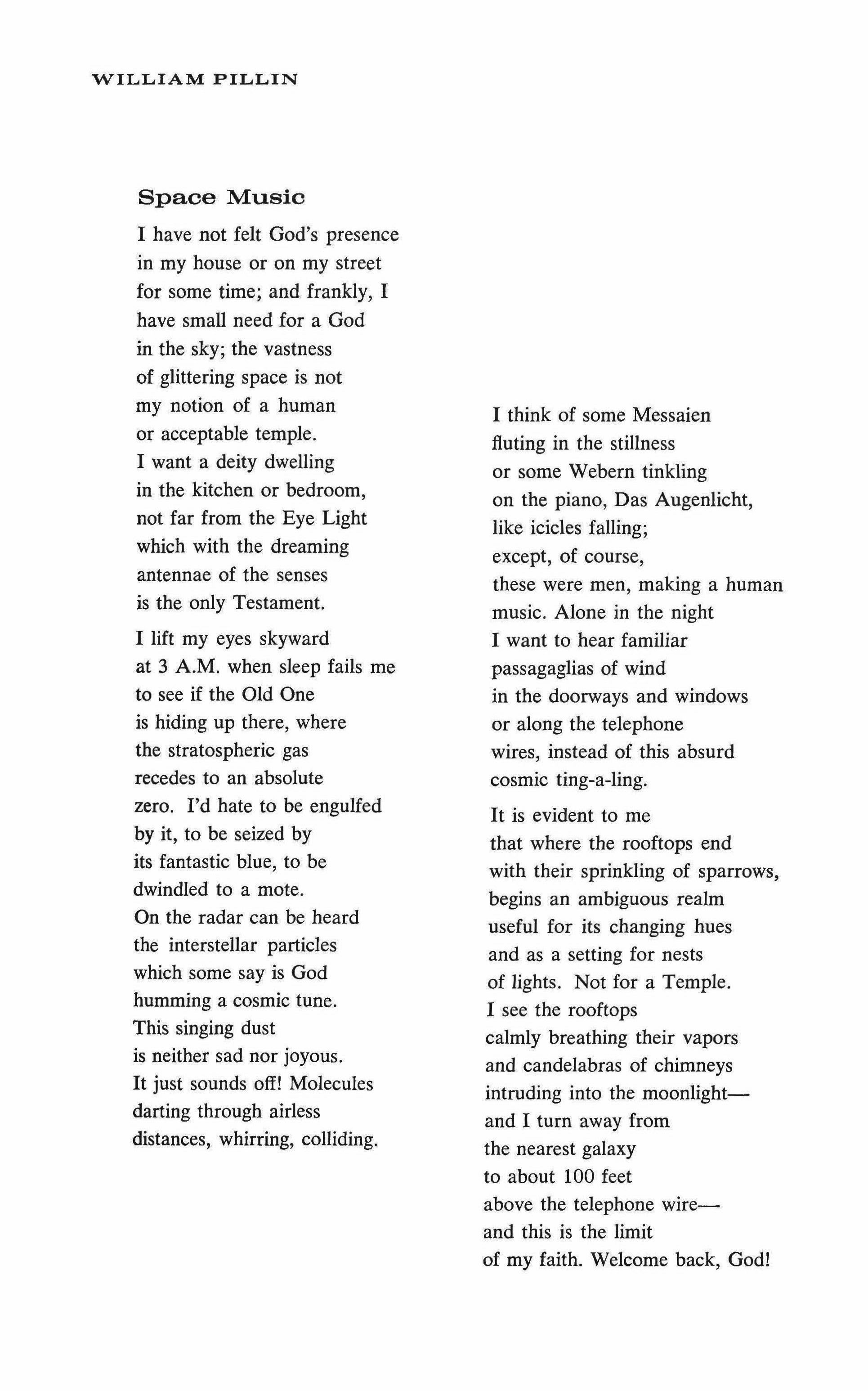
I think of some Messaien fluting in the stillness or some Webern tinkling on the piano, Das Augenlicht, like icicles falling; except, of course, these were men, making a human music. Alone in the night I want to hear familiar passagaglias of wind in the doorways and windows or along the telephone wires, instead of this absurd cosmic ting-a-ling. It is evident to me that where the rooftops end with their sprinkling of sparrows, begins an ambiguous realm useful for its changing hues and as a setting for nests of lights. Not for a Temple. I see the rooftops calmly breathing their vapors and candelabras of chimneys intruding into the moonlightand I turn away from the nearest galaxy to about 100 feet above the telephone wireand this is the limit of my faith. Welcome back, God!
WILLIAM PILLIN
A valedictory
LIONEL TRILLING
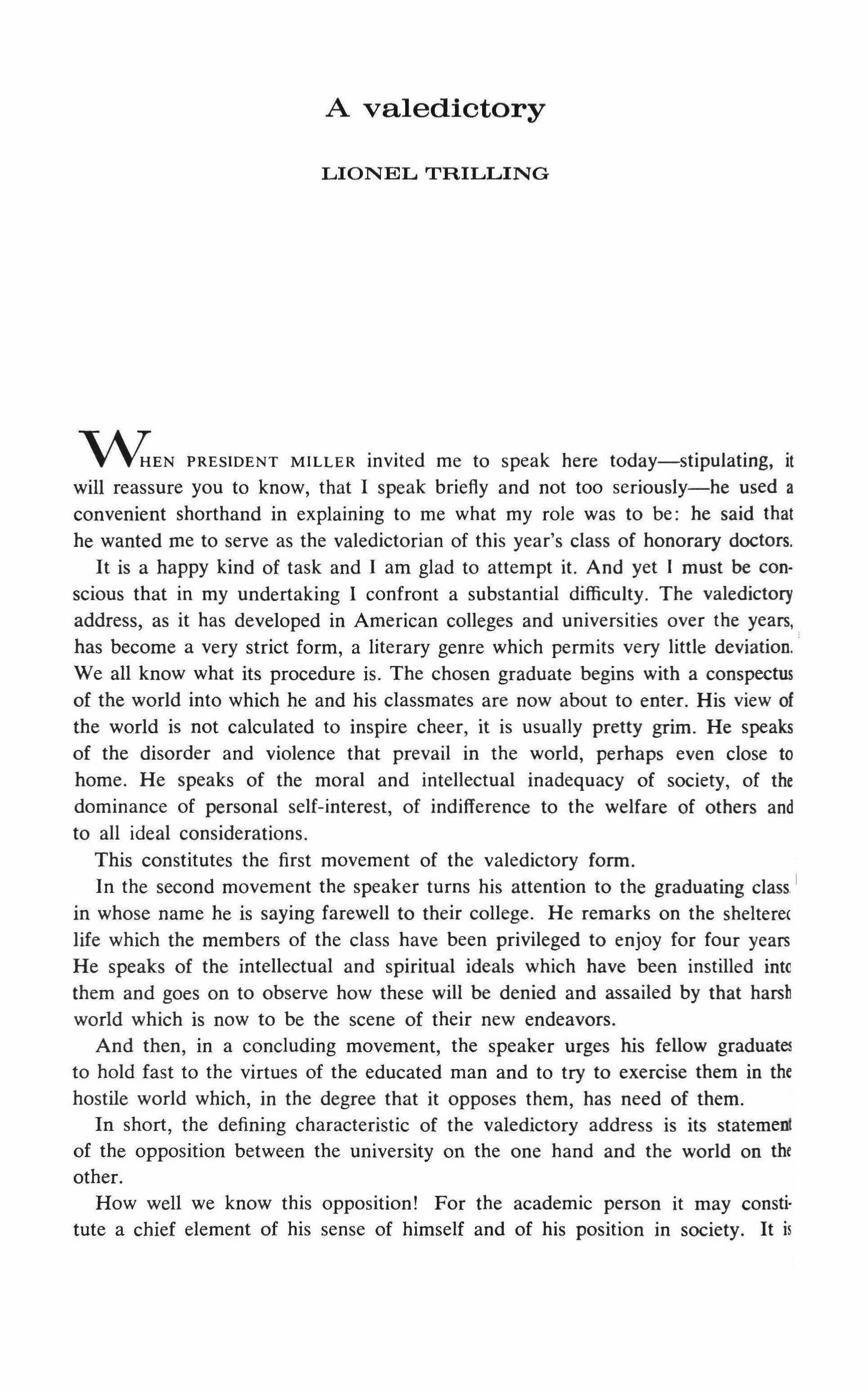
WEN
PRESIDENT MILLER invited me to speak here today-stipulating, it will reassure you to know, that I speak briefly and not too seriously-he used a convenient shorthand in explaining to me what my role was to be: he said that he wanted me to serve as the valedictorian of this year's class of honorary doctors. It is a happy kind of task and I am glad to attempt it. And yet I must be conscious that in my undertaking I confront a substantial difficulty. The valedictory address, as it has developed in American colleges and universities over the years, has become a very strict form, a literary genre which permits very little deviation. We all know what its procedure is. The chosen graduate begins with a conspectus of the world into which he and his classmates are now about to enter. His view of the world is not calculated to inspire cheer, it is usually pretty grim. He speaks of the disorder and violence that prevail in the world, perhaps even close to home. He speaks of the moral and intellectual inadequacy of society, of the dominance of personal self-interest, of indifference to the welfare of others and to all ideal considerations.
This constitutes the first movement of the valedictory form.
In the second movement the speaker turns his attention to the graduating class. in whose name he is saying farewell to their college. He remarks on the shelterer life which the members of the class have been privileged to enjoy for four years He speaks of the intellectual and spiritual ideals which have been instilled intc them and goes on to observe how these will be denied and assailed by that harsh world which is now to be the scene of their new endeavors.
And then, in a concluding movement, the speaker urges his fellow graduate! to hold fast to the virtues of the educated man and to try to exercise them in the hostile world which, in the degree that it opposes them, has need of them.
In short, the defining characteristic of the valedictory address is its statement of the opposition between the university on the one hand and the world on the other.
How well we know this opposition! For the academic person it may constitute a chief element of his sense of himself and of his position in society. It is
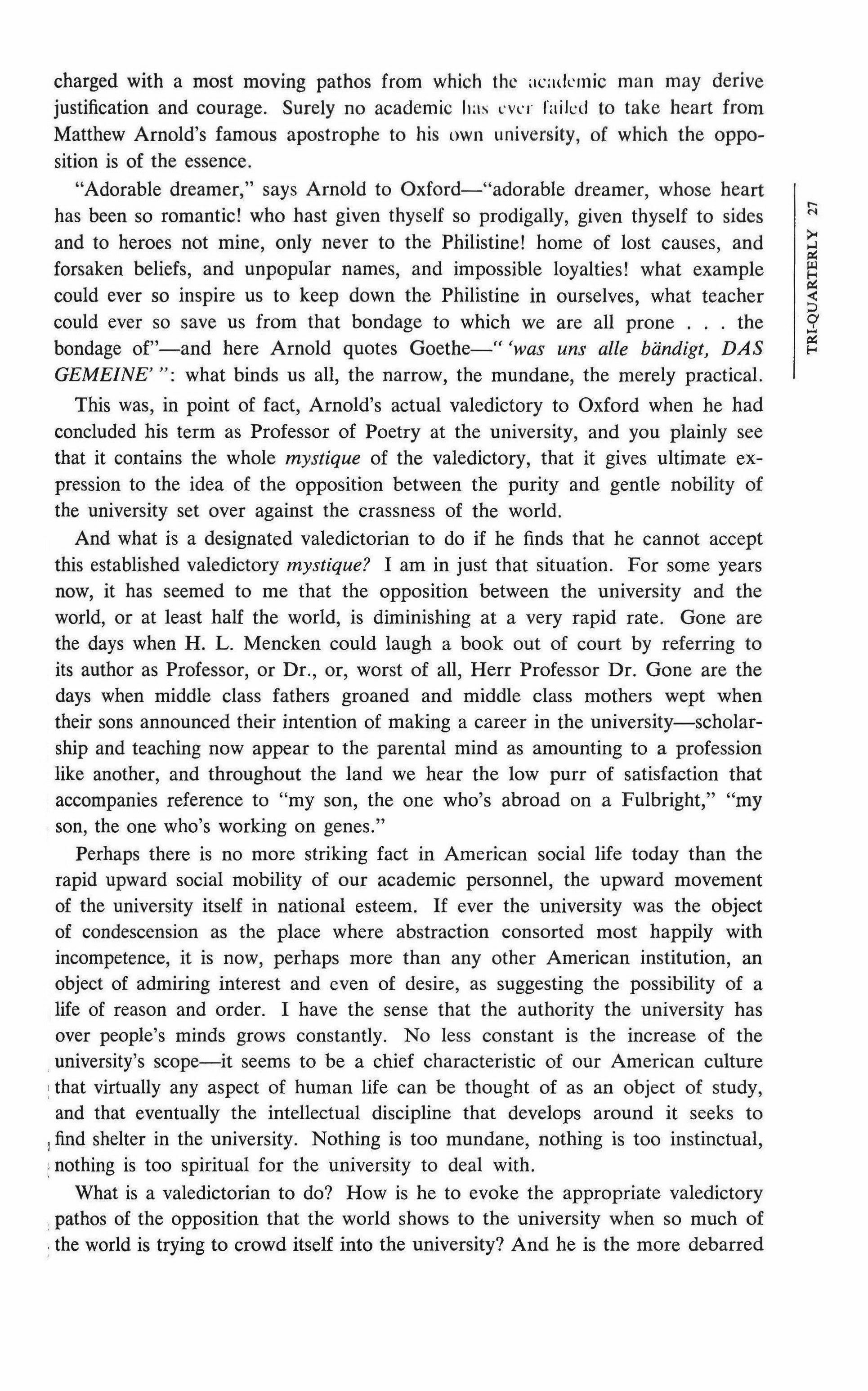
charged with a most moving pathos from which the academic man may derive justification and courage. Surely no academic has ever failed to take heart from Matthew Arnold's famous apostrophe to his own university, of which the opposition is of the essence.
"Adorable dreamer," says Arnold to Oxford-"adorable dreamer, whose heart has been so romantic! who hast given thyself so prodigally, given thyself to sides and to heroes not mine, only never to the Philistine! home of lost causes, and forsaken beliefs, and unpopular names, and impossible loyalties! what example could ever so inspire us to keep down the Philistine in ourselves, what teacher could ever so save us from that bondage to which we are all prone the bondage of"-and here Arnold quotes Goethe-s-" 'was uns alle biindigt, DAS GEMEINE''': what binds us all, the narrow, the mundane, the merely practical.
This was, in point of fact, Arnold's actual valedictory to Oxford when he had concluded his term as Professor of Poetry at the university, and you plainly see that it contains the whole mystique of the valedictory, that it gives ultimate expression to the idea of the opposition between the purity and gentle nobility of the university set over against the crassness of the world.
And what is a designated valedictorian to do if he finds that he cannot accept this established valedictory mystique? I am in just that situation. For some years now, it has seemed to me that the opposition between the university and the world, or at least half the world, is diminishing at a very rapid rate. Gone are the days when H. L. Mencken could laugh a book out of court by referring to its author as Professor, or Dr., or, worst of all, Herr Professor Dr. Gone are the days when middle class fathers groaned and middle class mothers wept when their sons announced their intention of making a career in the university-scholarship and teaching now appear to the parental mind as amounting to a profession like another, and throughout the land we hear the low purr of satisfaction that accompanies reference to "my son, the one who's abroad on a Fulbright," "my son, the one who's working on genes."
Perhaps there is no more striking fact in American social life today than the rapid upward social mobility of our academic personnel, the upward movement of the university itself in national esteem. If ever the university was the object of condescension as the place where abstraction consorted most happily with incompetence, it is now, perhaps more than any other American institution, an object of admiring interest and even of desire, as suggesting the possibility of a life of reason and order. I have the sense that the authority the university has over people's minds grows constantly. No less constant is the increase of the university's scope-it seems to be a chief characteristic of our American culture that virtually any aspect of human life can be thought of as an object of study, and that eventually the intellectual discipline that develops around it seeks to I find shelter in the university. Nothing is too mundane, nothing is too instinctual, i nothing is too spiritual for the university to deal with.
What is a valedictorian to do? How is he to evoke the appropriate valedictory pathos of the opposition that the world shows to the university when so much of the world is trying to crowd itself into the university? And he is the more debarred
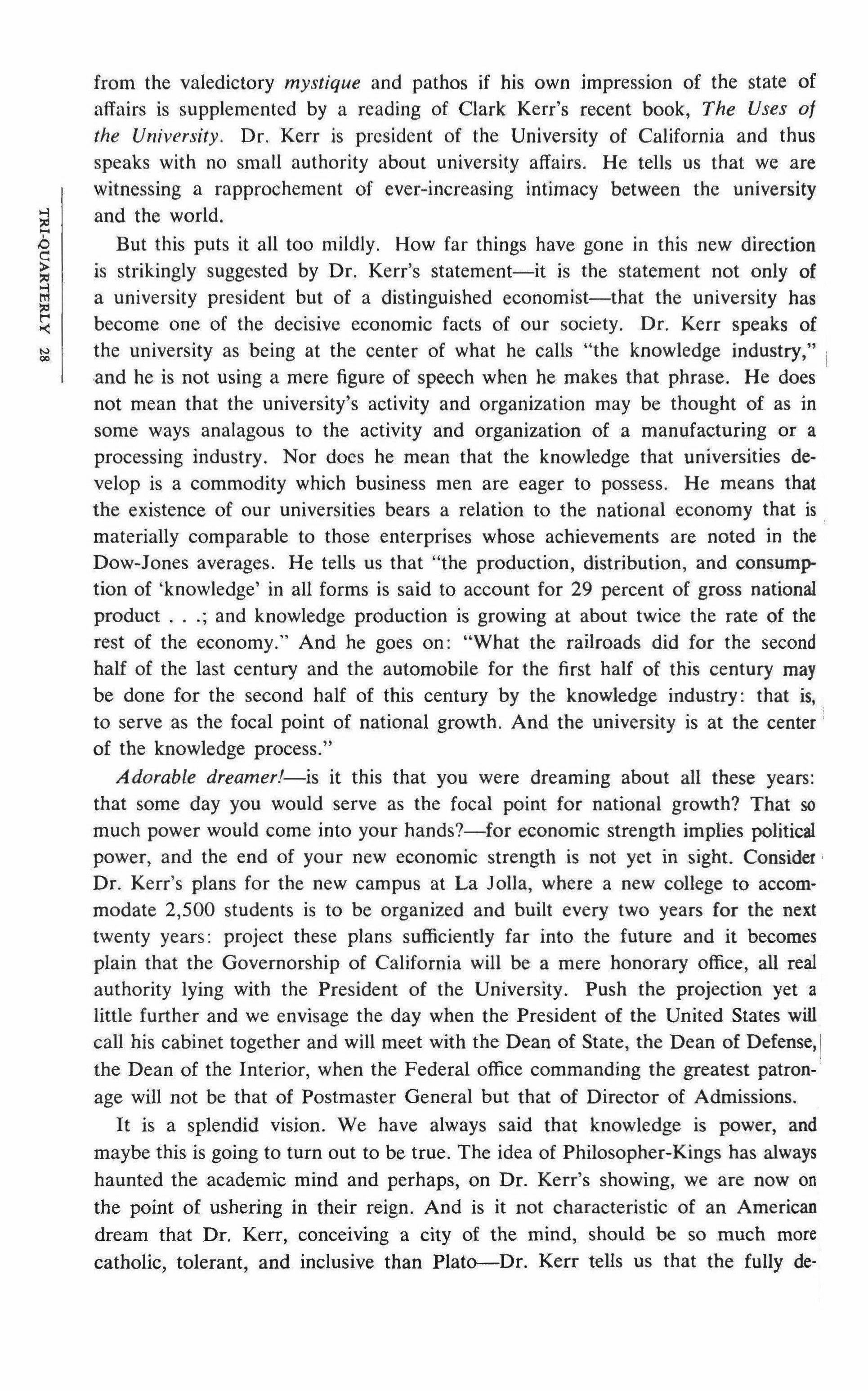
from the valedictory mystique and pathos if his own impression of the state of affairs is supplemented by a reading of Clark Kerr's recent book, The Uses of the University. Dr. Kerr is president of the University of California and thus speaks with no small authority about university affairs. He tells us that we are witnessing a rapprochement of ever-increasing intimacy between the university and the world.
But this puts it all too mildly. How far things have gone in this new direction is strikingly suggested by Dr. Kerr's statement-it is the statement not only of a university president but of a distinguished economist-that the university has become one of the decisive economic facts of our society. Dr. Kerr speaks of the university as being at the center of what he calls "the knowledge industry," and he is not using a mere figure of speech when he makes that phrase. He does not mean that the university's activity and organization may be thought of as in some ways analagous to the activity and organization of a manufacturing or a processing industry. Nor does he mean that the knowledge that universities develop is a commodity which business men are eager to possess. He means that the existence of our universities bears a relation to the national economy that is materially comparable to those enterprises whose achievements are noted in the Dow-Jones averages. He tells us that "the production, distribution, and consumption of 'knowledge' in all forms is said to account for 29 percent of gross national product ; and knowledge production is growing at about twice the rate of the rest of the economy." And he goes on: "What the railroads did for the second half of the last century and the automobile for the first half of this century may be done for the second half of this century by the knowledge industry: that is, to serve as the focal point of national growth. And the university is at the center of the knowledge process."
Adorable dreamer!-is it this that you were dreaming about all these years: that some day you would serve as the focal point for national growth? That so much power would come into your hands?-for economic strength implies political power, and the end of your new economic strength is not yet in sight. Consider; Dr. Kerr's plans for the new campus at La Jolla, where a new college to accommodate 2,500 students is to be organized and built every two years for the next twenty years: project these plans sufficiently far into the future and it becomes plain that the Governorship of California will be a mere honorary office, all real authority lying with the President of the University. Push the projection yet a little further and we envisage the day when the President of the United States will call his cabinet together and will meet with the Dean of State, the Dean of Defense, the Dean of the Interior, when the Federal office commanding the greatest patronage will not be that of Postmaster General but that of Director of Admissions. It is a splendid vision. We have always said that knowledge is power, and maybe this is going to turn out to be true. The idea of Philosopher-Kings has always haunted the academic mind and perhaps, on Dr. Kerr's showing, we are now on the point of ushering in their reign. And is it not characteristic of an American dream that Dr. Kerr, conceiving a city of the mind, should be so much more catholic, tolerant, and inclusive than Plato--Dr. Kerr tells us that the fully de-
tv 00
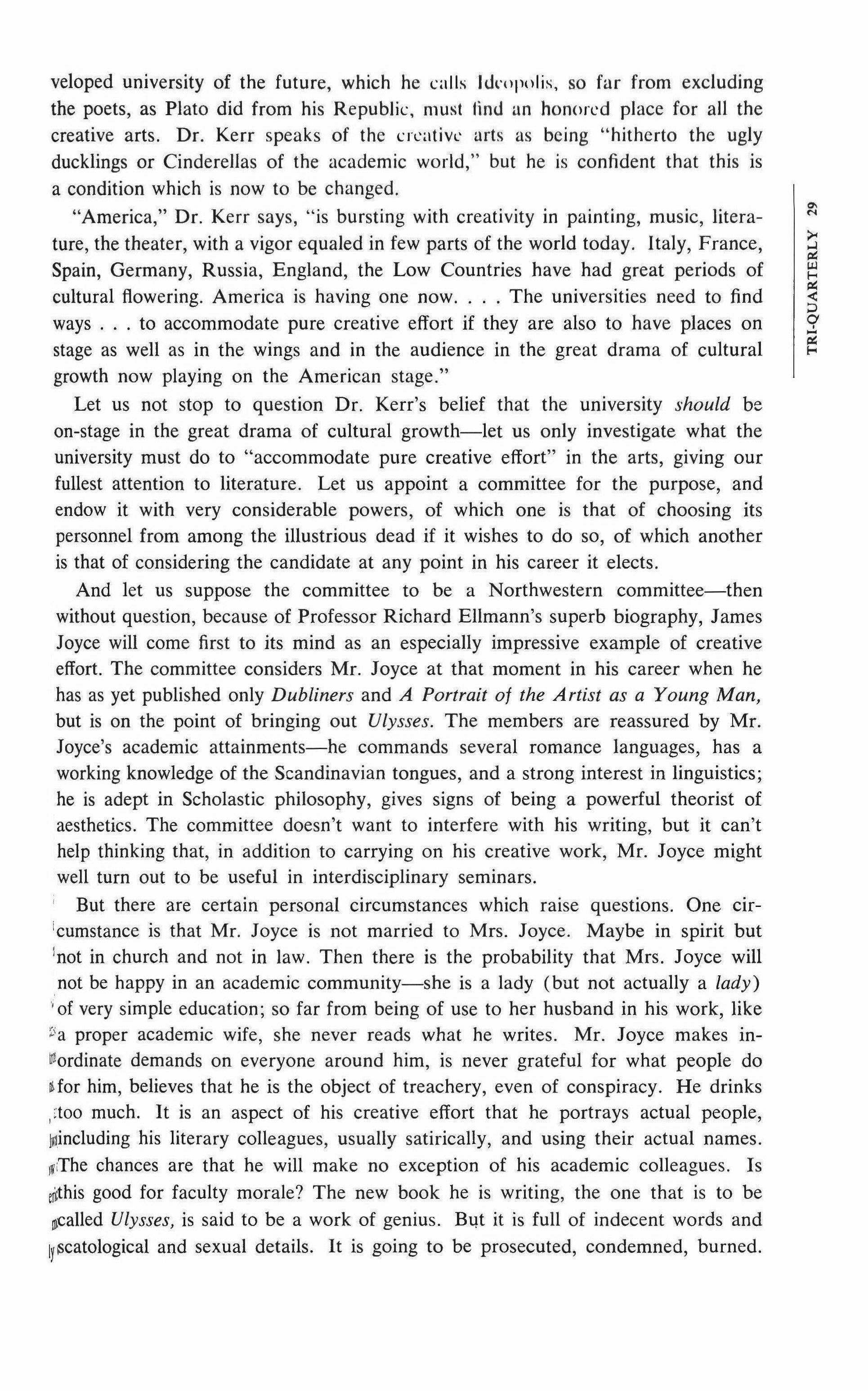
veloped university of the future, which he calls ldvopolis, so far from excluding the poets, as Plato did from his Republic, must lind an honored place for all the creative arts. Dr. Kerr speaks of the creative arts as being "hitherto the ugly ducklings or Cinderellas of the academic world," but he is confident that this is a condition which is now to be changed.
"America," Dr. Kerr says, "is bursting with creativity in painting, music, literature, the theater, with a vigor equaled in few parts of the world today. Italy, France, Spain, Germany, Russia, England, the Low Countries have had great periods of cultural flowering. America is having one now The universities need to find ways to accommodate pure creative effort if they are also to have places on stage as well as in the wings and in the audience in the great drama of cultural growth now playing on the American stage."
Let us not stop to question Dr. Kerr's belief that the university should be on-stage in the great drama of cultural growth-let us only investigate what the university must do to "accommodate pure creative effort" in the arts, giving our fullest attention to literature. Let us appoint a committee for the purpose, and endow it with very considerable powers, of which one is that of choosing its personnel from among the illustrious dead if it wishes to do so, of which another is that of considering the candidate at any point in his career it elects.
And let us suppose the committee to be a Northwestern committee-then without question, because of Professor Richard EHmann's superb biography, James Joyce will come first to its mind as an especially impressive example of creative effort. The committee considers Mr. Joyce at that moment in his career when he has as yet published only Dubliners and A Portrait at the Artist as a Young Man, but is on the point of bringing out Ulysses. The members are reassured by Mr. Joyce's academic attainments-he commands several romance languages, has a working knowledge of the Scandinavian tongues, and a strong interest in linguistics; he is adept in Scholastic philosophy, gives signs of being a powerful theorist of aesthetics. The committee doesn't want to interfere with his writing, but it can't help thinking that, in addition to carrying on his creative work, Mr. Joyce might well turn out to be useful in interdisciplinary seminars.
But there are certain personal circumstances which raise questions. One cir'cumstance is that Mr. Joyce is not married to Mrs. Joyce. Maybe in spirit but 'not in church and not in law. Then there is the probability that Mrs. Joyce will not be happy in an academic community-she is a lady (but not actually a lady) \ of very simple education; so far from being of use to her husband in his work, like �(a proper academic wife, she never reads what he writes. Mr. Joyce makes inlrIordinate demands on everyone around him, is never grateful for what people do sfor him, believes that he is the object of treachery, even of conspiracy. He drinks .rtoo much. It is an aspect of his creative effort that he portrays actual people, \11including his literary colleagues, usually satirically, and using their actual names. IWiThe chances are that he will make no exception of his academic colleagues. Is ��this good for faculty morale? The new book he is writing, the one that is to be iJlcalled Ulysses, is said to be a work of genius. But it is full of indecent words and 11�catological and sexual details. It is going to be prosecuted, condemned, burned.

Early readers, even very intelligent ones, will find it harsh and cruel. To be sure, with the passing decades, nobody will be troubled by its outspokenness, and the judgment of harshness and cruelty will yield to the judgment that this is a sweet, kind, tender book, almost to the point of sentimentality. But does the university want to accommodate the decades of scandal it will cause?
It is a hard decision to make and the committee decides to table it and turn its attention to another great creative personality. This one is also salient in Northwestern consciousness-it is Professor Erich Heller's ironic German, Thomas Mann. He too is not only creative but learned-he is encyclopedic in science, psychology, history, Egyptology, musicology. He is probably the world's leading authority on the work and personality of Thomas Mann-nothing would please him more than to give a course of lectures or a seminar on the development of this genius. His aptness for the academic life is suggested by his fondness for being known as Dr. Mann. It is pleasing to note that there can be no doubt that Dr. Mann is married to Frau Dr. Mann. No lives could be more orderly than theirs. I n short, everything makes it clear that Dr. Mann should be recommended for appointment. The committee moves fast, the Deans move fast, the President moves fast, the Trustees move fast-alas, to no avail: Harvard has got to him first. What is more, the University of California is after Dr. Mann, and is likely to snatch him from Harvard itself, for California plans to create a Mann-Goethe Institute which will be an exact replica of Weimar in 1775.
Disappointed but hopeful, the Committee turns to Andre Gide, an eventual Nobel Prize Winner. There can be no doubt about it: Monsieur Gide is married to Madame Gide. And yet-alas! It is not that the Committee wishes to exclude sexual deviants from academic life; they have been there before. But Monsieur Gide insists on making a point of it, he defends it, he urges it. What is more, he represents the family as a malevolent institution. Who would deny his right to take these positions, yet should they be taken with the university as the forum? The parents of our students cannot be wholly left out of account.
But all these adverse considerations are in a sense irrelevant. For it turns out that Monsieur Gide would not accept the appointment even if it were offered him. For he conceives it to be of the essence of his existence as a writer that he startle and shock and dismay his readers. He cannot help entertaining the idea that the university is an institution, that it is by nature conservative, although not necessarily in any bad sense of that word, and respectable, in whatever sense may be attached to that word, and that if his writings were to issue from the university, they would seem certified as virtuous, they would lose much-perhaps aU-ofl their shocking force.
If not Gide, then certainly not Genet. Anyway, with his prison record he would have difficulty with the immigration authorities.
What of Jean-Paul Sartre, not only eminent as a creative but as a speculative mind? We are large-minded enough to overlook his sometimes rather odd political positions and also his antagonism to respectable life. But Monsieur Sartre does not want to come to us. He likes to do his writing at a table in a cafe. Very well that is one of the ways the university can accommodate creative effort-we will
o
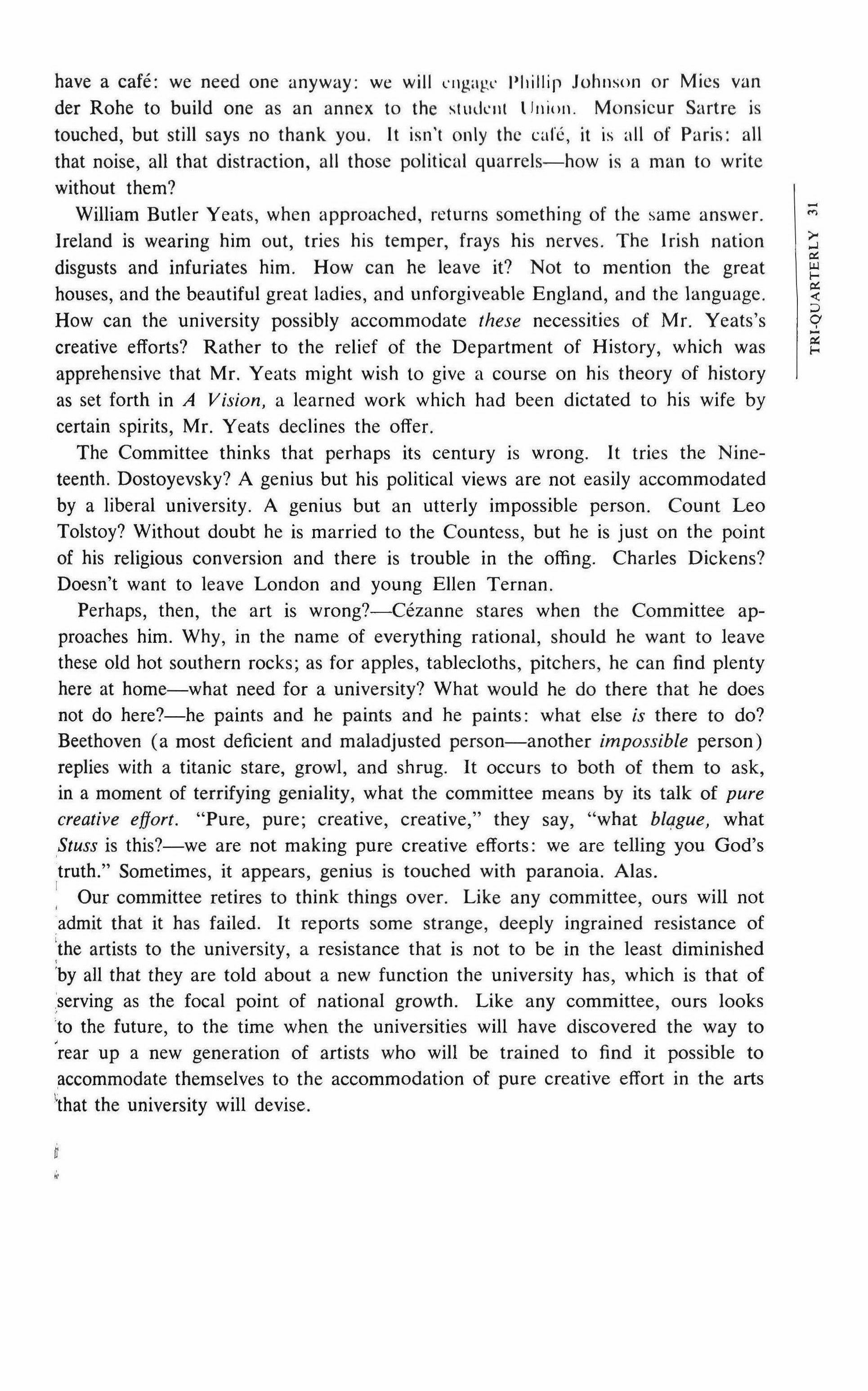
have a cafe: we need one anyway: we will l'llgagl' Phillip Johnson or Mies van der Rohe to build one as an annex to the studcnr l lnion. Monsieur Sartre is touched, but still says no thank you. It isn't only the cafe, it is all of Paris: all that noise, all that distraction, all those political quarrels-how is a man to write without them?
William Butler Yeats, when approached, returns something of the same answer. Ireland is wearing him out, tries his temper, frays his nerves. The Irish nation disgusts and infuriates him. How can he leave it? Not to mention the great houses, and the beautiful great ladies, and unforgiveable England, and the language. How can the university possibly accommodate these necessities of Mr. Yeats's creative efforts? Rather to the relief of the Department of History, which was apprehensive that Mr. Yeats might wish to give a course on his theory of history as set forth in A Vision, a learned work which had been dictated to his wife by certain spirits, Mr. Yeats declines the offer.
The Committee thinks that perhaps its century is wrong. It tries the Nineteenth. Dostoyevsky? A genius but his political views are not easily accommodated by a liberal university. A genius but an utterly impossible person. Count Leo Tolstoy? Without doubt he is married to the Countess, but he is just on the point of his religious conversion and there is trouble in the offing. Charles Dickens? Doesn't want to leave London and young Ellen Ternan.
Perhaps, then, the art is wrongv=-Cezanne stares when the Committee approaches him. Why, in the name of everything rational, should he want to leave these old hot southern rocks; as for apples, tablecloths, pitchers, he can find plenty here at home-what need for a university? What would he do there that he does not do here?-he paints and he paints and he paints: what else is there to do? Beethoven (a most deficient and maladjusted person-another impossible person) replies with a titanic stare, growl, and shrug. It occurs to both of them to ask, in a moment of terrifying geniality, what the committee means by its talk of pure creative effort. "Pure, pure; creative, creative," they say, "what blqgue, what Stuss is this?-we are not making pure creative efforts: we are telling you God's truth." Sometimes, it appears, genius is touched with paranoia. Alas.
Our committee retires to think things over. Like any committee, ours will not admit that it has failed. It reports some strange, deeply ingrained resistance of 'the artists to the university, a resistance that is not to be in the least diminished 'by all that they are told about a new function the university has, which is that of serving as the focal point of national growth. Like any committee, ours looks to the future, to the time when the universities will have discovered the way to 'rear up a new generation of artists who will be trained to find it possible to accommodate themselves to the accommodation of pure creative effort in the arts 'that the university will devise.
-
Koz'ma Prutkov as the letter H
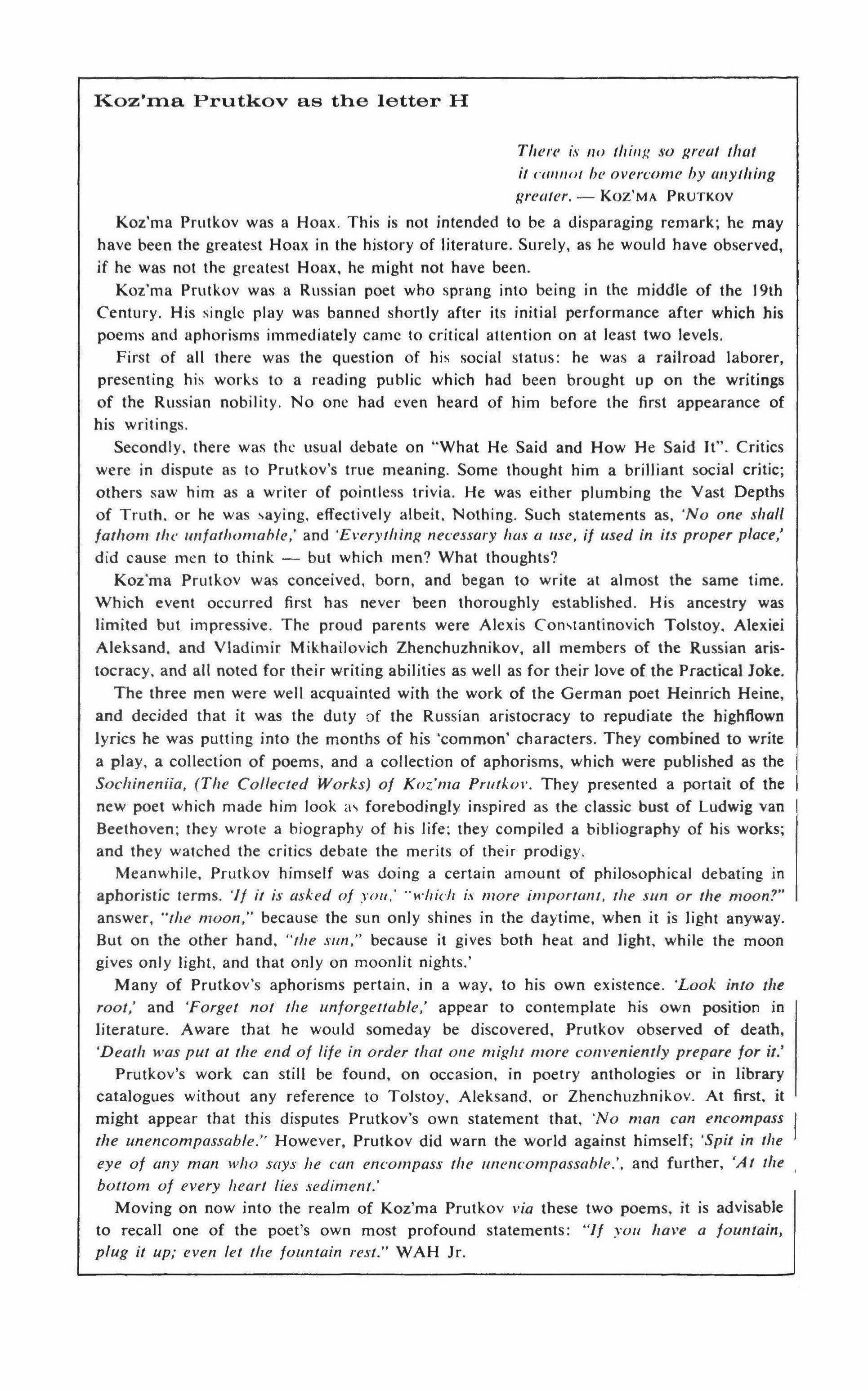
There is IlO thini; so great that it ClIIlI/lJ/ he overcome hy anything greater. - KOZ'MA PRUTKOV
Koz'ma Prutkov was a Hoax. This is not intended to be a disparaging remark; he may have been the greatest Hoax in the history of literature. Surely, as he would have observed, if he was not the greatest Hoax, he might not have been.
Koz'rna Prutkov was a Russian poet who sprang into being in the middle of the 19th Century. His single play was banned shortly after its initial performance after which his poems and aphorisms immediately came to critical attention on at least two levels.
First of all there was the question of his social status: he was a railroad laborer, presenting his works to a reading public which had been brought up on the writings of the Russian nobility. No one had even heard of him before the first appearance of his writings.
Secondly, there was the usual debate on "What He Said and How He Said It". Critics were in dispute as to Prutkov's true meaning. Some thought him a brilliant social critic; others saw him as a writer of pointless trivia. He was either plumbing the Vast Depths of Truth, or he was saying, effectively albeit, Nothing. Such statements as, 'No one shall fathom the unjatliomnble, and 'Everything necessary has a use, if used in its proper place,' did cause men to think - but which men? What thoughts?
Koz'rna Prutkov was conceived, born, and began to write at almost the same time. Which event occurred first has never been thoroughly established. His ancestry was limited but impressive. The proud parents were Alexis Convtantinovich Tolstoy, Alexiei Aleksand, and Vladimir Mikhailovich Zhenchuzhnikov, all members of the Russian aristocracy. and all noted for their writing abilities as well as for their love of the Practical Joke.
The three men were well acquainted with the work of the German poet Heinrich Heine, and decided that it was the duty of the Russian aristocracy to repudiate the highflown lyrics he was putting into the months of his 'common' characters. They combined to write a play, a collection of poems, and a collection of aphorisms, which were published as the Sochineniia, (The Collected Works) of Koz'ma Prutkov, They presented a portait of the new poet which made him look a\ forebodingly inspired as the classic bust of Ludwig van Beethoven; they wrote a biography of his life; they compiled a bibliography of his works; and they watched the critics debate the merits of their prodigy.
Meanwhile, Prutkov himself was doing a certain amount of philosophical debating in aphoristic terms. 'I] it is asked of YOII,' "which is more important, the sun or the moon?" answer, "the moon," because the sun only shines in the daytime, when it is light anyway. But on the other hand, "the sun," because it gives both heat and light. while the moon gives only light, and that only on moonlit nights.'
Many of Prutkov's aphorisms pertain. in a way, to his own existence. 'Look into the root,' and 'Forget not the unforgettable: appear to contemplate his own position in literature. Aware that he would someday be discovered, Prutkov observed of death, 'Death was put at the end of life in order that one might more conveniently prepare for it.'
Prutkov's work can still be found, on occasion, in poetry anthologies or in library catalogues without any reference to Tolstoy, Aleksand. or Zhenchuzhnikov. At first, it might appear that this disputes Prutkov's own statement that, 'No man can encompass the unencompassable,' However, Prutkov did warn the world against himself; 'Spit in the eye of any man who says he call encompass the unencompassable:', and further, 'AI the bottom of every heart lies sediment,'
Moving on now into the realm of Koz'rna Prutkov via these two poems, it is advisable to recall one of the poet's own most profound statements: "I] you have a fountain, plug it up; even let the [ountain rest." WAH Jr.
The
lady and the tarantula (A FABLE)
In the hills of Spain a heavy carriage
With a conductor, set out on a voyage. The Senora sat and straightway fell adrowse.
Meanwhile (seeing a tarantula), her spouse
Shrieked out "Conductor! Stop!
Eeek! My great god! Hurry up!"
The conductor consequently hastens to him
And forthwith drives the beast out with a broom.
Adding, "You did not pay me money for your seat!" And squashed him then, immediately, with his feet.
Reader! Keep close account on all your pence
So you'd not vainly dare sit in a diligence; Henceforward always calculate with care
Never to start a trip without your fare
Else may it happen to you even so Just as the insect was brought low Whom you already know.
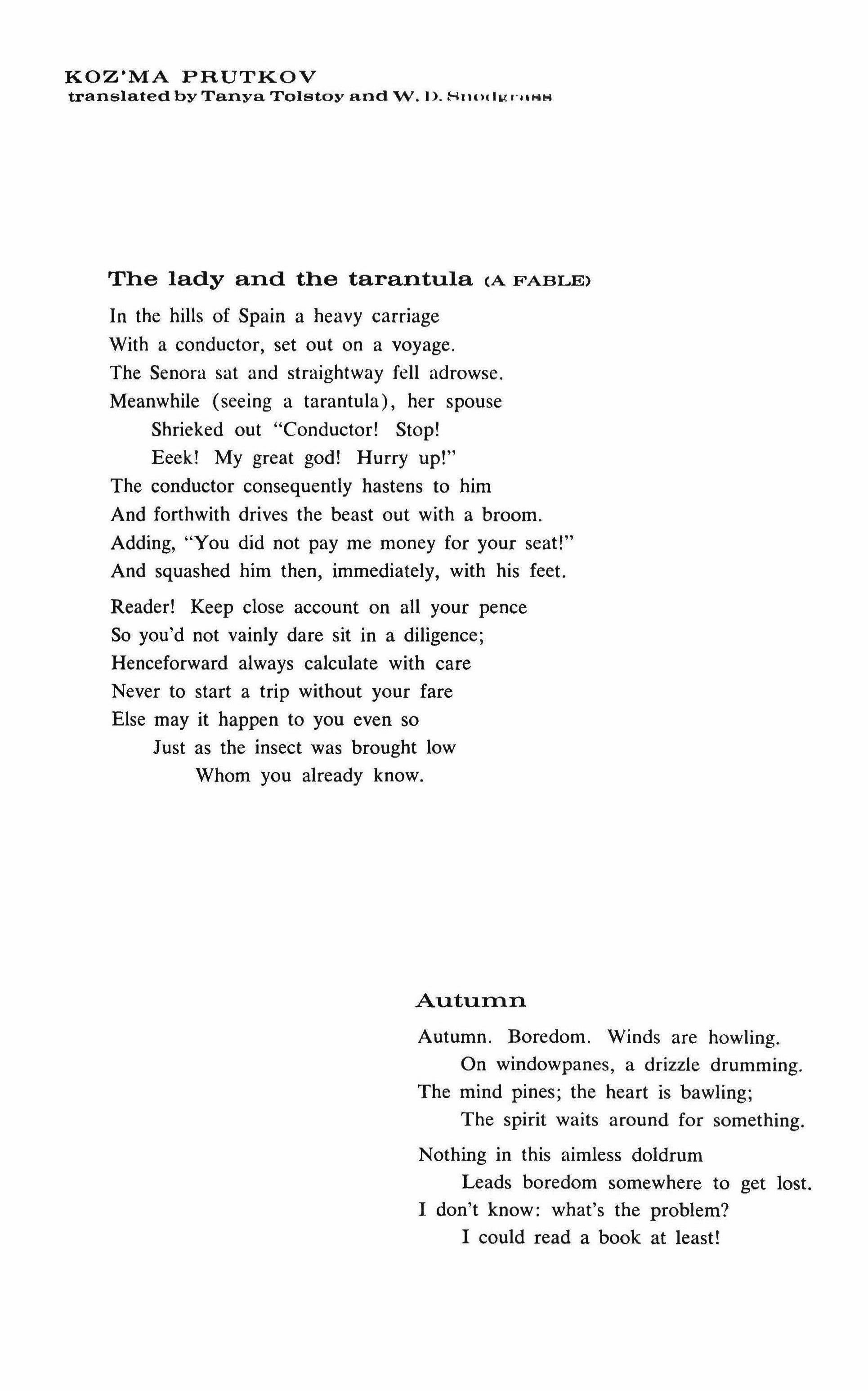
Autumn
Autumn. Boredom. Winds are howling. On windowpanes, a drizzle drumming. The mind pines; the heart is bawling; The spirit waits around for something.
Nothing in this aimless doldrum
Leads boredom somewhere to get lost.
I don't know: what's the problem?
I could read a book at least!
KOZ'MA PRUTKOV
D.
aHH
translated by Tanya Tolstoy and W.
1-111(1111.(

The artist's journey into the interior: the Hegelian prophecy
ERICH HELLER

for Moody Prior
�ENHEGEL ENTERED THE WORLD, it surely was with the blessings of a dialectical Muse and under a constellation of potent opposites. Born into modest bourgeois circumstances, he was made to carry the ominous burden of three imperial names: Georg Friedrich Wilhelm; and while for the intellectual stage of Germany, he was to write the definitive version of the metaphysical drama which the German philosophers of his age, with fiercely transcendental singlemindedness, had designed around the contrast between Mind and World, and which in the last act, written solely by Hegel, ended with the Spirit's triumph in the perfection of its freedom, he himself did not seem to think as a matter of free choice, but rather yielded philosophy as the cow yields milk-in helpless bondage to a dispensation of nature. Yet despite its abstract, tenuous and elusive complexity, his work, by traveling eastward along circuitous roads, gave the lie to the powerful, and powerfully philistine, notion that philosophizing is one thing and changing the world another. He was not for nothing an all but exact contemporary of Napoleon's in whom he saw, with eyes undimmed by any trace of Prussian patriotism, an embodiment of the World-Soul; and while he won his own battle of Jena by writing, in the immediate vicinity of the battlefield and in the very year of that spectacular defeat of Prussia, his Phenomenology of Mind, he even avenged, posthumously and a century later, the Napoleonic World-Soul's Russian debacle by conquering Moscow with his dialectical interpretation of history. He built empires (and in the final Marxian resolution, not only of the mind); yet he was the man whom Hotho, his devoted disciple, saw when he first called on him: sitting at a vast writing-table, his prematurely old and shrunken figure wrapped in a large, loose, greyish-yellow, bourgeois Schlafrock, his features innocent of any imposing majesty or intellectual charm, his hands impatiently busy to make a great confusion of books and papers before him still more confounded,
part one of a series
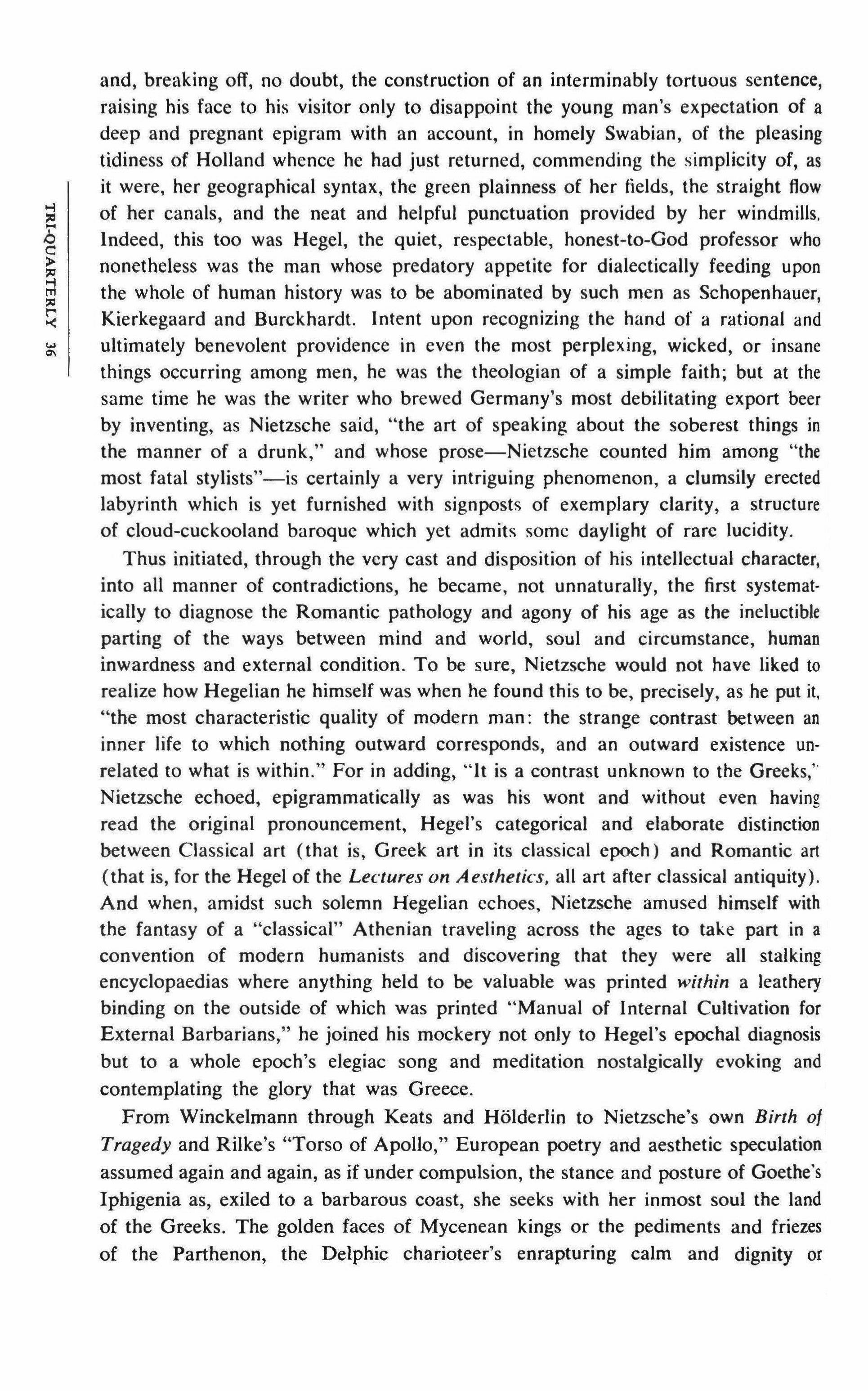
and, breaking off, no doubt, the construction of an interminably tortuous sentence, raising his face to his visitor only to disappoint the young man's expectation of a deep and pregnant epigram with an account, in homely Swabian, of the pleasing tidiness of Holland whence he had just returned, commending the simplicity of, as it were, her geographical syntax, the green plainness of her fields, the straight flow of her canals, and the neat and helpful punctuation provided by her windmills. Indeed, this too was Hegel, the quiet, respectable, honest-to-God professor who nonetheless was the man whose predatory appetite for dialectically feeding upon the whole of human history was to be abominated by such men as Schopenhauer, Kierkegaard and Burckhardt. Intent upon recognizing the hand of a rational and ultimately benevolent providence in even the most perplexing, wicked, or insane things occurring among men, he was the theologian of a simple faith; but at the same time he was the writer who brewed Germany's most debilitating export beer by inventing, as Nietzsche said, "the art of speaking about the soberest things in the manner of a drunk," and whose prose-Nietzsche counted him among "the most fatal stylists"-is certainly a very intriguing phenomenon, a clumsily erected labyrinth which is yet furnished with signposts of exemplary clarity, a structure of cloud-cuckooland baroque which yet admits some daylight of rare lucidity. Thus initiated, through the very cast and disposition of his intellectual character, into all manner of contradictions, he became, not unnaturally, the first systematically to diagnose the Romantic pathology and agony of his age as the ineluctible parting of the ways between mind and world, soul and circumstance, human inwardness and external condition. To be sure, Nietzsche would not have liked to realize how Hegelian he himself was when he found this to be, precisely, as he put it, "the most characteristic quality of modern man: the strange contrast between an inner life to which nothing outward corresponds, and an outward existence unrelated to what is within." For in adding, "It is a contrast unknown to the Greeks," Nietzsche echoed, epigrammatically as was his wont and without even having read the original pronouncement, Hegel's categorical and elaborate distinction between Classical art (that is, Greek art in its classical epoch) and Romantic art (that is, for the Hegel of the Lectures on Aesthetics. all art after classical antiquity). And when, amidst such solemn Hegelian echoes, Nietzsche amused himself with the fantasy of a "classical" Athenian traveling across the ages to take part in a convention of modern humanists and discovering that they were all stalking encyclopaedias where anything held to be valuable was printed within a leathery binding on the outside of which was printed "Manual of Internal Cultivation for External Barbarians," he joined his mockery not only to Hegel's epochal diagnosis but to a whole epoch's elegiac song and meditation nostalgically evoking and contemplating the glory that was Greece.
From Winckelmann through Keats and Holderlin to Nietzsche's own Birth 0/ Tragedy and Rilke's "Torso of Apollo," European poetry and aesthetic speculation assumed again and again, as if under compulsion, the stance and posture of Goethe's Jphigenia as, exiled to a barbarous coast, she seeks with her inmost soul the land of the Greeks. The golden faces of Mycenean kings or the pediments and friezes of the Parthenon, the Delphic charioteer's enrapturing calm and dignity or
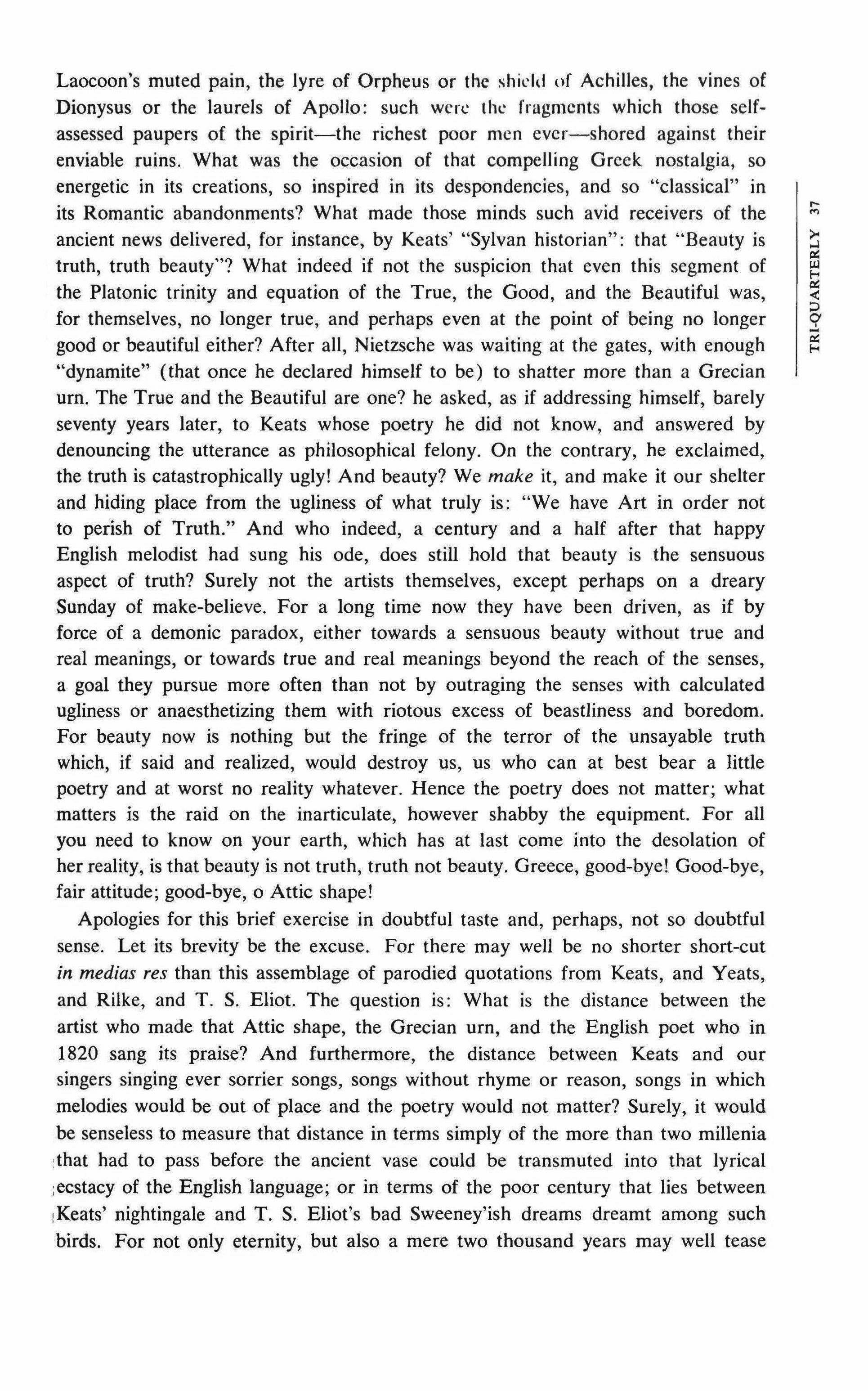
Laocoon's muted pain, the lyre of Orpheus or the shield of Achilles, the vines of Dionysus or the laurels of Apollo: such were the fragments which those selfassessed paupers of the spirit-the richest poor men ever-shored against their enviable ruins. What was the occasion of that compelling Greek nostalgia, so energetic in its creations, so inspired in its despondencies, and so "classical" in its Romantic abandonments? What made those minds such avid receivers of the ancient news delivered, for instance, by Keats' "Sylvan historian": that "Beauty is truth, truth beauty"? What indeed if not the suspicion that even this segment of the Platonic trinity and equation of the True, the Good, and the Beautiful was, for themselves, no longer true, and perhaps even at the point of being no longer good or beautiful either? After all, Nietzsche was waiting at the gates, with enough "dynamite" (that once he declared himself to be) to shatter more than a Grecian urn. The True and the Beautiful are one? he asked, as if addressing himself, barely seventy years later, to Keats whose poetry he did not know, and answered by denouncing the utterance as philosophical felony. On the contrary, he exclaimed, the truth is catastrophically ugly! And beauty? We make it, and make it our shelter and hiding place from the ugliness of what truly is: "We have Art in order not to perish of Truth." And who indeed, a century and a half after that happy English melodist had sung his ode, does still hold that beauty is the sensuous aspect of truth? Surely not the artists themselves, except perhaps on a dreary Sunday of make-believe. For a long time now they have been driven, as if by force of a demonic paradox, either towards a sensuous beauty without true and real meanings, or towards true and real meanings beyond the reach of the senses, a goal they pursue more often than not by outraging the senses with calculated ugliness or anaesthetizing them with riotous excess of beastliness and boredom. For beauty now is nothing but the fringe of the terror of the unsayable truth which, if said and realized, would destroy us, us who can at best bear a little poetry and at worst no reality whatever. Hence the poetry does not matter; what matters is the raid on the inarticulate, however shabby the equipment. For all you need to know on your earth, which has at last come into the desolation of her reality, is that beauty is not truth, truth not beauty. Greece, good-bye! Good-bye, fair attitude; good-bye, 0 Attic shape!
Apologies for this brief exercise in doubtful taste and, perhaps, not so doubtful sense. Let its brevity be the excuse. For there may well be no shorter short-cut in medias res than this assemblage of parodied quotations from Keats, and Yeats, and Rilke, and T. S. Eliot. The question is: What is the distance between the artist who made that Attic shape, the Grecian urn, and the English poet who in 1820 sang its praise? And furthermore, the distance between Keats and our singers singing ever sorrier songs, songs without rhyme or reason, songs in which melodies would be out of place and the poetry would not matter? Surely, it would be senseless to measure that distance in terms simply of the more than two millenia that had to pass before the ancient vase could be transmuted into that lyrical .ecstacy of the English language; or in terms of the poor century that lies between .Keats' nightingale and T. S. Eliot's bad Sweeney'ish dreams dreamt among such birds. For not only eternity, but also a mere two thousand years may well tease
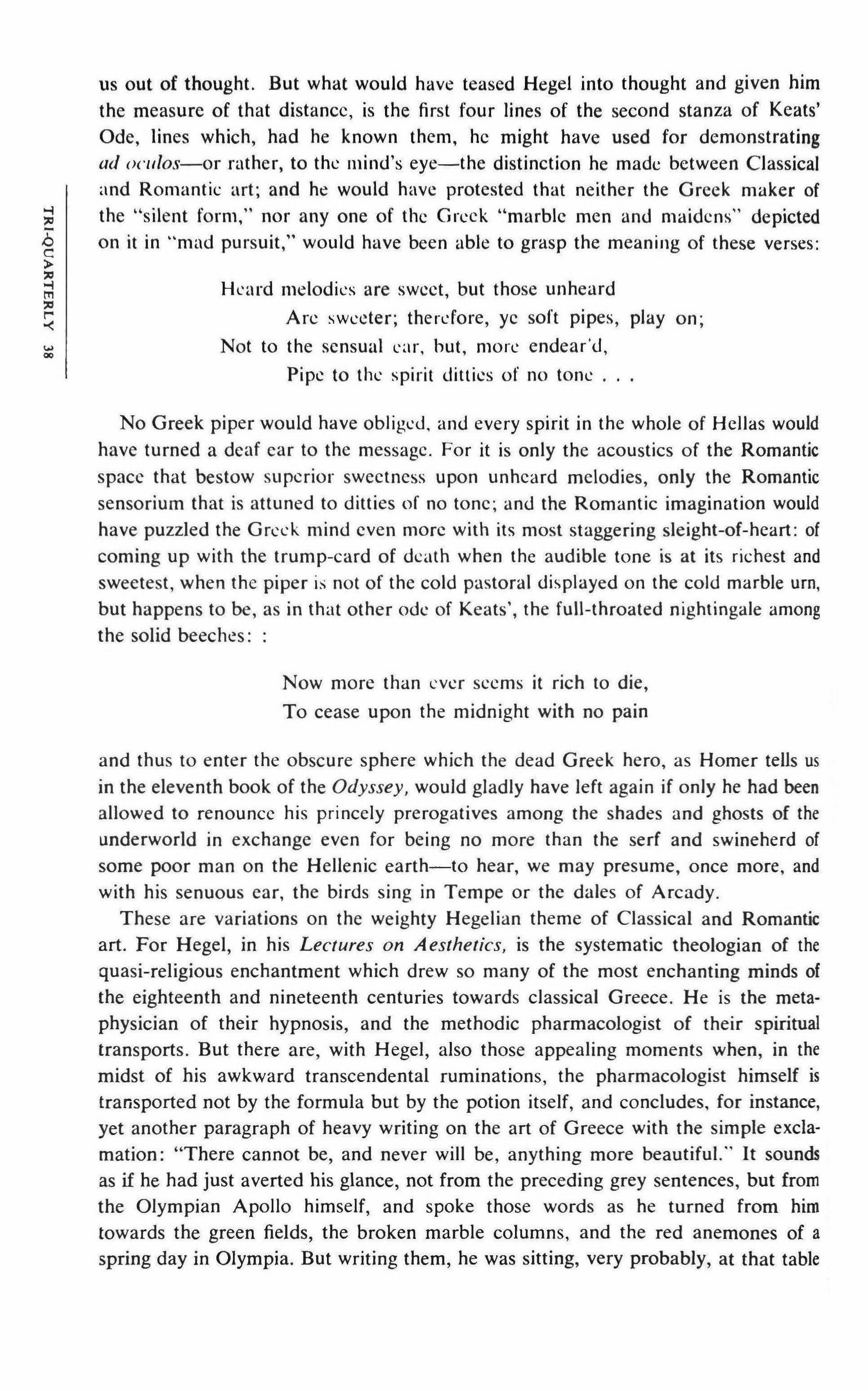
us out of thought. But what would have teased Hegel into thought and given him the measure of that distance, is the first four lines of the second stanza of Keats' Ode, lines which, had he known them, he might have used for demonstrating ad ocuios-or ruther, to the mind's eye-the distinction he made between Classical and Romantic art; and he would have protested that neither the Greek maker of the "silent form," nor anyone of the Greek "marble men and maidens" depicted on it in "mad pursuit," would have been able to grasp the meaning of these verses:
Heard melodies are sweet, but those unheard Are sweeter; therefore, ye soft pipes, play on; Not to the sensual car, hut, more endeard, Pipe to the spirit ditties of no tone
No Greek piper would have obliged, and every spirit in the whole of Hellas would have turned a deaf ear to the message. For it is only the acoustics of the Romantic space that bestow superior sweetness upon unheard melodies, only the Romantic sensorium that is attuned to ditties of no tone; and the Romantic imagination would have puzzled the Greek mind even more with its most staggering sleight-of-heart: of coming up with the trump-card of death when the audible tone is at its richest and sweetest, when the piper is not of the cold pastoral displayed on the cold marble urn, but happens to be, as in that other ode of Keats', the full-throated nightingale among the solid beeches: :
Now more than ever seems it rich to die, To cease upon the midnight with no pain
and thus to enter the obscure sphere which the dead Greek hero, as Homer teUs us in the eleventh book of the Odyssey, would gladly have left again if only he had been allowed to renounce his princely prerogatives among the shades and ghosts of the underworld in exchange even for being no more than the serf and swineherd of some poor man on the Hellenic earth-to hear, we may presume, once more, and with his senuous ear, the birds sing in Tempe or the dales of Arcady.
These are variations on the weighty Hegelian theme of Classical and Romantic art. For Hegel, in his Lectures on Aesthetics, is the systematic theologian of the quasi-religious enchantment which drew so many of the most enchanting minds of the eighteenth and nineteenth centuries towards classical Greece. He is the metaphysician of their hypnosis, and the methodic pharmacologist of their spiritual transports. But there are, with Hegel, also those appealing moments when, in the midst of his awkward transcendental ruminations, the pharmacologist himself is transported not by the formula but by the potion itself, and concludes, for instance, yet another paragraph of heavy writing on the art of Greece with the simple exclamation: "There cannot be, and never will be, anything more beautiful." It sounds as if he had just averted his glance, not from the preceding grey sentences, but from the Olympian Apollo himself, and spoke those words as he turned from him towards the green fields, the broken marble columns, and the red anemones of a spring day in Olympia. But writing them, he was sitting, very probably, at that table
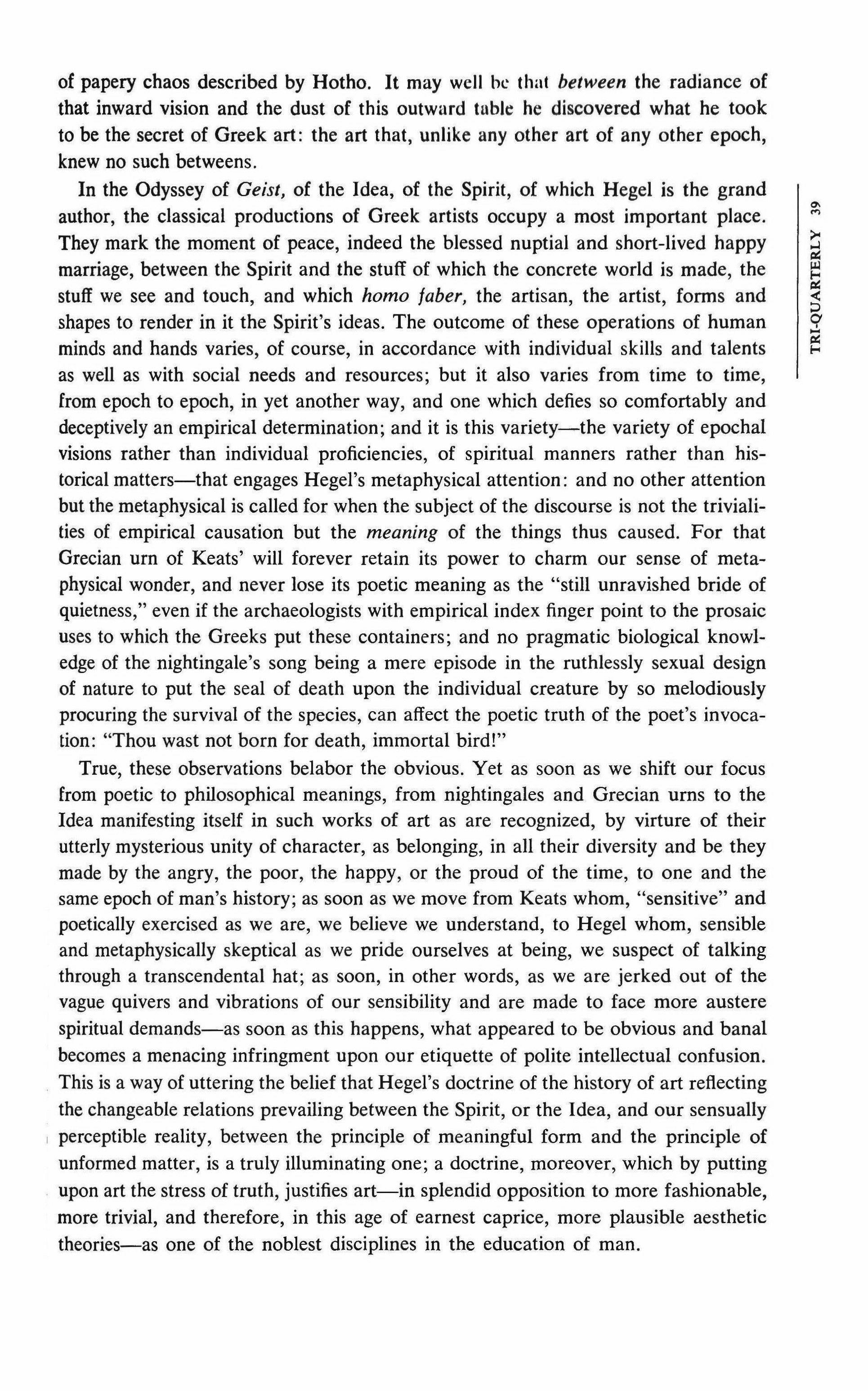
of papery chaos described by Hotho. It may well he that between the radiance of that inward vision and the dust of this outward table he discovered what he took to be the secret of Greek art: the art that, unlike any other art of any other epoch, knew no such betweens.
In the Odyssey of Geist, of the Idea, of the Spirit, of which Hegel is the grand author, the classical productions of Greek artists occupy a most important place. They mark the moment of peace, indeed the blessed nuptial and short-lived happy marriage, between the Spirit and the stuff of which the concrete world is made, the stuff we see and touch, and which homo faber, the artisan, the artist, forms and shapes to render in it the Spirit's ideas. The outcome of these operations of human minds and hands varies, of course, in accordance with individual skills and talents as well as with social needs and resources; but it also varies from time to time, from epoch to epoch, in yet another way, and one which defies so comfortably and deceptively an empirical determination; and it is this variety-the variety of epochal visions rather than individual proficiencies, of spiritual manners rather than historical matters-that engages Hegel's metaphysical attention: and no other attention but the metaphysical is called for when the subject of the discourse is not the trivialities of empirical causation but the meaning of the things thus caused. For that Grecian urn of Keats' will forever retain its power to charm our sense of metaphysical wonder, and never lose its poetic meaning as the "still unravished bride of quietness," even if the archaeologists with empirical index finger point to the prosaic uses to which the Greeks put these containers; and no pragmatic biological knowledge of the nightingale's song being a mere episode in the ruthlessly sexual design of nature to put the seal of death upon the individual creature by so melodiously procuring the survival of the species, can affect the poetic truth of the poet's invocation: "Thou wast not born for death, immortal bird!"
True, these observations belabor the obvious. Yet as soon as we shift our focus from poetic to philosophical meanings, from nightingales and Grecian urns to the Idea manifesting itself in such works of art as are recognized, by virture of their utterly mysterious unity of character, as belonging, in all their diversity and be they made by the angry, the poor, the happy, or the proud of the time, to one and the same epoch of man's history; as soon as we move from Keats whom, "sensitive" and poetically exercised as we are, we believe we understand, to Hegel whom, sensible and metaphysically skeptical as we pride ourselves at being, we suspect of talking through a transcendental hat; as soon, in other words, as we are jerked out of the vague quivers and vibrations of our sensibility and are made to face more austere spiritual demands-as soon as this happens, what appeared to be obvious and banal becomes a menacing infringment upon our etiquette of polite intellectual confusion. This is a way of uttering the belief that Hegel's doctrine of the history of art reflecting the changeable relations prevailing between the Spirit, or the Idea, and our sensually perceptible reality, between the principle of meaningful form and the principle of unformed matter, is a truly illuminating one; a doctrine, moreover, which by putting upon art the stress of truth, justifies art-in splendid opposition to more fashionable, more trivial, and therefore, in this age of earnest caprice, more plausible aesthetic theories-as one of the noblest disciplines in the education of man.
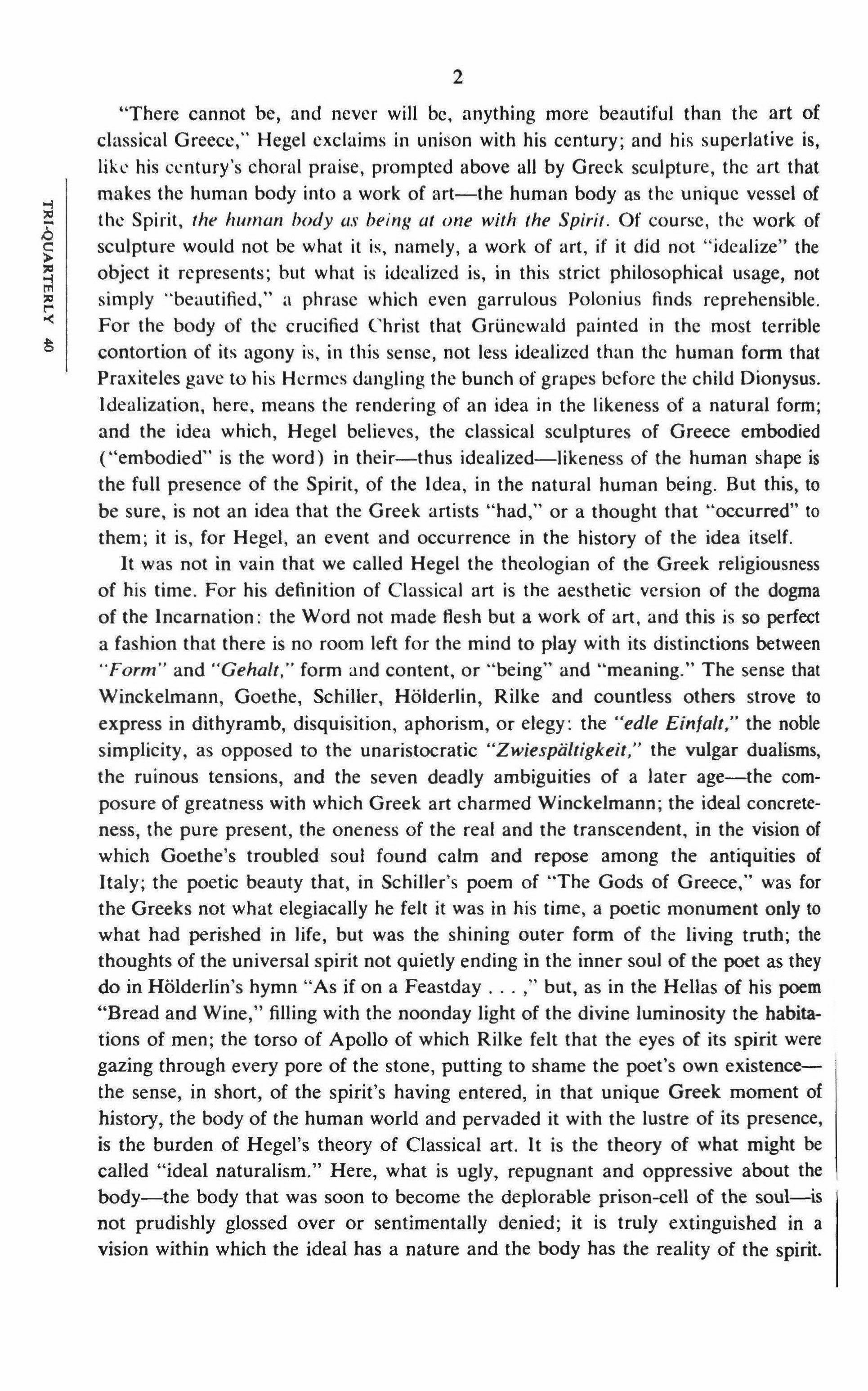
'There cannot be, and never will be, anything more beautiful than the art of classical Greece," Hegel exclaims in unison with his century; and his superlative is, like his century's choral praise, prompted above all by Greek sculpture, the art that makes the human body into a work of art-the human body as the unique vessel of the Spirit, the human body as being at one with the Spirit. Of course, the work of sculpture would not be what it is, namely, a work of art, if it did not "idealize" the object it represents; but what is idealized is, in this strict philosophical usage, not simply "beautified," a phrase which even garrulous Polonius finds reprehensible. For the body of the crucified Christ that Griincwald painted in the most terrible contortion of its agony is, in this sense, not less idealized than the human form that Praxiteles gave to his Hermes dangling the bunch of grapes before the child Dionysus. Idealization, here, means the rendering of an idea in the likeness of a natural form; and the idea which, Hegel believes, the classical sculptures of Greece embodied ("embodied" is the word) in their-thus idealized-likeness of the human shape is the full presence of the Spirit, of the Idea, in the natural human being. But this, to be sure, is not an idea that the Greek artists "had," or a thought that "occurred" to them; it is, for Hegel, an event and occurrence in the history of the idea itself. It was not in vain that we called Hegel the theologian of the Greek religiousness of his time. For his definition of Classical art is the aesthetic version of the dogma of the Incarnation: the Word not made flesh but a work of art, and this is so perfect a fashion that there is no room left for the mind to play with its distinctions between "Form" and "Gehalt," form and content, or "being" and "meaning." The sense that Winckelmann, Goethe, Schiller, Holderlin, Rilke and countless others strove to express in dithyramb, disquisition, aphorism, or elegy: the "edle Einjalt;" the noble simplicity, as opposed to the un aristocratic "Zwiespiiltigkelt," the vulgar dualisms, the ruinous tensions, and the seven deadly ambiguities of a later age-the composure of greatness with which Greek art charmed Winckelmann; the ideal concreteness, the pure present, the oneness of the real and the transcendent, in the vision of which Goethe's troubled soul found calm and repose among the antiquities of Italy; the poetic beauty that, in Schiller's poem of "The Gods of Greece," was for the Greeks not what elegiacally he felt it was in his time, a poetic monument only to what had perished in life, but was the shining outer form of the living truth; the thoughts of the universal spirit not quietly ending in the inner soul of the poet as they do in Holderlin's hymn "As if on a Feastday ," but, as in the Hellas of his poem "Bread and Wine," filling with the noonday light of the divine luminosity the habitations of men; the torso of Apollo of which Rilke felt that the eyes of its spirit were gazing through every pore of the stone, putting to shame the poet's own existencethe sense, in short, of the spirit's having entered, in that unique Greek moment of history, the body of the human world and pervaded it with the lustre of its presence, is the burden of Hegel's theory of Classical art. It is the theory of what might be called "ideal naturalism." Here, what is ugly, repugnant and oppressive about the body-the body that was soon to become the deplorable prison-cell of the soul-is not prudishly glossed over or sentimentally denied; it is truly extinguished in a vision within which the ideal has a nature and the body has the reality of the spirit.
2
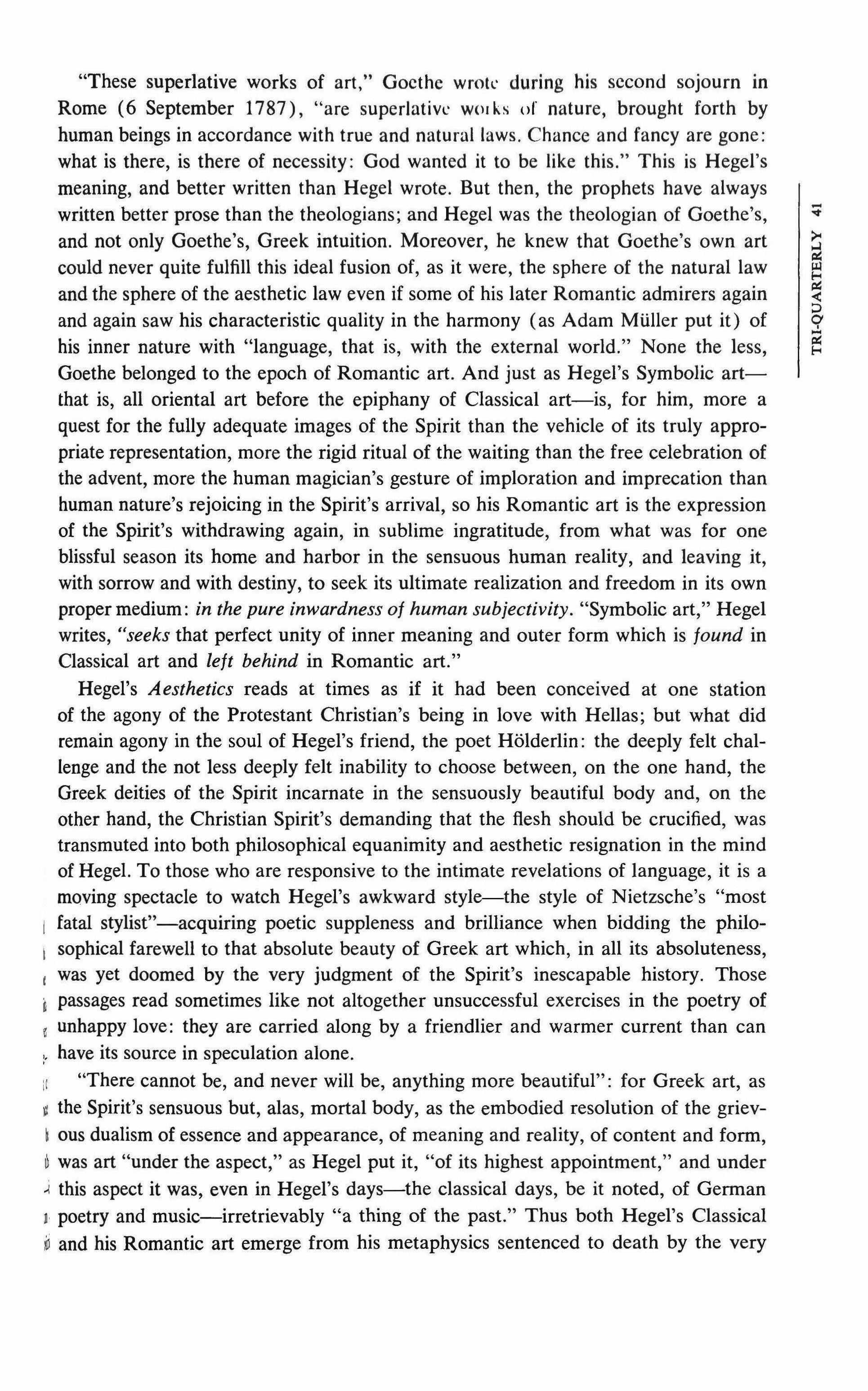
"These superlative works of art," Goethe wrote during his second sojourn in Rome (6 September 1787), "are superlative WOI ks of nature, brought forth by human beings in accordance with true and natural laws. Chance and fancy are gone: what is there, is there of necessity: God wanted it to be like this." This is Hegel's meaning, and better written than Hegel wrote. But then, the prophets have always written better prose than the theologians; and Hegel was the theologian of Goethe's, and not only Goethe's, Greek intuition. Moreover, he knew that Goethe's own art could never quite fulfill this ideal fusion of, as it were, the sphere of the natural law and the sphere of the aesthetic law even if some of his later Romantic admirers again and again saw his characteristic quality in the harmony (as Adam MUller put it) of his inner nature with "language, that is, with the external world." None the less, Goethe belonged to the epoch of Romantic art. And just as Hegel's Symbolic artthat is, all oriental art before the epiphany of Classical art-is, for him, more a quest for the fully adequate images of the Spirit than the vehicle of its truly appropriate representation, more the rigid ritual of the waiting than the free celebration of the advent, more the human magician's gesture of imploration and imprecation than human nature's rejoicing in the Spirit's arrival, so his Romantic art is the expression of the Spirit's withdrawing again, in sublime ingratitude, from what was for one blissful season its home and harbor in the sensuous human reality, and leaving it, with sorrow and with destiny, to seek its ultimate realization and freedom in its own proper medium: in the pure inwardness of human subjectivity. "Symbolic art," Hegel writes, "seeks that perfect unity of inner meaning and outer form which is found in Classical art and left behind in Romantic art."
Hegel's Aesthetics reads at times as if it had been conceived at one station of the agony of the Protestant Christian's being in love with Hellas; but what did remain agony in the soul of Hegel's friend, the poet Holderlin: the deeply felt challenge and the not less deeply felt inability to choose between, on the one hand, the Greek deities of the Spirit incarnate in the sensuously beautiful body and, on the other hand, the Christian Spirit's demanding that the flesh should be crucified, was transmuted into both philosophical equanimity and aesthetic resignation in the mind of Hegel. To those who are responsive to the intimate revelations of language, it is a moving spectacle to watch Hegel's awkward style-the style of Nietzsche's "most fatal stylist"-acquiring poetic suppleness and brilliance when bidding the philosophical farewell to that absolute beauty of Greek art which, in all its absoluteness,
I was yet doomed by the very judgment of the Spirit's inescapable history. Those I passages read sometimes like not altogether unsuccessful exercises in the poetry of I unhappy love: they are carried along by a friendlier and warmer current than can
:. have its source in speculation alone.
[I "There cannot be, and never will be, anything more beautiful": for Greek art, as
� the Spirit's sensuous but, alas, mortal body, as the embodied resolution of the griev
I ous dualism of essence and appearance, of meaning and reality, of content and form,
� was art "under the aspect," as Hegel put it, "of its highest appointment," and under
� this aspect it was, even in Hegel's days-the classical days, be it noted, of German I poetry and music-irretrievably "a thing of the past." Thus both Hegel's Classical
� and his Romantic art emerge from his metaphysics sentenced to death by the very

law of the Spirit. Classical art had to die because the Spirit could not abide by the perfect understanding it had reached with concrete reality; for it lies in the Spirit's true nature that in the end it should be rid of all sensuous encumbrance. Romantic art, on the other hand, has been dramatizing, in all its forms, the crisis of confidence that the Spirit was bound to experience in its dealings with the concretely real world and thus with the material of art itself; and as this loss of faith is incurable, rooted as it is in the Spirit's true idea of itself, that is, of its destiny to achieve its absolute freedom and its objective existence in the unbound subjectivity of human inwardness. Romantic art is the negation of the very idea of art, of the ideal of the "Kunstschone" as the body of the Idea, as the precariously unstable "middle," in Hegel's words, "between Spirit and Nature." To put the Hegelian dialectic, so fatal to the history of art, at its most succinct: Classical art could not last because it was in contradiction to the true idea of the Spirit; and Romantic art was doomed because it was in contradiction to the true idea of art, thus driving inevitably towards the consummation of the death it has carried within itself from the beginning. "And this," says Hegel, "is not to be viewed as a mere diastrous accident suffered by art on account of impropitious external circumstances: the prosaic inclinations of people or the lack of interest shown by the time; it is brought about by [Romantic] art itself following its necessary course." For the Spirit frets and burrows in the earth of things only "as long as they still hide a secret from it," a secret fascinating the Spirit with the promise that, once yielded, it would enrich the Spirit's knowledge of itself. But as soon as the Spirit has come into the full knowledge of its preordained negative relationship to reality, the positive spirit of art is in extremis. The only impulse that might be felt by it then would be a negative one: the impulse of polemic and satire. In this context Hegel mentions Aristophanes who, for him, not merely satirizes the corruptions in the Republic but signals the exhaustion of the positive spirit of Greek art. A latter-day Hegel would certainly not be at a loss to think of latter-day names to demonstrate the negativity of the spirit of art in its estrangement from the realities of the age; and he only would have to recite the obligatory names of Baudelaire, Proust, Picasso, Rilke, Joyce, T. S. Eliot, Kafka, Thomas Mann, Sartre, Camus, Brecht; and might even suppress those of the minor manufacturers of last tapes, end games, tin drums, rhinoceroses and other zoo stories about the desolation of the Spirit in the face of a desolate world.
When Goethe described the theme of his Torquato Tasso--his, in a Hegelian sense, most Romantic work-as "die Disproportion des Talents mit dem Leben," the disproportion obtaining between talent and life, he might as well have used the language of Hegel and spoken of the Romantic incompatibility of the genius of art, or indeed of the Spirit itself, with the conditions of existence. For the Goethean Tasso's tragic perplexity springs entirely from a rich subjectivity, be it that of poetry or love, painfully at odds with the very constitution of a world where to think or to feel is, in the words of Keats,
to be full of sorrow
And leaden-eyed despairs

What is said of Tasso in the drama itself-that he tends to withdraw entirely into his inner self, just as if the whole world were within, .uid without no world whatever -Hegel says of the inborn tendency of Romantic art itself. Hence Hegel comes close to defining all art after Greek art, all Romantic art, as the art post artem, the long-sustained and plentiful after-thought of art, when the Spirit is no longer quite at ease in the commerce with its sensuous media and has already premonitions that one day it will "desire to find its satisfaction solely in its own in-dwelling as the true abode of truth."
In its own in-dwelling He who happens to travel from the temples of Greece to the churches of France can almost follow the course of this retreat with his own eyes. To strain one's sight, still spoiled by the bright day outside, in the holy dusk of the Lord's residences across the Auvergne, in Le Puy or Issoire or Brioude, and then to recall the sanctuary of Aegina, visited only a few days past, is like tracking the Hegelian Spirit from its marble pasture under the open skies to its secret lair enclosed by stone-the very stone which, in its turn, falls victim to the most astonishing campaign ever conducted by the Spirit against the native heaviness of matter. These ribbed vaults and pointed arches, these clustered columns, ogives, spurs and buttresses, these pinnacles and traceries, these vast roses and panels of glass-they all conspire, in Vezelay, Bourges, Chartres, or Ste. ChapeUe of Paris, to break and transform the massive masonry into the inner soul's essays at casting off the rocky weight; and what the sensual eye sees there is not the pines, the olive-trees, and the ocean it saw from the colonnades on the height of Aegina; it sees what can only be seen from within the sacred dark enclosure: the story of the suffering incarnate God painted on the windows and in colours that seem to have been thought out by the heart of a child; and there is yet more it cannot see at all: processions of figures and bursts of ornaments high up under the roof and hidden in cornices and recesses, and yet executed with infinitely patient art for nobody's vision but God's or the Spirit's. This is Hegel's "Romantic architecture," the grandest among the stage-settings of Romantic art, the art that, in all its varied scenes, shows-to take the cue from Rilke's Fourth Elegy-the scenery of the farewell bidden to the external world by the soul of man.
3
In all its scenes? Even in those in which the Romantic stage displayed, as it did, for instance, in Flemish painting from the van Eycks to Quentin Massys, an unparalleled and insatiable appetite for the things of the visible world, just as if, so contrary to Hegel's idea, the Spirit counted for nothing, and for everything the texture of brocade, the feel of velvet, the softness of fur, the glitter of gold, the curvature of apples, or this particular crimson of this particular mantle? Michelangelo is reported to have said, contemptuously, of this manner of painting that in Flanders nothing seemed to matter to the painters as much as "to render exactly and deceptively the outward appearance of objects" and to portray "minutely many things where a single one would have sufficed." What a rebuttal, it seems, of Hegel's theory, and the more damaging, perhaps, because Hegel himself, as his expansive disquisitions meander through the individual periods of art, sometimes forgets the promise
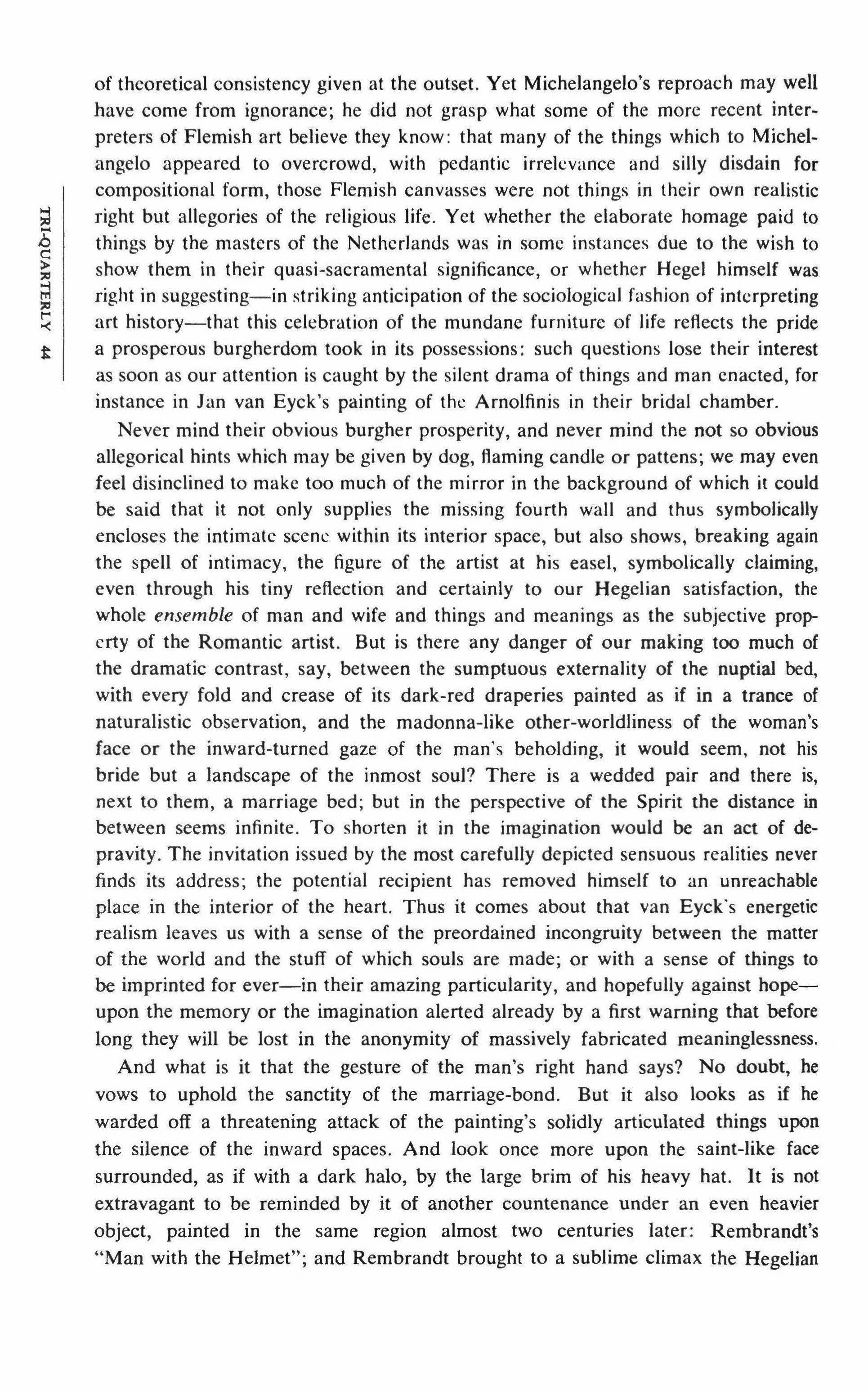
of theoretical consistency given at the outset. Yet Michelangelo's reproach may well have come from ignorance; he did not grasp what some of the more recent interpreters of Flemish art believe they know: that many of the things which to Michelangelo appeared to overcrowd, with pedantic irrelevance and silly disdain for compositional form, those Flemish canvasses were not things in their own realistic right but allegories of the religious life. Yet whether the elaborate homage paid to things by the masters of the Netherlands was in some instances due to the wish to show them in their quasi-sacramental significance, or whether Hegel himself was right in suggesting-in striking anticipation of the sociological fashion of interpreting art history-that this celebration of the mundane furniture of life reflects the pride a prosperous burgherdom took in its possessions: such questions lose their interest as soon as our attention is caught by the silent drama of things and man enacted, for instance in Jan van Eyck's painting of the Arnolfinis in their bridal chamber.
Never mind their obvious burgher prosperity, and never mind the not so obvious allegorical hints which may be given by dog, flaming candle or pattens; we may even feel disinclined to make too much of the mirror in the background of which it could be said that it not only supplies the missing fourth wall and thus symbolically encloses the intimate scene within its interior space, but also shows, breaking again the spell of intimacy, the figure of the artist at his easel, symbolically claiming, even through his tiny reflection and certainly to our Hegelian satisfaction, the whole ensemble of man and wife and things and meanings as the subjective property of the Romantic artist. But is there any danger of our making too much of the dramatic contrast, say, between the sumptuous externality of the nuptial bed, with every fold and crease of its dark-red draperies painted as if in a trance of naturalistic observation, and the madonna-like other-worldliness of the woman's face or the inward-turned gaze of the man's beholding, it would seem, not his bride but a landscape of the inmost soul? There is a wedded pair and there is, next to them, a marriage bed; but in the perspective of the Spirit the distance in between seems infinite. To shorten it in the imagination would be an act of depravity. The invitation issued by the most carefully depicted sensuous realities never finds its address; the potential recipient has removed himself to an unreachable place in the interior of the heart. Thus it comes about that van Eyck's energetic realism leaves us with a sense of the preordained incongruity between the matter of the world and the stuff of which souls are made; or with a sense of things to be imprinted for ever-in their amazing particularity, and hopefully against hopeupon the memory or the imagination alerted already by a first warning that before long they will be lost in the anonymity of massively fabricated meaninglessness. And what is it that the gesture of the man's right hand says? No doubt, he vows to uphold the sanctity of the marriage-bond. But it also looks as if he warded off a threatening attack of the painting's solidly articulated things upon the silence of the inward spaces. And look once more upon the saint-like face surrounded, as if with a dark halo, by the large brim of his heavy hat. It is not extravagant to be reminded by it of another countenance under an even heavier object, painted in the same region almost two centuries later: Rembrandt's "Man with the Helmet"; and Rembrandt brought to a sublime climax the Hegelian

drama of Romantic art: the spirit of human inw.i I dness taking its leave of the palpable, sensible world, a farewell and departure made the more moving by the light devoutly playing on the responsive instrument of external objects. But that golden light caressing the surface of the helmet is the light of the sunset of things and provides the shining foil for the retreat sounded by the face of the man: the retreat of the Spirit into human subjectivity. This withdrawal seems to have reached its goal in the late self-portraits of this most "naturalistic" of old masters. For despite its substantial application, the paint on those precious canvasses appears almost to apologize for its being there at all. It is an apology as beautiful as that of Socrates' at gladly entering the true realm of the soul; and the Platonic Socrates was, in Hegel's implied and Nietzsche's explicit opinion, no longer "Classical" and already "Romantic" by virtue of his knowledge that the transcendental Ideas will never-never again, Hegel would have to say-meet man in the market place of his accustomed reality. Rembrandt in the end, and on the brink of the silence of vanitas vanitatum vanitas, performs the miracle of rendering to the senses-with an expressiveness that is as powerful as it is shy-what by its very nature must evade sensuous perception: pure human inwardness.
In this he had a predecessor, and strangely enough-or not so strangely, if we went to school with Hegel-in an epoch of art which saw itself as the second mother or midwife to the spirit of classical antiquity, and persuaded posterity to call it by the name of such a "Renaissance": Michelangelo in his old age. Yet even the young Michelangelo'S David-the sculptor was twenty-six when he set out to save the Carrara marble block that seemed to have been irremediably spoilt by another artist-even his David, victor over all the giant ugliness of the world, affects us, in all his unmistakable Hellenism, in a manner very different from the Olympian Apollo, triumphantly presiding over the vanquishing of the Centaurs. While the Olympian Apollo seems to say: "All things will be well when this is accomplished," there is in David's posture and distant gaze more than the expectation of doomed Goliath's approach; there is in it the tremble of the question: "And what will have been accomplished when this is done?," as if even this accomplishment were tainted with the sadness of its being merely the perfection of a deed done in the flesh of reality. For in the ruling of the Hegelian World-Spirit, that earlier and more confidently mundane hour of the Renaissance-the hour that gave birth to Donatello's David-s-could not be much prolonged; certainly not by Donatello himself, the later master of the Gothic-mystical St. John the Baptist in Venice or the Magdalen in Florence. But even that early David is hardly Greek in his exquisitely coquettish elegance; rather is he the sculptured fulfillment of what there was of secular erotic sophistication in the songs of the medieval troubadours and thus an anticipation of future Romance chivalries-not to be as rash as to think of the music of Mozart's Cherubino. Yet surely, this David appears to have been made more for winning amorous skirmishes than for carrying out murderous Herculean commissions.
Closer in spirit, if not in execution, to Michelangelo'S is a David made about fifty years before his and about fifty years after Donatello's: the David that Andrea del Castagno painted on a leather shield with which to enhance the glamour of
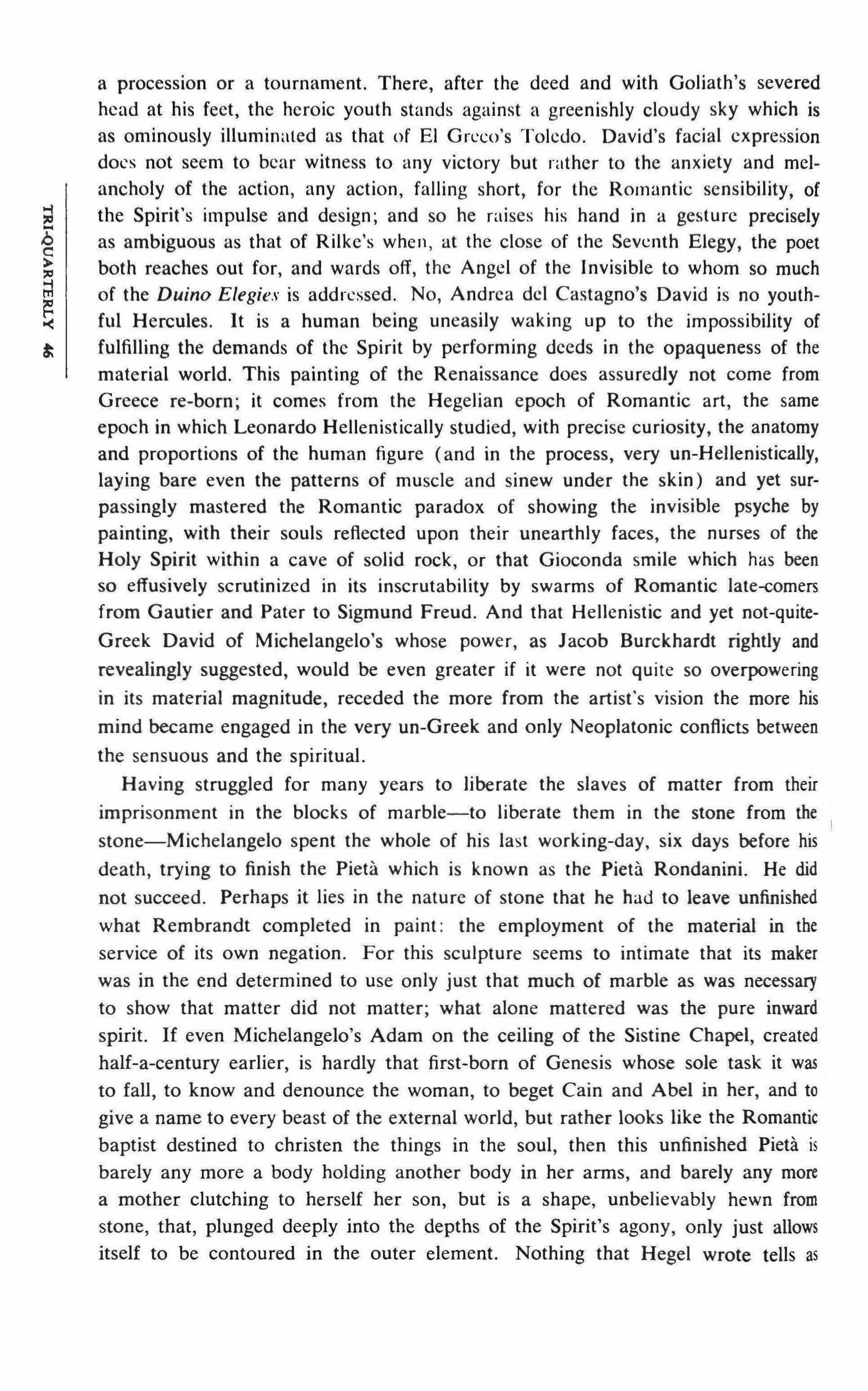
a procession or a tournament. There, after the deed and with Goliath's severed head at his feet, the heroic youth stands against a greenishly cloudy sky which is as ominously illuminated as that of EI Greco's Toledo. David's facial expression does not seem to bear witness to any victory but rather to the anxiety and melancholy of the action, any action, falling short, for the Romantic sensibility, of the Spirit's impulse and design; and so he raises his hand in a gesture precisely as ambiguous as that of Rilke's when, at the close of the Seventh Elegy, the poet both reaches out for, and wards off, the Angel of the Invisible to whom so much of the Duino Elegies is addressed. No, Andrea del Castagno's David is no youthful Hercules. It is a human being uneasily waking up to the impossibility of fulfilling the demands of the Spirit by performing deeds in the opaqueness of the material world. This painting of the Renaissance does assuredly not come from Greece re-born; it comes from the Hegelian epoch of Romantic art, the same epoch in which Leonardo Hellenistically studied, with precise curiosity, the anatomy and proportions of the human figure (and in the process, very un-Hellenistically, laying bare even the patterns of muscle and sinew under the skin) and yet surpassingly mastered the Romantic paradox of showing the invisible psyche by painting, with their souls reflected upon their unearthly faces, the nurses of the Holy Spirit within a cave of solid rock, or that Gioconda smile which has been so effusively scrutinized in its inscrutability by swarms of Romantic late-corners from Gautier and Pater to Sigmund Freud. And that Hellenistic and yet not-quiteGreek David of Michelangelo's whose power, as Jacob Burckhardt rightly and revealingly suggested, would be even greater if it were not quite so overpowering in its material magnitude, receded the more from the artist's vision the more his mind became engaged in the very un-Greek and only Neoplatonic conflicts between the sensuous and the spiritual.
Having struggled for many years to liberate the slaves of matter from their imprisonment in the blocks of marble-to liberate them in the stone from the stone-Michelangelo spent the whole of his last working-day, six days before his death, trying to finish the Pieta which is known as the Pieta Rondanini. He did not succeed. Perhaps it lies in the nature of stone that he had to leave unfinished what Rembrandt completed in paint: the employment of the materia} in the service of its own negation. For this sculpture seems to intimate that its maker was in the end determined to use only just that much of marble as was necessary to show that matter did not matter; what alone mattered was the pure inward spirit. If even Michelangelo's Adam on the ceiling of the Sistine Chapel, created half-a-century earlier, is hardly that first-born of Genesis whose sole task it was to fall, to know and denounce the woman, to beget Cain and Abel in her, and to give a name to every beast of the external world, but rather looks like the Romantic baptist destined to christen the things in the soul, then this unfinished Pieta is barely any more a body holding another body in her arms, and barely any more a mother clutching to herself her son, but is a shape, unbelievably hewn from stone, that, plunged deeply into the depths of the Spirit's agony, only just allows itself to be contoured in the outer element. Nothing that Hegel wrote tells as
telling a story of the Romantic artist's journey into the interior as the incongruously external and athletic arm that Michelangelo decided to sever from the body of Christ, but had no time to obliterate altogether. This arm is Hellenistic enough; and therefore Michelangelo had to amputate it as a limb suffering the disease of healthy, concrete reality.
"The artist's journey into the interior: Hamlet," the second part of this Series, will appear in the Winter issue of TRI-QUARTERLY.
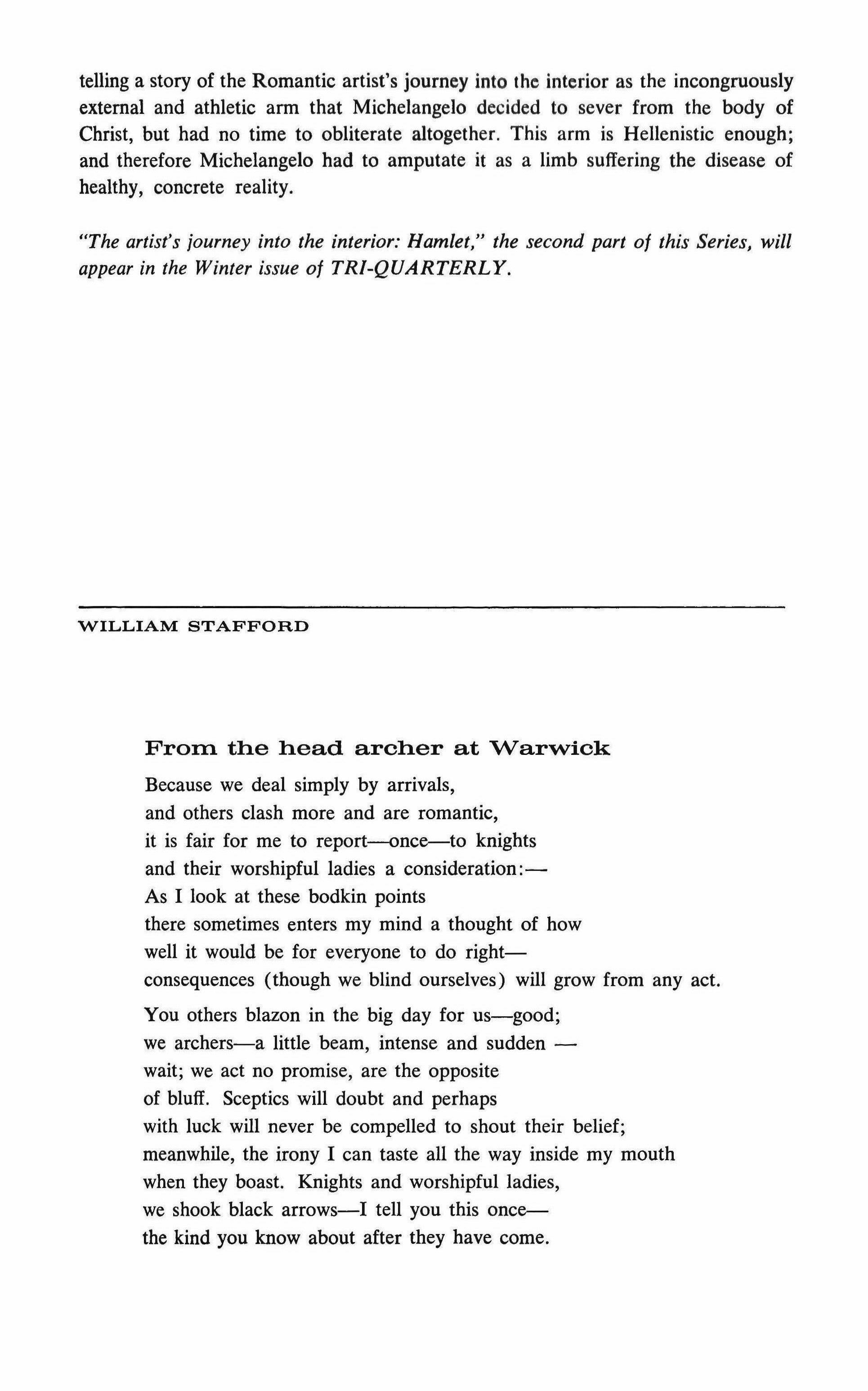 WILLIAM STAFFORD
WILLIAM STAFFORD
From the head archer at Warwick
Because we deal simply by arrivals, and others clash more and are romantic, it is fair for me to report--onc�to knights and their worshipful ladies a consideration:As I look at these bodkin points there sometimes enters my mind a thought of how well it would be for everyone to do rightconsequences (though we blind ourselves) will grow from any act. You others blazon in the big day for us-good; we archers-a little beam, intense and suddenwait; we act no promise, are the opposite of bluff. Sceptics will doubt and perhaps with luck will never be compelled to shout their belief; meanwhile, the irony I can taste all the way inside my mouth when they boast. Knights and worshipful ladies, we shook black arrows-I tell you this onc� the kind you know about after they have come.
Chronicler and historian
Chronicler:
What came I took; it does not occur to me how to say it was other; or that Other could be Now. What my still face can ever receive is only the truth, and all the sure past has become clear, precious; and syllable by syllable it struggles to live in my breath.
Historian:
No. I carry for others now that pain, our need, this lost men's trail to our door. My turn has come in a game that grows rich for us, for all who survive. I can find Now alone any time, let the air slide by, lock on what has become of the past. I turn to the dark and more and more deep in the world carve the real scene.
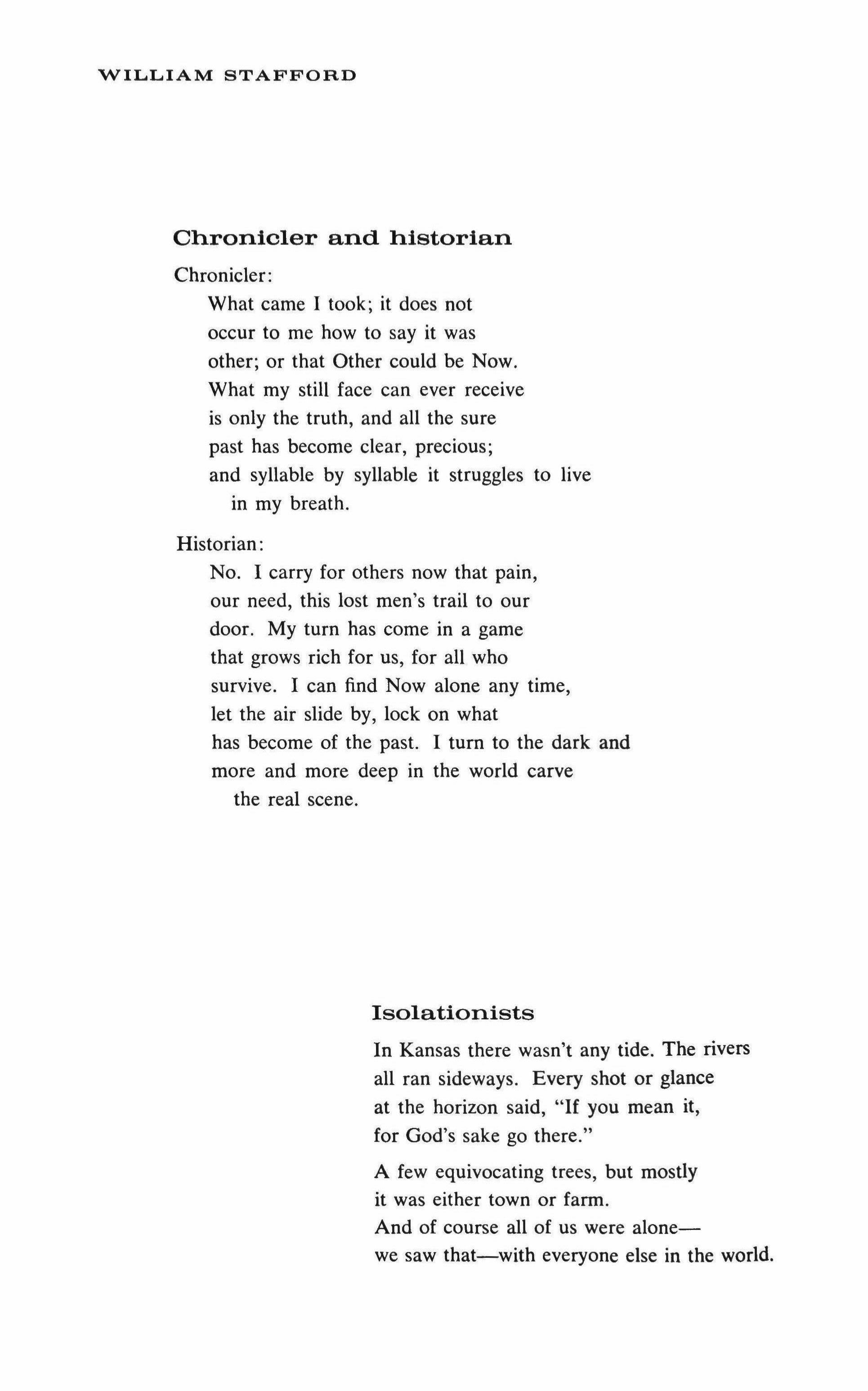
Isolationists
In Kansas there wasn't any tide. The rivers all ran sideways. Every shot or glance at the horizon said, "If you mean it, for God's sake go there."
A few equivocating trees, but mostly it was either town or farm. And of course all of us were alonewe saw that-with everyone else in the world.
WILLIAM STAFFORD
Extended Haiku
Why did my wife buy for my desk a candle never to be lighted and a frog to watch me day and night with no intention of moving its plaster feet?
That frog says, "You are never quick hopped or tight wired, but always wound up like a held in siren, and in sound suspended like bubble broth."
So I lunge forth, balanced on attention, into the aimed and cocked world: "Listen, toad, you little hunch of plaster, I am as ready to hop as you are."
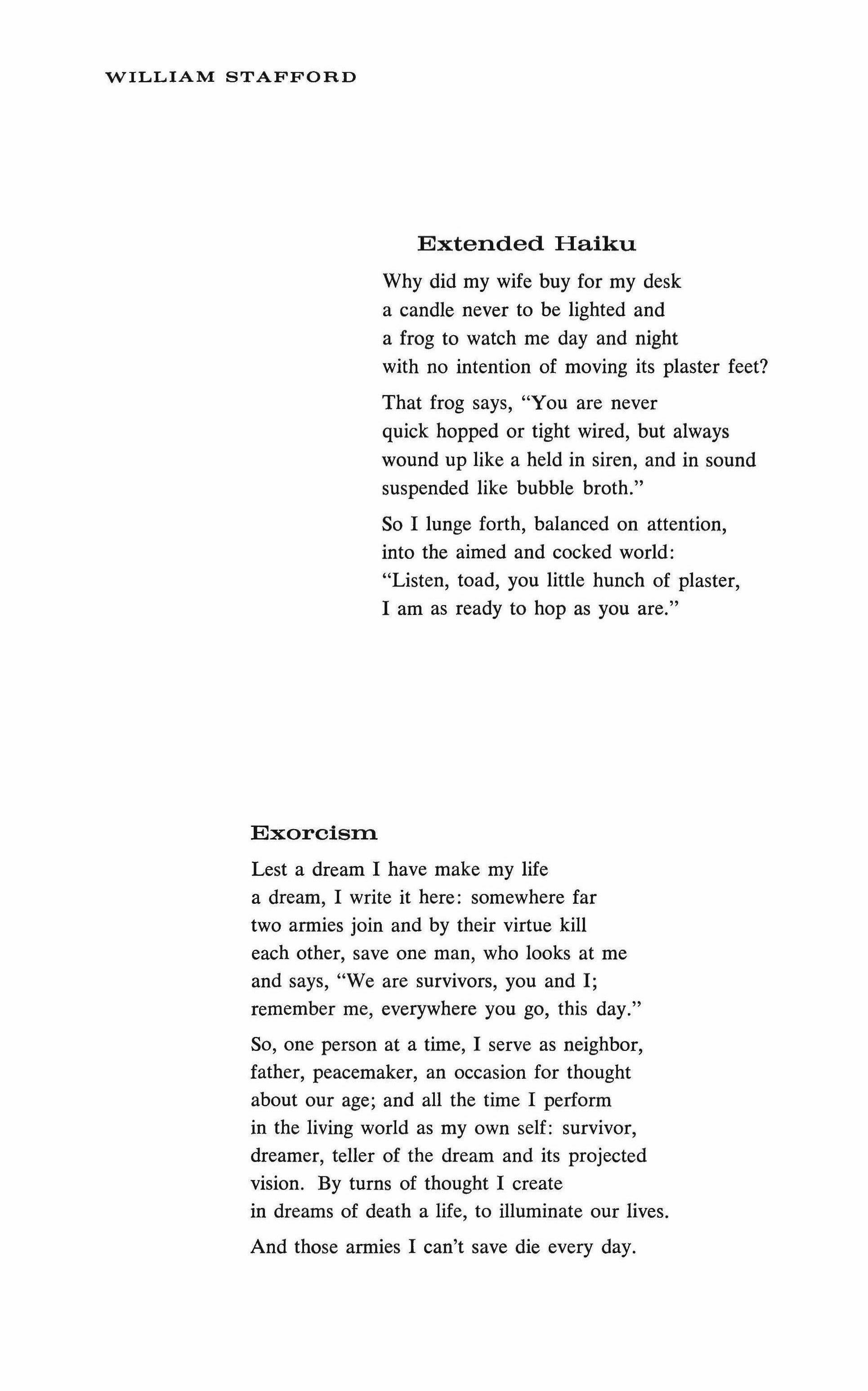
Exorcism
Lest a dream I have make my life a dream, I write it here: somewhere far two armies join and by their virtue kill each other, save one man, who looks at me and says, "We are survivors, you and I; remember me, everywhere you go, this day."
So, one person at a time, I serve as neighbor, father, peacemaker, an occasion for thought about our age; and all the time I perform in the living world as my own self: survivor, dreamer, teller of the dream and its projected vision. By turns of thought I create in dreams of death a life, to illuminate our lives. And those armies I can't save die every day.
WILLIAM STAFFORD
The birds and the bees
Modern Spanish Amerioan poetry
FREDERICK S. STIMSON
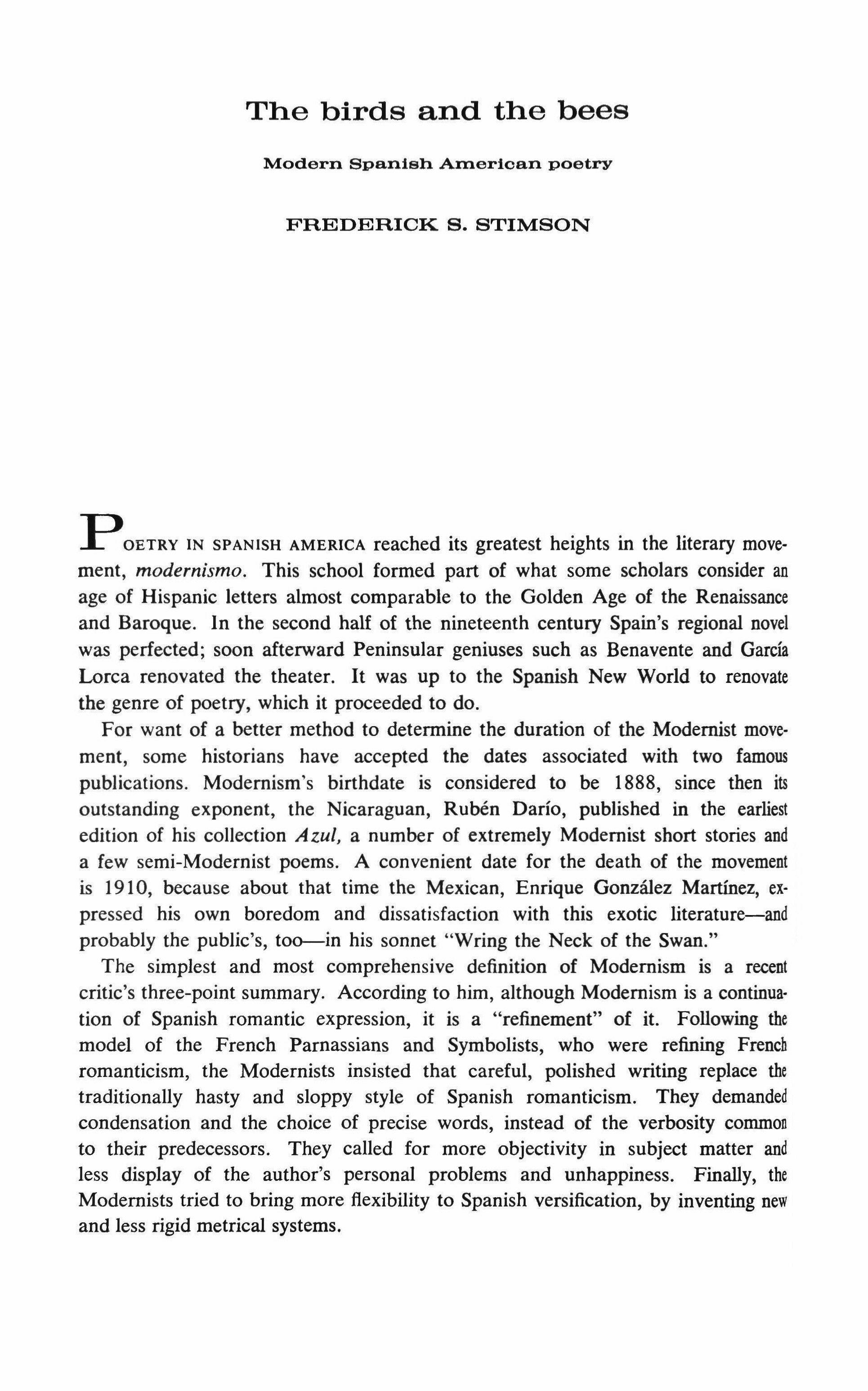
POETRY
IN SPANISH AMERICA reached its greatest heights in the literary movement, modernismo. This school formed part of what some scholars consider an age of Hispanic letters almost comparable to the Golden Age of the Renaissance and Baroque. In the second half of the nineteenth century Spain's regional novel was perfected; soon afterward Peninsular geniuses such as Benavente and Garcia Lorca renovated the theater. It was up to the Spanish New World to renovate the genre of poetry, which it proceeded to do.
For want of a better method to determine the duration of the Modernist movement, some historians have accepted the dates associated with two famous publications. Modernism's birthdate is considered to be 1888, since then its outstanding exponent, the Nicaraguan, Ruben Dario, published in the earliest edition of his collection Azul, a number of extremely Modernist short stories and a few semi-Modernist poems. A convenient date for the death of the movement is 1910, because about that time the Mexican, Enrique Gonzalez Martinez, expressed his own boredom and dissatisfaction with this exotic literature-and probably the public's, too-in his sonnet "Wring the Neck of the Swan."
The simplest and most comprehensive definition of Modernism is a recent critic's three-point summary. According to him, although Modernism is a continuation of Spanish romantic expression, it is a "refinement" of it. Following the model of the French Parnassians and Symbolists, who were refining French romanticism, the Modernists insisted that careful, polished writing replace the traditionally hasty and sloppy style of Spanish romanticism. They demanded condensation and the choice of precise words, instead of the verbosity common to their predecessors. They called for more objectivity in subject matter and less display of the author's personal problems and unhappiness. Finally, the Modernists tried to bring more flexibility to Spanish versification, by inventing new and less rigid metrical systems.
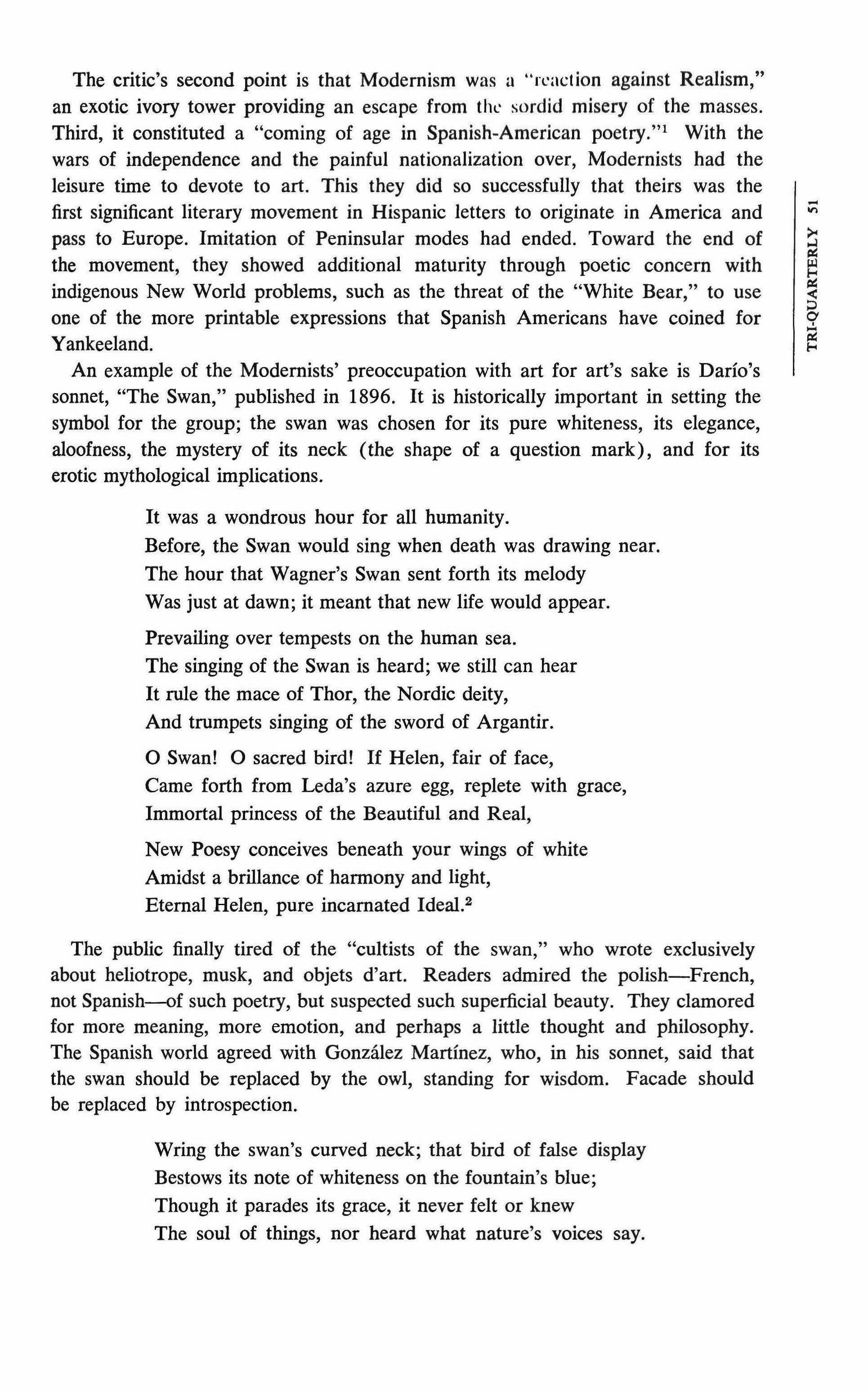
The critic's second point is that Modernism was a "reaction against Realism," an exotic ivory tower providing an escape from the sordid misery of the masses. Third, it constituted a "coming of age in Spanish-American poetry."! With the wars of independence and the painful nationalization over, Modernists had the leisure time to devote to art. This they did so successfully that theirs was the first significant literary movement in Hispanic letters to originate in America and pass to Europe. Imitation of Peninsular modes had ended. Toward the end of the movement, they showed additional maturity through poetic concern with indigenous New World problems, such as the threat of the "White Bear," to use one of the more printable expressions that Spanish Americans have coined for Yankeeland.
An example of the Modernists' preoccupation with art for art's sake is Dario's sonnet, "The Swan," published in 1896. It is historically important in setting the symbol for the group; the swan was chosen for its pure whiteness, its elegance, aloofness, the mystery of its neck (the shape of a question mark), and for its erotic mythological implications.
It was a wondrous hour for all humanity. Before, the Swan would sing when death was drawing near.
The hour that Wagner's Swan sent forth its melody Was just at dawn; it meant that new life would appear.
Prevailing over tempests on the human sea.
The singing of the Swan is heard; we still can hear It rule the mace of Thor, the Nordic deity, And trumpets singing of the sword of Argantir.
o Swan! 0 sacred bird! If Helen, fair of face, Came forth from Leda's azure egg, replete with grace, Immortal princess of the Beautiful and Real, New Poesy conceives beneath your wings of white Amidst a brillance of harmony and light, Eternal Helen, pure incarnated Ideal."
The public finally tired of the "cultists of the swan," who wrote exclusively about heliotrope, musk, and objets d'art. Readers admired the polish-French, not Spanish-of such poetry, but suspected such superficial beauty. They clamored for more meaning, more emotion, and perhaps a little thought and philosophy. The Spanish world agreed with Gonzalez Martinez, who, in his sonnet, said that the swan should be replaced by the owl, standing for wisdom. Facade should be replaced by introspection.
Wring the swan's curved neck; that bird of false display Bestows its note of whiteness on the fountain's blue;
Though it parades its grace, it never felt or knew The soul of things, nor heard what nature's voices say.
on
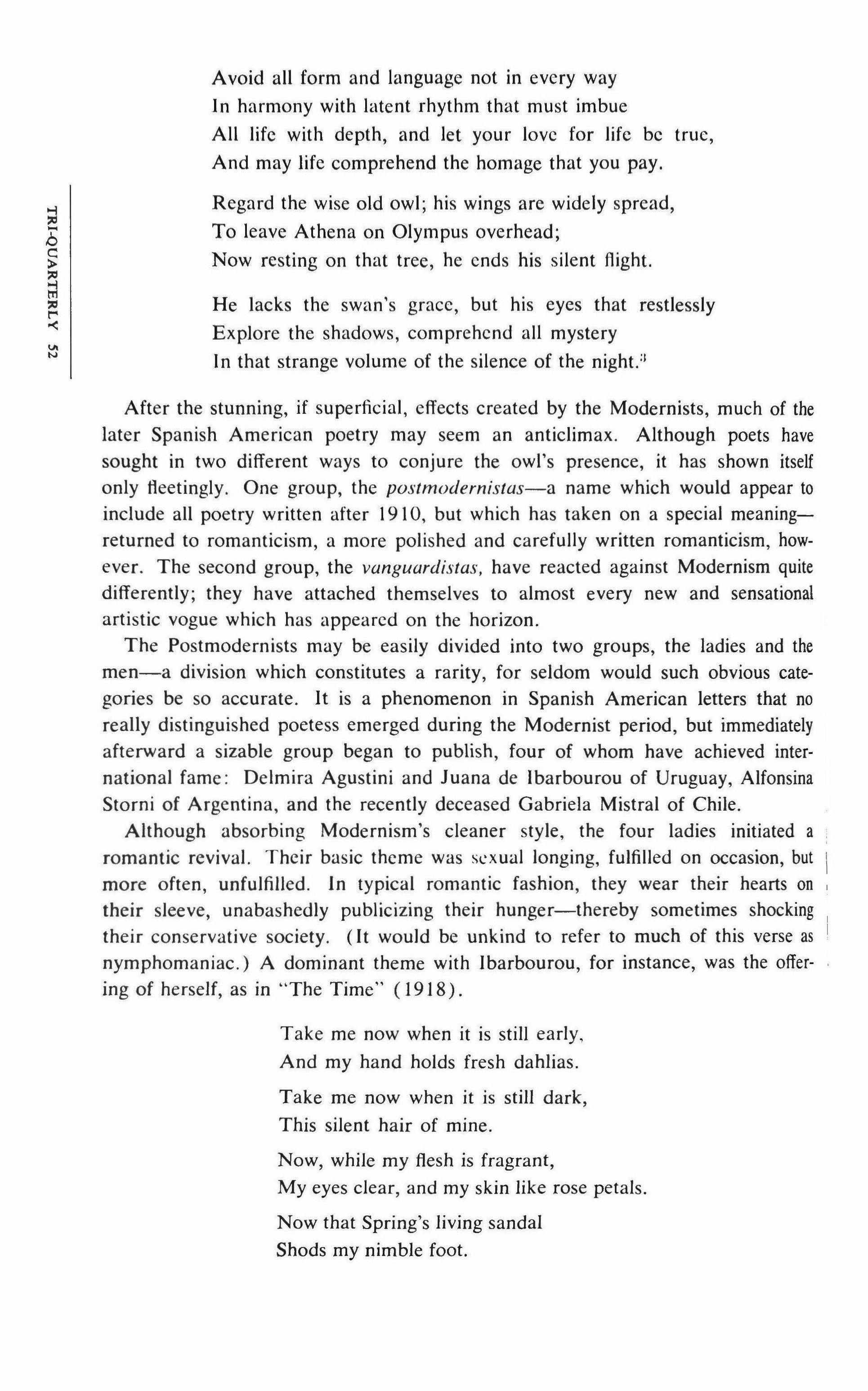
Avoid all form and language not in every way In harmony with latent rhythm that must imbue All life with depth, and let your love for life be true, And may life comprehend the homage that you pay.
Regard the wise old owl; his wings are widely spread, To leave Athena on Olympus overhead; Now resting on that tree, he ends his silent flight.
He lacks the swan's grace, but his eyes that restlessly Explore the shadows, comprehend all mystery In that strange volume of the silence of the night."
After the stunning, if superficial, effects created by the Modernists, much of the later Spanish American poetry may seem an anticlimax. Although poets have sought in two different ways to conjure the owl's presence, it has shown itself only fleetingly. One group, the postmodernistas=-e name which would appear to include all poetry written after 1910, but which has taken on a special meaningreturned to romanticism, a more polished and carefully written romanticism, however. The second group, the vanguardistas, have reacted against Modernism quite differently; they have attached themselves to almost every new and sensational artistic vogue which has appeared on the horizon.
The Postmodernists may be easily divided into two groups, the ladies and the men-a division which constitutes a rarity, for seldom would such obvious categories be so accurate. It is a phenomenon in Spanish American letters that no really distinguished poetess emerged during the Modernist period, but immediately afterward a sizable group began to publish, four of whom have achieved international fame: Delmira Agustini and Juana de Ibarbourou of Uruguay, Alfonsina Storni of Argentina, and the recently deceased Gabriela Mistral of Chile.
Although absorbing Modernism's cleaner style, the four ladies initiated a romantic revival. Their basic theme was sexual longing, fulfilled on occasion, but more often, unfulfilled. In typical romantic fashion, they wear their hearts on their sleeve, unabashedly publicizing their hunger-thereby sometimes shocking their conservative society. (It would be unkind to refer to much of this verse as nymphomaniac.) A dominant theme with lbarbourou, for instance, was the offering of herself, as in "The Time" (1918).
Take me now when it is still early, And my hand holds fresh dahlias.
Take me now when it is still dark, This silent hair of mine.
Now, while my flesh is fragrant, My eyes clear, and my skin like rose petals.
Now that Spring's living sandal Shods my nimble foot.
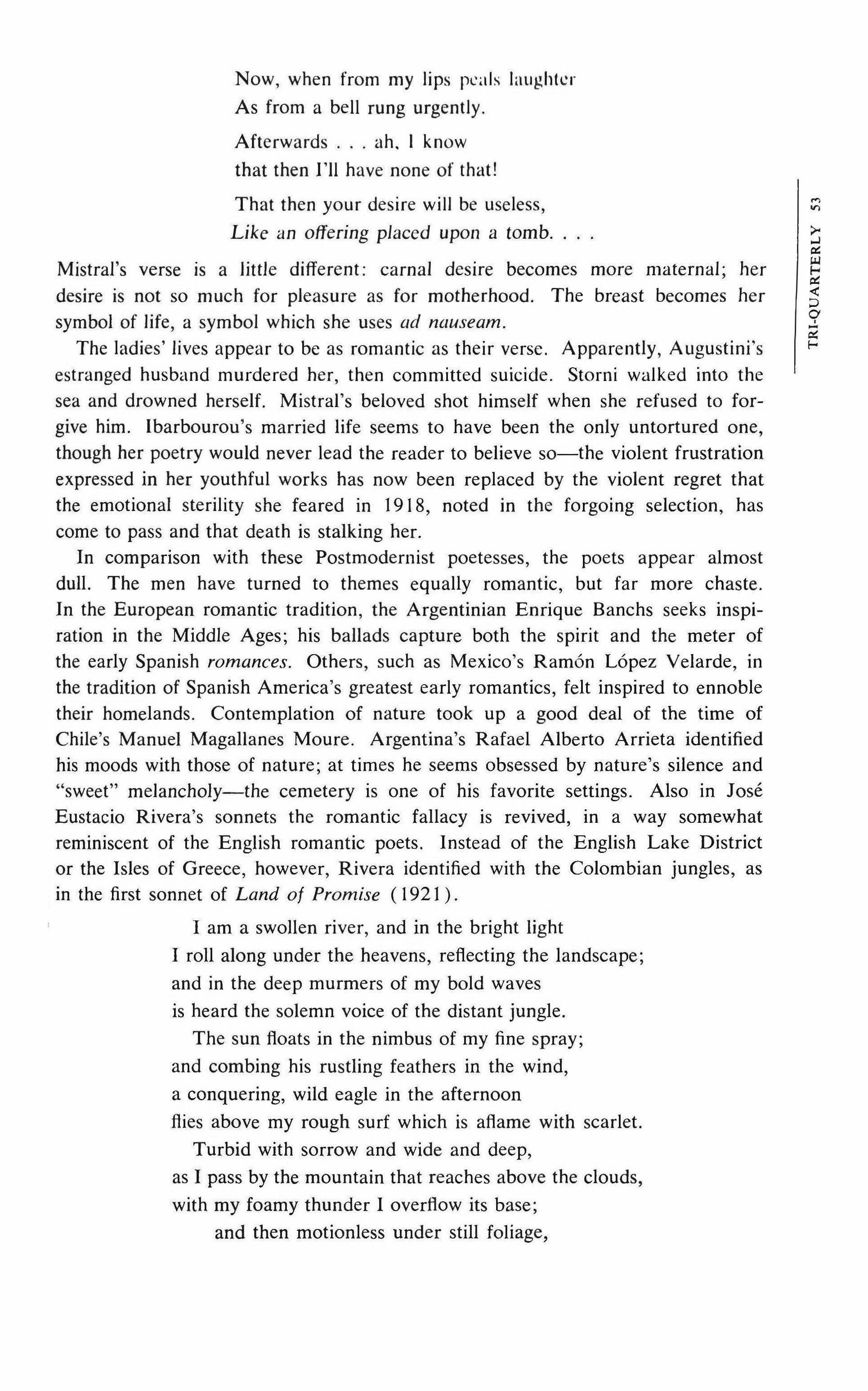
Now, when from my lips peals laughter
As from a bell rung urgently. Afterwards ah, I know that then I'll have none of that!
That then your desire will be useless, Like an offering placed upon a tomb.
Mistral's verse is a little different: carnal desire becomes more maternal; her desire is not so much for pleasure as for motherhood. The breast becomes her symbol of life, a symbol which she uses ad nauseam.
The ladies' lives appear to be as romantic as their verse. Apparently, Augustini's estranged husband murdered her, then committed suicide. Storni walked into the sea and drowned herself. Mistral's beloved shot himself when she refused to forgive him. lbarbourou's married life seems to have been the only untortured one, though her poetry would never lead the reader to believe so-the violent frustration expressed in her youthful works has now been replaced by the violent regret that the emotional sterility she feared in 1918, noted in the forgoing selection, has come to pass and that death is stalking her.
In comparison with these Postmodernist poetesses, the poets appear almost dull. The men have turned to themes equally romantic, but far more chaste. In the European romantic tradition, the Argentinian Enrique Banchs seeks inspiration in the Middle Ages; his ballads capture both the spirit and the meter of the early Spanish romances. Others, such as Mexico's Ramon Lopez Velarde, in the tradition of Spanish America's greatest early romantics, felt inspired to ennoble their homelands. Contemplation of nature took up a good deal of the time of Chile's Manuel Magallanes Moure. Argentina's Rafael Alberto Arrieta identified his moods with those of nature; at times he seems obsessed by nature's silence and "sweet" melancholy-the cemetery is one of his favorite settings. Also in Jose Eustacio Rivera's sonnets the romantic fallacy is revived, in a way somewhat reminiscent of the English romantic poets. Instead of the English Lake District or the Isles of Greece, however, Rivera identified with the Colombian jungles, as in the first sonnet of Land of Promise (1921).
I am a swollen river, and in the bright light I roll along under the heavens, reflecting the landscape; and in the deep murmers of my bold waves is heard the solemn voice of the distant jungle. The sun floats in the nimbus of my fine spray; and combing his rustling feathers in the wind, a conquering, wild eagle in the afternoon flies above my rough surf which is aflame with scarlet.
Turbid with sorrow and wide and deep, as I pass by the mountain that reaches above the clouds, with my foamy thunder I overflow its base; and then motionless under still foliage,
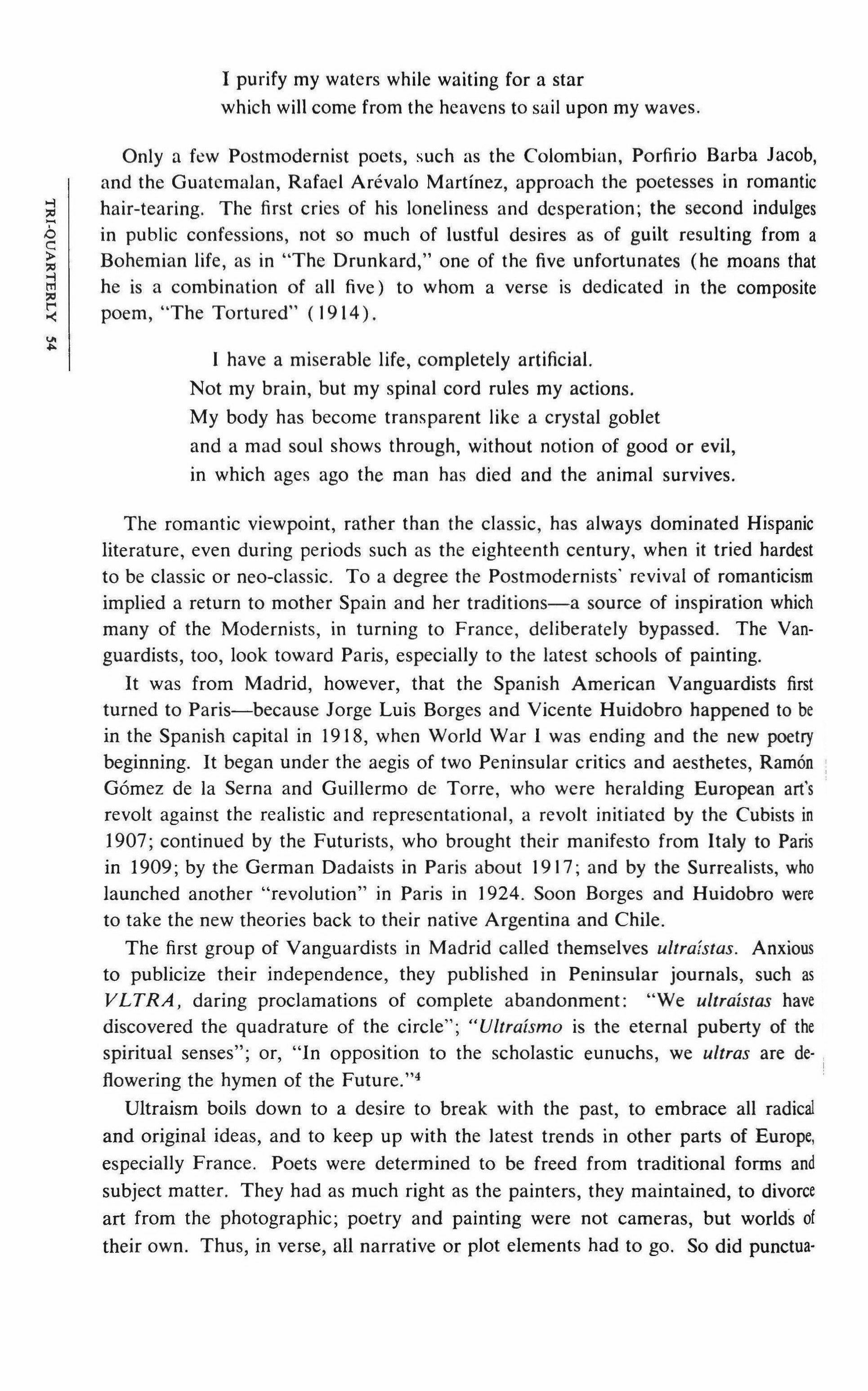
I purify my waters while waiting for a star which will come from the heavens to sail upon my waves.
Only a few Postmodernist poets, such as the Colombian, Porfirio Barba Jacob, and the Guatemalan, Rafael Arevalo Martinez, approach the poetesses in romantic hair-tearing. The first cries of his loneliness and desperation; the second indulges in public confessions, not so much of lustful desires as of guilt resulting from a Bohemian life, as in "The Drunkard," one of the five unfortunates (he moans that he is a combination of all five) to whom a verse is dedicated in the composite poem, "The Tortured" (1914).
I have a miserable life, completely artificial.
Not my brain, but my spinal cord rules my actions.
My body has become transparent like a crystal goblet and a mad soul shows through, without notion of good or evil, in which ages ago the man has died and the animal survives.
The romantic viewpoint, rather than the classic, has always dominated Hispanic literature, even during periods such as the eighteenth century, when it tried hardest to be classic or neo-classic. To a degree the Postmodernists' revival of romanticism implied a return to mother Spain and her traditions-a source of inspiration which many of the Modernists, in turning to France, deliberately bypassed. The Vanguardists, too, look toward Paris, especially to the latest schools of painting.
It was from Madrid, however, that the Spanish American Vanguardists first turned to Paris-because Jorge Luis Borges and Vicente Huidobro happened to be in the Spanish capital in 1918, when World War I was ending and the new poetry beginning. It began under the aegis of two Peninsular critics and aesthetes, Ramon Gomez de la Serna and Guillermo de Torre, who were heralding European art's revolt against the realistic and representational, a revolt initiated by the Cubists in 1907; continued by the Futurists, who brought their manifesto from Italy to Paris in 1909; by the German Dadaists in Paris about 1917; and by the Surrealists, who launched another "revolution" in Paris in 1924. Soon Borges and Huidobro were to take the new theories back to their native Argentina and Chile.
The first group of Vanguardists in Madrid called themselves ultralstas. Anxious to publicize their independence, they published in Peninsular journals, such as VLTRA, daring proclamations of complete abandonment: "We ultraistas have discovered the quadrature of the circle"; "Ultraismo is the eternal puberty of the spiritual senses"; or, "In opposition to the scholastic eunuchs, we ultras are deflowering the hymen of the Future."!
Ultraism boils down to a desire to break with the past, to embrace all radical and original ideas, and to keep up with the latest trends in other parts of Europe, especially France. Poets were determined to be freed from traditional forms and subject matter. They had as much right as the painters, they maintained, to divorce art from the photographic; poetry and painting were not cameras, but worlds of their own. Thus, in verse, all narrative or plot elements had to go. So did punctua-
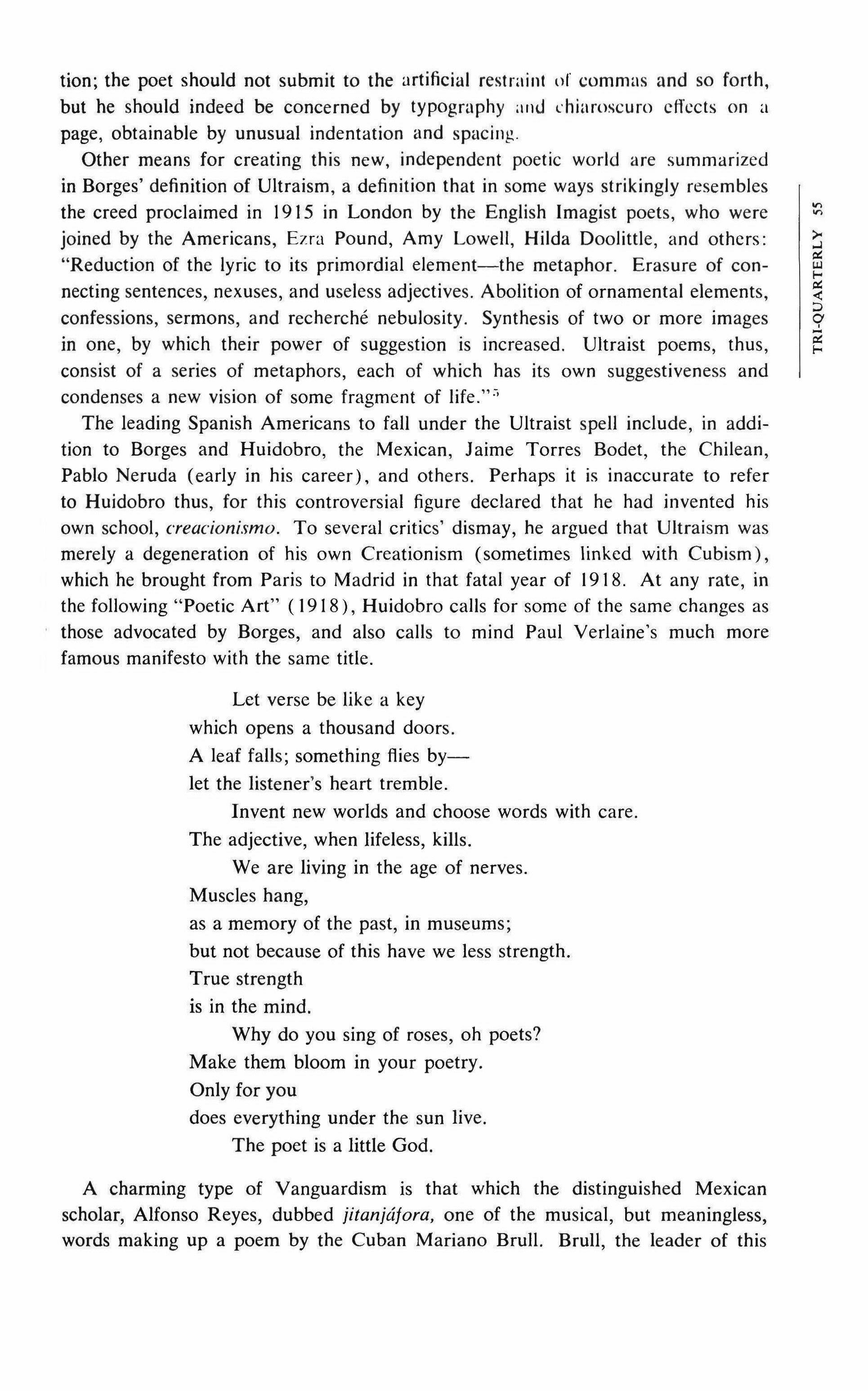
tion; the poet should not submit to the artificial restraint of commas and so forth, but he should indeed be concerned by typography and chiaroscuro effects on a page, obtainable by unusual indentation and spacing.
Other means for creating this new, independent poetic world are summarized in Borges' definition of Ultraism, a definition that in some ways strikingly resembles the creed proclaimed in 1915 in London by the English Imagist poets, who were joined by the Americans, Ezra Pound, Amy Lowell, Hilda Doolittle, and others: "Reduction of the lyric to its primordial element-the metaphor. Erasure of connecting sentences, nexuses, and useless adjectives. Abolition of ornamental elements, confessions, sermons, and recherche nebulosity. Synthesis of two or more images in one, by which their power of suggestion is increased. Ultraist poems, thus, consist of a series of metaphors, each of which has its own suggestiveness and condenses a new vision of some fragment of life.":'
The leading Spanish Americans to fall under the Ultraist spell include, in addition to Borges and Huidobro, the Mexican, Jaime Torres Bodet, the Chilean, Pablo Neruda (early in his career), and others. Perhaps it is inaccurate to refer to Huidobro thus, for this controversial figure declared that he had invented his own school, creacionismo. To several critics' dismay, he argued that Ultraism was merely a degeneration of his own Creationism (sometimes linked with Cubism), which he brought from Paris to Madrid in that fatal year of 1918. At any rate, in the following "Poetic Art" (1918), Huidobro calls for some of the same changes as those advocated by Borges, and also calls to mind Paul Verlaine's much more famous manifesto with the same title.
Let verse be like a key which opens a thousand doors. A leaf falls; something flies bylet the listener's heart tremble.
Invent new worlds and choose words with care.
The adjective, when lifeless, kills.
We are living in the age of nerves.
Muscles hang, as a memory of the past, in museums; but not because of this have we less strength.
True strength is in the mind.
Why do you sing of roses, oh poets? Make them bloom in your poetry.
Only for you does everything under the sun live. The poet is a little God.
A charming type of Vanguardism is that which the distinguished Mexican scholar, Alfonso Reyes, dubbed jitaniaiora, one of the musical, but meaningless, words making up a poem by the Cuban Mariano Brull. Brull, the leader of this
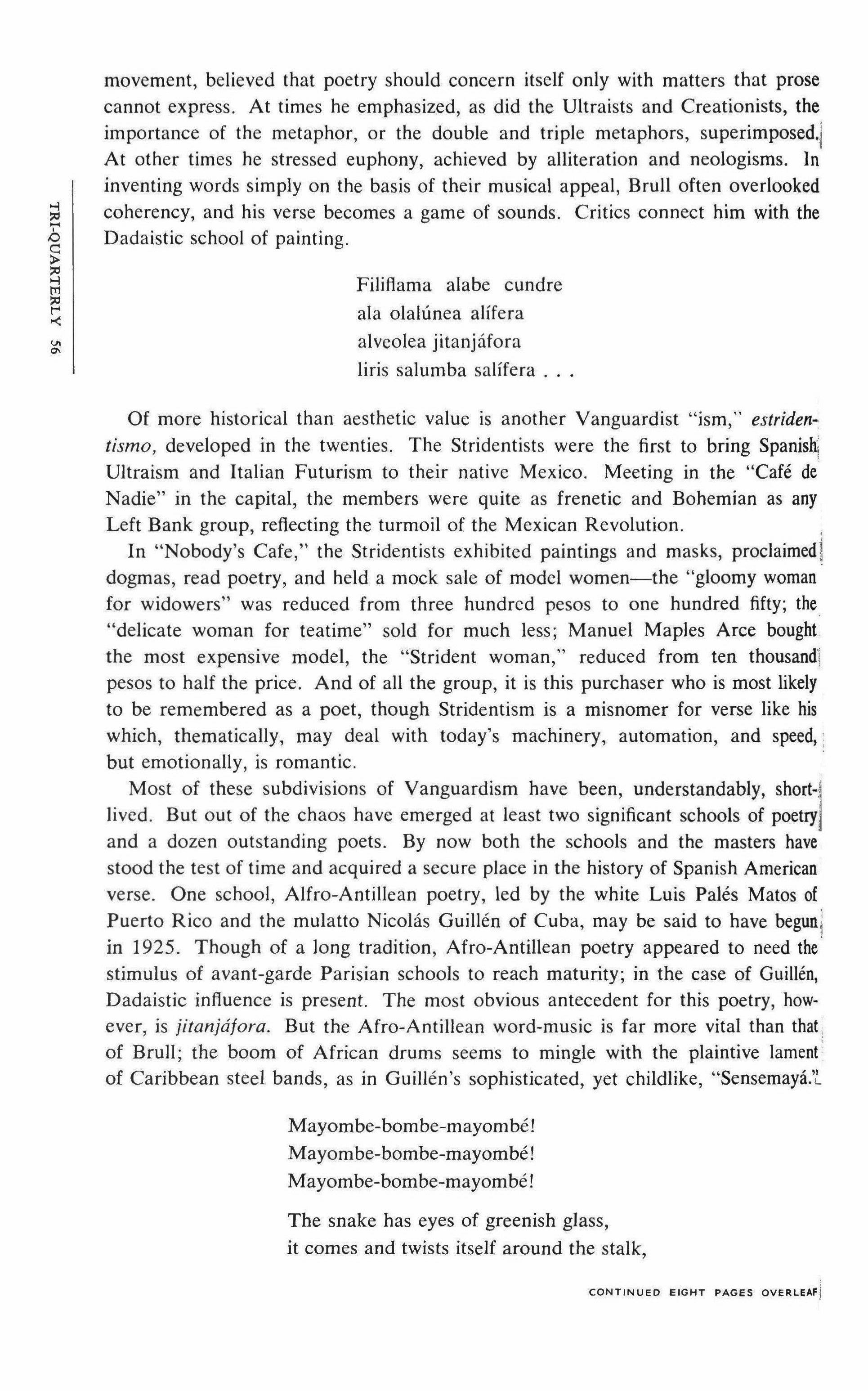
movement, believed that poetry should concern itself only with matters that prose cannot express. At times he emphasized, as did the Ultraists and Creationists, the importance of the metaphor, or the double and triple metaphors, superimposed.l At other times he stressed euphony, achieved by alliteration and neologisms. In inventing words simply on the basis of their musical appeal, Brull often overlooked coherency, and his verse becomes a game of sounds. Critics connect him with the Dadaistic school of painting.
Filiflarna alabe cundre
ala olahinea alifera
alveolea jitanjafora
liris salumba salifera
Of more historical than aesthetic value is another Vanguardist "ism," estridentismo, developed in the twenties. The Stridentists were the first to bring Spanish; Ultraism and Italian Futurism to their native Mexico. Meeting in the "Cafe de Nadie" in the capital, the members were quite as frenetic and Bohemian as any Left Bank group, reflecting the turmoil of the Mexican Revolution.
In "Nobody's Cafe," the Stridentists exhibited paintings and masks, proclaimedI dogmas, read poetry, and held a mock sale of model women-the "gloomy woman for widowers" was reduced from three hundred pesos to one hundred fifty; the "delicate woman for teatime" sold for much less; Manuel Maples Arce bought the most expensive model, the "Strident woman," reduced from ten thousand] pesos to half the price. And of all the group, it is this purchaser who is most likely to be remembered as a poet, though Stridentism is a misnomer for verse like his which, thematically, may deal with today's machinery, automation, and speed, but emotionally, is romantic.
Most of these subdivisions of Vanguardism have been, understandably, short-] lived. But out of the chaos have emerged at least two significant schools of poetryJ and a dozen outstanding poets. By now both the schools and the masters have stood the test of time and acquired a secure place in the history of Spanish American verse. One school, Alfro-Antillean poetry, led by the white Luis Pales Matos of Puerto Rico and the mulatto Nicolas Guillen of Cuba, may be said to have begun! j in 1925. Though of a long tradition, Afro-Antillean poetry appeared to need the stimulus of avant-garde Parisian schools to reach maturity; in the case of Guillen, Dadaistic influence is present. The most obvious antecedent for this poetry, however, is iitanjaiora. But the Afro-Antillean word-music is far more vital than that of Brull; the boom of African drums seems to mingle with the plaintive lament of Caribbean steel bands, as in Guillen's sophisticated, yet childlike, "Sensemaya.t
Mayombe-bombe-rnayornbe! Mayombe-bombe-mayombe! Mayombe-bombe-mayombe!
The snake has eyes of greenish glass, it comes and twists itself around the stalk,
CONTINUED EIGHT PAGES OVERlEAFj
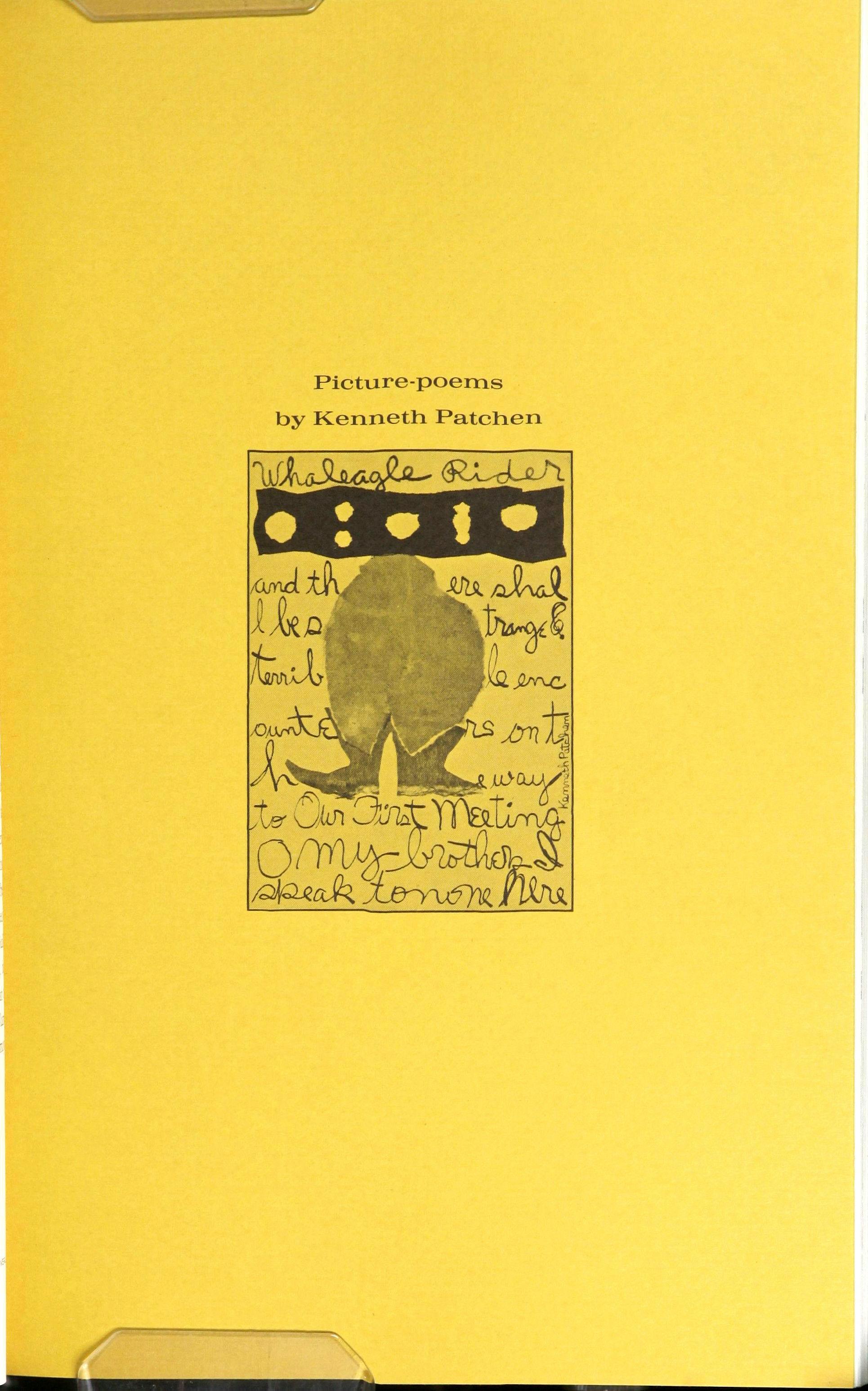
Picture-poems
by Kenneth Patchen
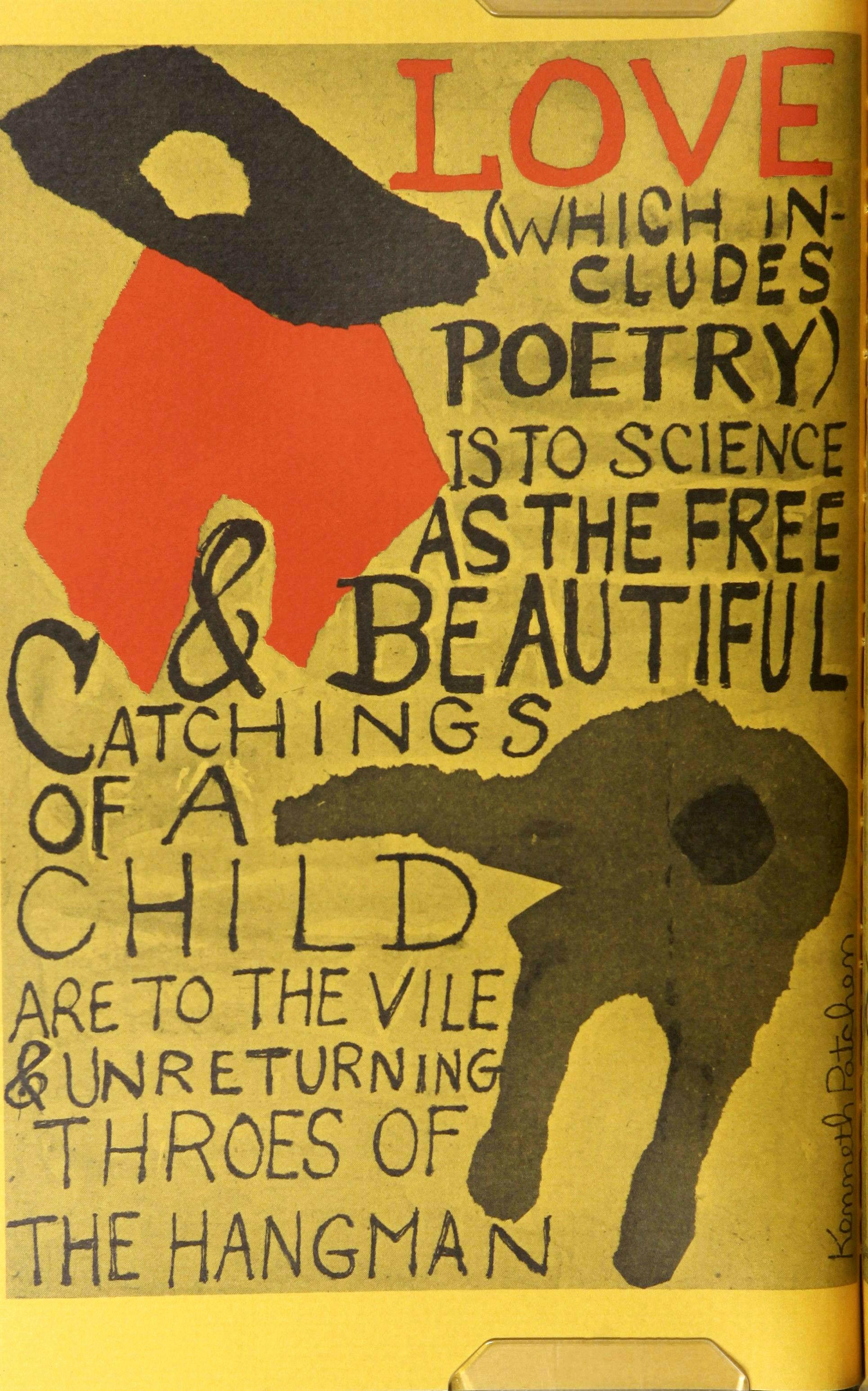
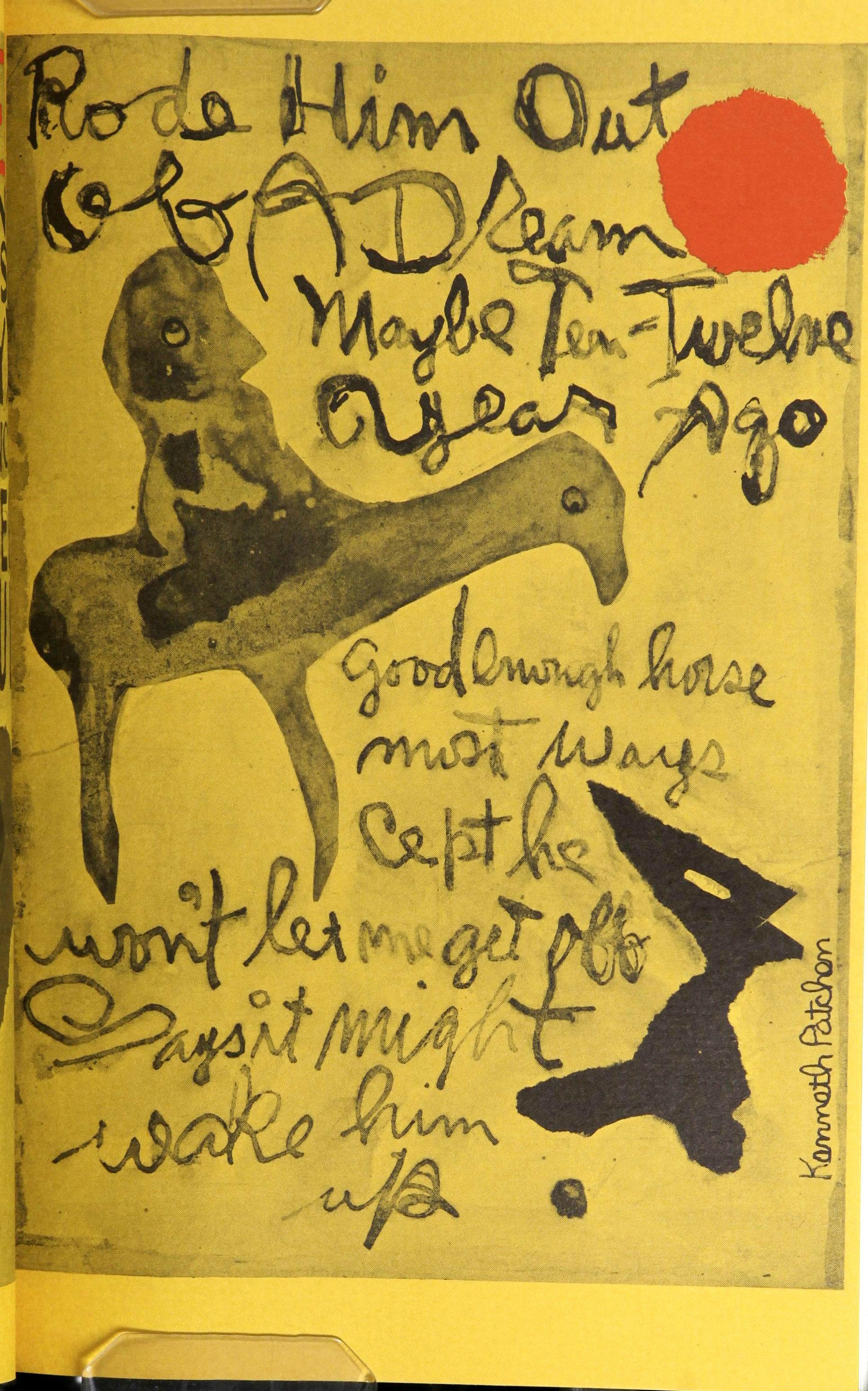
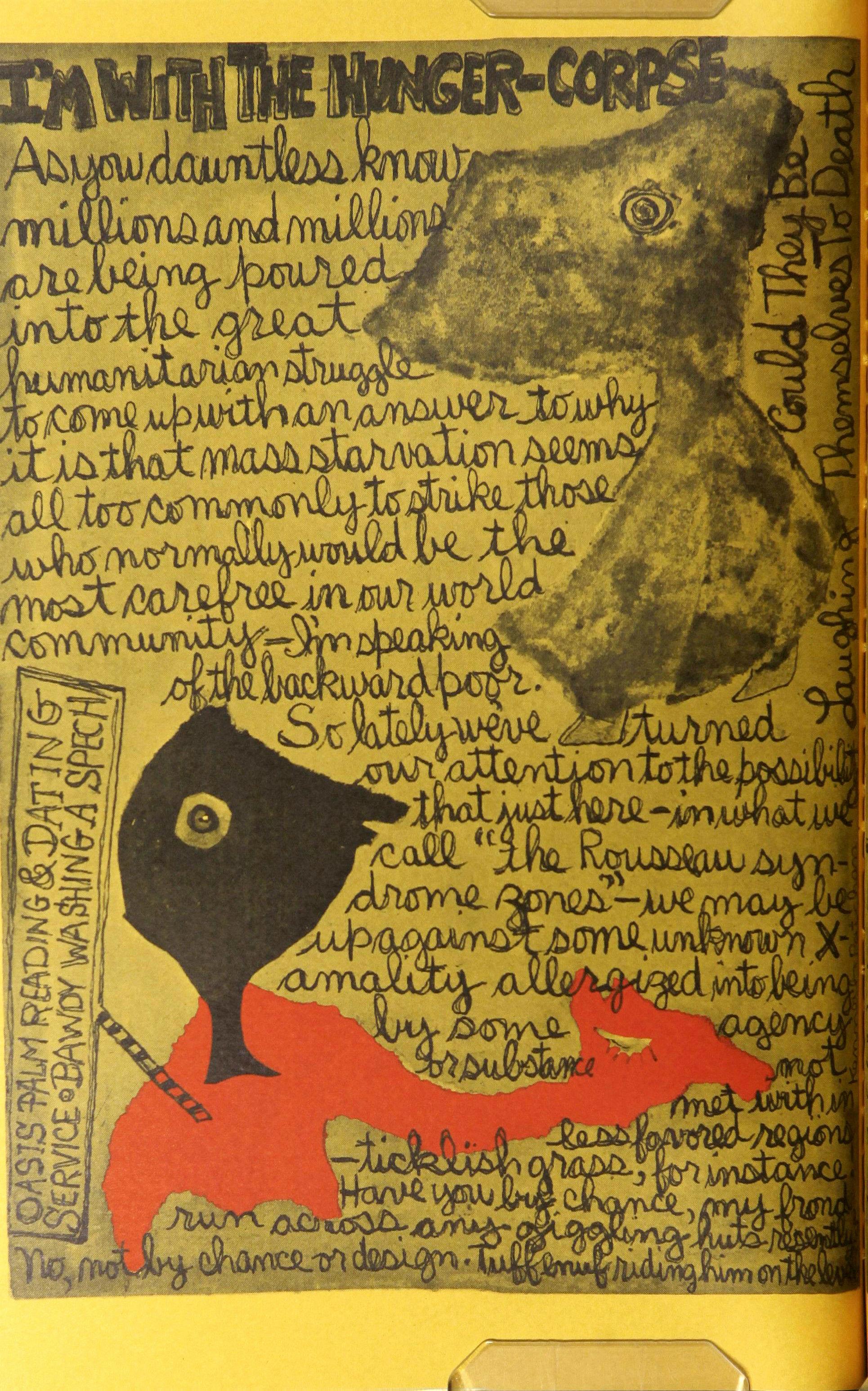
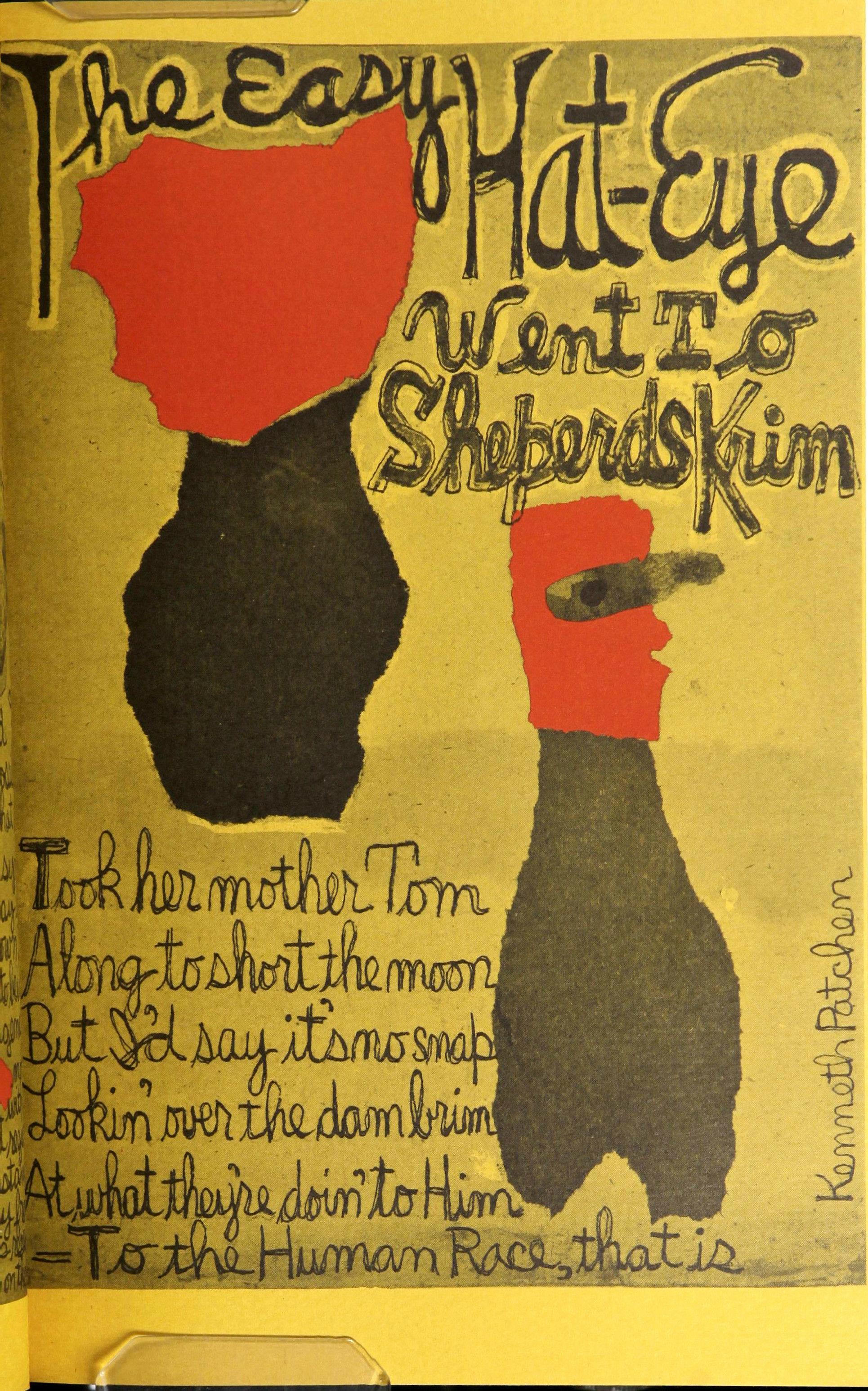

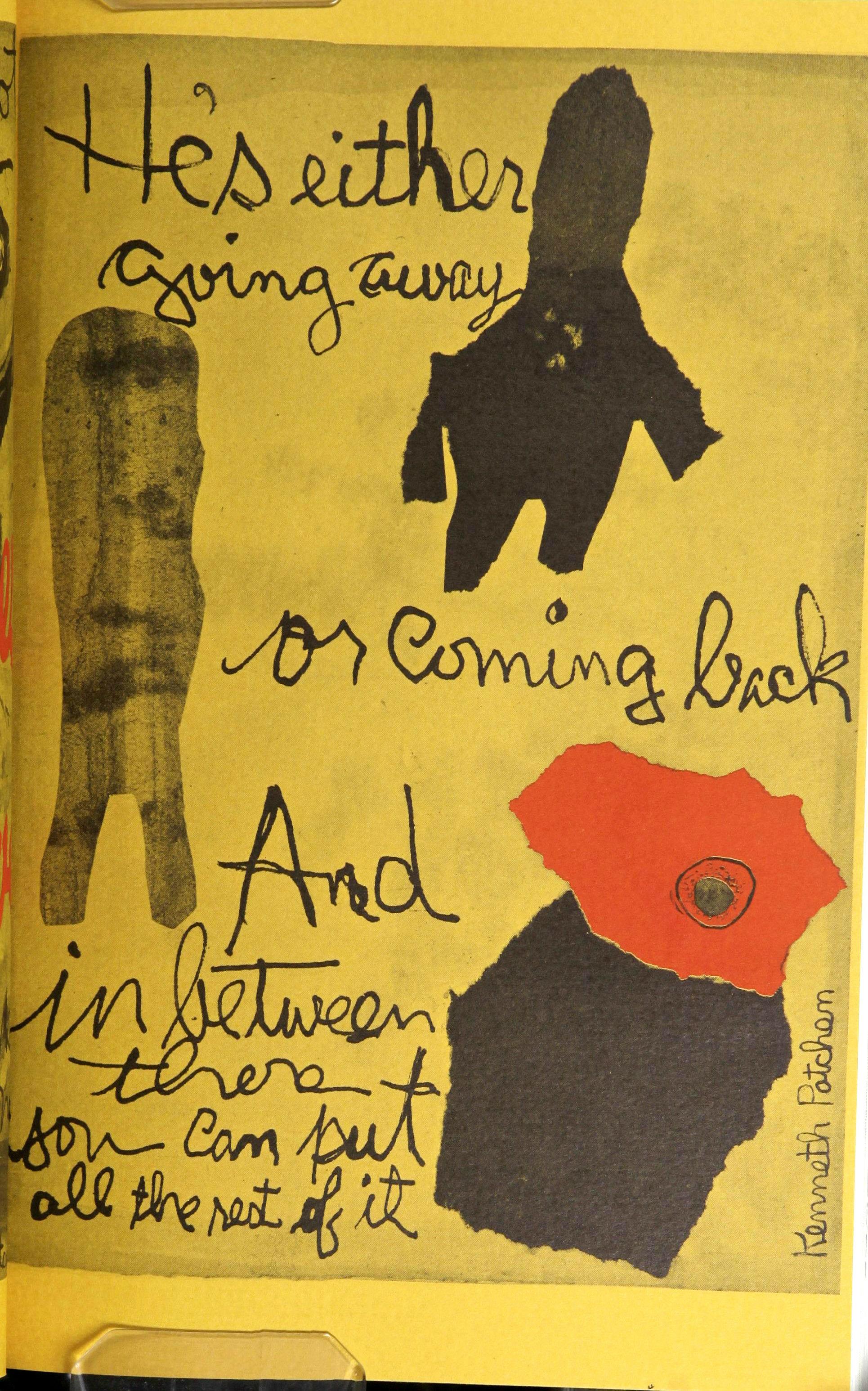
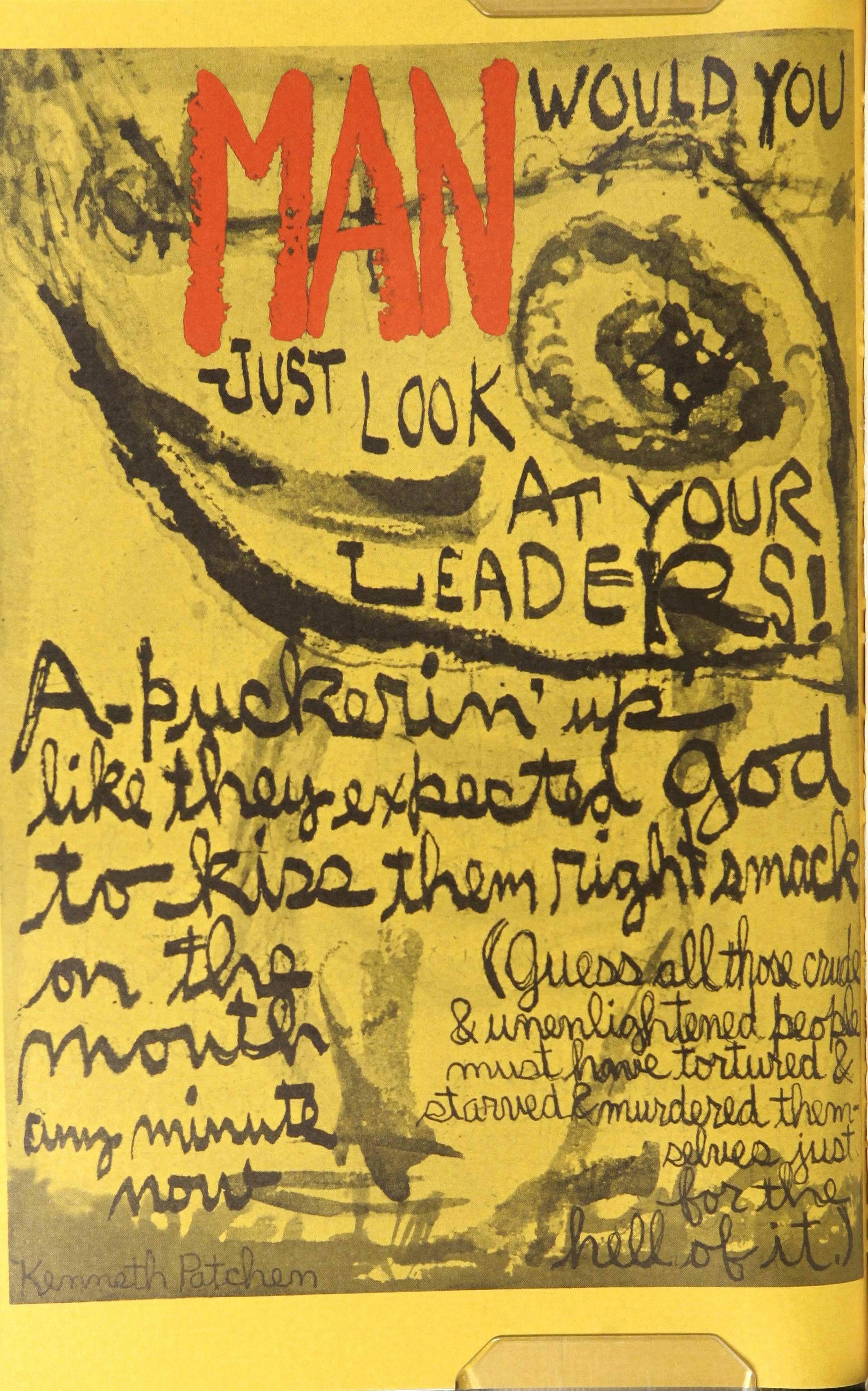

with its green-glass eyes, around the stalk, with its green-glass eyes. The snake walks on no feet, it hides in the grass, walking it hides in the grass walking on no feet!
Hit it with a cane-knife and it dies, hit it now!
Don't kick it with your foot, it'll bite, don't kick it with your foot, let it go!
Sensernaya, the snake, sensemaya.
Sensernaya, with its eyes, sensemaya,
Sensernaya, with its tongue, sensernaya.
Sensernaya, with its mouth, sensernaya.
Dead snake can't eat a thing, dead snake can't hiss or blink, can't slide or slink, can't coil to spring!
Dead snake can't lap its drink, dead snake can't lie a-hiding. No instinct, can't kill by biting!
Mayornbe-bombe-rnayombe!
Sensemayd, the snake
Mayombe-bombe-mayombe!
Sensemaya, it's still
Mayombe-bombe-mayombel
Sensemayd, the snake
Mayornbe-bornbe-mayombe!
Sensemayd, it's dead Ii
It is stretching a point, or several, to refer to the second school, led by the Mexican, Carlos Pellicer, the internationally-known Neruda, and others as "Realistic," but such a term is the closest general category for this poetry of an age of machinery, anxiety, and violence. Neruda sings in the same forceful, brutal, loose, and sensuous manner as did a hero of his, Walt Whitman. The Chilean has passed through various phases, however; first, Ultraism, then a period of melancholy, anguish, and ultra-eroticism, during which he wrote of disintegration, deformation,
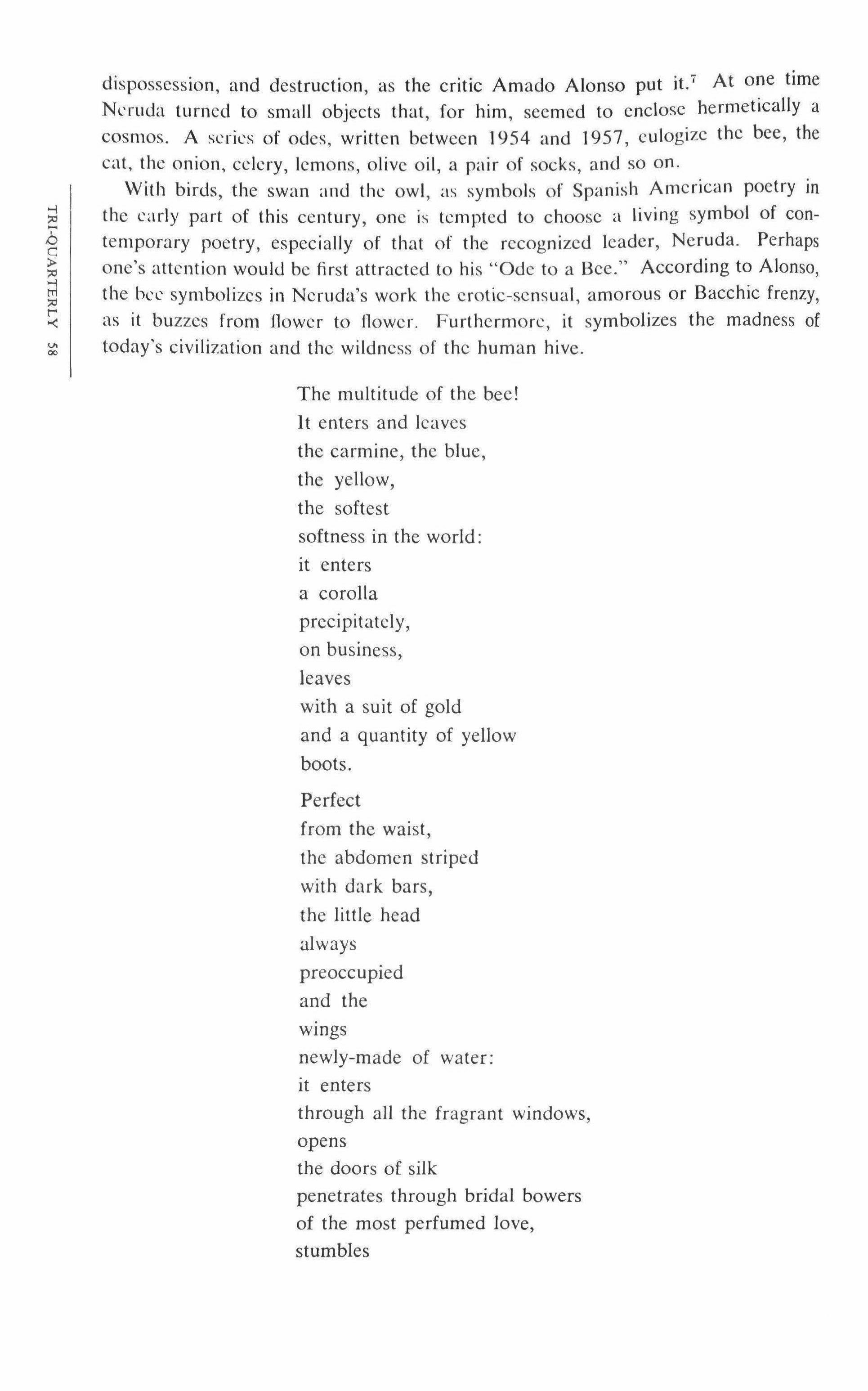
dispossession, and destruction, as the critic Amado Alonso put it.' At one time Ncruda turned to small objects that for him seemed to enclose hermetically a cosmos. A series of odes, written between 1954 and 1957, eulogize the bee, the cat, the onion, celery, lemons, olive oil, a pair of socks, and so on.
With birds, the swan and the owl, as symbols of Spanish American poetry in the early part of this century, one is tempted to choose a living symbol of contemporary poetry, especially of that of the recognized leader, Neruda. Perhaps one's attention would be first attracted to his "Ode to a Bee." According to Alonso, the bee symbolizes in Ncruda's work the erotic-sensual, amorous or Bacchic frenzy, as it buzzes from flower to flower. Furthermore, it symbolizes the madness of today's civilization and the wildness of the human hive.
The multitude of the bee! It enters and leaves the carmine, the blue, the yellow, the softest softness in the world: it enters a corolla precipitately, on business, leaves with a suit of gold and a quantity of yellow boots.
Perfect from the waist, the abdomen striped with dark bars, the little head always preoccupied and the wings newly-made of water: it enters through all the fragrant windows, opens the doors of silk penetrates through bridal bowers of the most perfumed love, stumbles
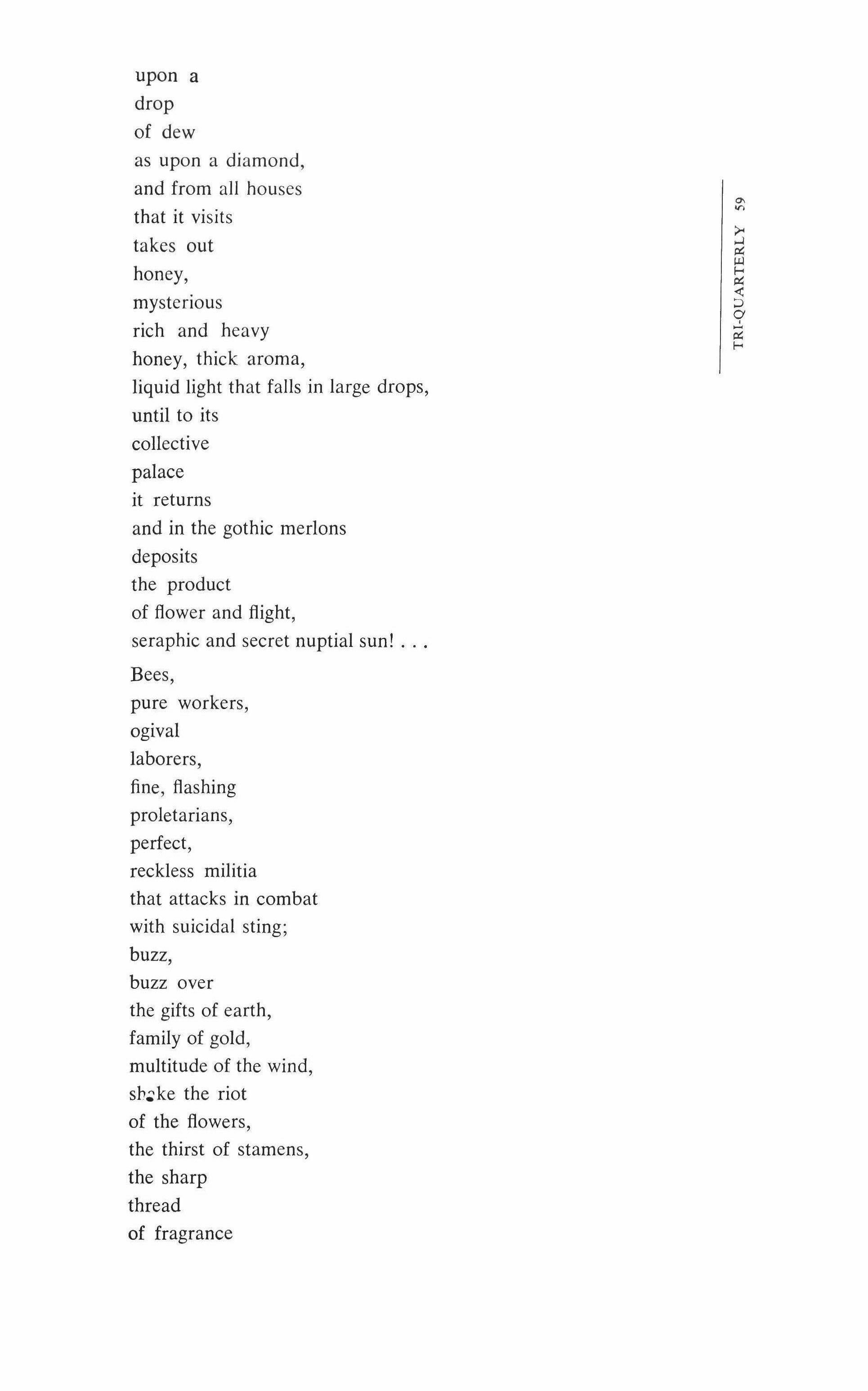
upon a drop of dew
as upon a diamond, and from all houses that it visits takes out honey, mysterious rich and heavy honey, thick aroma, liquid light that falls in large drops, until to its collective palace it returns and in the gothic merlons deposits the product of flower and flight, seraphic and secret nuptial sun!
Bees, pure workers, ogival laborers, fine, flashing proletarians, perfect, reckless militia that attacks in combat with suicidal sting; buzz, buzz over the gifts of earth, family of gold, multitude of the wind, sheke the riot of the flowers, the thirst of stamens, the sharp thread of fragrance
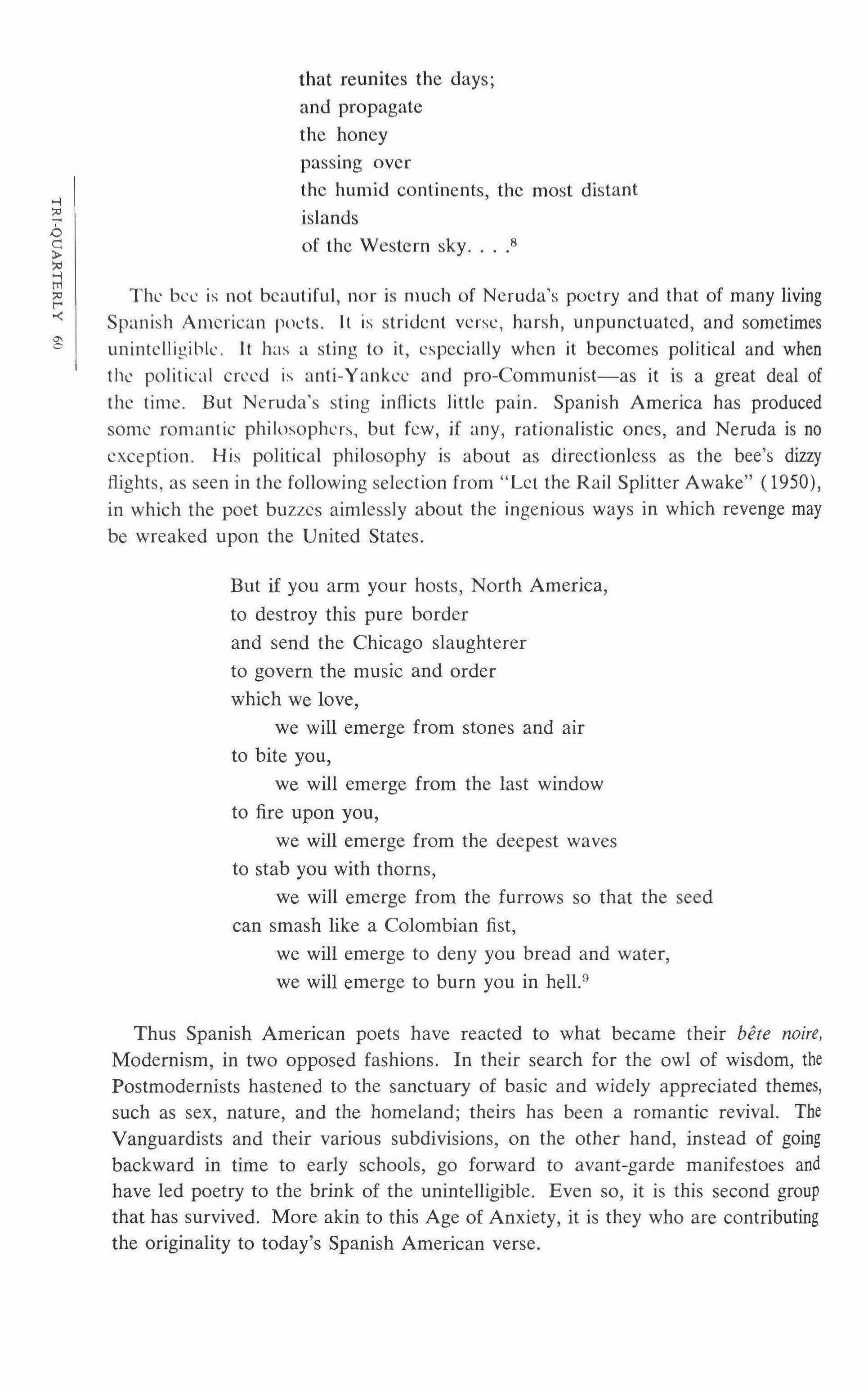
that reunites the days; and propagate the honey passing over the humid continents, the most distant islands of the Western sky 8
The bel' is not beautiful, nor is much of Neruda's poetry and that of many living Spanish American pods. It is strident verse, harsh, un punctuated, and sometimes unintelligible. ]t has a sting to it, especially when it becomes political and when the political creed is anti-Yankee and pro-Communist-as it is a great deal of the time. But Neruda's sting inflicts little pain. Spanish America has produced some romantic philosophers, but few, if any, rationalistic ones, and Neruda is no exception. His political philosophy is about as directionless as the bee's dizzy flights, as seen in the following selection from "Let the Rail Splitter Awake" (1950), in which the poet buzzes aimlessly about the ingenious ways in which revenge may be wreaked upon the United States.
But if you arm your hosts, North America, to destroy this pure border and send the Chicago slaughterer to govern the music and order which we love, we will emerge from stones and air to bite you, we will emerge from the last window to fire upon you, we will emerge from the deepest waves to stab you with thorns, we will emerge from the furrows so that the seed can smash like a Colombian fist, we will emerge to deny you bread and water, we will emerge to burn you in hell."
Thus Spanish American poets have reacted to what became their here noire, Modernism, in two opposed fashions. In their search for the owl of wisdom, the Postmodernists hastened to the sanctuary of basic and widely appreciated themes, such as sex, nature, and the homeland; theirs has been a romantic revival. The Vanguardists and their various subdivisions, on the other hand, instead of going backward in time to early schools, go forward to avant-garde manifestoes and have led poetry to the brink of the unintelligible. Even so, it is this second group that has survived. More akin to this Age of Anxiety, it is they who are contributing the originality to today's Spanish American verse.
oc
So far the Vanguardists have failed, however, to bring about a third Golden Age in Spanish letters; they have not carried their lite: .uurc to the heights that it, or the mother literature, reached in the sixteenth and seventeenth centuries and again in the nineteenth. They have been unable to give birth to an owl. Theywith the possible exception of the Afro-Antilleans-seem still to be groping in the darkness, where the owl is supposed to see the best, but instead of that wise hoot, a frenetic buzz is heard.
ISwan, Cygnets, and Owl: An Anthology o] Modernist Poetry in Spanish America, Introduction by J. S. Brushwood, Translations by Mildred Johnson, The University of Missouri Studies, XXIX (Columbia, 1956), 5-17.
2Ibid., p. 85. Reprinted by permission of the University of Missouri Press.
3 Ibid., p. 115. Reprinted by permission of the University of Missouri Press.
+Guillermo de Torre, Literaturas europeas de vanguardia (Madrid, 1925), p. 58n.
5Ibid., p. 60.
6Cuba Libre, Poems by Nicolas Guillen, Translations by Langston Hughes and Ben Frederic Carruthers (Los Angeles: The Ward Ritchie Press, 1948), pp. 32-33.
i Poesia y estilo de Pablo Neruda (Buenos Aires, 1940), pp. 16-17.
8The Elementary Odes of Pablo Neruda, Translations by Carlos Lozano (New York: Las Americas Publishing Co., 1961), pp. 19-25.
»Let the Rail Splitter Awake and Other Poems, Translations by Waldeen (New York: Masses and Mainstream, Inc., 1951), pp. 33-34.

Firs Cloud-washed, small porcupines, These hills, With fogs, mists, and lights Between their quills.
FREDERICK CANDELARIA
A Confederate general from Big Sur
excerpt from a novel by RICHARD BRAUTIGAN
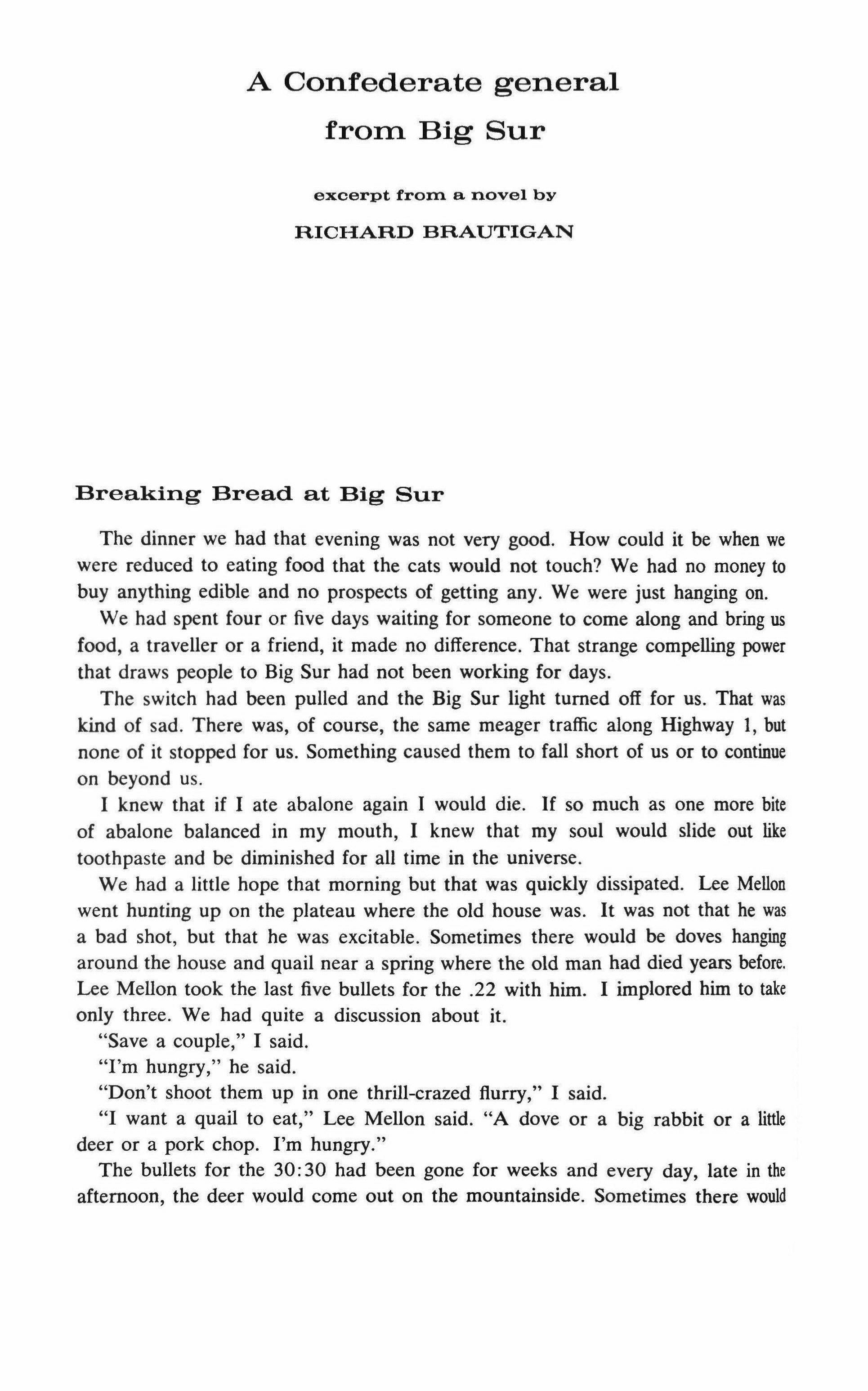
Breaking Bread at Big Sur
The dinner we had that evening was not very good. How could it be when we were reduced to eating food that the cats would not touch? We had no money to buy anything edible and no prospects of getting any. We were just hanging on.
We had spent four or five days waiting for someone to come along and bring us food, a traveller or a friend, it made no difference. That strange compelling power that draws people to Big Sur had not been working for days.
The switch had been pulled and the Big Sur light turned off for us. That was kind of sad. There was, of course, the same meager traffic along Highway 1, but none of it stopped for us. Something caused them to fall short of us or to continue on beyond us.
I knew that if I ate abalone again I would die. If so much as one more bite of abalone balanced in my mouth, I knew that my soul would slide out like toothpaste and be diminished for all time in the universe.
We had a little hope that morning but that was quickly dissipated. Lee Mellon went hunting up on the plateau where the old house was. It was not that he was a bad shot, but that he was excitable. Sometimes there would be doves hanging around the house and quail near a spring where the old man had died years before. Lee Mellon took the last five bullets for the .22 with him. I implored him to take only three. We had quite a discussion about it.
"Save a couple," I said.
"I'm hungry," he said.
"Don't shoot them up in one thrill-crazed flurry," I said.
"I want a quail to eat," Lee Mellon said. "A dove or a big rabbit or a little deer or a pork chop. I'm hungry."
The bullets for the 30:30 had been gone for weeks and every day, late in the afternoon, the deer would come out on the mountainside. Sometimes there would

be twenty or thirty of them, fat and sassy, but we did not have any bullets for the Winchester.
Lee Mellon could not get close enough to do any appreciable damage with the .22. He shot a doe in the ass and the doe limped off into the lilac bushes and got away.
Anyway, I implored him to save a couple of the .22 bullets for a rainy day. "Maybe tomorrow morning we'll find a deer in the garden," I said. Lee Mellon would have none of it. I might as well have been talking about the poems of Sappho.
He went up the mountain to the plateau. There was an awkward dirt road. He kept getting smaller and smaller on the road and our five .22 bullets kept getting smaller and smaller, too. I imagined the bullets now to be about the size of under-nourished amoebas. The road switched back behind a grove of redwood trees, and Lee Mellon was no more, taking with him all the bullets we had in the world.
Having nothing better to do, nowhere else to go, I sat down on a rock beside the highway and waited for Lee Mellon. I had a book with me, something about the soul. The book said everything was all right if you didn't die while you were reading the book, if your fingers maintained life while turning the pages. I approached it as a mystery novel.
Two cars came by. One of the cars had some young people in it. The girl was attractive. I imagined that they had left Monterey at daybreak after having eaten a great big breakfast at the Greyhound bus depot. But that did not quite make sense.
Why would they want to eat breakfast at the Greyhound bus depot? The more I thought about it, the more it seemed unlikely. There were other places to eat breakfast in Monterey. Perhaps some of them were fancier. Just because I had eaten breakfast one morning at the Greyhound bus depot in Monterey did not necessarily mean that everybody in the world ate there.
The second car was a chauffeur-driven Rolls Royce with an old woman sitting in the back seat. She was drenched in furs and diamonds as if wealth had been a sudden spring shower that covered her with all these things instead of rain. How fortunate she was.
She seemed a little surprised at seeing me sitting there like a ground squirrel on a rock. She said something to the chauffeur and his window drifted effortlessly down.
"How far is it to Los Angeles?" he said. His voice was perfect.
Then her window drifted effortlessly down like the neck of a transparent swan. "We're hours late," she said. "But I always wanted to see Big Sur. How far is it to Los Angeles, young man?"
"It's quite a ways to Los Angeles from here," I said, "hundreds of miles. The road goes slowly until you get to San Luis Obispo. You should have taken 99 or 101 if you were in a hurry."
"It's too late," she said. "I'll just tell them what happened. They'll understand. Do you have a telephone?"

"No, I'm sorry," I said. "We don't even have electricity."
"It's just as well," she said. "Having them worry a little bit about Granny will be good for them. They've been taking me for granted about ten years now. It'll do them a world of good. I should have thought of it sooner."
I liked the way she said Granny, for the last thing in this world she looked like was somebody's granny.
Then she said thank you in a pleasant way and the windows drifted effortlessly up and the swans resumed their migration south. She waved good-bye and they went down the road and around a bend to the people waiting in Los Angeles, to the people getting more nervous with each passing moment. It probably would be a good thing if they worried about her some.
Where is she? Where is she? Should we call the police? No, let's wait five more minutes.
Five minutes later I heard the dim crack of the .22 and then I heard it again, and still a third time. What a terrible shame it was that we had a repeating rifleagain and again, and then silence.
I waited and Lee Mellon came down off the mountain. He followed the dirt road down and came across the highway. He was carrying the gun rather sloppily, as if it were reduced to the impotence of a stick.
-weur: I said.
Toward the end of the afternoon Lee Mellon got up and stood beside me out there on the catwalk. "Soon it will be dark," he said. He stared down at the pond. It looked green and harmless. "I wish I had some dynamite," he said. Then he went up to the garden and cut some greens for the salad. When he came back down there was a sort of wistful expression on his face. "I saw a rabbit in the garden," he said.
With an enormous amount of self-control I drove the word Alice away from my mouth and finally out of my mind. I really wanted to say, "What's wrong, Alice, no guts?" but I forced myself to accept the fact that those five bullets were beyond recall.
The dinner we had that evening was not very good. Some salad made from greens and jack mackerel. The fellow who owned the place had brought the jack mackerel for the cats who hung around there, but the cats wouldn't eat it. The stuff was so bad that they would sooner go hungry. And they did.
Jack mackerel tears your system apart. Almost as soon as it hits your stomach, you begin to rumble and squeal and flap. Sounds made in a haunted house during an earthquake tear horizontally across your stomach. Then great farts and belches begin arriving out of your body. Jack mackerel almost comes out through the pores.
After dinner of jack mackerel you sit around and your subjects of conversation are greatly limited. I have found it impossible to talk about poetry, esthetics or world peace after eating jack mackerel.
To make the meal a perfect gastronomical Hiroshima, we had some of Lee Mellon's bread for dessert. His bread fits perfectly the description of hardtack served to the soldiers of the Civil War. But that, of course, is no surprise.
I had learned to hold my face at absolute attention, my eyes saluting a silent

flag, the flag of the one who does the cooking, when every few days, Lee Mellon would say, "I guess it's time to bake some more bread."
It had taken a little while, but I had gotten so I could eat it now: Hard as a rock, flavorless and an inch thick, like Betty Crocker gone to hell, or thousands of soldiers marching along a road in Virginia, taking up miles of the countryside.
Preparing for Ecclesiastes
A litue while after dinner to avoid the sound of the frogs that were really laying it in now from the early color of the evening, I decided to take my farts and belches to the privacy of my cabin and read Ecclesiastes.
"1 think I'm going to sit here and read frogs," Lee Mellow farted.
"What did you say, Lee?" I can't hear you. The frogs. Yell louder," I farted.
Lee Mellon got up and threw a great big rock into the pond and screamed, "Campbell's Soup!" The frogs were instantly quiet. That would work for a few moments and then they would start in again. Lee Mellon had quite a pile of rocks in the room. The frogs would always begin with one croak, and then the second and then the 7,452nd frog would join in.
Funny thing though, about Lee Mellon's yelling, "Campbell's Soup!" at the frogs while he was launching various missiles into the pond. He had yelled every kind of obscenity possible at them, and then he decided to experiment with nonsense syllables to see if they would have any effect, along with a well-aimed rock.
Lee Mellon had an inquiring mind and by the hit-or-miss method he came upon "Campbell's Soup!" as the phrase that struck the most fear into the frogs. So now instead of yelling some boring obscenity, he yelled, "Campbell's Soup!" at the top of his voice in the Big Sur night.
"Now what did you say?" I farted.
"I think I'm going to sit here and read frogs. What's wrong, don't you like frogs?" Lee Mellon farted. "That's what I said. Where's your spirit of patriotism? After all, there's a frog on the American flag."
"I'm going to my cabin," I farted. "Read some Ecclesiastes."
"You've been reading a lot of Ecclesiastes lately," Lee Mellon farted. "And as I remember there's not that much to read. Better watch yourself, kid."
"Just putting in time," I said.
"I think dynamite's too good for these frogs," Lee Mellon said. "I'm working on something special. Dynamite's too fast. I'm getting a great idea."
Lee Mellon had tried various ways of silencing the frogs. He had thrown rocks at them. He had beaten the pond with a broom. He had thrown pans full of boiling water on them. He had thrown two gallons of sour red wine into the pond. For a time he was catching the frogs when they first appeared at twilight and throwing them down the canyon. He caught a dozen or so every evening and vanquished them down the canyon. This went on for a week.
Lee Mellon suddenly got the idea that they were crawling back up the canyon again. He said that it took them a couple of days. "God-damn them," he said.

"It's a long pull up, but they're making it."
He'd gotten so mad that the next frog he caught he threw into the fireplace. The frog became black and stringy and then the frog became not at all. I looked at Lee Mellon. He looked at me. "You're right. I'll try something else."
He took a couple dozen rocks and spent an afternoon tying pieces of string to them, and then that evening when he caught the frogs, he tied them to the rocks and threw them down the canyon. "That ought to slow them down a little bit. Make it a little harder to get back up here," he said, but it did not work out for there were just too many frogs to fight effectively, and after another week he grew tired of this and went back to throwing rocks at the pond and shouting, "Campbell's Soup!"
At least we never saw any frogs in the pond with rocks tied to their backs. That would have been too much.
There were a couple of little water snakes in the pond, but they could only eat a frog or two everyday or so. The snakes weren't very much help. We needed anacondas. The snakes we had were more ornamental than functional.
"Well, I'll leave you to the frogs," I farted. The first one had just croaked and now they would all start up again and hell would come forth from that pond.
"Mark my words, Jesse. I got a plan going," Lee Mellon farted and then tapped his head with his finger in the fashion people do to see if a watermelon is ripe. It was. A shiver travelled down my spine.
"Good-night," I farted.
"Yes, indeed," Lee Mellon farted.
The Rivets in Ecclesiastes
I went up to my cabin. I could hear the ocean below banging against the rocks. I passed the garden. It was covered with fishnets to keep the birds off.
As usual I stumbled over the motorcycle that was beside my bed. The motorcycle was one of Lee Mellon's pets. It was lying there in about forty-five parts.
A couple of times every week, Lee Mellon would say, "I think I'll put my motorcycle together. It's a four-hundred-dollar motorcycle." He always said that it was a four-hundred-dollar motorcycle, but nothing ever came of it.
I lit the lantern and was enclosed within the glass walls of the cabin. My place was furnished like all the other cabins down there. I did not have a table, any chairs or a bed.
A summary of my little columns would go something like this: the first chapter of Ecclesiastes has 57 punctuation marks and they are broken down into 22 commas, 8 semi-colons, 8 colons, 2 question marks and 17 periods.
The second chapter of Ecclesiastes has 103 punctuation marks and they are broken down into 45 commas, 12 semi-colons, 15 colons, 6 question marks and 25 periods.
The third chapter of Ecclesiastes has 77 punctuation marks and they are broken down into 33 commas, 21 semi-colons, 8 colons, 3 questions marks and 12 periods.
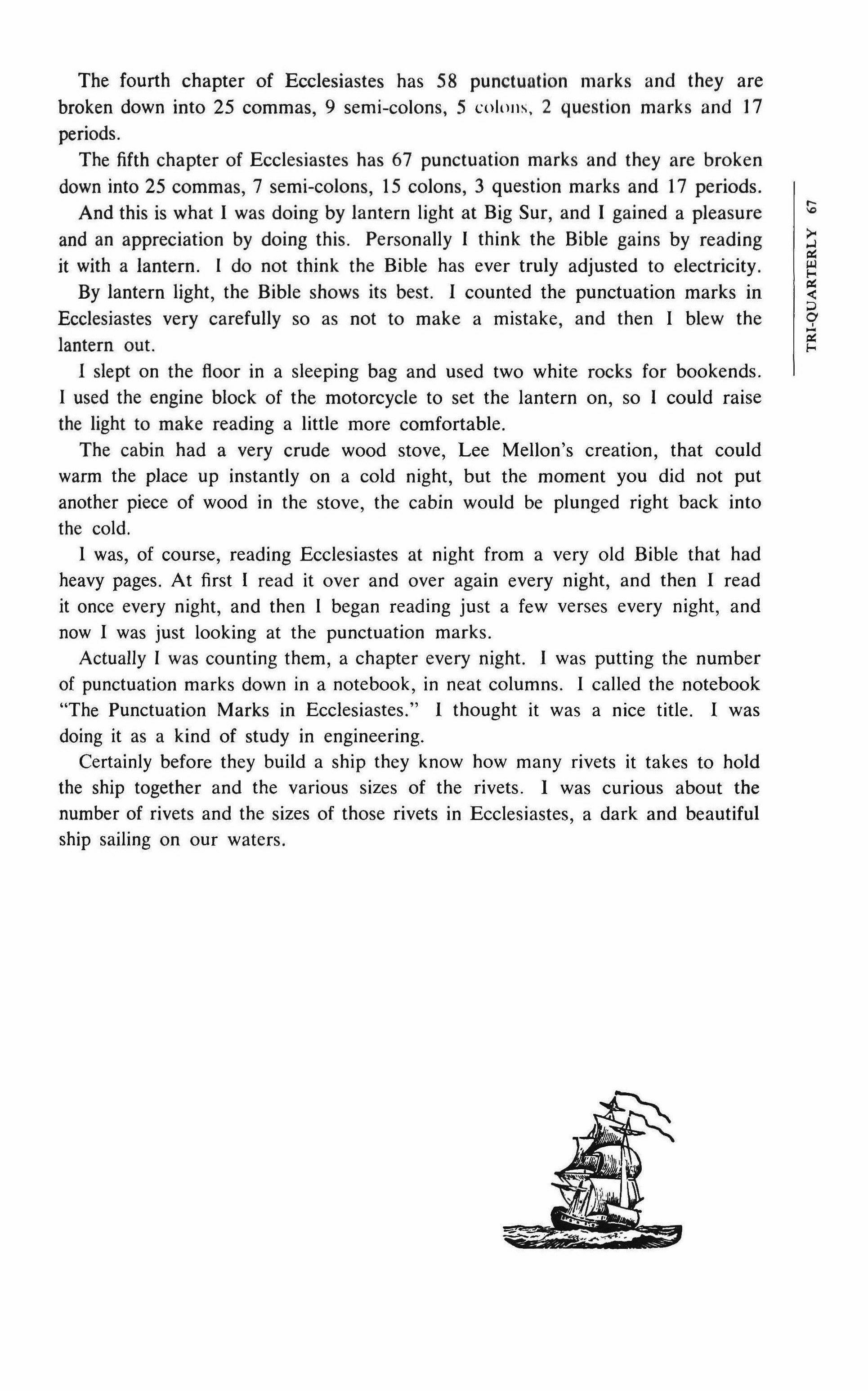
The fourth chapter of Ecclesiastes has 58 punctuation marks and they are broken down into 25 commas, 9 semi-colons, 5 colons, 2 question marks and 17 periods.
The fifth chapter of Ecclesiastes has 67 punctuation marks and they are broken down into 25 commas, 7 semi-colons, 15 colons, 3 question marks and 17 periods.
And this is what I was doing by lantern light at Big Sur, and I gained a pleasure and an appreciation by doing this. Personally I think the Bible gains by reading it with a lantern. I do not think the Bible has ever truly adjusted to electricity. By lantern light, the Bible shows its best. 1 counted the punctuation marks in Ecclesiastes very carefully so as not to make a mistake, and then I blew the lantern out.
I slept on the floor in a sleeping bag and used two white rocks for bookends. I used the engine block of the motorcycle to set the lantern on, so I could raise the light to make reading a little more comfortable.
The cabin had a very crude wood stove, Lee Mellon's creation, that could warm the place up instantly on a cold night, but the moment you did not put another piece of wood in the stove, the cabin would be plunged right back into the cold.
I was, of course, reading Ecclesiastes at night from a very old Bible that had heavy pages. At first I read it over and over again every night, and then I read it once every night, and then I began reading just a few verses every night, and now I was just looking at the punctuation marks.
Actually I was counting them, a chapter every night. I was putting the number of punctuation marks down in a notebook, in neat columns. I called the notebook "The Punctuation Marks in Ecclesiastes." I thought it was a nice title. I was doing it as a kind of study in engineering.
Certainly before they build a ship they know how many rivets it takes to hold the ship together and the various sizes of the rivets. I was curious about the number of rivets and the sizes of those rivets in Ecclesiastes, a dark and beautiful ship sailing on our waters.
Where I am
My wife draws a scarlet kangaroo where once we hung Toulouse-Lautrec. The baby dreams in her crib of eyes and runs from Humpty Dumpty.
Beyond the crawling tomato vines an owl digs my grave on the moon.

On the courthouse steps
Tea rose grandmothers tap-tapping canes down buggy Water Street, a tough (stuffed) cougar next to where Benson's barber shop once was, and that crazy Kent Kid blowing in a Coke bottle, is all I can say when you ask me: "Hey Dave, what's been new with you, and what's Blondie's name?"
Oh yes, and licorice sticks came in at Frampton's Drugs. Here, have one, Heavy. Here, have two, Heavy.
PEARSON ETTER
DAVID

Moonflowers
River roads of insects rub summer in the ears of slow farmers.
In the sweet crotch of a sassafras tree Janet sucks hard candy and jabs brown toes at her little brother.
A wind out of Kansas carries rumors of wild wheat fires and the blue eyes of young soldiers. Near the screen door moonflowers bloom: shy faces of farm girls.
March
At the muscled beach, stupefied by kites, old men read the labels of sardine cans.
The wind builds islands in the seas of my head, where Norwegian sailors are calling lost cats.
I close my eyes and dream of tall ships and lavender queens on foreign stamps.
PEARSON ETTER
DAVID
J. B. Yeats on James Joyce
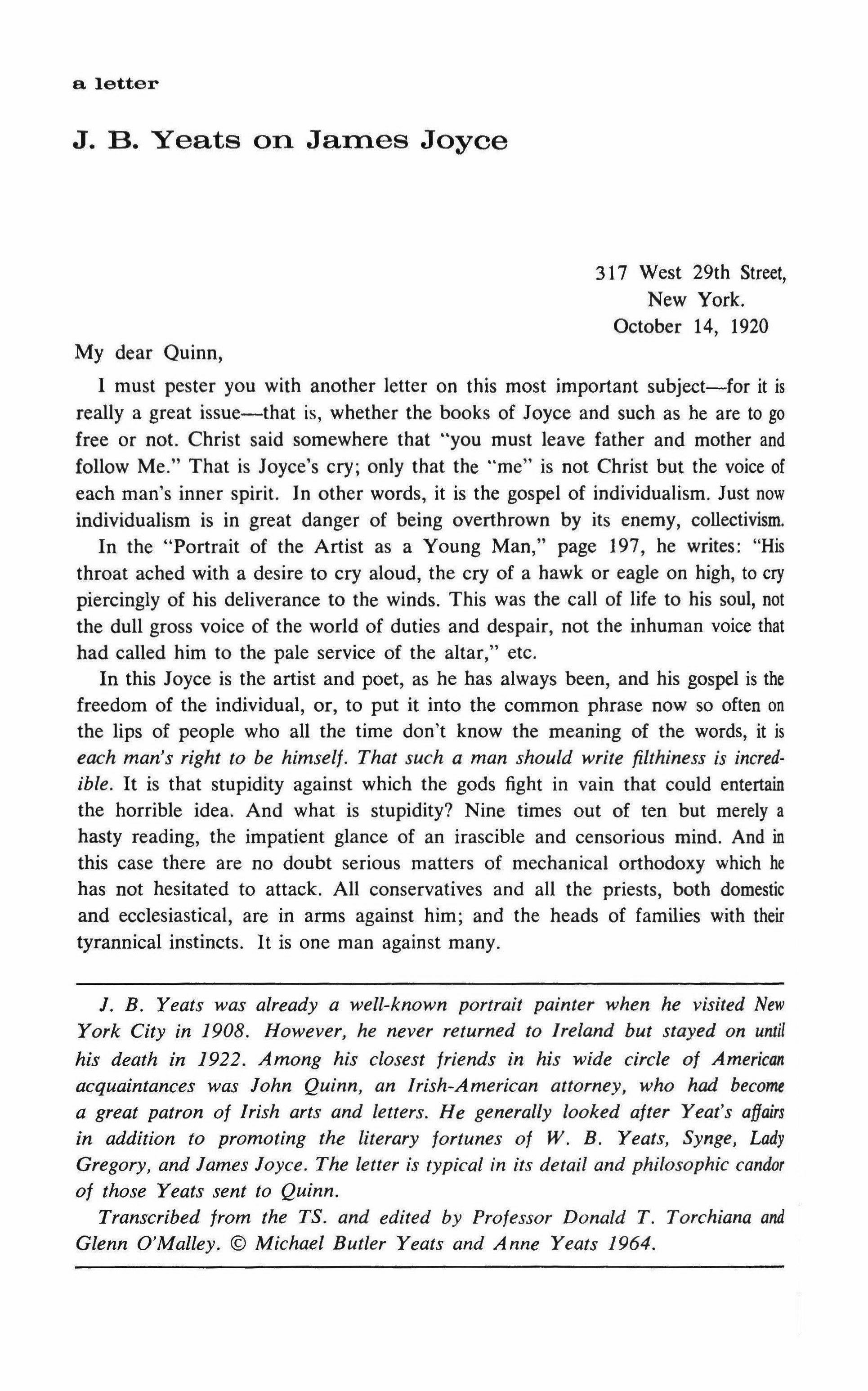
317 West 29th Street, New York. October 14, 1920
My dear Quinn,
I must pester you with another letter on this most important subject-for it is really a great issue-that is, whether the books of Joyce and such as he are to go free or not. Christ said somewhere that "you must leave father and mother and follow Me." That is Joyce's cry; only that the "me" is not Christ but the voice of each man's inner spirit. In other words, it is the gospel of individualism. Just now individualism is in great danger of being overthrown by its enemy, collectivism.
In the "Portrait of the Artist as a Young Man," page 197, he writes: "His throat ached with a desire to cry aloud, the cry of a hawk or eagle on high, to cry piercingly of his deliverance to the winds. This was the call of life to his soul, not the dull gross voice of the world of duties and despair, not the inhuman voice that had called him to the pale service of the altar," etc.
In this Joyce is the artist and poet, as he has always been, and his gospel is the freedom of the individual, or, to put it into the common phrase now so often on the lips of people who all the time don't know the meaning of the words, it is each man's right to be himself. That such a man should write filthiness is incredible. It is that stupidity against which the gods fight in vain that could entertain the horrible idea. And what is stupidity? Nine times out of ten but merely a hasty reading, the impatient glance of an irascible and censorious mind. And in this case there are no doubt serious matters of mechanical orthodoxy which he has not hesitated to attack. All conservatives and all the priests, both domestic and ecclesiastical, are in arms against him; and the heads of families with their tyrannical instincts. It is one man against many.
J. B. Yeats was already a well-known portrait painter when he visited New York City in 1908 However, he never returned to Ireland but stayed on until his death in 1922. Among his closest friends in his wide circle of American acquaintances was John Quinn, an Irish-American attorney, who had become a great patron of Irish arts and letters. He generally looked after Yeat's affairs in addition to promoting the literary fortunes of w. B. Yeats, Synge, Lady Gregory, and James Joyce. The letter is typical in its detail and philosophic candor of those Yeats sent to Quinn.
Transcribed from the TS. and edited by Professor Donald T. Torchiana and Glenn O'Malley. © Michael Butler Yeats and Anne Yeats 1964.
a letter

And remember he is not in any sense a layman. Self-discipline of the sternest kind is evident in every sentence he writes. His influence is a bracing one. There is no great book or great literature that would not be dangerous reading to some people. There are the corrupt-minded who, whatever they read, are sure to find the wherewithal of becoming more corrupt. For them we can do nothing. As to the young and immature, let their parents and guardians take care of them. And indeed Joyce brings with him what will protect him from the silly, whether they are so by ingrained corruption or by immaturity, for Joyce is very difficult reading. He has thought so deeply and subtly and loads his books with so much obscure knowledge that only real students will ever read him. His books are for the few, and these the elite.
Yours very truly, (Signed) J.
B. Yeats
P.S. There is, as we all know, artistic refinement. There are great pictures and books and innumerable novels and romances, all pervaded by artistic refinement. And what is artistic refinement? It is simply the culture of what is pleasant and agreeable. Artistic refinement means pleasure to the soul and to the senses, above all to the senses. Oscar Wilde, who was the great apostle of artistic refinement and carried the culture of what he pompously called beauty further than anybody else, said to my son that the intellect could refine anything; that is to say, he prided himself on a superabundance of the kind of intellect which seeks artistic refinement. Beauty was the God of his heaven, and ugliness its devil. We can easily guess how he would have regarded Joyce's books and how he would have flung them into the fire. The whole tragedy of Wilde's life was that he gave his soul too much to the worship of the beautiful.
In contrast to him there is such a man as Dean Swift, of whom it may be said that he worshipped the ugly. All through his books-his "Tale of a Tub," for instance, which shocked Queen Anne so much that she refused to give him his heart's desire, an English bishopric; his "Gulliver's Travels," and his "Advice to Servants"-all these books are everywhere pervaded by the ugly and the repulsive.
And both these men were wrong. Great is the value of beauty and great also the value of ugliness. But a too exclusive devotion to beauty so enfeebled and relaxed the moral fibres of Oscar Wilde that he ended in disaster, as we know. And Dean Swift ended in madness and, to use his own words, "the lacerated heart." He was the good angel of all the struggling poor who lived around the deanery in Dublin. He was avaricious and miserly with all his friends that he I might have money to help those poor, and in return they gave him their affection, so that when Walpole, the English Prime Minister, proposed arresting him, he had to give up the idea, being warned that to attempt such a thing would require , an army of ten thousand men. Yet notwithstanding all this devotion and gratitude he remained unhappy and died in mental misery; broken down by what?-his I passion for the ugly, by that constant contemplation of the hideous. And because of his high sensibility, the hideous must have been more hideous to him than
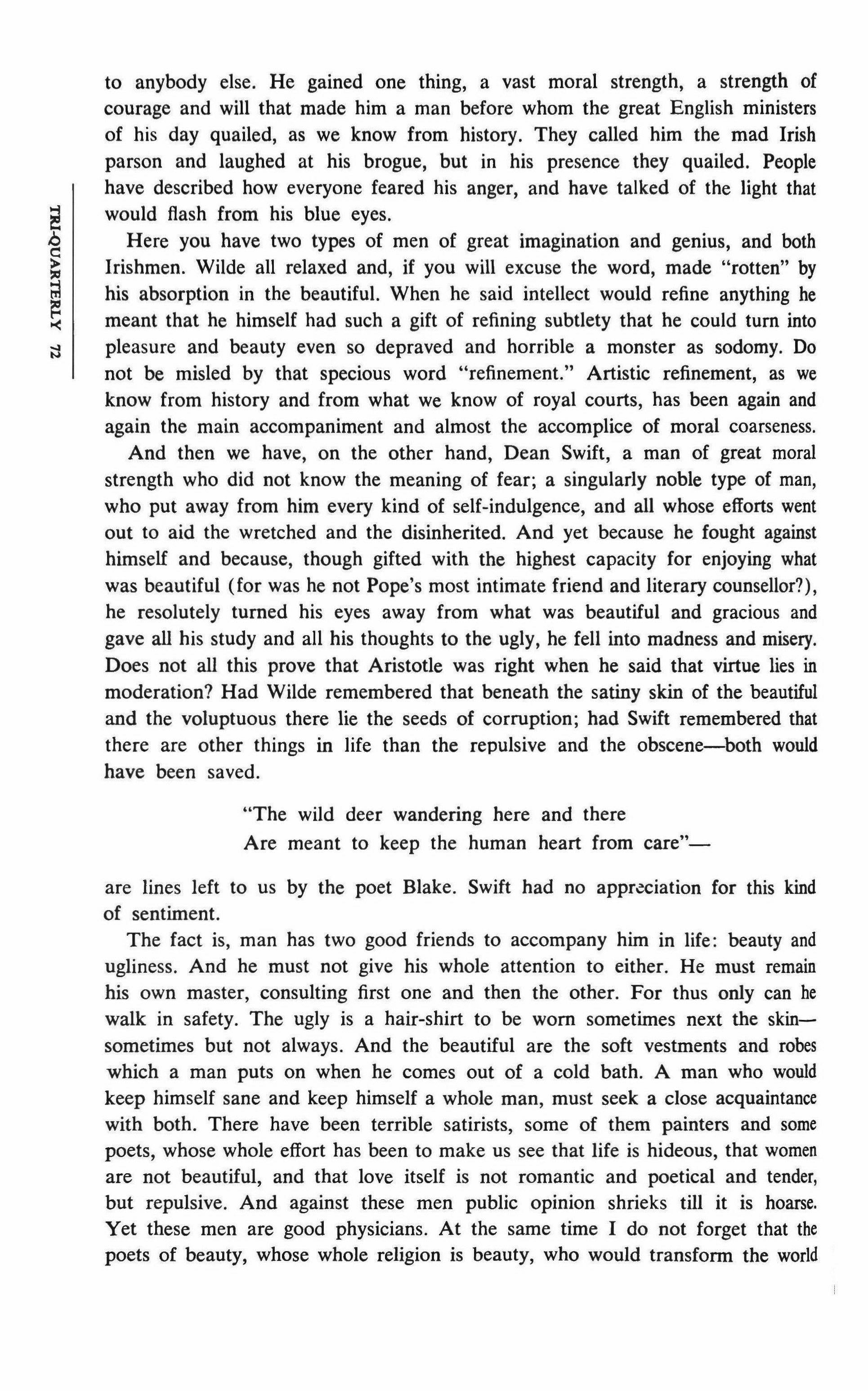
to anybody else. He gained one thing, a vast moral strength, a strength of courage and will that made him a man before whom the great English ministers of his day quailed, as we know from history. They called him the mad Irish parson and laughed at his brogue, but in his presence they quailed. People have described how everyone feared his anger, and have talked of the light that would flash from his blue eyes.
Here you have two types of men of great imagination and genius, and both Irishmen. Wilde all relaxed and, if you will excuse the word, made "rotten" by his absorption in the beautiful. When he said intellect would refine anything he meant that he himself had such a gift of refining subtlety that he could tum into pleasure and beauty even so depraved and horrible a monster as sodomy. Do not be misled by that specious word "refinement." Artistic refinement, as we know from history and from what we know of royal courts, has been again and again the main accompaniment and almost the accomplice of moral coarseness.
And then we have, on the other hand, Dean Swift, a man of great moral strength who did not know the meaning of fear; a singularly noble type of man, who put away from him every kind of self-indulgence, and all whose efforts went out to aid the wretched and the disinherited. And yet because he fought against himself and because, though gifted with the highest capacity for enjoying what was beautiful (for was he not Pope's most intimate friend and literary counsellor?), he resolutely turned his eyes away from what was beautiful and gracious and gave all his study and all his thoughts to the ugly, he fell into madness and misery. Does not all this prove that Aristotle was right when he said that virtue lies in moderation? Had Wilde remembered that beneath the satiny skin of the beautiful and the voluptuous there lie the seeds of corruption; had Swift remembered that there are other things in life than the repulsive and the obscene-both would have been saved.
"The wild deer wandering here and there Are meant to keep the human heart from care"-
are lines left to us by the poet Blake. Swift had no appreciation for this kind of sentiment.
The fact is, man has two good friends to accompany him in life: beauty and ugliness. And he must not give his whole attention to either. He must remain his own master, consulting first one and then the other. For thus only can he walk in safety. The ugly is a hair-shirt to be worn sometimes next the skinsometimes but not always. And the beautiful are the soft vestments and robes which a man puts on when he comes out of a cold bath. A man who would keep himself sane and keep himself a whole man, must seek a close acquaintance with both. There have been terrible satirists, some of them painters and some poets, whose whole effort has been to make us see that life is hideous, that women are not beautiful, and that love itself is not romantic and poetical and tender, but repulsive. And against these men public opinion shrieks till it is hoarse. Yet these men are good physicians. At the same time I do not forget that the poets of beauty, whose whole religion is beauty, who would transform the world
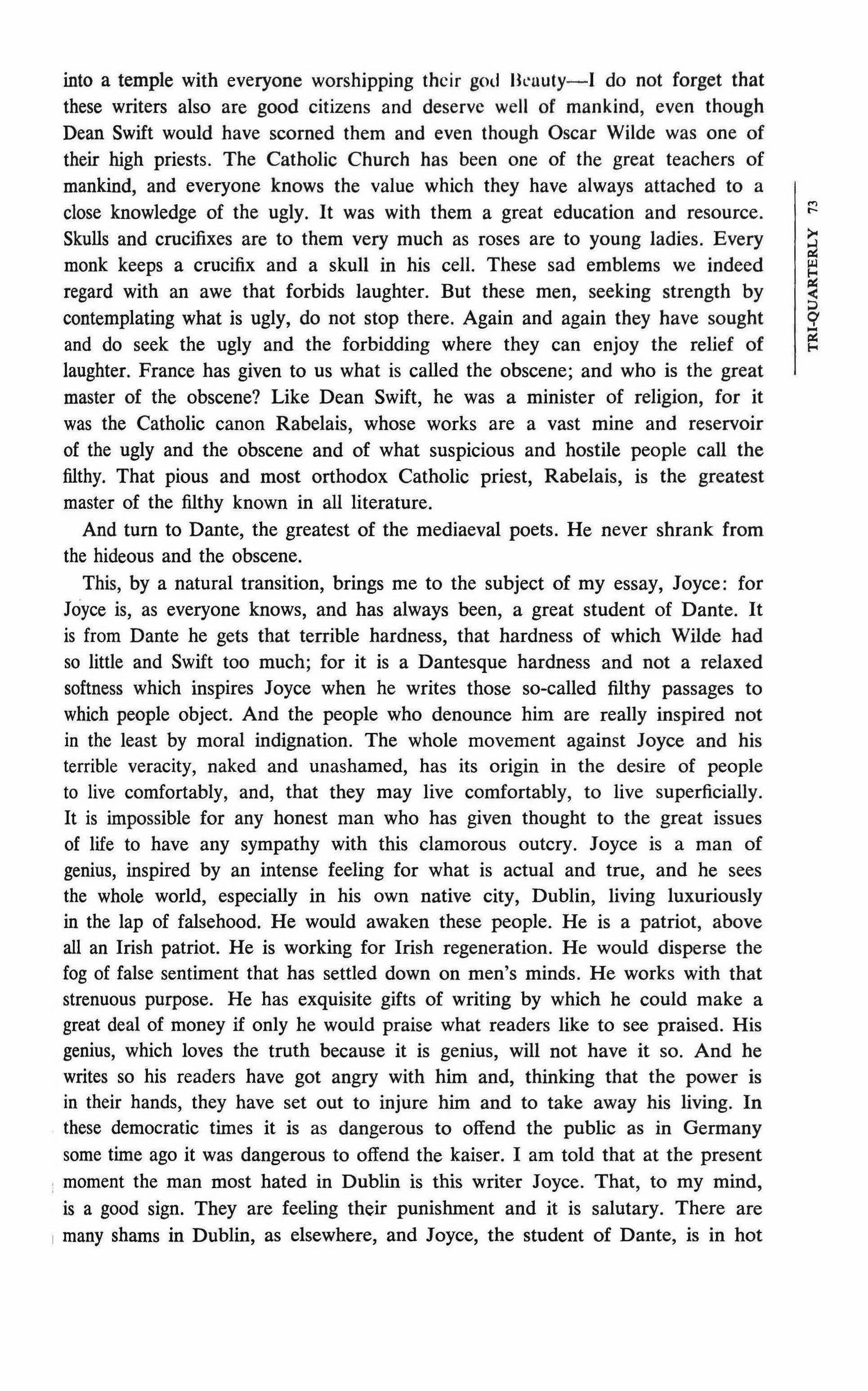
into a temple with everyone worshipping their god Ikuuty-l do not forget that these writers also are good citizens and deserve well of mankind, even though Dean Swift would have scorned them and even though Oscar Wilde was one of their high priests. The Catholic Church has been one of the great teachers of mankind, and everyone knows the value which they have always attached to a close knowledge of the ugly. It was with them a great education and resource. Skulls and crucifixes are to them very much as roses are to young ladies. Every monk keeps a crucifix and a skull in his cell. These sad emblems we indeed regard with an awe that forbids laughter. But these men, seeking strength by contemplating what is ugly, do not stop there. Again and again they have sought and do seek the ugly and the forbidding where they can enjoy the relief of laughter. France has given to us what is called the obscene; and who is the great master of the obscene? Like Dean Swift, he was a minister of religion, for it was the Catholic canon Rabelais, whose works are a vast mine and reservoir of the ugly and the obscene and of what suspicious and hostile people call the filthy. That pious and most orthodox Catholic priest, Rabelais, is the greatest master of the filthy known in all literature.
And turn to Dante, the greatest of the mediaeval poets. He never shrank from the hideous and the obscene.
This, by a natural transition, brings me to the subject of my essay, Joyce: for Joyce is, as everyone knows, and has always been, a great student of Dante. It is from Dante he gets that terrible hardness, that hardness of which Wilde had so little and Swift too much; for it is a Dantesque hardness and not a relaxed softness which inspires Joyce when he writes those so-called filthy passages to which people object. And the people who denounce him are really inspired not in the least by moral indignation. The whole movement against Joyce and his terrible veracity, naked and unashamed, has its origin in the desire of people to live comfortably, and, that they may live comfortably, to live superficially. It is impossible for any honest man who has given thought to the great issues of life to have any sympathy with this clamorous outcry. Joyce is a man of genius, inspired by an intense feeling for what is actual and true, and he sees the whole world, especially in his own native city, Dublin, living luxuriously in the lap of falsehood. He would awaken these people. He is a patriot, above all an Irish patriot. He is working for Irish regeneration. He would disperse the fog of false sentiment that has settled down on men's minds. He works with that strenuous purpose. He has exquisite gifts of writing by which he could make a great deal of money if only he would praise what readers like to see praised. His genius, which loves the truth because it is genius, will not have it so. And he writes so his readers have got angry with him and, thinking that the power is in their hands, they have set out to injure him and to take away his living. In these democratic times it is as dangerous to offend the public as in Germany some time ago it was dangerous to offend the kaiser. I am told that at the present moment the man most hated in Dublin is this writer Joyce. That, to my mind, is a good sign. They are feeling their punishment and it is salutary. There are many shams in Dublin, as elsewhere, and Joyce, the student of Dante, is in hot

pursuit and every honest man ought to be on his side.
Being myself of a luxurious and indolent turn of mind, I shudder at sight of the ugly and would run away from it. I do not enjoy Dean Swift's books. And while I enjoy beyond words many passages of Joyce's because of their beauty and delicacy and poetry, I shrink a good deal when sometimes he strips off the covering of sentiment that long convention and easy good nature have woven around women and sexual love; I shrink, yes, but I do not, like the Dublin people, take refuge in hating Joyce. On the contrary, I admire him for his courage and wonder at his unselfishness. This man, who has such astounding gifts for describing what is lovely and attractive, will suddenly arrest himself in the very midst of his poetry and turn aside to point out what is ugly, and atrociously ugly. Among the artists in New York I have some friends who seem to revel in painting the hideous and obscene. They are good men, living lives of self-denial and virtue, and they can paint beautiful things. Why do they talk about it? Why do they seek it everywhere? It is not to make money. On the contrary, they lose all chance of making money by such perversity. Why do they do it? I believe, myself, it is because of an instinct toward virtue and strength which commands them to turn away from what is lovely and from what is relaxing because it is lovely, and betake themselves to what is ugly. The ugly is to them oral discipline. It is the shock of a cold shower bath. A woman in her beauty is soft and alluring. Let us look at her closely, say these artists, and do not spare ourselves any of the loathsome details of her corporeal realities and actualities, and fill our pictures with such horrors. The world would say such artists are immoral and a public danger. But that is only because they hate to be made uncomfortable. These artists are struggling to make love less alluring, even women less alluring, and they are doing it for their own salvation in order that they may keep their mental balance.
On the whole, I would say this, that the writers and artists who insist on the hideous and the repulsive and the obscene have this great effect on the mind: they make the man who studies them much stronger to resist evil, but also they make him unhappy; while the artists who make beauty their gospel and their study add immensely to a man's power of happiness. But he grows weaker under their teaching. He relaxes as in a bower of roses, as in a soft climate. Between the people who love beauty and those who love the ugly, there is and has always been a constant warfare. The great poets are men of great character who know too well the value of both the ugly and the beautiful to side with either in any such conflict. And so you have Shakespeare, who has so often shocked the sensibilities of the refined and the sensibilities of those good people who read him in an expurgated edition known as a "family Shakespeare." And then, again, you have Rabelais, amid whose dunghill obscenities are constantly found such delicacies of thought and feeling.
And here I would make what I think an important distinction. There is what is called the ugly and there is what is meant by that very clumsy word, filthy. What did the act mean by that word? No man could really object to the merely ugly. In foreign cathedrals are sculptured many hideous faces of leering devils.
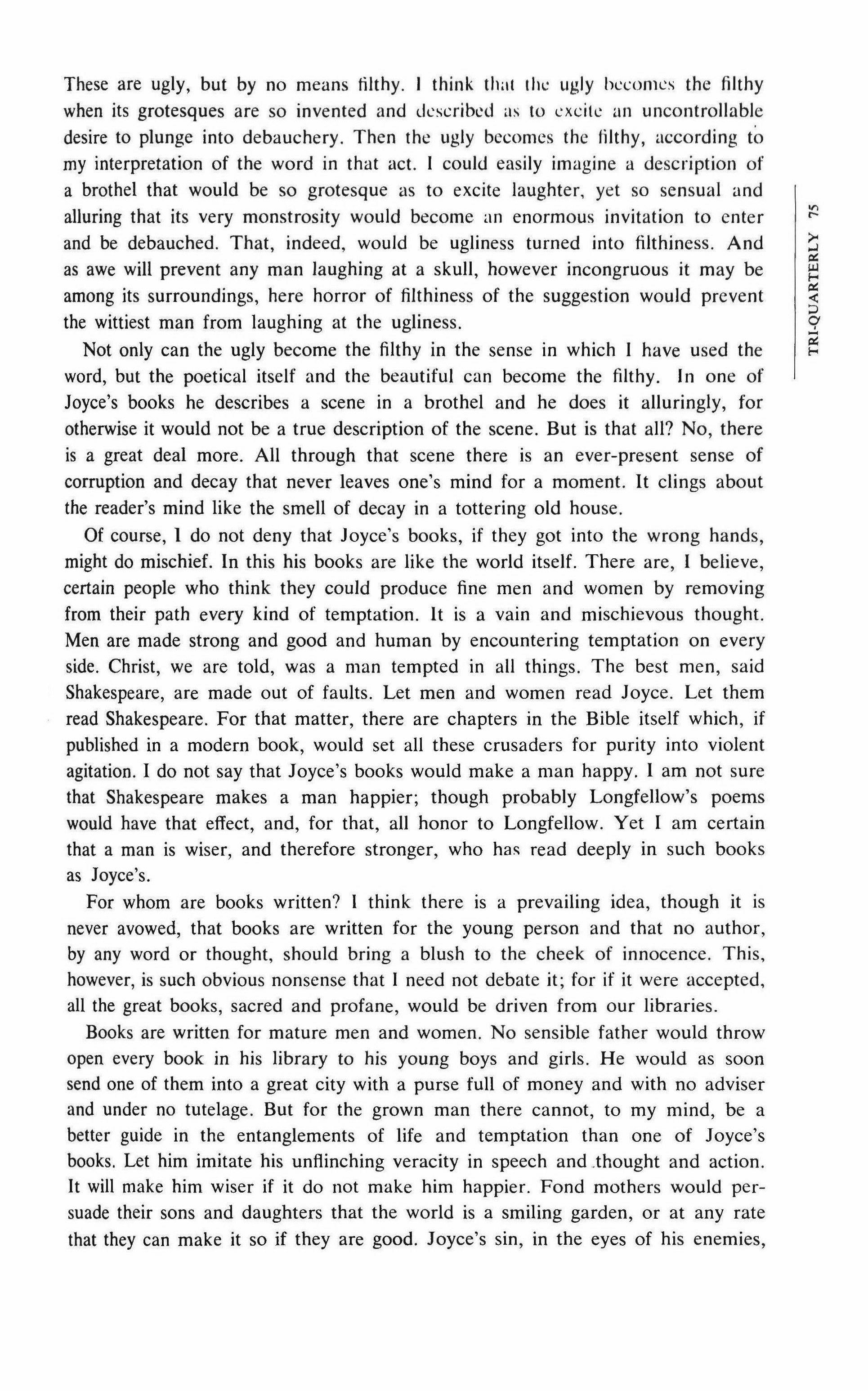
These are ugly, but by no means filthy. I think that the ugly becomes the filthy when its grotesques are so invented and described as to excite an uncontrollable desire to plunge into debauchery. Then the ugly becomes the filthy, according to my interpretation of the word in that act. I could easily imagine a description of a brothel that would be so grotesque as to excite laughter, yet so sensual and alluring that its very monstrosity would become an enormous invitation to enter and be debauched. That, indeed, would be ugliness turned into filthiness. And as awe will prevent any man laughing at a skull, however incongruous it may be among its surroundings, here horror of filthiness of the suggestion would prevent the wittiest man from laughing at the ugliness.
Not only can the ugly become the filthy in the sense in which I have used the word, but the poetical itself and the beautiful can become the filthy. In one of Joyce's books he describes a scene in a brothel and he does it alluringly, for otherwise it would not be a true description of the scene. But is that all? No, there is a great deal more. All through that scene there is an ever-present sense of corruption and decay that never leaves one's mind for a moment. It clings about the reader's mind like the smell of decay in a tottering old house.
Of course, I do not deny that Joyce's books, if they got into the wrong hands, might do mischief. In this his books are like the world itself. There are, I believe, certain people who think they could produce fine men and women by removing from their path every kind of temptation. It is a vain and mischievous thought. Men are made strong and good and human by encountering temptation on every side. Christ, we are told, was a man tempted in all things. The best men, said Shakespeare, are made out of faults. Let men and women read Joyce. Let them read Shakespeare. For that matter, there are chapters in the Bible itself which, if published in a modern book, would set all these crusaders for purity into violent agitation. I do not say that Joyce's books would make a man happy. I am not sure that Shakespeare makes a man happier; though probably Longfellow's poems would have that effect, and, for that, all honor to Longfellow. Yet I am certain that a man is wiser, and therefore stronger, who has read deeply in such books as Joyce's.
For whom are books written? I think there is a prevailing idea, though it is never avowed, that books are written for the young person and that no author, by any word or thought, should bring a blush to the cheek of innocence. This, however, is such obvious nonsense that I need not debate it; for if it were accepted, all the great books, sacred and profane, would be driven from our libraries.
Books are written for mature men and women. No sensible father would throw open every book in his library to his young boys and girls. He would as soon send one of them into a great city with a purse full of money and with no adviser and under no tutelage. But for the grown man there cannot, to my mind, be a better guide in the entanglements of life and temptation than one of Joyce's books. Let him imitate his unflinching veracity in speech and .thought and action. It will make him wiser if it do not make him happier. Fond mothers would persuade their sons and daughters that the world is a smiling garden, or at any rate that they can make it so if they are good. Joyce's sin, in the eyes of his enemies,
is that he shatters that dream. I know Dublin well. I know the pleasant falsehoods that are cherished by its good citizens, and I am not surprised to hear that they hate Joyce.
Of course, I know that the ugly is not always to be made welcome. A friend told me that he was once present at a great gathering of "rank and fashion" at a large private mansion in Dublin. All were laughing and gay, enjoying themselves and anticipating more enjoyment. And there were amateur theatricals. In one of the scenes a skull was produced, at which the ladies shrieked and some were on the verge of hysterics. That skull was an incongruity and was at once carried off and put, as it were, into disgrace. Father Healy, the witty priest, the man with the mild, wistful blue eyes, was there. A skull did not disconcert him. It was familiar to his daily thoughts. And as they carried it off he called out, in his piping voice, "Put it in the scullery." The laughter evoked by this sally restored everyone to good humour and the ladies forgot their nerves.
Be sure there are no such incongruities in Joyce. He and Dean Swift are in grim earnest. These men are alike. They do not wish to excite laughter, and it does not lie in their art to allure anybody. Both are unintelligible except to men who like strict reasoning and who know what it is to feel things deeply. And if they want success and public appreciation, it is by no means for themselves but for their principles and views of life. People now are attacking Joyce, not in the least because they think his writings filthy or provocative of sin, but because they dislike his philosophy and his attack on established conventionality. It is because of this all Dublin is in arms. He should be helped and not hindered. No place needs him more than does Dublin.
J. B. Yeats
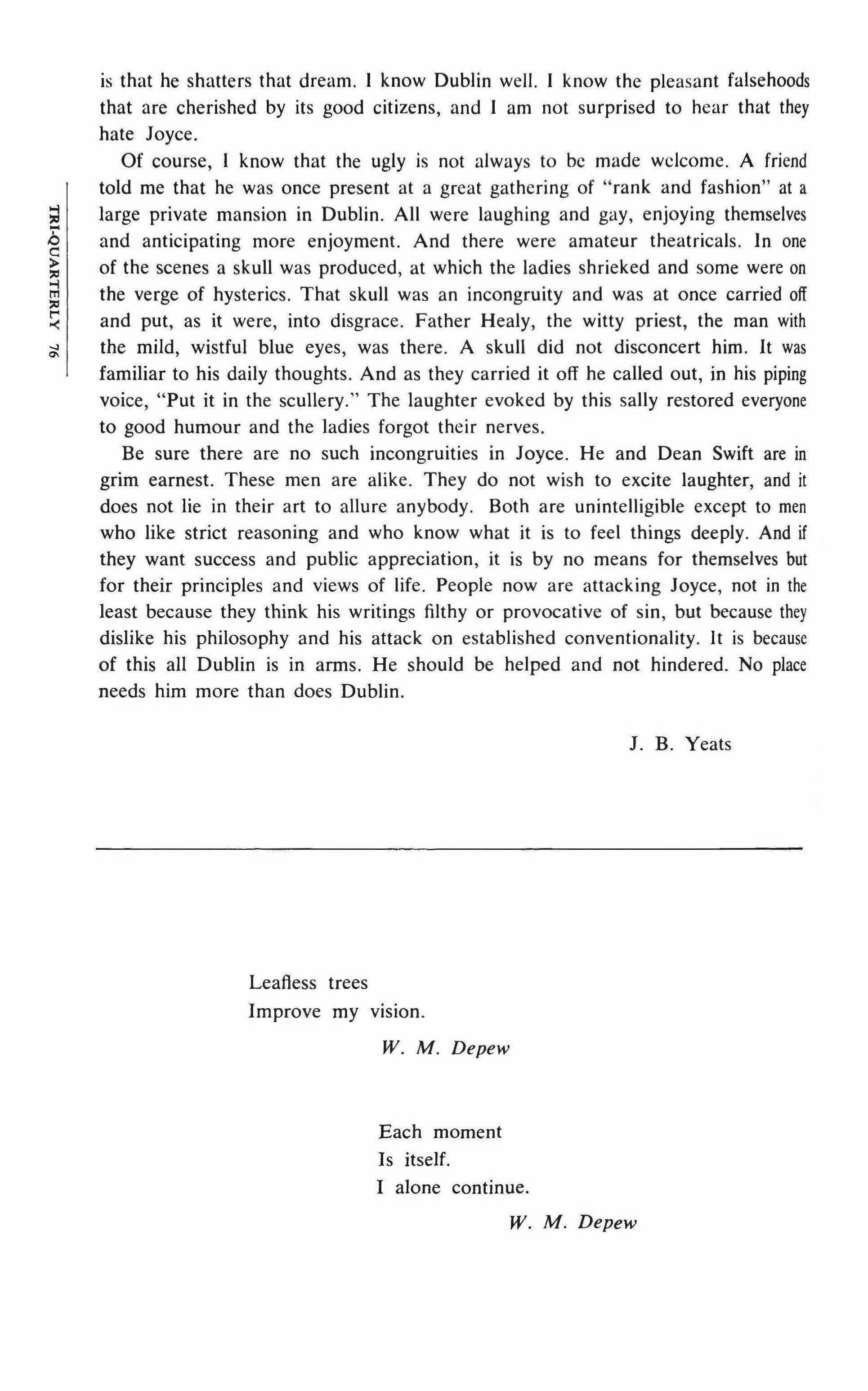
Leafless trees
Improve my vision.
W. M. Depew
Each moment Is itself. I alone continue.
W. M. Depew
What Republicanism was in the coming election
MARK REINSBERG

But Federal aid is not the way. It would inevitably invite bureaucratic Federal control of school curricula. I have consistently opposed Federal aid to elementary and secondary schools as unnecessary and unwise. Nevertheless, I have advocated that any such aid-should Congress ever authorize it-must in fairness be made available to all schools, public, private, or parochial.
-SEN.
GOLDWATER, JAN. 3, 1964
We favor a wise and judicious system of general education by adequate appropriation from the national revenues wherever the same is needed.
-REPUBLICAN PLATFORM, 1884
THEPLATFORM of a national political party often is thought of as a disposable garment or an expedient snare, but even when we assume its total insincerity such a document would have value. It is, at the very least, a professional effort to understand the sentiments of voters at that point in time. To the degree that it is an accurate sounding of electoral moods, the party rhetoric might well trap political leaders into behaving as though they shared its convictions.
Indeed, platforms of the party's recent past have a similar power of entrapment. The leader who departs from an earlier policy position acknowledges the impermanence if not the ever-present possibility of error in party judgment. From a shift on any matter of consequence, to an outright repudiation of lineage and loyalty, is but a short step. Therefore, until the decay of memory, all party platforms have their claims.
To examine the 1964 Republican party plattorm and to compare it with earlier expressions of the G.O.P., and the opposition, is to learn the extent of memory's decay. It is not a question of the document's sincerity. With allowance for some human inconsistency and some finagling on minor details, there is no reason to doubt the adherence of the party's present leadership to the principles set forth. Few party statements of this quadrennial character have conformed more closely to the personal views of the actual presidential nominee. We know that it was Barry Goldwater's platform before it was the G.O.P. platform. Whose platform it was before the Arizona senator arrived on the national scene is a question worth asking.
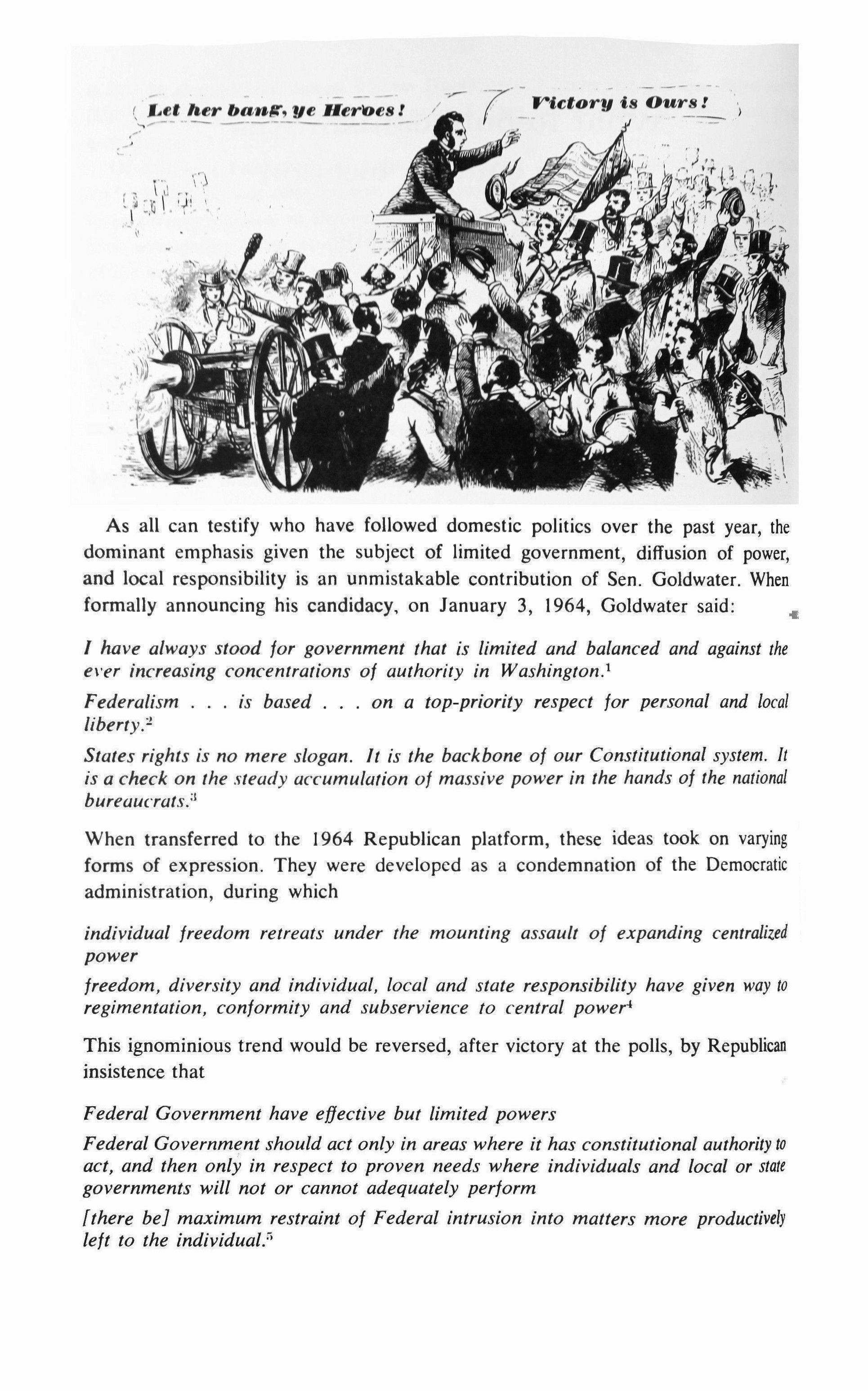
As all can testify who have followed domestic politics over the past year, the dominant emphasis given the subject of limited government, diffusion of power, and local responsibility is an unmistakable contribution of Sen. Goldwater. When formally announcing his candidacy, on January 3, 1964, Goldwater said:
I have always stood for government that is limited and balanced and against the ever increasing concentrations of authority in Washington. 1
Federalism is based on a top-priority respect for personal and local liberty+
States rights is no mere slogan. It is the backbone of our Constitutional system. It is a check on the steady accumulation of massive power in the hands of the national bureaucrats.:1
When transferred to the 1964 Republican platform, these ideas took on varying forms of expression. They were developed as a condemnation of the Democratic administration, during which
individual freedom retreats under the mounting assault of expanding centralized power
freedom, diversity and individual, local and state responsibility have given way to regimentation, conformity and subservience to central power
This ignominious trend would be reversed, after victory at the polls, by Republican insistence that
Federal Government have effective but limited powers
Federal Government should act only in areas where it has constitutional authority to act, and then only in respect to proven needs where individuals and local or state governments will not or cannot adequately perform [there bel maximum restraint of Federal intrusion into matters more productively left to the individual."
r; \-:-.\ J",' , � -" \ '.,l': \ -.�
The problem, for historically-minded Republicans, is one of identity and pride. This domestic ideology has an old and vaguely borrowed aroma. Assurances from party leaders that these notions, after all, represent traditional Republicanisma long-overdue return to conservative original principles-have not quieted all misgivings and have awakened a slumbering curiosity. Where, exactly, in traditional Republicanism is the attitude of 'limited government' first accepted?
It would be pure pedantry to trace the genealogy of Federalism and States Rights to the founding fathers. We are properly concerned only with that portion of American history in which the modern Republican party has played a part-i.e., since 1854. A review of that period would leave no doubt as to whom such ideas traditionally belong. They are the dubious heritage of the Democratic party in its post-Civil War mortification.
Of special interest to the student of rhetoric are the opposing party platforms of the era of Republicanism's great rise to power and its uninterrupted twentyfour-year lease on the White House (1861-85). A few parallel extracts will serve to distinguish the party positions.
DEMOCRATIC PLATFORM
Any attempt by Congress to deprive any State of this right, or to interfere with its exercise, is a flagrant usurpation of power, which can find no warrant in the Constitution; and if sanctioned by the people will subvert our form of government, and can only end in a single centralized and consolidated government 1868
Local self-government will guard the rights of all citizens more securely than any centralized power 1872
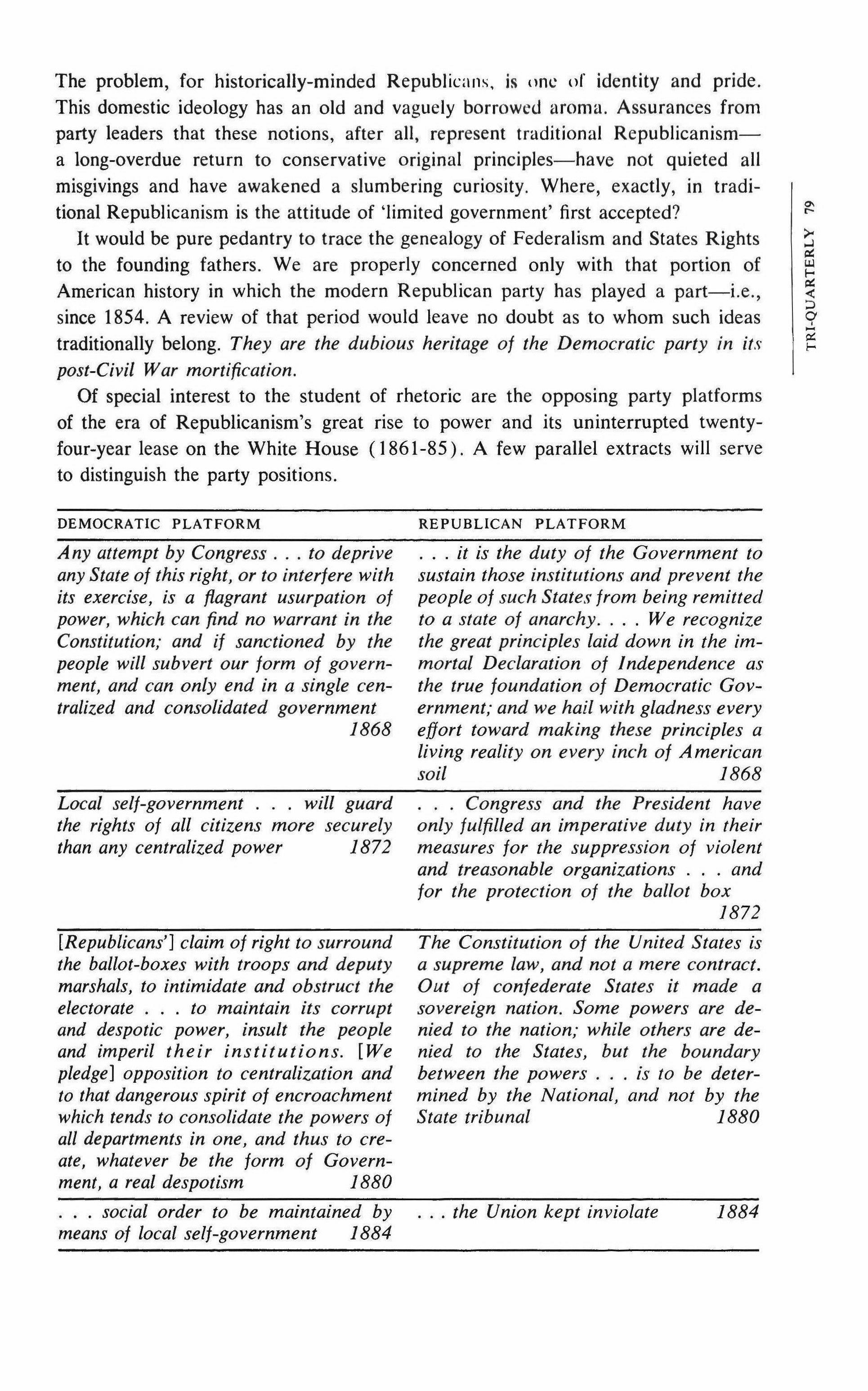
[Republicans'] claim of right to surround the ballot-boxes with troops and deputy marshals, to intimidate and obstruct the electorate to maintain its corrupt and despotic power, insult the people and imperil their institutions. [We pledge] opposition to centralization and to that dangerous spirit of encroachment which tends to consolidate the powers of all departments in one, and thus to create, whatever be the form of Government, a real despotism 1880
REPUBLICAN PLATFORM
it is the duty of the Government to sustain those institutions and prevent the people of such States from being remitted to a state of anarchy We recognize the great principles laid down in the immortal Declaration of Independence as the true foundation of Democratic Government; and we hail with gladness every effort toward making these principles a living reality on every inch of American soil 1868
Congress and the President have only fulfilled an imperative duty in their measures for the suppression of violent and treasonable organizations and for the protection of the ballot box 1872
The Constitution of the United States is a supreme law, and not a mere contract. Out of confederate States it made a sovereign nation. Some powers are denied to the nation; while others are denied to the States, but the boundary between the powers is to be determined by the National, and not by the State tribunal 1880
social order to be maintained by means of local self-government 1884 the Union kept inviolate 1884
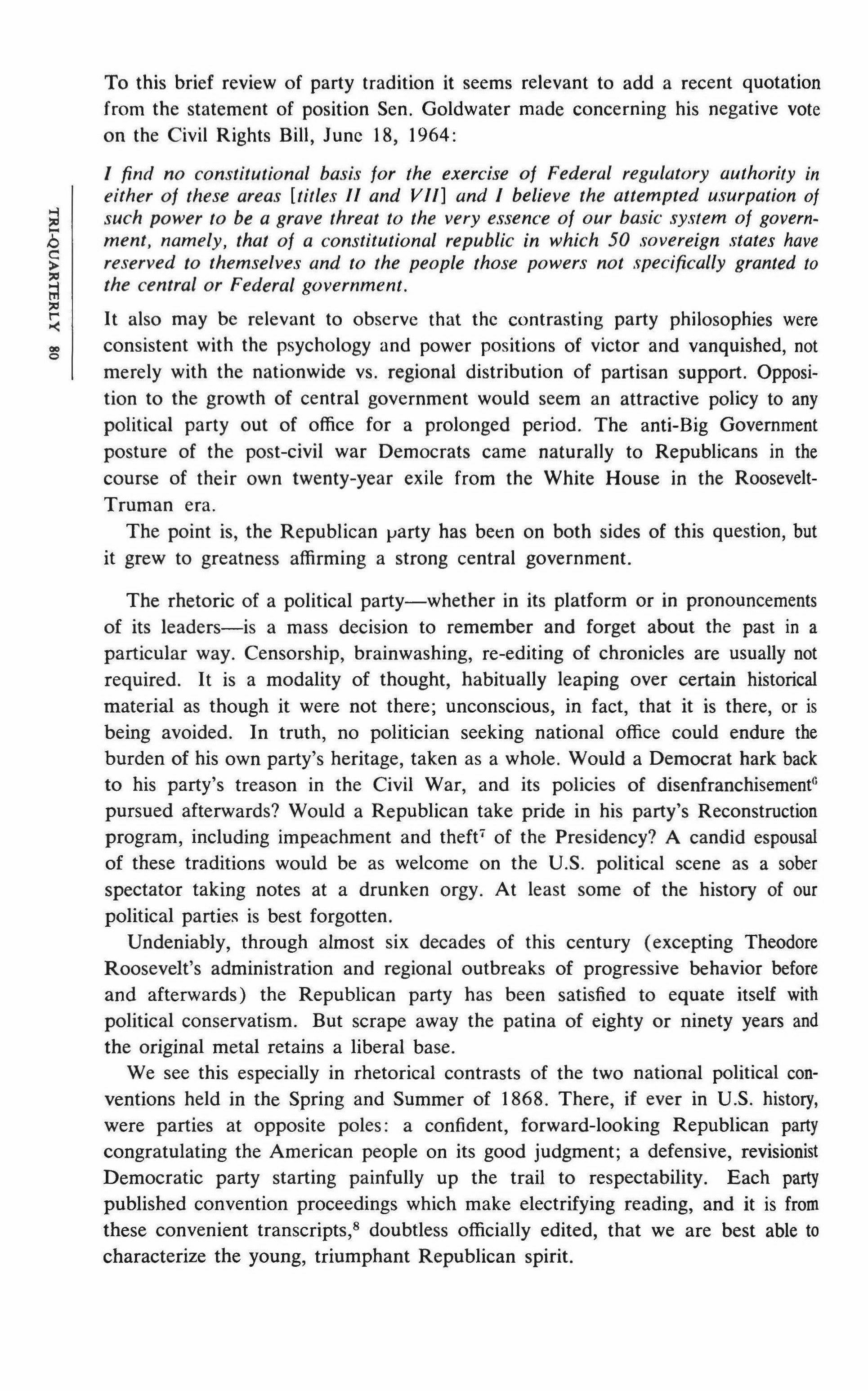
To this brief review of party tradition it seems relevant to add a recent quotation from the statement of position Sen. Goldwater made concerning his negative vote on the Civil Rights Bill, June 18, 1964:
1 find no constitutional basis for the exercise of Federal regulatory authority in either of these areas [titles II and VII] and J believe the attempted usurpation of � such power to be a grave threat to the very essence of our basic system of govern/::) ment, namely, that of a constitutional republic in which 50 sovereign states have � reserved to themselves and to the people those powers not specifically granted to
the central or Federal government.
� !( It also may be relevant to observe that the contrasting party philosophies were � consistent with the psychology and power positions of victor and vanquished, not merely with the nationwide vs. regional distribution of partisan support. Opposition to the growth of central government would seem an attractive policy to any political party out of office for a prolonged period. The anti-Big Government posture of the post-civil war Democrats came naturally to Republicans in the course of their own twenty-year exile from the White House in the RooseveltTruman era.
The point is, the Republican party has been on both sides of this question, but it grew to greatness affirming a strong central government.
The rhetoric of a political party-whether in its platform or in pronouncements of its leaders-is a mass decision to remember and forget about the past in a particular way. Censorship, brainwashing, re-editing of chronicles are usually not required. It is a modality of thought, habitually leaping over certain historical material as though it were not there; unconscious, in fact, that it is there, or is being avoided. In truth, no politician seeking national office could endure the burden of his own party's heritage, taken as a whole. Would a Democrat hark back to his party's treason in the Civil War, and its policies of disenfranchisement" pursued afterwards? Would a Republican take pride in his party's Reconstruction program, including impeachment and theft? of the Presidency? A candid espousal of these traditions would be as welcome on the U.S. political scene as a sober spectator taking notes at a drunken orgy. At least some of the history of our political parties is best forgotten.
Undeniably, through almost six decades of this century (excepting Theodore Roosevelt's administration and regional outbreaks of progressive behavior before and afterwards) the Republican party has been satisfied to equate itself with political conservatism. But scrape away the patina of eighty or ninety years and the original metal retains a liberal base.
We see this especially in rhetorical contrasts of the two national political conventions held in the Spring and Summer of 1868. There, if ever in U.S. history, were parties at opposite poles: a confident, forward-looking Republican party congratulating the American people on its good judgment; a defensive, revisionist Democratic party starting painfully up the trail to respectability. Each party published convention proceedings which make electrifying reading, and it is from these convenient transcripts," doubtless officially edited, that we are best able to characterize the young, triumphant Republican spirit.
�
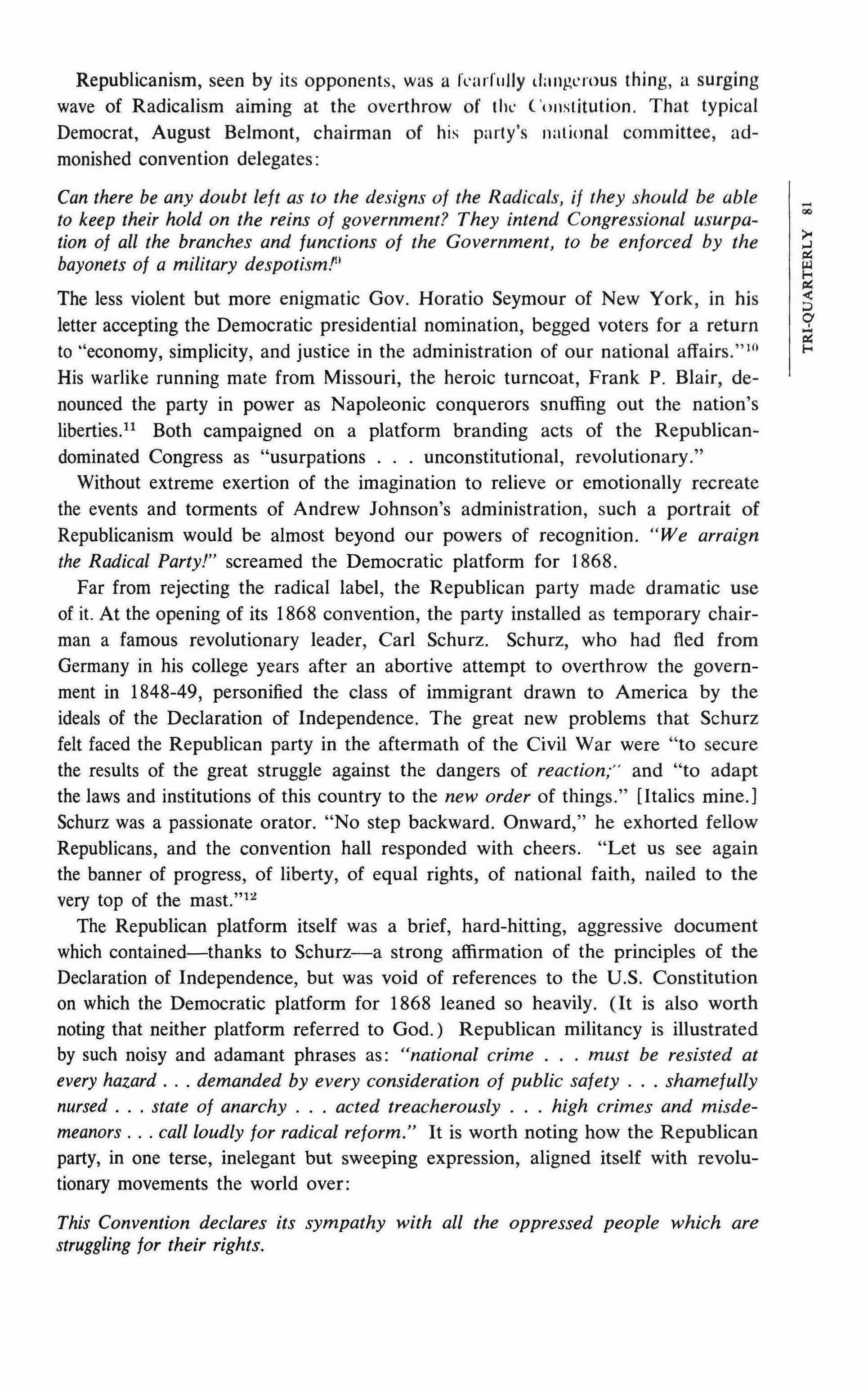
Republicanism, seen by its opponents, was a fearfully dangerous thing, a surging wave of Radicalism aiming at the overthrow of the Constitution, That typical Democrat, August Belmont, chairman of his party's national committee, admonished convention delegates:
Can there be any doubt left as to the designs of the Radicals, if they should be able to keep their hold on the reins of government? They intend Congressional usurpation of all the branches and functions of the Government, to be enforced by the bayonets of a military despotism!"
The less violent but more enigmatic Gov. Horatio Seymour of New York, in his letter accepting the Democratic presidential nomination, begged voters for a return to "economy, simplicity, and justice in the administration of our national affairs."!"
His warlike running mate from Missouri, the heroic turncoat, Frank P. Blair, denounced the party in power as Napoleonic conquerors snuffing out the nation's liberties.'! Both campaigned on a platform branding acts of the Republicandominated Congress as "usurpations unconstitutional, revolutionary."
Without extreme exertion of the imagination to relieve or emotionally recreate the events and torments of Andrew Johnson's administration, such a portrait of Republicanism would be almost beyond our powers of recognition. "We arraign the Radical Party!" screamed the Democratic platform for 1868.
Far from rejecting the radical label, the Republican party made dramatic use of it. At the opening of its 1868 convention, the party installed as temporary chairman a famous revolutionary leader, Carl Schurz. Schurz, who had fled from Germany in his college years after an abortive attempt to overthrow the government in 1848-49, personified the class of immigrant drawn to America by the ideals of the Declaration of Independence. The great new problems that Schurz felt faced the Republican party in the aftermath of the Civil War were "to secure the results of the great struggle against the dangers of reaction;" and "to adapt the laws and institutions of this country to the new order of things." [Italics mine.] Schurz was a passionate orator. "No step backward. Onward," he exhorted fellow Republicans, and the convention hall responded with cheers. "Let us see again the banner of progress, of liberty, of equal rights, of national faith, nailed to the very top of the mast."?"
The Republican platform itself was a brief, hard-hitting, aggressive document which contained-thanks to Schurz-a strong affirmation of the principles of the Declaration of Independence, but was void of references to the U.S. Constitution on which the Democratic platform for 1868 leaned so heavily. (It is also worth noting that neither platform referred to God.) Republican militancy is illustrated by such noisy and adamant phrases as: "national crime must be resisted at every hazard demanded by every consideration of public safety shamefully nursed state of anarchy acted treacherously high crimes and misdemeanors call loudly for radical reform." It is worth noting how the Republican party, in one terse, inelegant but sweeping expression, aligned itself with revolutionary movements the world over:
This Convention declares its sympathy with all the oppressed people which are struggling for their rights.
00

Compare this to the 1964 platform, which reads:
America must advance freedom throughout the world as a vital condition of orderly human progress, universal justice, and the security of the A merican people.
The Summer and early Autumn of 1964 was a period in which people who had never voted Republican felt obliged to come to the defense of Republicanism. For it seemed that the continuity of an important political tradition had been broken. It seemed that a hundred-year-old heritage was in danger of being lost through willful forgetfulness, lost not only to its political heirs but to the American people as a whole. The tradition we have all sought to recapture is that spirit of "radical" reform which motivated the founders of the Republican party.
At the moment of their birth, and during their ascendency, the Republican Party was animated by a belief in a strong and benevolent central government, which, through positive social legislation, could accomplish good for the mass of various men it embraced. To Senator Goldwater, this is a Republicanism that never was. It is more than ironic that one who calls himself a 'conservative' should be repudiating the tradition upon which his institution was built, and further, that he should adopt the posture of an opposition party, which while it maintained such a stance, was consistently repudiated by the American people for nearly half a century.
We have witnessed a conquest of the G.O.P., a take-over not only of the party's apparatus but of the party's memory. For all who must accept party discipline, this is a leave-taking. The specific features of an action program do not, in the long run, distinguish one party from the other. Programs of action become fulfilled or obsolete from one election to the next. The only permanent distinction between Republican and Democrat arises from differences in historical outlook. Change a party's action program and you alter its fate in an election. Change a party's interpretation of past experience and you change the party itself. In that sense, the Goldwater Republican is already a member of a new political grouping and has no profound reason to be concerned about traditions of the party of Abraham Lincoln.
At this point, perhaps we may be permitted an historical reminiscence of Republican Party rhetoric in its heyday. On July 14, 1868, in Washington, in the chambers of the House of Representatives, a third-term Congressman from Warren, Pennsylvania, by the name of Glenni W. Scofield obtained the floor with a manuscript in his hands entitled, "Purposes of the Republican Party." It was probably a poor time to deliver such a speech. It was a very warm and humid evening. The hour was approaching nine p.m. Attendance was sparse. The two national party conventions had recently been held, the impeachment trial of Johnson had just ended, and everyone present was emotionally worn down and weary of party oratory. Yet Scofield wanted to speak. He had labored over this subject, and he felt that the folks in northwestern Pennsylvania would be listening. "Mr. Chairman," he began his speech, "which way are we moving?"
00 N

No one, today, can connect Scofield's name with nny special accomplishment. But for thirty minutes that evening Scofield talked about a thing he had helped to create and still loved, and he gave the Republican party one of the finest testimonials it has ever received. When Scofield was finished talking, the House had grown too drowsy and uncomfortable in the evening warmth to transact any further business, and it adjourned for the night. The speech made no discernible impact in Washington, but the local newspapers in Scofield's district picked it up, and the citizens of Warren County recognized it as their brand of Republicanism. We commend the text!" to any American wishing to recall the G.O.P. in other days.
Again, it is said that our legislation tends to centralization of power in the General Government, and that centralization tends to despotism. I deny it. We have endeavored to preserve the Union of the States, because individual liberty can be best secured in a single republic We found the Union dismembered, and we have restored it. We found it with slavery, the chief incentive to disunion, and we broke the chains of four million bondsmen. We found an hundred kinds of money that would not pass as many miles from home, and we have reduced them to one uniform system of equal value all over the land. We found the Pacific States separated from the East by a vast unoccupied country, and growing up into isolated nationality, and we have stretched out great lines of railway to secure their commerce and hold their interests and affections in the Union. We found commerce between the States everywhere burdened and obstructed by local and illiberal State legislation, and we have undertaken some measures of relief. These enterprises, undertaken to preserve the harmony of the States and secure the growth and development of the whole country, are mistaken by small politicians for acts of centralization.
In addition to carrying on a four-year war for the suppression of the rebellion all these beneficent and permanent reforms have been secured during the short life of the Republican party. Take as many years of Democratic administration prior to that and tell me what record you have left to awaken the gratitude or pride of the people. During all these weary years nothing was done by the predominant party to elevate and honor labor, to educate the poor, to lift up the fallen, to endow the landless, or to soften the cruelties of bondage. You cannot point to a single act that anybody will celebrate, that anybody will honor, that anybody will remember even except with regret and shame.
What line should we follow? What is the fundamental theory of our Government? The great men who laid its foundations held that "all men are created equal." They proclaimed this sentiment in the face of a world heavily oppressed with inequality, rank, and privilege. They spoke and fought for it. Their eloquence and valor established it upon this continent. And that, I understand, is or ought to be the recognized theory of our Government. It is a simple formula, a few words, a single principle, one idea; but upon it our fathers raised the fabric of the new Government. It is that one idea which makes the Government great, gradually rising above all other powers on the face of the earth, even in its infancy giving liberty and protection to forty million people at home, and reaching out a helping hand to the oppressed and humble all over the world.
M OC>
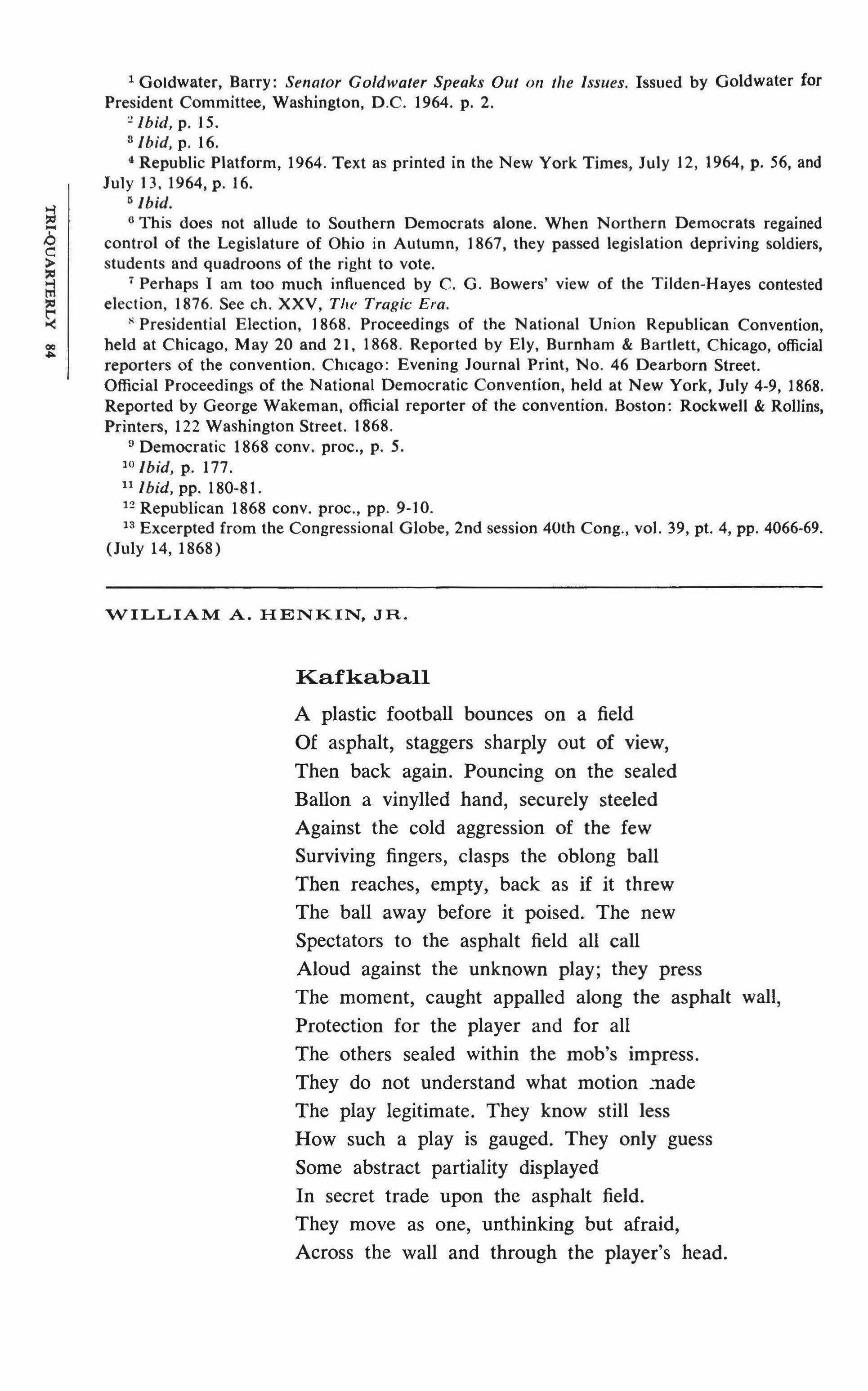
1 Goldwater, Barry: Senator Goldwater Speaks Out on the Issues. Issued by Goldwater for President Committee, Washington, D.C. 1964. p. 2.
�/bid,p.15.
slbid, p. 16.
• Republic Platform, 1964. Text as printed in the New York Times, July 12, 1964, p. 56, and July 13, 1964, p. 16.
G Ibid.
6 This does not allude to Southern Democrats alone. When Northern Democrats regained control of the Legislature of Ohio in Autumn, 1867, they passed legislation depriving soldiers, students and quadroons of the right to vote.
r Perhaps I am too much influenced by C. G. Bowers' view of the Tilden-Hayes contested election, 1876. See ch. XXV, The Tragic Era.
H Presidential Election, 1868. Proceedings of the National Union Republican Convention, held at Chicago, May 20 and 21, 1868. Reported by Ely, Burnham & Bartlett, Chicago, official reporters of the convention. Chicago: Evening Journal Print, No. 46 Dearborn Street. Official Proceedings of the National Democratic Convention, held at New York, July 4-9, 1868. Reported by George Wakeman, official reporter of the convention. Boston: Rockwell & Rollins, Printers, 122 Washington Street. 1868.
o Democratic 1868 conv. proc., p. 5.
]0 Ibid, p. 177.
11 Ibid, pp. 180-81.
1� Republican 1868 conv. proc., pp. 9-10.
13 Excerpted from the Congressional Globe, 2nd session 40th Cong., vol. 39, pt. 4, pp. 4066-69. (July 14, 1868)
WILLIAM A. HENKIN, JR.
Kafkaball
A plastic football bounces on a field Of asphalt, staggers sharply out of view, Then back again. Pouncing on the sealed BaIlon a vinylled hand, securely steeled Against the cold aggression of the few Surviving fingers, clasps the oblong ball Then reaches, empty, back as if it threw The ball away before it poised. The new Spectators to the asphalt field all call Aloud against the unknown play; they press The moment, caught appalled along the asphalt wall, Protection for the player and for all The others sealed within the mob's impress. They do not understand what motion .:nade The play legitimate. They know still less How such a play is gauged. They only guess Some abstract partiality displayed In secret trade upon the asphalt field. They move as one, unthinking but afraid, Across the wall and through the player's head.
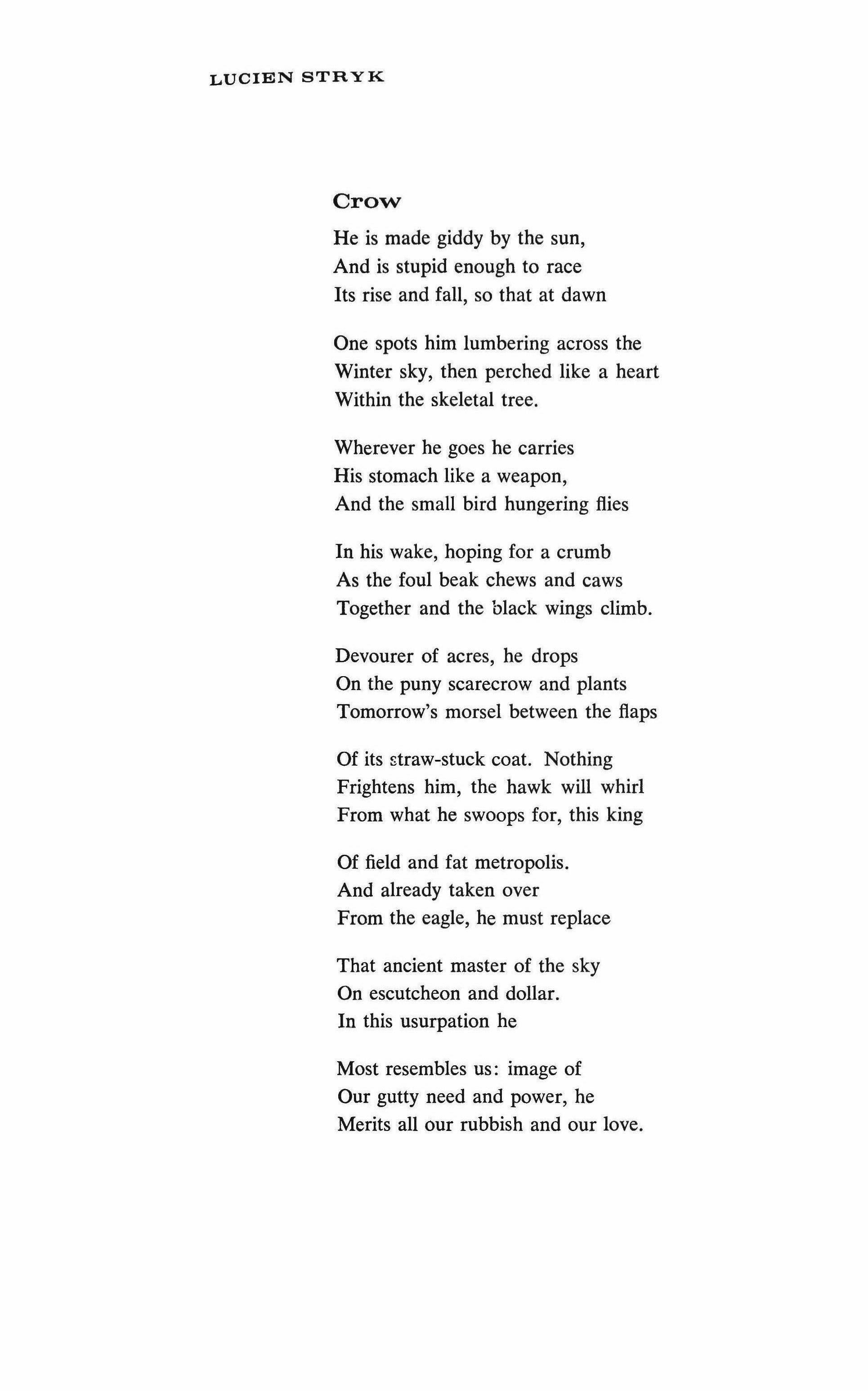
Crow
He is made giddy by the sun, And is stupid enough to race Its rise and fall, so that at dawn
One spots him lumbering across the Winter sky, then perched like a heart Within the skeletal tree.
Wherever he goes he carries His stomach like a weapon, And the small bird hungering flies
In his wake, hoping for a crumb As the foul beak chews and caws Together and the black wings climb.
Devourer of acres, he drops On the puny scarecrow and plants Tomorrow's morsel between the flaps
Of its straw-stuck coat. Nothing Frightens him, the hawk will whirl From what he swoops for, this king
Of field and fat metropolis. And already taken over From the eagle, he must replace
That ancient master of the sky On escutcheon and dollar. In this usurpation he
Most resembles us: image of Our gutty need and power, he Merits all our rubbish and our love.
LUCIEN 8TH Y K

Hearn in Matsue
That all was miniature gave him comfort Of a sort,
And after the Lady, Ellen Freeman,
To whom he had written finally, "Do not Disgust me, Please-" the women were so otherworldly
It was like a permanent exhibition For which one Scarcely had to be the connoisseur. In fact
He shut his eyes and took the nearest for both Bed and name (He had tired of his); was bowed into a house
Which brushed the river a crane's cry from the Daimyo's Tower; Started fussing with the garden; pushed his wife's
Few things around the room like chessmen; until, Pleased at last,
He braced for winter which, though wet, was very
Beautifying. He was often seen tramping from The bathhouse, Flesh a-tingle, all rose against the snow.
Came time to work: a cub again, he snuffed for News in Old Japan, and, stiff on haunches, englished along
With a nameless one or two, tales which drew The expert's Touch like lacquered puzzle-boxes and, when solved, Would gush from prospects charged with mountains Called Giraffes, Trees tense as wire, a moon which always snared
In pineboughs, and temples which could pull one To the knees.
The fame did not surprise: it had awaited
STRYK
LUCIEN

Him like those fragrant ports of forty Years ago
The tall black hulls of home. It fit him, and he
Wore it as he felt, deservingly. What as Years crept by He would not learn to bear, and ill deserved,
Was wife, friends, job, food, the too familiar Land itself, And now, in winter, the Siberian wind
That tore across the sea to heap him at The braizer
For months, weak eyes pricked by dying charcoal.
It was then, remembering Shelley and his Fading coal, He knew how much he hated all Romance.
CULVER PICTURES, INC.
Coming in the winter issue of the new
TRI-QUARTERLY ft;(� �
Humanism versus Behaviorism in the University: A Symposium. Essays by William Earle, Arnold Levison, Scott Greer and others.
Calligrammes of Guillaume Apollinaire.
Erich Heller,"The Artist's Journey into the Interior: Hamlet."
James T. Farrell: A Reconsideration.
Essays on Arthur Miller, Edward Albee, Harold Pinter and Eugene Ionesco.
Zen Poems and Anecdotes.
Excerpts from two new novels.
Plus other writing on the Civil Rights Struggle, George Orwell, the New Feminism, poetry and art work of both the famous and unknown.
The spring Tri-Quarterly will be devoted to Creativity in the Soviet Union. Translations of Pasternak, Evtushenko, Voznesensky, and others; a critical look at contemporary Russian painting, music, cinema, dance, literature and poetry
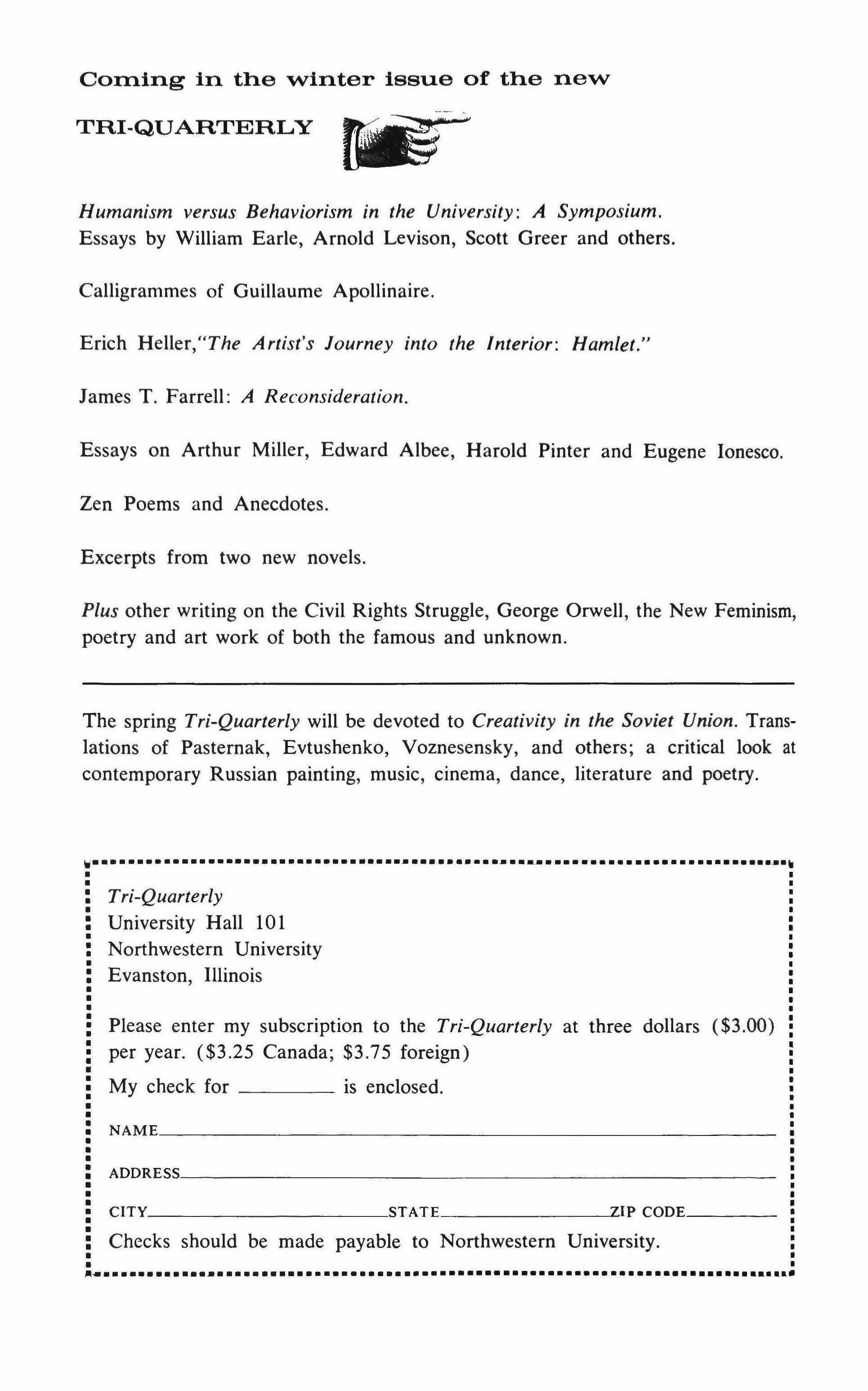
Tri-Quarterly University Hall 101 Northwestern University Evanston, Illinois
Please enter my subscription to the Tri-Quarterly at three dollars ($3.00) per year. ($3.25 Canada; $3.75 foreign)
My check for is enclosed.
NAME
ADDRESS
CITY STATE ZIP CODE
Checks should be made payable to Northwestern University
•.............•.....•................•............................••...••.•.•.••

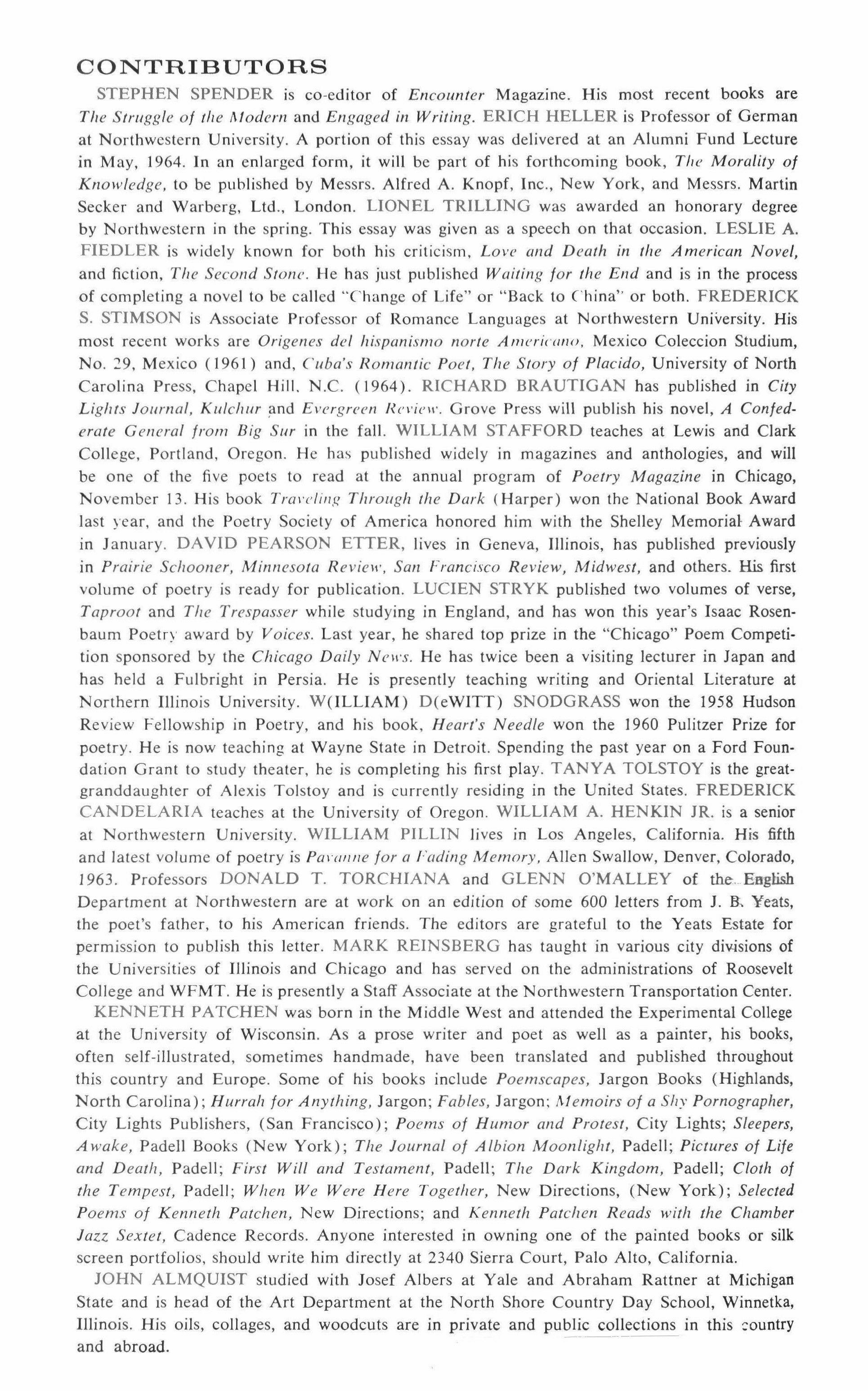
STEPHEN SPENDER is co-editor of Encounter Magazine. His most recent books are The Struggle of the Modern and Engaged in Writing. ERICH HELLER is Professor of German at Northwestern University. A portion of this essay was delivered at an Alumni Fund Lecture in May, 1964. In an enlarged form, it will be part of his forthcoming book, The Morality of Knowledge, to be published by Messrs. Alfred A. Knopf, Inc., New York, and Messrs. Martin Seeker and Warberg, Ltd., London. LIONEL TRILLING was awarded an honorary degree by Northwestern in the spring. This essay was given as a speech on that occasion. LESLIE A. FIEDLER is widely known for both his criticism, Love and Death ill the American Novel, and fiction, The Second Stone, He has just published Waiting for the End and is in the process of completing a novel to be called "Change of Life" or "Back to China" or both. FREDERICK S. STIMSON is Associate Professor of Romance Languages at Northwestern University. His most recent works are Origenes del hispanismo norte Americana, Mexico Coleccion Studium, No. 29, Mexico (1961) and, Cuba's Romantic Poet, The Story of Placido, University of North Carolina Press, Chapel Hill. N.C. (1964). RICHARD BRAUTIGAN has published in City Lights Journal, Kulch ur and Evergreen Review, Grove Press will publish his novel, A Confederate General from Big Sur in the fall. WILLIAM STAFFORD teaches at Lewis and Clark College, Portland, Oregon. He has published widely in magazines and anthologies, and will be one of the five poets to read at the annual program of Poetry Magazine in Chicago, November 13. His book Traveling Through the Dark (Harper) won the National Book Award last year, and the Poetry Society of America honored him with the Shelley Memorial Award in January, DAVID PEARSON ETTER, lives in Geneva, lllinois, has published previously in Prairie Schooner, Minnesota Review, San Francisco Review, Midwest, and others. His first volume of poetry is ready for publication. LUCIEN STRYK published two volumes of verse, Taproot and The Trespasser while studying in England, and has won this year's Isaac Rosenbaum Poetry award by Voices. Last year, he shared top prize in the "Chicago" Poem Competition sponsored by the Chicago Daily News. He has twice been a visiting lecturer in Japan and has held a Fulbright in Persia. He is presently teaching writing and Oriental Literature at Northern Illinois University. W(lLLIAM) D(eWITT) SNODGRASS won the 1958 Hudson Review Fellowship in Poetry, and his book, Heart's Needle won the 1960 Pulitzer Prize for poetry. He is now teaching at Wayne State in Detroit. Spending the past year on a Ford Foundation Grant to study theater, he is completing his first play. TANYA TOLSTOY is the greatgranddaughter of Alexis Tolstoy and is currently residing in the United States, FREDERICK CANDELARIA teaches at the University of Oregon. WILLIAM A. HENKIN JR. is a senior at Northwestern University. WILLIAM PILLIN lives in Los Angeles, California. His fifth and latest volume of poetry is Pavan ne for a Fading Memory, Allen Swallow, Denver, Colorado, 1963. Professors DONALD T. TORCHIANA and GLENN O'MALLEY of the, Eaglish Department at Northwestern are at work on an edition of some 600 letters from J. B.. Yeats, the poet's father, to his American friends. The editors are grateful to the Yeats Estate for permission to publish this letter. MARK REINSBERG has taught in various city divisions of the Universities of Illinois and Chicago and has served on the administrations of Roosevelt College and WFMT. He is presently a Staff Associate at the Northwestern Transportation Center.
KENNETH PATCHEN was born in the Middle West and attended the Experimental College at the University of Wisconsin, As a prose writer and poet as well as a painter, his books, often self-illustrated, sometimes handmade, have been translated and published throughout this country and Europe. Some of his books include Poemscapes, Jargon Books (Highlands, North Carolina) ; Hurrah for Anything, Jargon; Fables, Jargon; Memoirs of a Shy Pornographer, City Lights Publishers, (San Francisco); Poems of Humor and Protest, City Lights; Sleepers, Awake, Padell Books (New York); The Journal of Albion Moonlight, Padell; Pictures of Life and Death, Padell; First Will and Testament, Padell; The Dark Kingdom, Padell; Cloth of the Tempest, Padell; When We Were Here Together, New Directions, (New York); Selected Poems of Kenneth Patchen, New Directions; and Kenneth Patchen Reads with the Chamber Jazz Sextet, Cadence Records. Anyone interested in owning one of the painted books or silk screen portfolios, should write him directly at 2340 Sierra Court, Palo Alto, California.
JOHN ALMQUIST studied with Josef Albers at Yale and Abraham Rattner at Michigan State and is head of the Art Department at the North Shore Country Day School, Winnetka, Illinois. His oils, collages, and woodcuts are in private and pu�ic�]I_ections in this country and abroad.
CONTRIBUTORS

















































 WILLIAM STAFFORD
WILLIAM STAFFORD

















































